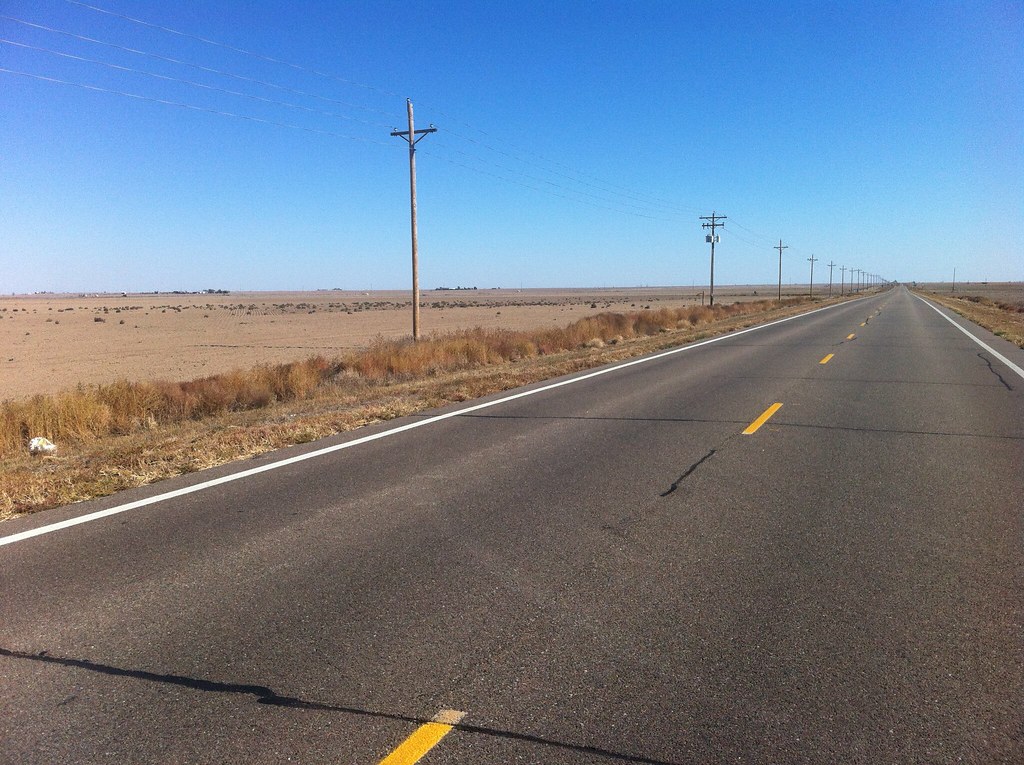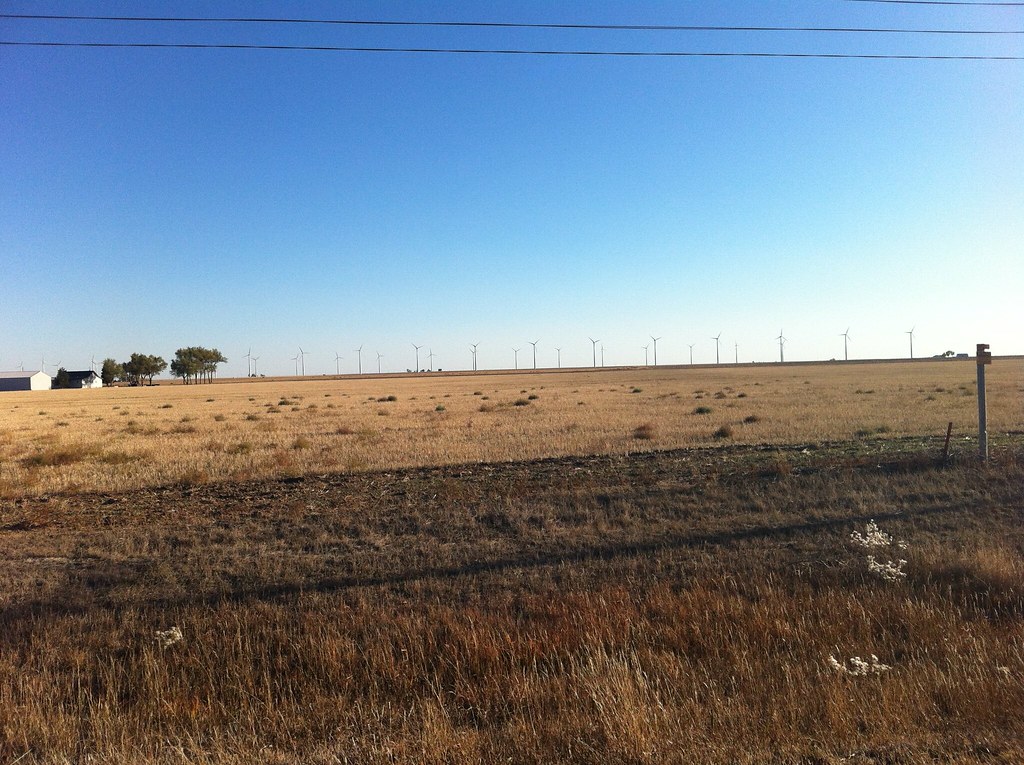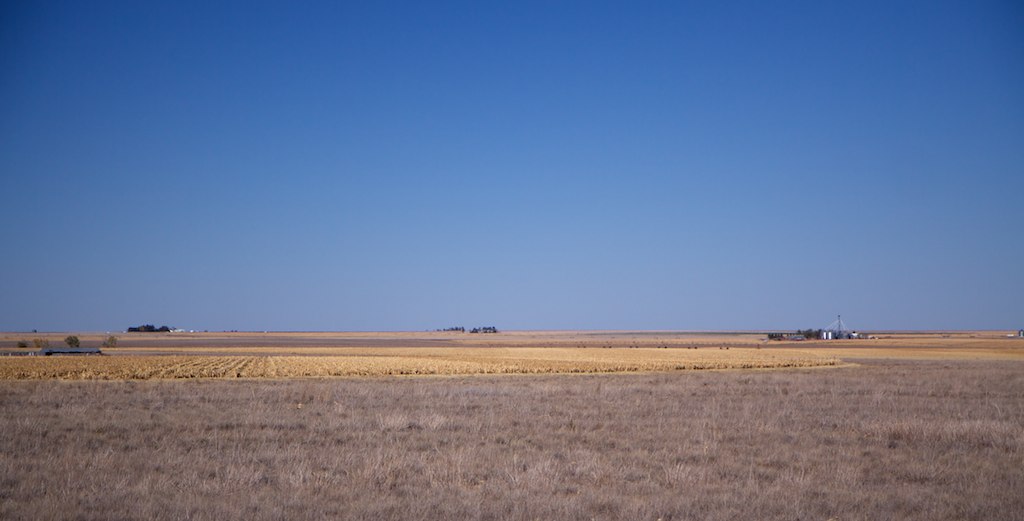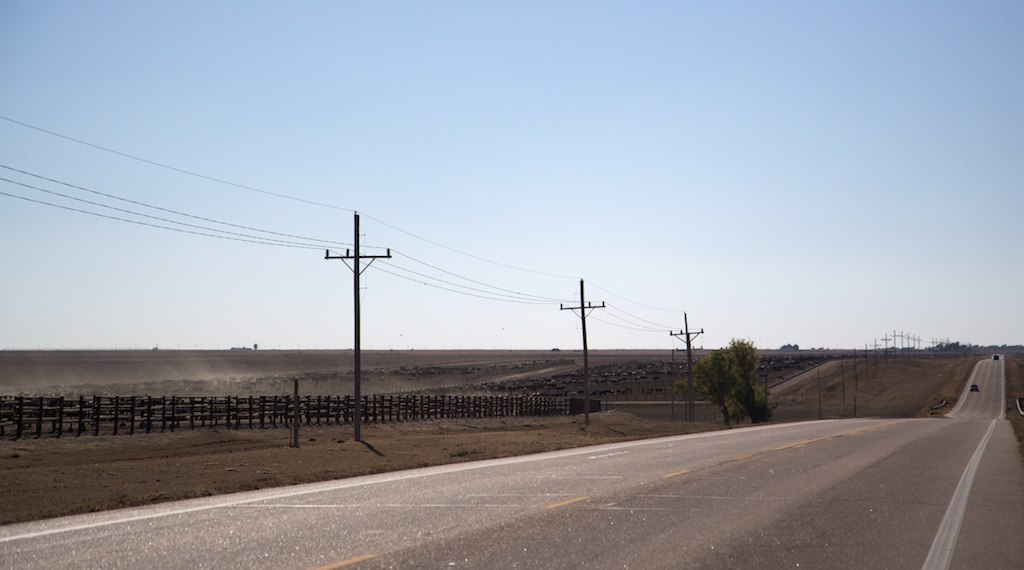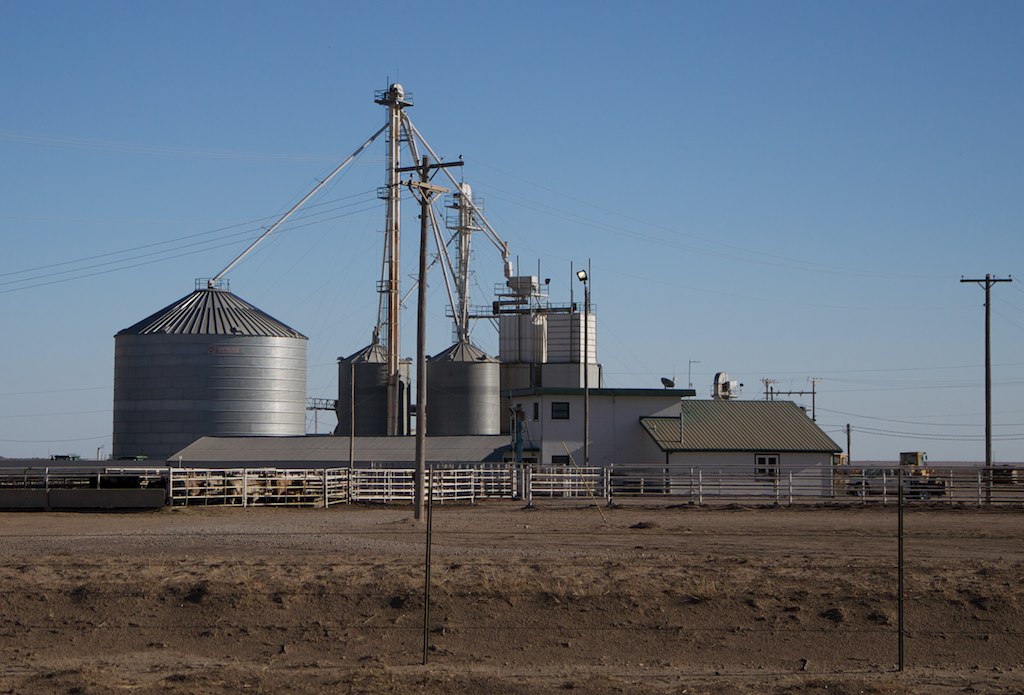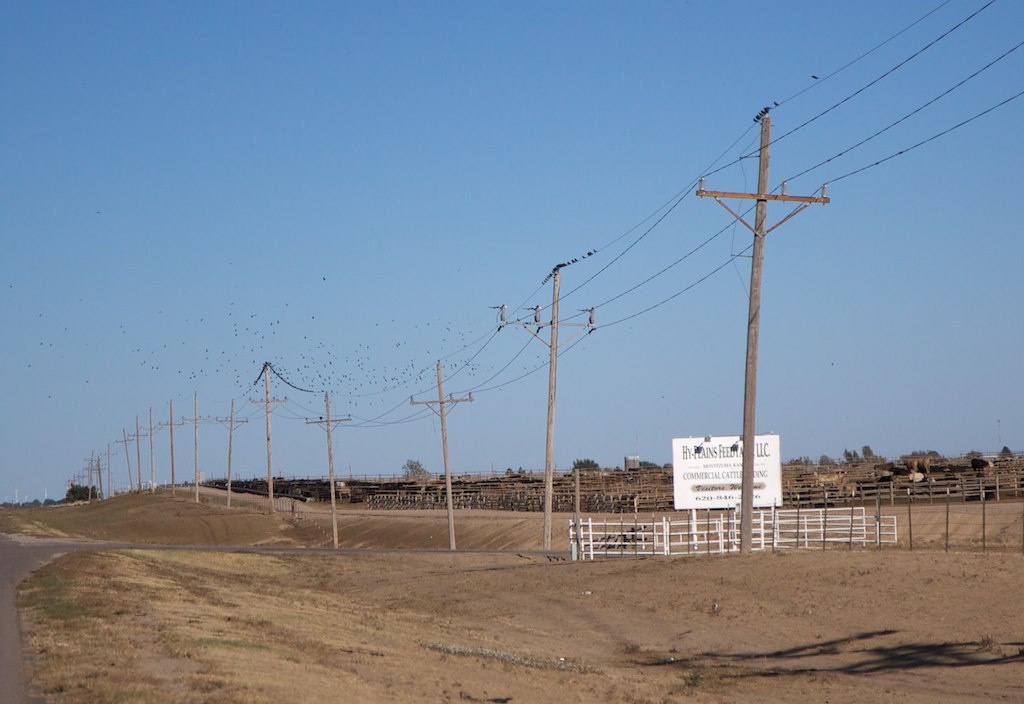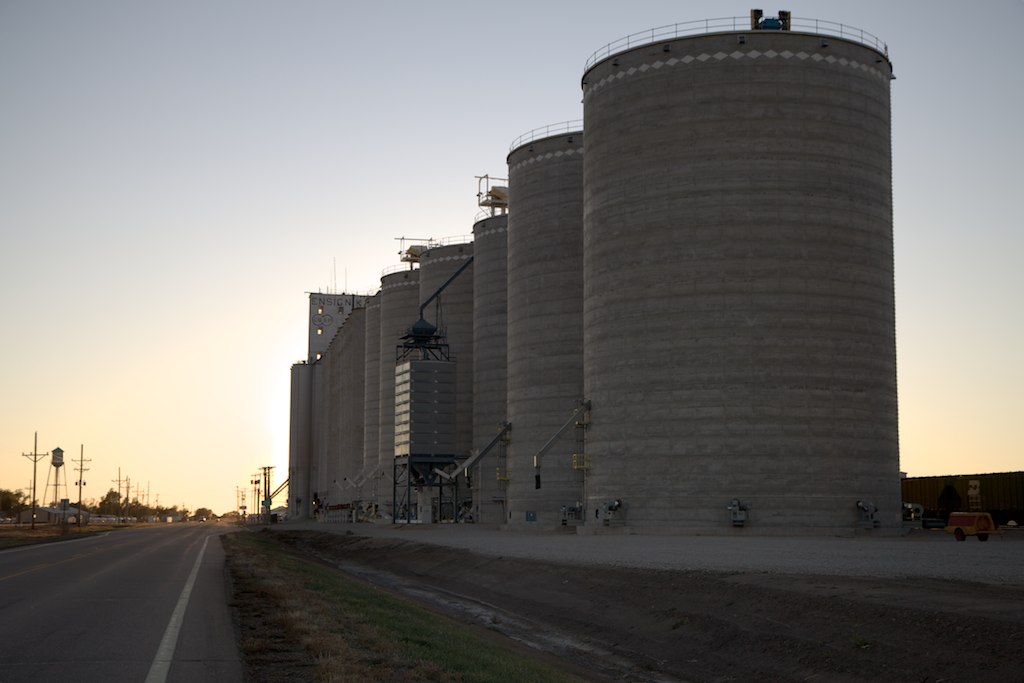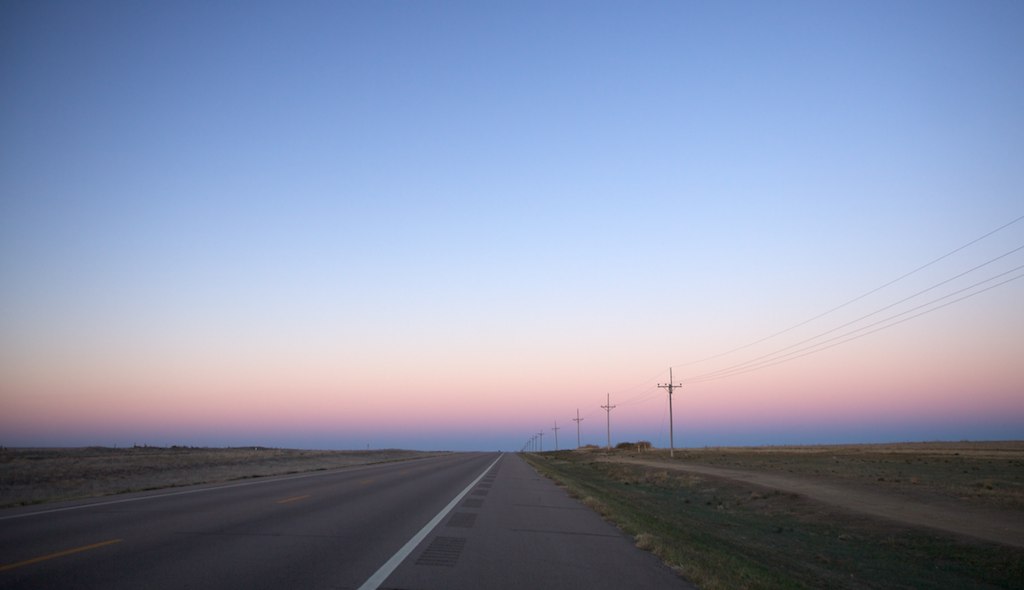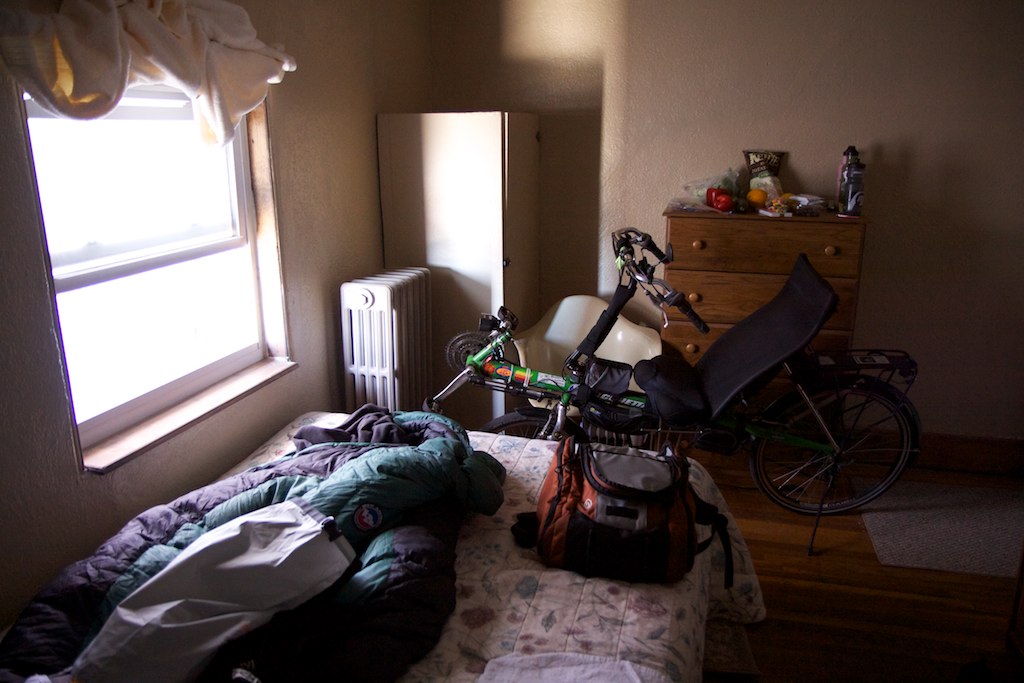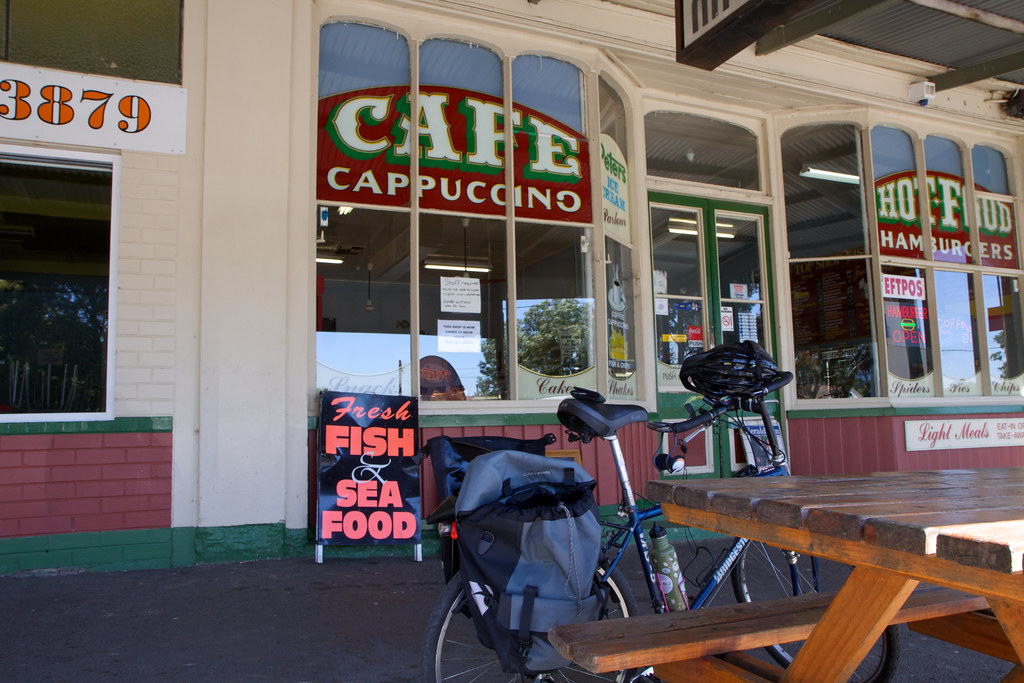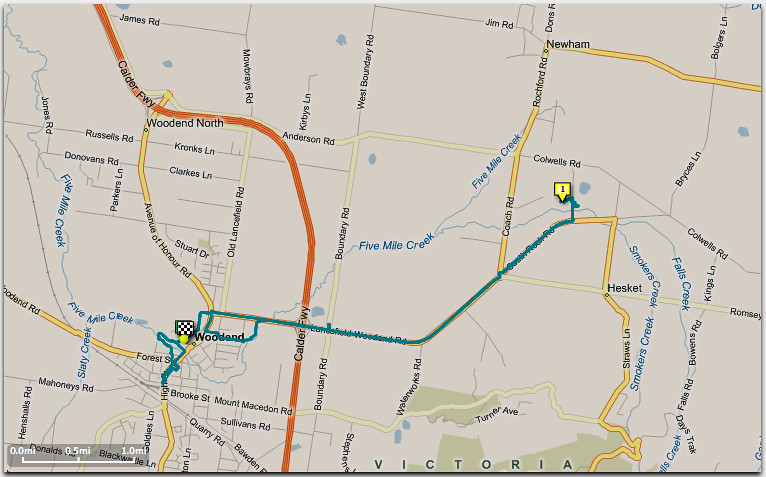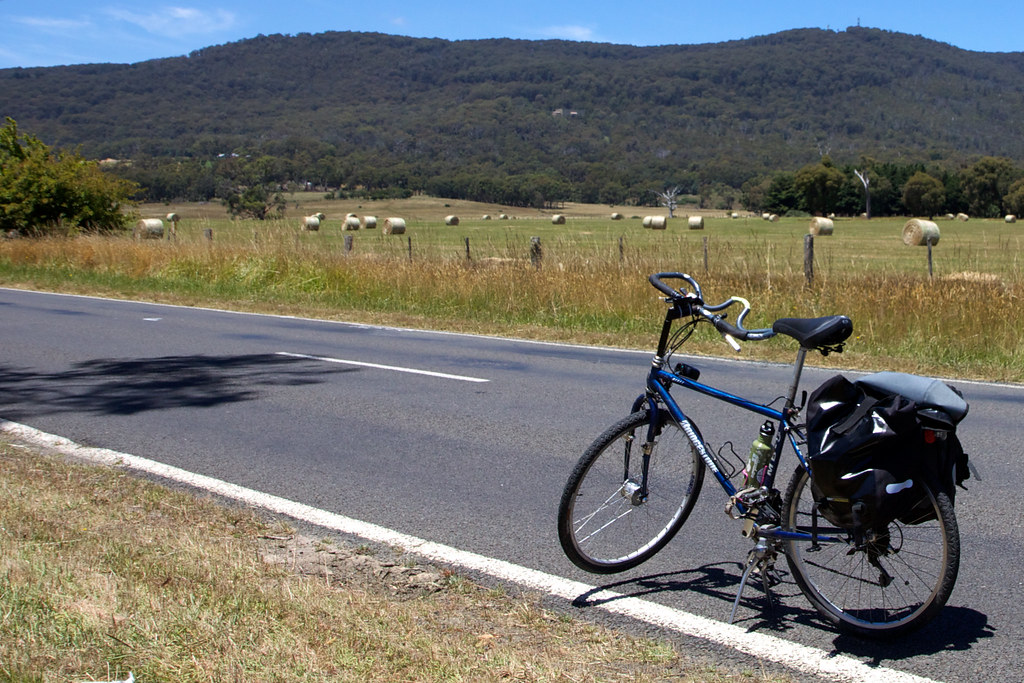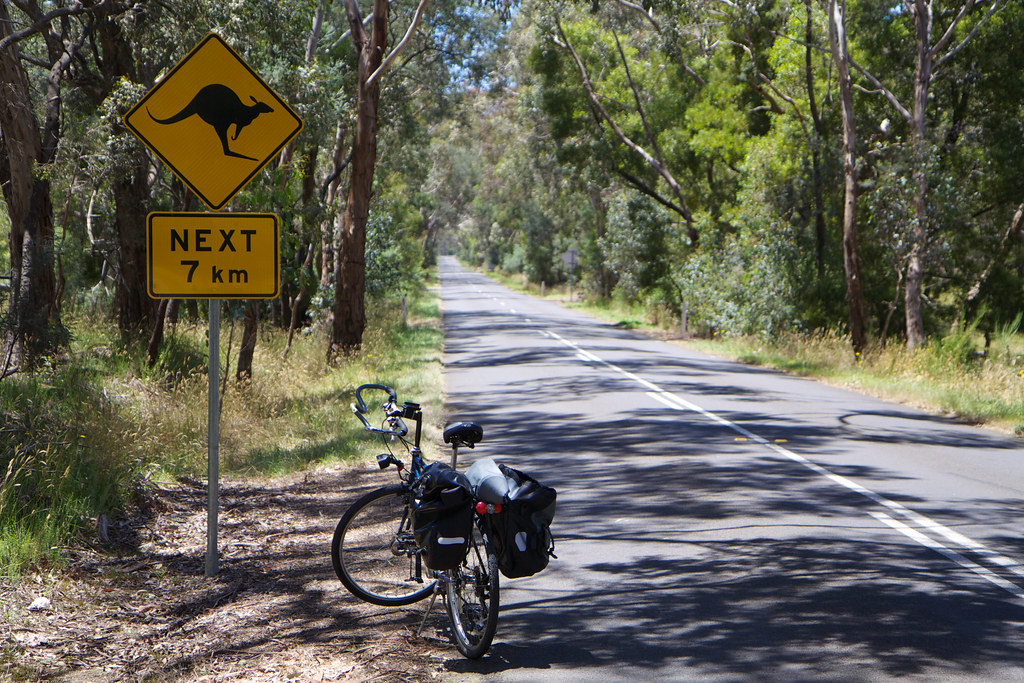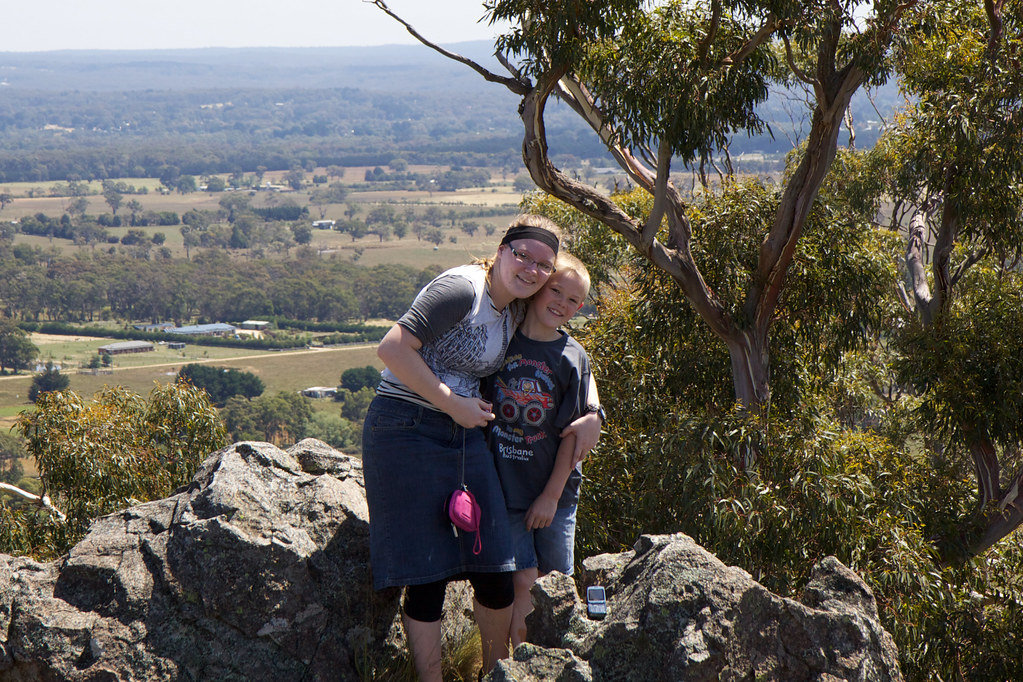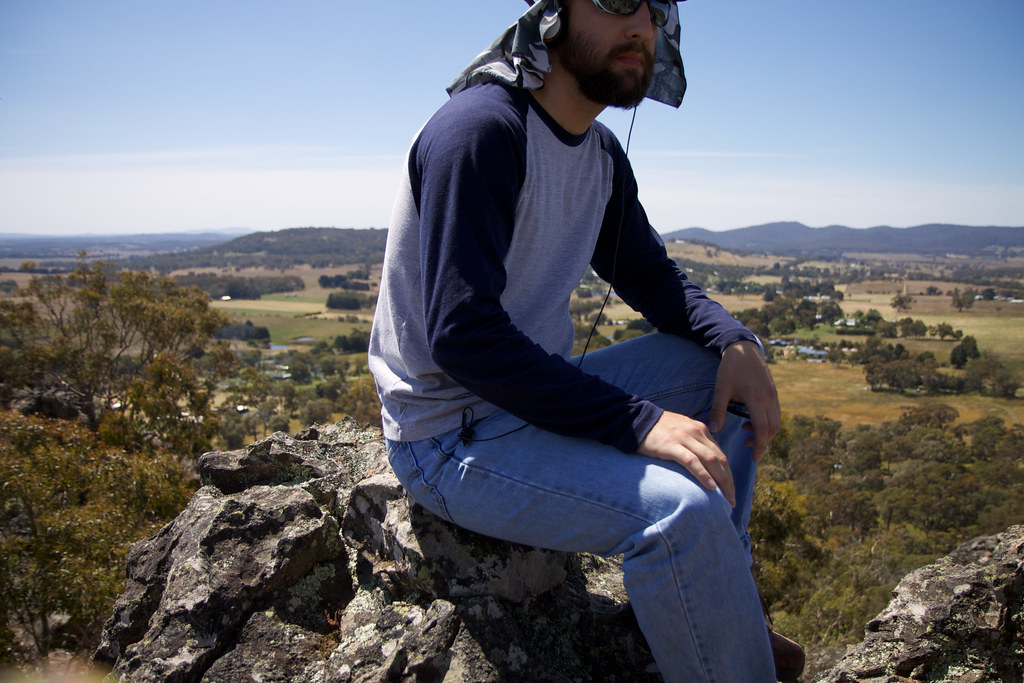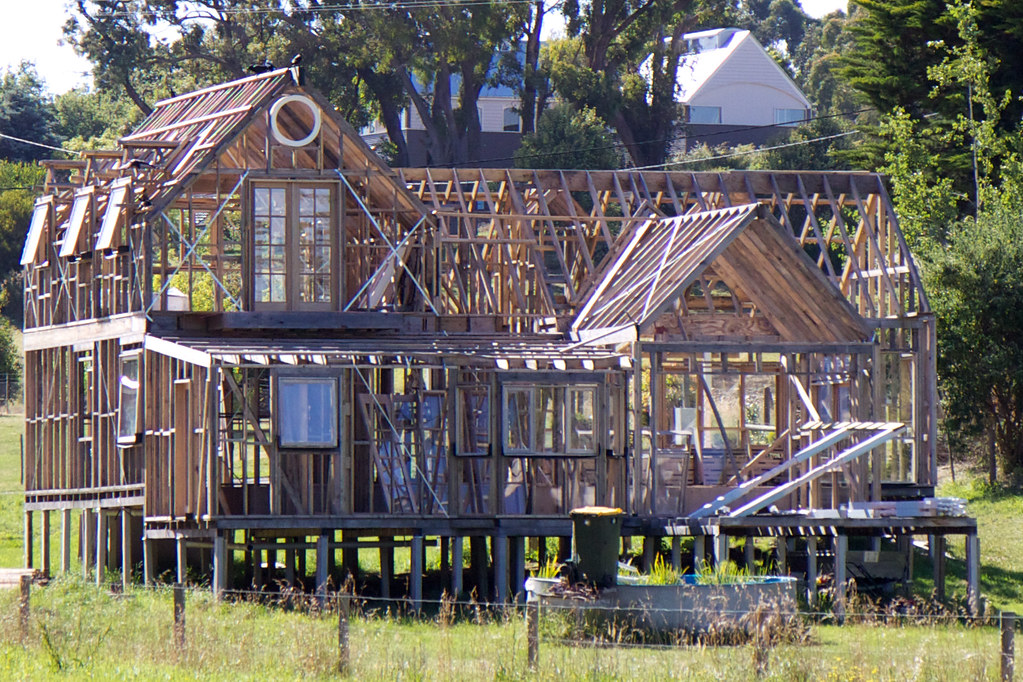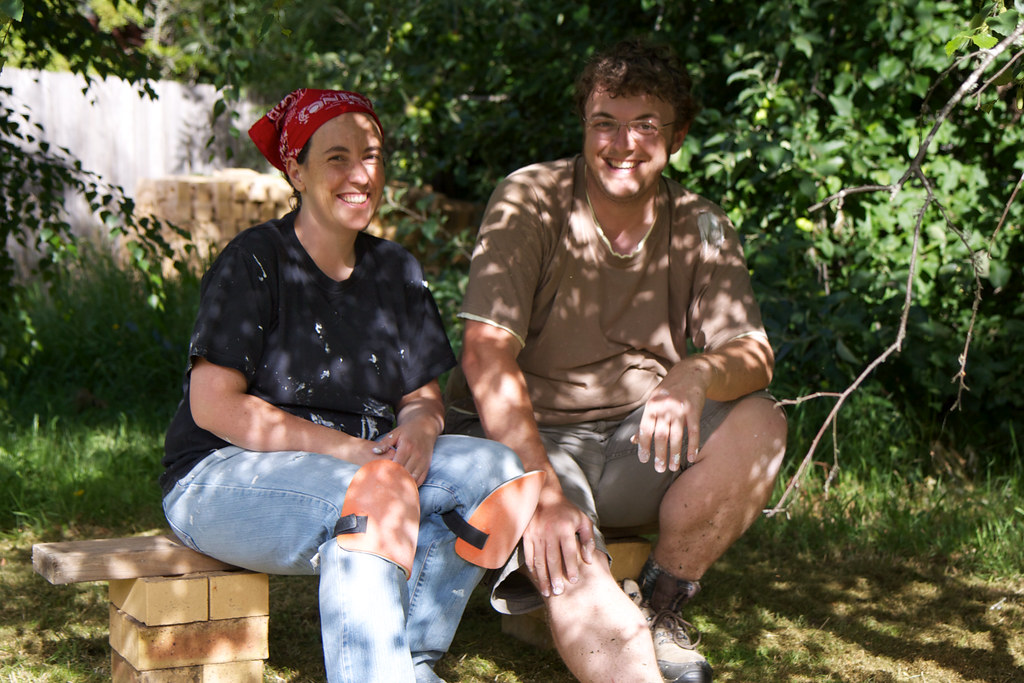Today I passed over land that was even more flat and empty than yesterday. I didn’t think it could get any more so. Yeeee-haw!
I continue to be a curiosity to everyone I pass. I really don’t mind it, and welcome their questions, except for one thing: People in cars who tail just behind me, getting a reeeaaal good look, like they’re bulls deciding whether to charge. Creeps me out.
So far there have been two incidents where I got worried. One was a group of teenagers crammed into a car parked on the opposite side of the empty highway, who stared at me as I rode by, then started their car and joined the road a minute later. I imagined I could hear one of them pitching the idea of “let’s run that guy off the road, haw haw!” to the others. Fortunately, they drove in the opposite direction, and I relaxed.
The second incident was when an old man and his wife pulled over in the middle of a dusty intersection to ask me a bunch of questions about where I was going and what my bike was like. I was transferring water from my big container to my bottle at the time. The conversation was fine, but after a minute the old man saw a car on the horizon, realized he was blocking the intersection, and began to reverse his truck towards the curb. For a few seconds it looked like he might plow into my bike.
I would have been very upset, but, imagine also how the old man would have felt: He pulls over to make conversation, and ends up destroying my vehicle and ending my journey. I bet he would have felt like a dumbass for years afterwards.
{ "lat":[37.575638,37.575634,37.57531,37.575306,37.575306,37.575306,37.575306,37.575256,37.575287,37.575283,37.575287,37.575294,37.575356,37.575386,37.575474,37.575565,37.575615,37.575619,37.575619,37.575615,37.575607,37.575527,37.575348,37.575245,37.575249,37.575367,37.575527,37.575653,37.575733,37.575813,37.575939,37.576042,37.576145,37.576317,37.576431,37.576508,37.576481,37.576439,37.576416,37.576393,37.576344,37.576302,37.576283,37.576218,37.57613,37.576134,37.576229,37.576275,37.57629,37.576252,37.576237,37.576149,37.576122,37.57613,37.576164,37.576241,37.57629,37.576275,37.576214,37.57618,37.576126,37.576126,37.576187,37.576191,37.576191,37.576191,37.576191,37.576214,37.576221,37.576229,37.576202,37.576202,37.576176,37.576164,37.576115,37.576096,37.576092,37.576031,37.575958,37.575817,37.575798,37.575752,37.575726,37.575722,37.575722,37.575722,37.575722,37.575722,37.575722,37.575722,37.575722,37.575722,37.575722,37.575722,37.57571,37.575684,37.575603,37.575485,37.575382,37.575298,37.575279,37.575253,37.57523,37.575203,37.575043,37.57494,37.574802,37.574665,37.57452,37.574333,37.574238,37.57412,37.574001,37.573895,37.573765,37.573666,37.573528,37.573517,37.573399,37.57328,37.573135,37.57312,37.573002,37.572826,37.572781,37.572731,37.572674,37.572613,37.572582,37.572525,37.572464,37.572395,37.572327,37.572254,37.572182,37.572105,37.572029,37.571957,37.57188,37.5718,37.57172,37.57164,37.57156,37.57148,37.5714,37.57132,37.571236,37.571156,37.571007,37.57093,37.57085,37.570774,37.570698,37.57048,37.57029,37.57016,37.569988,37.569939,37.569897,37.569851,37.569798,37.569641,37.569523,37.569454,37.569435,37.569408,37.569386,37.569366,37.569351,37.569283,37.569233,37.569168,37.569099,37.569073,37.569054,37.569035,37.569016,37.569,37.568928,37.568863,37.568783,37.568764,37.568745,37.568726,37.568703,37.568634,37.568546,37.568508,37.568489,37.568474,37.568451,37.568428,37.568333,37.568218,37.568199,37.568184,37.568165,37.568142,37.568123,37.568012,37.567951,37.567932,37.567913,37.567894,37.567879,37.567799,37.567707,37.567661,37.567642,37.567619,37.5676,37.567577,37.567486,37.56741,37.567345,37.567333,37.567314,37.567295,37.567272,37.567253,37.567162,37.567047,37.567028,37.567005,37.566982,37.566963,37.566853,37.566742,37.566681,37.566658,37.566639,37.56662,37.566601,37.566517,37.566429,37.566353,37.566334,37.566315,37.566292,37.566273,37.566254,37.566139,37.566013,37.566002,37.565979,37.565956,37.565933,37.565914,37.56575,37.565632,37.565552,37.565533,37.56551,37.565491,37.565472,37.565338,37.565228,37.565144,37.565132,37.565109,37.565094,37.565071,37.565048,37.564968,37.564884,37.564827,37.564732,37.564632,37.564556,37.564529,37.564507,37.56448,37.564453,37.564342,37.564251,37.56411,37.564068,37.563808,37.563442,37.563179,37.562927,37.562901,37.562767,37.562546,37.562428,37.562416,37.562424,37.562534,37.562698,37.562832,37.562935,37.563061,37.563225,37.56324,37.563335,37.563488,37.563633,37.563717,37.563709,37.563709,37.563709,37.563709,37.563709,37.563705,37.563705,37.563683,37.563683,37.563683,37.563686,37.563686,37.563683,37.563629,37.563538,37.563519,37.563507,37.563602,37.563725,37.563889,37.563992,37.564075,37.564106,37.564121,37.564133,37.564152,37.564159,37.564178,37.56419,37.564194,37.564114,37.564014,37.563988,37.563965,37.563942,37.563919,37.563805,37.563717,37.563629,37.563557,37.563446,37.563366,37.563343,37.563324,37.563305,37.563282,37.563099,37.562973,37.562866,37.562847,37.562824,37.562805,37.562782,37.562675,37.56255,37.562504,37.562489,37.562473,37.562458,37.562439,37.562351,37.562286,37.56226,37.562244,37.562233,37.562218,37.562206,37.562153,37.562103,37.562069,37.562042,37.562035,37.562031,37.562027,37.562019,37.561985,37.561951,37.561935,37.561913,37.561905,37.561901,37.561893,37.56189,37.561874,37.561852,37.561825,37.56179,37.561764,37.561752,37.561733,37.561741,37.561737,37.561737,37.561733,37.561737,37.561733,37.561737,37.561737,37.561737,37.561737,37.561737,37.561741,37.561745,37.561741,37.561737,37.561737,37.561745,37.561749,37.561752,37.561749,37.561745,37.561745,37.561741,37.561737,37.561737,37.561737,37.561737,37.561737,37.561741,37.561741,37.561749,37.561752,37.561756,37.561752,37.561752,37.561752,37.561749,37.561752,37.561749,37.561749,37.561749,37.561752,37.561752,37.561756,37.561756,37.561756,37.56176,37.56176,37.561752,37.561749,37.561745,37.561749,37.561752,37.561752,37.561752,37.561749,37.561752,37.56176,37.561764,37.561764,37.56176,37.561752,37.561764,37.561764,37.561764,37.561756,37.561764,37.56176,37.561764,37.561771,37.561768,37.561771,37.561771,37.561768,37.561768,37.561764,37.56176,37.56176,37.561764,37.561771,37.561771,37.561775,37.561783,37.561787,37.561779,37.561779,37.561779,37.561783,37.56179,37.561779,37.561779,37.561775,37.561779,37.561775,37.561783,37.561783,37.56179,37.561787,37.56179,37.561787,37.561787,37.561787,37.561783,37.561779,37.561779,37.561783,37.561787,37.56179,37.561802,37.561806,37.56179,37.56181,37.561813,37.561813,37.561813,37.561817,37.561821,37.561825,37.561825,37.561825,37.561825,37.561821,37.561817,37.561821,37.561832,37.561836,37.561836,37.561836,37.561836,37.561836,37.561836,37.56184,37.561855,37.56184,37.561836,37.561832,37.561836,37.56184,37.561836,37.561829,37.56181,37.561806,37.561817,37.561852,37.561844,37.561829,37.561836,37.561855,37.561871,37.561859,37.561852,37.561852,37.561855,37.561855,37.561855,37.561852,37.561848,37.561852,37.561855,37.561852,37.561855,37.561855,37.561859,37.561859,37.561859,37.561859,37.561859,37.561867,37.561867,37.561867,37.561867,37.561863,37.561863,37.561863,37.561871,37.561874,37.561871,37.561871,37.561874,37.561871,37.561874,37.561886,37.561882,37.561886,37.561878,37.561874,37.561871,37.561863,37.561871,37.561871,37.561878,37.561874,37.561878,37.561882,37.561882,37.561878,37.561878,37.561878,37.56189,37.56189,37.56189,37.56189,37.561886,37.56189,37.561901,37.561905,37.561905,37.561901,37.561897,37.56189,37.56189,37.561886,37.561893,37.561901,37.561901,37.561905,37.561909,37.561916,37.561905,37.561909,37.561916,37.561905,37.561905,37.561916,37.561909,37.561905,37.561901,37.561901,37.561893,37.561886,37.561886,37.561893,37.561897,37.561901,37.561901,37.561901,37.561909,37.561909,37.561909,37.561901,37.561905,37.561905,37.561905,37.561909,37.561905,37.561909,37.561909,37.561913,37.561905,37.561901,37.561909,37.561909,37.561913,37.561916,37.561913,37.561913,37.561913,37.561913,37.561913,37.561916,37.561916,37.56192,37.561924,37.561913,37.56192,37.56192,37.561924,37.56192,37.561928,37.561924,37.56192,37.561924,37.56192,37.561924,37.561924,37.56192,37.561924,37.561928,37.561924,37.561924,37.561928,37.561928,37.561924,37.56192,37.561924,37.56192,37.561924,37.561924,37.561928,37.561939,37.561939,37.561939,37.561939,37.561939,37.561932,37.561928,37.561935,37.561939,37.561935,37.561935,37.561932,37.561932,37.561935,37.561932,37.561928,37.561935,37.561935,37.561935,37.561932,37.561932,37.561924,37.561924,37.561924,37.561928,37.561928,37.561924,37.561928,37.561928,37.561924,37.561935,37.561928,37.561928,37.561928,37.561928,37.561932,37.561932,37.561935,37.561939,37.561939,37.561939,37.561939,37.561935,37.561935,37.561928,37.561935,37.561935,37.561935,37.561935,37.561935,37.561939,37.561939,37.561943,37.561947,37.561943,37.561947,37.561947,37.561935,37.561939,37.561943,37.561947,37.561947,37.561951,37.561932,37.561951,37.561951,37.561954,37.561947,37.561947,37.561947,37.561947,37.561947,37.561947,37.561954,37.561958,37.561958,37.561951,37.561951,37.561954,37.561954,37.561954,37.561954,37.561958,37.561958,37.561962,37.561962,37.561962,37.561966,37.561974,37.56197,37.56197,37.561974,37.56197,37.561974,37.561974,37.561974,37.561977,37.561974,37.561974,37.561974,37.561974,37.561974,37.561974,37.561974,37.561974,37.561974,37.561977,37.561985,37.562,37.561985,37.561977,37.561977,37.561977,37.561977,37.561977,37.561981,37.561981,37.561977,37.561977,37.561985,37.561985,37.561989,37.561985,37.561985,37.561989,37.561993,37.561993,37.561993,37.561996,37.561993,37.561993,37.561993,37.561993,37.561996,37.561993,37.561993,37.561996,37.561993,37.561996,37.561996,37.561996,37.561996,37.562004,37.561996,37.562,37.562,37.562004,37.562008,37.562008,37.562008,37.562019,37.562019,37.562008,37.562008,37.562012,37.562016,37.562012,37.562019,37.562016,37.562016,37.562008,37.562016,37.562019,37.562027,37.562023,37.562027,37.562023,37.562023,37.562023,37.562031,37.562016,37.562027,37.562027,37.562035,37.562035,37.562031,37.562027,37.562031,37.562035,37.562031,37.562031,37.562023,37.562027,37.562038,37.562038,37.562038,37.562038,37.562027,37.562027,37.562035,37.562042,37.562046,37.562042,37.56205,37.56205,37.562054,37.562054,37.562057,37.562054,37.562054,37.562054,37.562054,37.562046,37.562046,37.56205,37.56208,37.562103,37.562096,37.562073,37.562065,37.562073,37.562069,37.562057,37.562057,37.562061,37.562054,37.562061,37.562061,37.562069,37.562069,37.562073,37.562069,37.562077,37.56208,37.562077,37.562077,37.562077,37.562077,37.56208,37.56208,37.56208,37.562092,37.562088,37.56208,37.562088,37.562092,37.562096,37.562107,37.562096,37.562099,37.562107,37.562096,37.562099,37.562103,37.562107,37.562107,37.562107,37.562107,37.562115,37.562119,37.562126,37.562134,37.562134,37.56213,37.56213,37.56213,37.562122,37.562134,37.562138,37.562141,37.562138,37.562134,37.562134,37.562134,37.562134,37.562138,37.562141,37.562141,37.562141,37.562138,37.562138,37.562145,37.562145,37.562145,37.562149,37.562149,37.562149,37.56216,37.562164,37.56216,37.56216,37.562164,37.562168,37.562164,37.562168,37.562168,37.562168,37.562168,37.562172,37.562172,37.562176,37.56218,37.56218,37.56218,37.562176,37.562176,37.562176,37.56218,37.562187,37.562183,37.562183,37.562183,37.562183,37.562183,37.562183,37.562191,37.562191,37.562191,37.562191,37.562195,37.562199,37.562199,37.562199,37.562202,37.562206,37.562202,37.562206,37.562206,37.562206,37.562206,37.56221,37.562214,37.562214,37.562214,37.562218,37.562218,37.562222,37.562229,37.562225,37.562229,37.562225,37.562229,37.562229,37.562233,37.562237,37.562237,37.562237,37.562241,37.562244,37.562244,37.562244,37.562248,37.562248,37.562244,37.562252,37.56226,37.562271,37.562256,37.56226,37.56226,37.56226,37.562263,37.562263,37.562263,37.562267,37.562267,37.562271,37.562271,37.562271,37.562271,37.562275,37.562279,37.562275,37.562275,37.562283,37.56229,37.562286,37.562294,37.562294,37.562294,37.562298,37.562302,37.562302,37.562302,37.562305,37.562305,37.562305,37.562302,37.562302,37.562302,37.562351,37.56237,37.562302,37.562309,37.562313,37.562313,37.562313,37.562313,37.562321,37.562317,37.562328,37.562328,37.562309,37.562309,37.562309,37.562313,37.562317,37.562317,37.562317,37.562332,37.562344,37.56234,37.562328,37.562328,37.562328,37.562325,37.562336,37.562332,37.562325,37.562325,37.562328,37.562336,37.562325,37.562325,37.562332,37.562328,37.562336,37.562347,37.562355,37.562351,37.562344,37.56234,37.562347,37.562336,37.562351,37.562351,37.562344,37.562344,37.562336,37.562344,37.562344,37.562347,37.56234,37.562363,37.562355,37.562366,37.562374,37.562378,37.56237,37.562378,37.56237,37.562374,37.56237,37.562366,37.56237,37.562363,37.562351,37.562355,37.562347,37.562351,37.562355,37.562347,37.56234,37.562328,37.562336,37.562347,37.562347,37.562355,37.562351,37.562351,37.562351,37.562351,37.562355,37.562363,37.562363,37.562363,37.562363,37.562351,37.562355,37.562355,37.562351,37.562355,37.562355,37.562424,37.562428,37.562389,37.56237,37.562366,37.562355,37.562332,37.562336,37.562344,37.562347,37.562351,37.562351,37.562355,37.562359,37.562355,37.562359,37.562363,37.562366,37.562359,37.562363,37.562359,37.562363,37.562363,37.562363,37.562363,37.562366,37.562363,37.562363,37.562366,37.562363,37.562363,37.562359,37.562355,37.562355,37.562351,37.562351,37.562351,37.562344,37.56234,37.56234,37.562332,37.562328,37.562321,37.562325,37.562328,37.562328,37.562325,37.562317,37.562317,37.562317,37.562305,37.562305,37.562309,37.562305,37.562309,37.562298,37.56229,37.562283,37.562286,37.562275,37.562283,37.562279,37.562332,37.56234,37.562344,37.562347,37.562344,37.562347,37.562344,37.562298,37.56229,37.56229,37.562279,37.562279,37.562279,37.562275,37.562267,37.562267,37.562267,37.562267,37.562267,37.562267,37.562275,37.562271,37.562263,37.562263,37.56226,37.562256,37.562256,37.562256,37.562256,37.562256,37.562252,37.562241,37.562241,37.562233,37.562237,37.562229,37.562222,37.562229,37.562225,37.562225,37.562222,37.562218,37.562214,37.56221,37.562214,37.562206,37.56221,37.562218,37.562218,37.562222,37.562222,37.562218,37.562214,37.56221,37.562206,37.562195,37.562199,37.562191,37.562191,37.562191,37.562191,37.562191,37.562187,37.562195,37.562202,37.562191,37.562183,37.562183,37.56218,37.562187,37.562199,37.562195,37.562191,37.562195,37.562199,37.562199,37.562195,37.562187,37.562183,37.562187,37.562183,37.562187,37.562187,37.56218,37.562187,37.562191,37.562183,37.562183,37.562187,37.562183,37.56218,37.56218,37.56218,37.56218,37.562183,37.562172,37.56218,37.56218,37.562176,37.562176,37.562176,37.562172,37.562168,37.562168,37.562168,37.562172,37.562168,37.562172,37.562172,37.562164,37.562164,37.562164,37.562164,37.562164,37.56216,37.562157,37.562164,37.562164,37.562157,37.562157,37.562157,37.562153,37.562157,37.56216,37.562157,37.562157,37.562164,37.562168,37.562172,37.562153,37.562149,37.562149,37.562149,37.562153,37.562149,37.562153,37.56216,37.562149,37.562153,37.562145,37.562149,37.562145,37.562141,37.562149,37.562141,37.562138,37.562141,37.562145,37.562134,37.56213,37.56213,37.562126,37.562126,37.562126,37.56213,37.562134,37.56213,37.562134,37.562126,37.56213,37.56213,37.562119,37.562111,37.562107,37.562111,37.562111,37.562122,37.56213,37.562126,37.562122,37.562126,37.562119,37.562157,37.562168,37.562115,37.56213,37.562122,37.562119,37.562122,37.562115,37.562115,37.562119,37.562115,37.562107,37.562099,37.562107,37.562126,37.562111,37.562107,37.562103,37.562099,37.562099,37.562103,37.562096,37.562096,37.562088,37.562099,37.562088,37.562096,37.562092,37.562092,37.562092,37.562092,37.562088,37.562088,37.562096,37.562092,37.562088,37.562092,37.562088,37.562096,37.562088,37.56208,37.562084,37.562084,37.56208,37.562084,37.56208,37.562077,37.562077,37.562073,37.562073,37.562077,37.562069,37.562073,37.562073,37.562073,37.562065,37.562065,37.562065,37.562065,37.562069,37.562073,37.562065,37.562065,37.562065,37.562065,37.562073,37.562084,37.562069,37.562069,37.562069,37.562069,37.562065,37.562065,37.562065,37.562065,37.562065,37.562065,37.562073,37.562149,37.562153,37.562138,37.562141,37.562141,37.562145,37.562145,37.562145,37.562138,37.562138,37.562115,37.562054,37.562057,37.562057,37.562057,37.562057,37.562057,37.562057,37.562054,37.562061,37.562057,37.562057,37.562057,37.562057,37.562054,37.562054,37.562054,37.562054,37.562054,37.56205,37.562046,37.562046,37.56205,37.56205,37.562054,37.56205,37.562046,37.562038,37.562038,37.562046,37.562038,37.562042,37.562042,37.562046,37.562042,37.562042,37.562038,37.562035,37.562035,37.562035,37.562035,37.562038,37.562035,37.562035,37.562035,37.562038,37.562038,37.562042,37.562035,37.562038,37.562038,37.562038,37.56205,37.562042,37.56205,37.56205,37.56205,37.562046,37.562046,37.562046,37.56205,37.562038,37.562038,37.562038,37.562042,37.562042,37.562042,37.562042,37.562038,37.562042,37.562035,37.562035,37.562038,37.562038,37.562038,37.562038,37.562046,37.562046,37.562038,37.562035,37.562035,37.562035,37.562042,37.562046,37.562038,37.562042,37.562042,37.562038,37.562042,37.562042,37.562042,37.562042,37.562042,37.562038,37.562038,37.562038,37.562042,37.562042,37.562038,37.562042,37.562046,37.562042,37.562054,37.562057,37.56205,37.56205,37.56205,37.562054,37.562054,37.562054,37.56205,37.56205,37.562054,37.562054,37.562057,37.562057,37.562057,37.562054,37.562054,37.562054,37.56205,37.56205,37.562054,37.562054,37.562057,37.562057,37.562057,37.562057,37.562057,37.562061,37.562057,37.562061,37.562061,37.562069,37.562069,37.562057,37.562065,37.562061,37.562061,37.562061,37.562065,37.562073,37.562065,37.562069,37.562069,37.562069,37.562061,37.562065,37.562065,37.562065,37.562065,37.562065,37.562069,37.562065,37.562065,37.562073,37.562069,37.562069,37.562069,37.562069,37.562069,37.562069,37.562065,37.562069,37.562057,37.562069,37.562069,37.562069,37.562069,37.562069,37.562065,37.562061,37.562065,37.562065,37.562065,37.562061,37.562069,37.562069,37.56208,37.562088,37.562092,37.562092,37.562084,37.562084,37.56208,37.562073,37.562073,37.562077,37.562077,37.562073,37.562073,37.562077,37.562077,37.562073,37.562073,37.562077,37.562073,37.562077,37.56208,37.562077,37.562077,37.562069,37.562069,37.56208,37.562065,37.562065,37.562069,37.562065,37.562065,37.562069,37.562073,37.562069,37.562084,37.562069,37.562065,37.562065,37.562077,37.562099,37.562088,37.56208,37.562077,37.562077,37.562069,37.562073,37.562061,37.562065,37.562061,37.562061,37.562069,37.562069,37.562077,37.562073,37.562069,37.562065,37.562065,37.562069,37.562069,37.562069,37.562069,37.56208,37.562077,37.562061,37.562069,37.562069,37.562065,37.562073,37.56208,37.562077,37.562065,37.562077,37.562073,37.562073,37.562069,37.562073,37.562084,37.562061,37.562061,37.562065,37.562069,37.562069,37.562073,37.562073,37.562077,37.562073,37.562073,37.562069,37.562073,37.562065,37.562069,37.562065,37.562073,37.56208,37.562073,37.562061,37.562065,37.562065,37.562073,37.562065,37.562069,37.562069,37.562069,37.562065,37.562069,37.562069,37.562073,37.562073,37.562069,37.562069,37.562069,37.562065,37.562061,37.562069,37.562069,37.562061,37.562069,37.562077,37.562073,37.562069,37.56208,37.562084,37.562077,37.56208,37.562088,37.562084,37.562073,37.562073,37.562073,37.562065,37.56205,37.562057,37.562065,37.562065,37.562069,37.562065,37.562073,37.562061,37.562046,37.56205,37.562057,37.562061,37.562065,37.562057,37.562061,37.562057,37.562061,37.562061,37.562061,37.562065,37.562073,37.562088,37.562088,37.562103,37.562092,37.562092,37.562092,37.562077,37.562077,37.562084,37.562088,37.562088,37.562092,37.562092,37.562092,37.562092,37.562092,37.562088,37.562088,37.562084,37.56208,37.562092,37.562088,37.562084,37.562084,37.562077,37.562088,37.562096,37.562092,37.562092,37.562092,37.562092,37.562092,37.562088,37.562092,37.562092,37.562092,37.562084,37.562077,37.562092,37.562092,37.562111,37.562103,37.562107,37.562111,37.562122,37.562107,37.562103,37.56208,37.562084,37.562092,37.562099,37.562103,37.562126,37.562138,37.562126,37.562107,37.562099,37.562103,37.562107,37.562115,37.562122,37.562119,37.562115,37.562122,37.562122,37.562126,37.562119,37.562115,37.562119,37.562119,37.562111,37.562099,37.562096,37.562099,37.562099,37.562103,37.562092,37.562111,37.562103,37.562107,37.562119,37.562119,37.562119,37.562119,37.562119,37.562122,37.562134,37.562138,37.562138,37.562134,37.562134,37.562134,37.562138,37.562138,37.562138,37.562134,37.56213,37.562134,37.56213,37.56213,37.562111,37.562107,37.562107,37.562107,37.562107,37.562103,37.562111,37.562119,37.562126,37.562138,37.562141,37.562141,37.562153,37.562145,37.562141,37.562126,37.562099,37.562084,37.562084,37.562103,37.562107,37.562122,37.562141,37.562145,37.562145,37.562145,37.562145,37.562145,37.562145,37.562145,37.562134,37.56213,37.562126,37.562122,37.562122,37.562119,37.562119,37.562115,37.562107,37.562103,37.562107,37.562111,37.562107,37.562103,37.562103,37.562099,37.562092,37.562092,37.562092,37.562084,37.562088,37.562092,37.562092,37.562084,37.562084,37.562096,37.562111,37.562111,37.562092,37.56208,37.562092,37.562096,37.562099,37.562103,37.562103,37.562099,37.562099,37.562092,37.562088,37.562084,37.56208,37.562084,37.562084,37.562096,37.562092,37.562092,37.562088,37.562088,37.562092,37.562099,37.562107,37.562107,37.562107,37.562107,37.562103,37.562107,37.562107,37.562115,37.562122,37.562119,37.562122,37.56213,37.562134,37.562138,37.562134,37.56213,37.562134,37.56213,37.562126,37.562122,37.562122,37.562119,37.562119,37.562119,37.562115,37.562115,37.562111,37.562111,37.562103,37.562111,37.562119,37.562115,37.562115,37.562115,37.562111,37.562107,37.562111,37.562107,37.562115,37.562115,37.562111,37.562111,37.562111,37.562115,37.562122,37.562122,37.562134,37.56213,37.562134,37.562134,37.562138,37.562134,37.562141,37.562149,37.562172,37.56218,37.56218,37.562176,37.562176,37.562172,37.562172,37.562157,37.562149,37.562157,37.562145,37.562153,37.562149,37.562157,37.562168,37.562164,37.562141,37.56216,37.562172,37.562168,37.562168,37.562168,37.562164,37.56216,37.56216,37.56216,37.562157,37.562157,37.562153,37.562157,37.562172,37.562191,37.562172,37.562176,37.562176,37.56218,37.562187,37.562187,37.562206,37.562218,37.562222,37.562218,37.562237,37.562241,37.562233,37.562206,37.562176,37.562016,37.561985,37.561958,37.561996,37.562222,37.562424,37.562565,37.562752,37.562904,37.563053,37.563164,37.563305,37.563412,37.563545,37.563629,37.563641,37.563747,37.563763,37.56377,37.563808,37.56366,37.563656,37.563652,37.563652,37.563648,37.563519,37.563519,37.563519,37.563519,37.563519,37.56353,37.56353,37.56353,37.56353,37.56353,37.563629,37.563629,37.563629,37.563629,37.563629,37.563675,37.563831,37.56395,37.56414,37.564194,37.564232,37.564266,37.564301,37.56432,37.56432,37.564323,37.564388,37.564518,37.56464,37.564678,37.564739,37.564789,37.564831,37.565041,37.565136,37.565186,37.565235,37.565289,37.565334,37.565533,37.565582,37.565636,37.565693,37.565746,37.565876,37.566002,37.566093,37.566128,37.566162,37.566193,37.566212,37.56625,37.566345,37.566437,37.566498,37.566517,37.56654,37.566559,37.566574,37.566631,37.5667,37.566807,37.566879,37.567013,37.567024,37.567047,37.56707,37.567093,37.56712,37.5672,37.567268,37.567341,37.567352,37.567364,37.567383,37.567406,37.567436,37.567455,37.567501,37.567505,37.56744,37.567402,37.567383,37.567379,37.567364,37.56744,37.567532,37.567608,37.567703,37.56781,37.56789,37.568035,37.568226,37.568367,37.568504,37.568676,37.56884,37.569016,37.56913,37.569317,37.569458,37.56963,37.569813,37.569958,37.570053,37.570194,37.570312,37.570408,37.570499,37.57058,37.57061,37.570637,37.570663,37.570694,37.570721,37.570869,37.570984,37.571171,37.571323,37.571442,37.571571,37.571625,37.571655,37.571682,37.571712,37.571743,37.571938,37.572121,37.572208,37.572372,37.572536,37.572704,37.572868,37.572903,37.572933,37.572964,37.57299,37.573021,37.573143,37.573166,37.57317,37.57325,37.573315,37.57341,37.573544,37.573681,37.573788,37.573952,37.574108,37.574234,37.57436,37.574474,37.574631,37.574783,37.574924,37.575062,37.575195,37.575287,37.575321,37.575356,37.57539,37.57542,37.575562,37.575756,37.575935,37.576115,37.576313,37.576523,37.576691,37.576843,37.577007,37.57716,37.577332,37.577419,37.577457,37.577492,37.577526,37.577576,37.577805,37.577923,37.578022,37.57814,37.578251,37.578392,37.578529,37.578659,37.578785,37.578903,37.579048,37.57917,37.579277,37.579422,37.579552,37.579639,37.579754,37.579884,37.580078,37.580254,37.580368,37.580482,37.580643,37.580788,37.580872,37.58099,37.581135,37.581272,37.58139,37.581551,37.581688,37.581821,37.581917,37.582062,37.582188,37.582291,37.582413,37.582596,37.582729,37.582867,37.582947,37.582989,37.583012,37.583038,37.583061,37.583088,37.583248,37.583416,37.583542,37.583664,37.583843,37.584011,37.584137,37.584274,37.584419,37.584538,37.584679,37.584789,37.584919,37.585018,37.585133,37.585255,37.585361,37.585461,37.585537,37.58567,37.58577,37.58588,37.586029,37.586155,37.586273,37.586426,37.586552,37.586685,37.586845,37.586967,37.587078,37.587151,37.587181,37.587193,37.587208,37.587234,37.587265,37.587391,37.587486,37.58762,37.587757,37.587849,37.587982,37.588131,37.588234,37.588337,37.588436,37.588528,37.588608,37.588676,37.588787,37.588879,37.588947,37.589012,37.589035,37.589054,37.589081,37.5891,37.589176,37.589279,37.589394,37.589497,37.5896,37.58968,37.589699,37.589722,37.589748,37.589775,37.589855,37.589939,37.590034,37.59013,37.59021,37.590302,37.590401,37.590473,37.590576,37.590672,37.590771,37.590847,37.590931,37.590996,37.591095,37.591213,37.591312,37.591431,37.591595,37.591682,37.591797,37.5919,37.592022,37.592144,37.592178,37.592201,37.592228,37.592255,37.592373,37.592484,37.592632,37.592793,37.592983,37.593109,37.593204,37.593323,37.593407,37.593498,37.593613,37.593727,37.593826,37.593899,37.593983,37.59407,37.594166,37.594303,37.594425,37.594532,37.594658,37.594769,37.594902,37.594948,37.595036,37.595127,37.595215,37.595303,37.595413,37.595562,37.59568,37.595745,37.595844,37.595917,37.596058,37.596142,37.596256,37.596348,37.596455,37.596546,37.596649,37.59676,37.596859,37.596989,37.597061,37.597145,37.597191,37.597313,37.597363,37.597401,37.597435,37.597466,37.597496,37.597618,37.59771,37.597836,37.597942,37.598026,37.598141,37.598221,37.598278,37.598343,37.598427,37.598465,37.598549,37.598557,37.598598,37.598633,37.598667,37.598701,37.598736,37.598759,37.598804,37.598839,37.598896,37.598919,37.599007,37.59903,37.599026,37.599083,37.599201,37.599316,37.59943,37.599514,37.599552,37.599579,37.599602,37.599625,37.59964,37.599689,37.599743,37.599827,37.599884,37.599976,37.60006,37.600178,37.600258,37.600338,37.60041,37.600483,37.600544,37.600616,37.600716,37.6008,37.600903,37.60099,37.601089,37.601231,37.60133,37.601448,37.601574,37.601669,37.601692,37.601719,37.601749,37.60178,37.60181,37.601952,37.602146,37.602287,37.602398,37.602505,37.602604,37.602699,37.602821,37.602921,37.603073,37.603195,37.603313,37.603397,37.603539,37.603653,37.603752,37.603851,37.60397,37.604099,37.604286,37.604324,37.604347,37.604374,37.604397,37.604424,37.604515,37.60463,37.604786,37.604942,37.605053,37.605206,37.605289,37.605312,37.605335,37.605358,37.605381,37.605537,37.605637,37.605762,37.605877,37.605953,37.606022,37.606091,37.606232,37.606293,37.606373,37.6064,37.606419,37.606438,37.606457,37.606476,37.606552,37.606632,37.606709,37.606789,37.606911,37.607056,37.607185,37.607269,37.607353,37.607494,37.607559,37.607662,37.607723,37.607834,37.607918,37.608013,37.608097,37.608112,37.608131,37.608154,37.608177,37.608208,37.60828,37.60836,37.608459,37.608578,37.608692,37.608837,37.60894,37.609066,37.60918,37.609287,37.609322,37.609344,37.609367,37.609383,37.609402,37.609467,37.609467,37.609467,37.609535,37.609612,37.609699,37.609795,37.609909,37.610035,37.610165,37.610298,37.610401,37.610565,37.610767,37.610847,37.610882,37.610912,37.610939,37.61097,37.611103,37.611286,37.611412,37.611542,37.611649,37.611744,37.611908,37.612041,37.612202,37.612354,37.61253,37.612656,37.612801,37.612949,37.61311,37.61322,37.613338,37.61348,37.613628,37.613644,37.613777,37.613968,37.614082,37.614216,37.614376,37.614468,37.614616,37.614693,37.614708,37.614796,37.614948,37.615067,37.615177,37.615307,37.615437,37.615589,37.615677,37.615704,37.615734,37.615761,37.615795,37.615971,37.616093,37.616234,37.616276,37.616421,37.61655,37.616692,37.616821,37.616932,37.617027,37.617092,37.617229,37.61739,37.617512,37.617611,37.617718,37.617756,37.617786,37.617821,37.617851,37.617989,37.618095,37.618259,37.618393,37.618488,37.618614,37.618767,37.618874,37.618992,37.619106,37.61924,37.619373,37.619476,37.619621,37.61974,37.619865,37.619961,37.620064,37.620209,37.620239,37.620377,37.620518,37.620644,37.620754,37.620865,37.620922,37.621052,37.621178,37.6213,37.621407,37.621525,37.621609,37.621708,37.621811,37.621925,37.622036,37.622189,37.622269,37.622341,37.622433,37.622566,37.622696,37.622772,37.622883,37.623016,37.6231,37.623199,37.623249,37.623295,37.623302,37.623322,37.623413,37.623524,37.623608,37.623707,37.623798,37.623886,37.624004,37.624088,37.624168,37.624275,37.62439,37.624504,37.624599,37.624687,37.624775,37.624893,37.624989,37.625065,37.625191,37.625343,37.625469,37.625568,37.625683,37.625805,37.625935,37.626053,37.626152,37.62627,37.626373,37.62653,37.626545,37.626686,37.626816,37.626945,37.627056,37.627125,37.627228,37.6273,37.627407,37.627525,37.627659,37.627773,37.627895,37.628014,37.628143,37.628273,37.628349,37.62851,37.62862,37.628731,37.628857,37.628986,37.629116,37.629208,37.629353,37.62949,37.629585,37.629696,37.629845,37.629986,37.630108,37.63026,37.63039,37.630547,37.630695,37.630829,37.630959,37.631069,37.631165,37.631287,37.631397,37.631508,37.631611,37.631737,37.631824,37.631851,37.631874,37.631897,37.631924,37.632046,37.632164,37.632282,37.632401,37.632504,37.632652,37.632763,37.632866,37.632969,37.633087,37.63316,37.633232,37.633327,37.633404,37.633533,37.633659,37.633739,37.633846,37.633961,37.634083,37.634209,37.634315,37.634418,37.634506,37.634613,37.634716,37.634865,37.634983,37.635086,37.63517,37.635269,37.635338,37.635406,37.635456,37.635506,37.635551,37.635593,37.635662,37.635738,37.635853,37.635948,37.636105,37.6362,37.636276,37.636417,37.636524,37.636547,37.636574,37.636597,37.636627,37.63665,37.636745,37.636845,37.636963,37.637028,37.637104,37.63718,37.637257,37.637341,37.637436,37.63752,37.637562,37.63765,37.637661,37.637733,37.637829,37.637917,37.637997,37.638107,37.63821,37.638336,37.63842,37.638454,37.638485,37.638515,37.638542,37.638641,37.638725,37.638805,37.638905,37.639,37.63908,37.639175,37.639271,37.639397,37.639465,37.639549,37.63961,37.639694,37.639771,37.639835,37.639919,37.639973,37.640049,37.64011,37.640148,37.64019,37.640213,37.640232,37.640247,37.640266,37.640285,37.640354,37.640419,37.640465,37.640526,37.640602,37.640678,37.640728,37.640789,37.640839,37.640884,37.640938,37.641026,37.64109,37.641182,37.64127,37.64135,37.641422,37.641491,37.641518,37.641541,37.641567,37.641594,37.641708,37.641834,37.641918,37.641964,37.641994,37.642025,37.642052,37.642078,37.642208,37.6423,37.642445,37.642559,37.642647,37.642761,37.642857,37.642975,37.642979,37.643066,37.643192,37.643204,37.643227,37.64325,37.643272,37.643295,37.643387,37.643444,37.643452,37.643452,37.643471,37.643513,37.643574,37.643631,37.643715,37.643822,37.643906,37.644001,37.6441,37.644215,37.644279,37.644398,37.644505,37.644615,37.644653,37.644672,37.644691,37.644711,37.644733,37.644798,37.644852,37.644939,37.645016,37.645096,37.645187,37.645283,37.645378,37.645439,37.645531,37.645542,37.645596,37.64566,37.645737,37.645805,37.645882,37.645947,37.646042,37.646088,37.646194,37.646229,37.646252,37.646275,37.646301,37.646313,37.646431,37.64653,37.646629,37.646736,37.646839,37.646851,37.646969,37.647068,37.647148,37.647243,37.647331,37.64743,37.647537,37.647602,37.647686,37.647697,37.647789,37.647873,37.64798,37.648045,37.64814,37.648239,37.648266,37.648296,37.648327,37.64835,37.648422,37.64846,37.648556,37.648594,37.648685,37.648792,37.648914,37.648941,37.648964,37.648991,37.649014,37.649128,37.649139,37.649246,37.649387,37.64949,37.649578,37.649616,37.649639,37.649651,37.649662,37.649681,37.649723,37.649822,37.649899,37.649914,37.650017,37.650059,37.650181,37.650368,37.650543,37.650738,37.650948,37.651119,37.651283,37.651428,37.651623,37.651726,37.651833,37.651958,37.652088,37.652222,37.65234,37.652431,37.652542,37.652637,37.652718,37.65292,37.653069,37.65321,37.6534,37.653454,37.653629,37.65374,37.653927,37.654079,37.654099,37.654175,37.654312,37.654419,37.654621,37.654739,37.654854,37.654999,37.655128,37.655205,37.655365,37.655544,37.655663,37.655819,37.655926,37.656059,37.656216,37.656349,37.656483,37.65659,37.656681,37.656727,37.656757,37.656784,37.656803,37.656818,37.656857,37.656979,37.657135,37.657196,37.657272,37.657272,37.657177,37.657173,37.657143,37.657127,37.657097,37.657116,37.657204,37.657318,37.657421,37.657513,37.657692,37.657867,37.658028,37.658222,37.658409,37.6586,37.658798,37.658852,37.659027,37.659046,37.659191,37.659286,37.659458,37.659603,37.659779,37.659966,37.660118,37.660271,37.660328,37.66048,37.660637,37.660809,37.660923,37.661045,37.661198,37.661343,37.661491,37.661587,37.661674,37.661816,37.661869,37.662018,37.66214,37.662266,37.662441,37.662556,37.662674,37.662819,37.662952,37.66301,37.663036,37.663067,37.663097,37.663132,37.663273,37.663399,37.663521,37.663654,37.663773,37.663898,37.664017,37.66412,37.664169,37.664223,37.664265,37.664307,37.66441,37.664455,37.664501,37.664547,37.664593,37.664688,37.664852,37.665005,37.665096,37.665245,37.665337,37.66547,37.665565,37.665649,37.665726,37.665829,37.665897,37.665977,37.666122,37.666241,37.666386,37.666512,37.66666,37.666821,37.666996,37.667179,37.667374,37.667622,37.667789,37.667992,37.668175,37.668335,37.668522,37.66872,37.668919,37.669102,37.669193,37.669231,37.669266,37.669304,37.66935,37.669537,37.669754,37.669933,37.670113,37.670307,37.670467,37.67062,37.670799,37.670979,37.671196,37.671284,37.671326,37.671364,37.671406,37.671452,37.671604,37.671837,37.672035,37.672146,37.672268,37.672352,37.67247,37.672615,37.672768,37.672909,37.672985,37.673088,37.673187,37.673267,37.673462,37.673645,37.673878,37.674046,37.674282,37.67445,37.674629,37.674824,37.67498,37.675171,37.675316,37.675522,37.675709,37.675873,37.676056,37.676228,37.676258,37.676258,37.676258,37.676277,37.676414,37.676521,37.676647,37.676796,37.67696,37.677151,37.677319,37.67746,37.677673,37.677914,37.678051,37.678211,37.678299,37.678482,37.678642,37.678799,37.678982,37.679203,37.679321,37.67952,37.67968,37.679817,37.680077,37.680283,37.680367,37.680428,37.680481,37.680534,37.680588,37.680801,37.680988,37.681118,37.681194,37.681248,37.681313,37.681381,37.681572,37.681847,37.682224,37.682281,37.682346,37.682411,37.682472,37.682537,37.682804,37.682964,37.683167,37.683231,37.683292,37.683353,37.683414,37.683655,37.683899,37.683933,37.684002,37.684071,37.684139,37.684212,37.684353,37.684616,37.684853,37.684917,37.684978,37.685036,37.685085,37.685253,37.685379,37.685513,37.685642,37.685757,37.685917,37.686066,37.686211,37.686333,37.686417,37.686443,37.68647,37.686497,37.686523,37.686668,37.686771,37.68692,37.687073,37.687214,37.687347,37.687527,37.687679,37.687836,37.688,37.688179,37.688389,37.688538,37.688679,37.688881,37.689026,37.689205,37.689445,37.689617,37.689751,37.68993,37.690098,37.690296,37.69043,37.690483,37.690536,37.690594,37.690651,37.690868,37.691135,37.691349,37.691517,37.6917,37.691837,37.691971,37.69215,37.692303,37.692478,37.692638,37.692814,37.692947,37.693123,37.693283,37.693424,37.693558,37.693741,37.69389,37.694054,37.694199,37.694328,37.694496,37.694618,37.694752,37.694901,37.695,37.695129,37.695259,37.695389,37.695492,37.695621,37.695755,37.695858,37.695992,37.696182,37.696316,37.696445,37.696545,37.696621,37.696709,37.696842,37.69698,37.697159,37.697308,37.697456,37.697636,37.697758,37.697887,37.697929,37.697971,37.698009,37.698048,37.698174,37.698338,37.698494,37.69865,37.698837,37.698975,37.699017,37.699059,37.6991,37.699139,37.699177,37.699348,37.699501,37.69965,37.69981,37.699932,37.700058,37.700188,37.700283,37.700424,37.700527,37.700653,37.70076,37.700817,37.700878,37.700943,37.700996,37.701065,37.701138,37.701195,37.701275,37.701321,37.701424,37.7015,37.701591,37.701679,37.701752,37.701805,37.701866,37.701946,37.702034,37.702103,37.702229,37.702358,37.702438,37.702549,37.70256,37.702591,37.702625,37.702663,37.702705,37.702724,37.702835,37.702942,37.70306,37.703186,37.703213,37.703262,37.703312,37.703354,37.7034,37.703564,37.703747,37.703934,37.704029,37.704082,37.704132,37.704185,37.704235,37.704422,37.704601,37.70467,37.704716,37.704769,37.704819,37.704861,37.705048,37.705181,37.705318,37.705338,37.705376,37.705418,37.705452,37.70549,37.705612,37.705757,37.705849,37.705917,37.705956,37.705997,37.706032,37.706066,37.706139,37.70623,37.706272,37.706318,37.706383,37.706436,37.706444,37.706455,37.70647,37.706482,37.706493,37.706539,37.7066,37.706646,37.706654,37.706661,37.706669,37.706669,37.706715,37.706764,37.706802,37.706833,37.706886,37.706924,37.706982,37.707024,37.707069,37.707127,37.707161,37.707172,37.707184,37.707199,37.707214,37.707279,37.707317,37.707363,37.707428,37.707485,37.707561,37.707668,37.707767,37.707855,37.707962,37.708073,37.70816,37.708244,37.708397,37.708469,37.7085,37.70853,37.708565,37.708599,37.708736,37.708878,37.708912,37.708939,37.708973,37.709003,37.709129,37.709236,37.70929,37.709328,37.709366,37.7094,37.709438,37.709618,37.709713,37.709751,37.709785,37.70982,37.709862,37.709961,37.709999,37.710033,37.710068,37.710102,37.71022,37.710297,37.710369,37.710484,37.710545,37.710625,37.71072,37.71088,37.710934,37.710949,37.710972,37.710987,37.71101,37.711063,37.711124,37.711227,37.711285,37.711338,37.711437,37.71154,37.711685,37.711758,37.711845,37.711918,37.712051,37.712143,37.712208,37.712276,37.712368,37.712433,37.712479,37.712578,37.712646,37.712711,37.712772,37.712826,37.712906,37.713017,37.713112,37.713161,37.713242,37.713306,37.713367,37.713505,37.713585,37.713615,37.713703,37.713764,37.71381,37.713856,37.713921,37.714024,37.71413,37.714275,37.71431,37.71434,37.714375,37.714405,37.714542,37.714584,37.714626,37.714668,37.714714,37.714859,37.714985,37.715023,37.715065,37.715107,37.715145,37.715275,37.715397,37.715416,37.715458,37.7155,37.715542,37.71558,37.715664,37.715755,37.715855,37.715881,37.7159,37.715912,37.715931,37.715946,37.716022,37.716087,37.716137,37.716206,37.716213,37.716232,37.716251,37.716267,37.716286,37.716339,37.716427,37.716492,37.716591,37.71666,37.716812,37.716919,37.717056,37.717178,37.717205,37.717232,37.717258,37.717281,37.717304,37.717407,37.717442,37.717468,37.717491,37.71751,37.717556,37.717567,37.717594,37.717625,37.717648,37.71767,37.717751,37.717762,37.717789,37.717812,37.717834,37.717857,37.717865,37.717888,37.717915,37.717941,37.71796,37.71806,37.718132,37.718239,37.718315,37.718403,37.718475,37.718552,37.718624,37.718693,37.718735,37.718777,37.718815,37.718822,37.718853,37.718876,37.718925,37.719009,37.719093,37.719223,37.719299,37.719353,37.719372,37.719395,37.719414,37.719437,37.719498,37.719517,37.719543,37.719578,37.719604,37.719654,37.719685,37.719711,37.71973,37.719746,37.719841,37.719925,37.720016,37.720074,37.720089,37.720119,37.7202,37.720253,37.720299,37.720333,37.720379,37.720398,37.720421,37.720459,37.720486,37.720505,37.720531,37.720566,37.720577,37.720585,37.720592,37.720608,37.720615,37.72065,37.720676,37.720726,37.720783,37.720821,37.720837,37.720863,37.720886,37.720901,37.720909,37.720921,37.720928,37.720936,37.720974,37.721001,37.721035,37.721077,37.721111,37.721149,37.721195,37.721233,37.721268,37.721272,37.721275,37.721291,37.721302,37.721313,37.721333,37.721386,37.721451,37.721497,37.721504,37.721573,37.721634,37.721687,37.721695,37.721718,37.721767,37.721806,37.721836,37.72187,37.721909,37.721943,37.72197,37.721973,37.721985,37.722008,37.722027,37.722038,37.722076,37.722118,37.722141,37.722149,37.722153,37.722195,37.722221,37.722237,37.722244,37.722256,37.722309,37.722317,37.722317,37.722313,37.722313,37.722321,37.722351,37.722347,37.722328,37.722332,37.722343,37.722359,37.722363,37.72237,37.72237,37.722378,37.722378,37.722374,37.722374,37.722374,37.72237,37.72237,37.722374,37.722363,37.722347,37.722336,37.722317,37.722305,37.722294,37.72229,37.722275,37.72226,37.722256,37.722248,37.72224,37.72224,37.722237,37.722221,37.72221,37.722202,37.722187,37.722176,37.722176,37.722176,37.722172,37.722164,37.72216,37.722145,37.722141,37.722126,37.722103,37.72208,37.722065,37.722069,37.722065,37.722061,37.722046,37.722034,37.722073,37.722157,37.722424,37.722771,37.72311,37.723587,37.7239,37.724293,37.724434,37.724674,37.725048,37.725281,37.725452,37.725513,37.725578,37.725704,37.72583,37.726082,37.726204,37.726326,37.726452,37.726574,37.727154,37.727741,37.727852,37.727962,37.728073,37.728191,37.728661,37.729218,37.729633,37.730015,37.730103,37.73019,37.730274,37.730362,37.730778,37.731022,37.731407,37.731453,37.731831,37.732216,37.732456,37.732929,37.733467,37.733509,37.733696,37.733952,37.734215,37.734447,37.734734,37.735027,37.735245,37.735523,37.735806,37.735966,37.736111,37.73629,37.736401,37.736618,37.736881,37.737225,37.737583,37.737999,37.738564,37.738953,37.739323,37.73975,37.740147,37.740574,37.740971,37.741375,37.741909,37.742458,37.743008,37.74337,37.743591,37.744122,37.744556,37.744869,37.744995,37.745491,37.746052,37.746353,37.746395,37.746696,37.747025,37.747131,37.747234,37.747334,37.747429,37.747974,37.748447,37.749001,37.74931,37.749619,37.749882,37.750198,37.750523,37.750713,37.750874,37.751034,37.751289,37.751541,37.75185,37.752262,37.752495,37.75264,37.752888,37.752926,37.752964,37.752995,37.753021,37.753147,37.753288,37.753368,37.753418,37.753414,37.753426,37.753426,37.75346,37.75351,37.75351,37.753647,37.753681,37.753731,37.753735,37.753765,37.75378,37.753784,37.753796,37.753799,37.753807,37.753815,37.753815,37.753834,37.753857,37.753891,37.753906,37.753906,37.753975,37.753994,37.754047,37.754063,37.754074,37.754051,37.754002,37.754086,37.754128,37.75404,37.754101,37.754059,37.754021,37.754051,37.754135,37.754173,37.754116,37.754173,37.754192,37.75425,37.754307,37.754387,37.754425,37.754337,37.754322,37.754337,37.754517,37.754669,37.755093,37.755024,37.754845,37.754665,37.754574,37.754398,37.754395,37.754402,37.754414,37.754452,37.754368,37.754406,37.754475,37.75415,37.754211,37.754215,37.754246,37.754318,37.754353,37.754356,37.75436,37.754406,37.754631,37.754646,37.75462,37.754597,37.754585,37.754593,37.754589,37.754601,37.754642,37.754623,37.75462,37.754677,37.754395,37.754345,37.754284,37.754238,37.754238,37.75425,37.75425,37.754292,37.754288,37.75428,37.754311,37.754314,37.754238,37.754269,37.754307,37.754318,37.754299,37.754299,37.754303,37.754303,37.754299,37.754204,37.754272,37.754284,37.754307,37.754288,37.75423,37.754227,37.754219,37.754215,37.754215,37.754208,37.754204,37.754173,37.754189,37.754185,37.754185,37.754181,37.754177,37.754208,37.754204,37.754299,37.754318,37.754349,37.75433,37.754303,37.754269,37.754261,37.754261,37.754269,37.754276,37.754288,37.754311,37.754299,37.754295,37.754311,37.754299,37.754238,37.754181,37.754173,37.754158,37.754177,37.75428,37.754337,37.754322,37.754333,37.754269,37.754246,37.754261,37.754318,37.75433,37.754181,37.754143,37.754055,37.754013,37.753933,37.753914,37.75391,37.753895,37.753876,37.753887,37.753876,37.753849,37.75383,37.753807,37.753803,37.753799,37.753826,37.753899,37.753941,37.753933,37.753933,37.753883,37.753845,37.753784,37.75378,37.753773,37.753757,37.753677,37.753609,37.753555,37.753555,37.753563,37.753567,37.753567,37.753555,37.753536,37.753529,37.753517,37.753517,37.753513,37.753494,37.753452,37.753418,37.753387,37.753365,37.753342,37.753311,37.753284,37.753262,37.753246,37.753223,37.753223,37.75322,37.75322,37.75322,37.753166,37.753063,37.752956,37.752823,37.75272,37.752708,37.752674,37.752689,37.752724,37.75275,37.752907,37.752987,37.753155,37.753277,37.753334,37.753418,37.753433,37.753456,37.75351,37.75351,37.75349,37.753498,37.753502], "lon":[-101.343361,-101.343369,-101.343567,-101.343567,-101.343559,-101.343559,-101.343559,-101.343582,-101.343651,-101.343658,-101.343712,-101.343742,-101.343964,-101.344177,-101.344406,-101.344681,-101.344872,-101.344933,-101.345001,-101.345062,-101.345123,-101.345238,-101.345268,-101.345367,-101.345581,-101.345947,-101.346542,-101.346962,-101.347244,-101.34758,-101.348114,-101.348587,-101.348701,-101.348709,-101.348686,-101.348701,-101.348747,-101.348763,-101.348763,-101.348755,-101.348732,-101.348709,-101.348694,-101.348701,-101.348854,-101.349045,-101.349434,-101.34967,-101.349762,-101.349792,-101.349777,-101.349487,-101.349205,-101.349106,-101.348816,-101.348648,-101.348473,-101.348328,-101.348122,-101.347969,-101.347824,-101.347725,-101.347679,-101.347687,-101.347687,-101.347694,-101.347694,-101.347717,-101.347755,-101.347771,-101.347939,-101.347939,-101.347977,-101.347977,-101.347946,-101.347885,-101.347771,-101.347702,-101.347694,-101.347656,-101.347649,-101.347588,-101.347473,-101.347473,-101.347473,-101.347473,-101.347473,-101.347473,-101.347473,-101.347466,-101.347466,-101.347466,-101.347466,-101.347466,-101.347427,-101.347328,-101.347,-101.346657,-101.346359,-101.346069,-101.345993,-101.345917,-101.34584,-101.345757,-101.345238,-101.344887,-101.344391,-101.343895,-101.34346,-101.342865,-101.342537,-101.342171,-101.341789,-101.341415,-101.341003,-101.34066,-101.340225,-101.340172,-101.339798,-101.339401,-101.338966,-101.338913,-101.338516,-101.337952,-101.337799,-101.337631,-101.337456,-101.33728,-101.337181,-101.336983,-101.336777,-101.336571,-101.336334,-101.336098,-101.335861,-101.335625,-101.335373,-101.335129,-101.334877,-101.334625,-101.334373,-101.334114,-101.333855,-101.333588,-101.333321,-101.333054,-101.332794,-101.332535,-101.332031,-101.331779,-101.331535,-101.331306,-101.331062,-101.33036,-101.329712,-101.329315,-101.328766,-101.328598,-101.32843,-101.328278,-101.328102,-101.327606,-101.327217,-101.327003,-101.326942,-101.326881,-101.326813,-101.326752,-101.326691,-101.326485,-101.326309,-101.326096,-101.325867,-101.325783,-101.325722,-101.325661,-101.325607,-101.325546,-101.325317,-101.325104,-101.324844,-101.324776,-101.324715,-101.324654,-101.324585,-101.324356,-101.324081,-101.323959,-101.323891,-101.32383,-101.323776,-101.323715,-101.323387,-101.323021,-101.32296,-101.322899,-101.322838,-101.322777,-101.322716,-101.32235,-101.322144,-101.32209,-101.322029,-101.321976,-101.321915,-101.321663,-101.321365,-101.321205,-101.321136,-101.321068,-101.320999,-101.320938,-101.320648,-101.320374,-101.320168,-101.320137,-101.320061,-101.320007,-101.319946,-101.319878,-101.319595,-101.319229,-101.31916,-101.319099,-101.319031,-101.318962,-101.318604,-101.318245,-101.318047,-101.31797,-101.317909,-101.317841,-101.317772,-101.31749,-101.3172,-101.316956,-101.316879,-101.316811,-101.316742,-101.316681,-101.316612,-101.316254,-101.315826,-101.315788,-101.315712,-101.315643,-101.315567,-101.315498,-101.314995,-101.314629,-101.314362,-101.314293,-101.314224,-101.314156,-101.314095,-101.31366,-101.313324,-101.313042,-101.313011,-101.312935,-101.312874,-101.312798,-101.312729,-101.312477,-101.312195,-101.312012,-101.311699,-101.311363,-101.311119,-101.311058,-101.310997,-101.310936,-101.31086,-101.310493,-101.310295,-101.310303,-101.310303,-101.310326,-101.310326,-101.310318,-101.310295,-101.310295,-101.310318,-101.310333,-101.310318,-101.310287,-101.31028,-101.31028,-101.310303,-101.310287,-101.310287,-101.310287,-101.310295,-101.310287,-101.310295,-101.31028,-101.310272,-101.310287,-101.310287,-101.310287,-101.310287,-101.310287,-101.310287,-101.310287,-101.310287,-101.31028,-101.31028,-101.31028,-101.31028,-101.31028,-101.310272,-101.310265,-101.31031,-101.31031,-101.31028,-101.310265,-101.310303,-101.31031,-101.310295,-101.310303,-101.310295,-101.310287,-101.310272,-101.310265,-101.310242,-101.310211,-101.310173,-101.310051,-101.309814,-101.309486,-101.30941,-101.309334,-101.309265,-101.309204,-101.30883,-101.308556,-101.308243,-101.307968,-101.307579,-101.307304,-101.30722,-101.307144,-101.30706,-101.306984,-101.306381,-101.306,-101.305664,-101.305603,-101.305534,-101.305466,-101.305397,-101.305023,-101.304573,-101.304405,-101.304337,-101.304268,-101.304207,-101.304138,-101.30378,-101.303497,-101.30336,-101.303314,-101.303253,-101.303185,-101.303116,-101.302834,-101.302574,-101.302383,-101.302216,-101.302177,-101.302139,-101.302094,-101.302055,-101.301834,-101.30162,-101.301483,-101.301262,-101.301216,-101.301178,-101.301132,-101.301094,-101.300911,-101.300652,-101.300392,-101.299973,-101.299667,-101.299301,-101.298874,-101.298553,-101.298157,-101.297577,-101.29718,-101.296608,-101.296158,-101.295578,-101.295418,-101.295303,-101.295189,-101.295082,-101.294975,-101.29425,-101.293648,-101.293076,-101.292511,-101.291824,-101.291298,-101.290733,-101.290543,-101.290359,-101.290154,-101.28997,-101.289314,-101.289124,-101.288933,-101.28875,-101.288559,-101.287994,-101.287262,-101.286583,-101.285858,-101.285118,-101.284668,-101.283974,-101.283279,-101.283195,-101.283028,-101.282501,-101.282326,-101.28215,-101.281975,-101.281807,-101.281433,-101.281242,-101.281036,-101.280853,-101.280663,-101.279976,-101.279335,-101.27916,-101.278992,-101.278824,-101.278641,-101.27845,-101.277901,-101.277405,-101.276886,-101.276367,-101.275742,-101.275261,-101.274742,-101.274178,-101.273476,-101.272751,-101.272041,-101.271416,-101.270782,-101.270081,-101.269455,-101.268791,-101.268448,-101.268074,-101.26783,-101.267387,-101.266891,-101.266289,-101.266129,-101.265694,-101.265289,-101.264801,-101.264198,-101.263733,-101.26358,-101.263107,-101.26281,-101.262299,-101.261909,-101.261604,-101.261078,-101.261017,-101.260666,-101.260422,-101.259933,-101.259567,-101.259018,-101.258575,-101.258209,-101.25779,-101.257187,-101.256577,-101.256157,-101.255699,-101.255074,-101.254608,-101.254066,-101.253563,-101.252953,-101.252663,-101.252182,-101.251595,-101.250877,-101.250145,-101.24958,-101.24884,-101.2481,-101.247414,-101.246719,-101.246048,-101.2453,-101.24456,-101.243805,-101.243111,-101.242485,-101.241783,-101.241249,-101.241096,-101.240944,-101.240784,-101.240623,-101.240471,-101.239738,-101.239281,-101.239029,-101.238594,-101.237999,-101.237373,-101.236679,-101.236076,-101.235481,-101.234734,-101.2341,-101.233681,-101.233322,-101.233025,-101.23262,-101.232552,-101.23204,-101.231438,-101.230812,-101.230087,-101.229927,-101.229851,-101.229614,-101.229454,-101.228752,-101.228203,-101.22757,-101.227028,-101.226448,-101.225761,-101.225075,-101.22438,-101.223701,-101.223091,-101.222633,-101.221947,-101.221321,-101.220848,-101.220131,-101.219391,-101.218636,-101.217964,-101.21727,-101.216751,-101.216049,-101.215515,-101.214912,-101.214218,-101.213516,-101.212822,-101.212128,-101.211433,-101.210808,-101.210083,-101.209343,-101.20871,-101.207985,-101.207367,-101.206841,-101.206215,-101.205688,-101.204987,-101.204231,-101.204063,-101.203896,-101.203735,-101.20356,-101.202858,-101.20224,-101.20179,-101.201271,-101.200531,-101.199898,-101.199341,-101.199211,-101.199074,-101.198936,-101.198799,-101.19812,-101.197708,-101.197006,-101.196426,-101.195847,-101.195198,-101.194641,-101.194244,-101.193825,-101.193428,-101.193123,-101.192665,-101.192253,-101.191582,-101.191116,-101.190697,-101.190193,-101.189644,-101.188911,-101.188263,-101.187569,-101.186974,-101.186279,-101.185646,-101.185127,-101.184952,-101.184326,-101.183609,-101.182884,-101.182251,-101.181541,-101.180847,-101.180138,-101.179436,-101.178734,-101.178009,-101.177284,-101.176552,-101.175842,-101.175148,-101.174377,-101.173645,-101.173019,-101.172493,-101.172356,-101.172226,-101.172096,-101.171967,-101.171501,-101.170815,-101.17009,-101.16935,-101.168633,-101.167953,-101.167229,-101.166573,-101.166115,-101.165436,-101.164955,-101.164314,-101.163925,-101.163261,-101.162575,-101.16198,-101.161217,-101.160538,-101.159843,-101.159157,-101.158401,-101.1577,-101.157028,-101.156464,-101.156013,-101.155388,-101.15464,-101.154022,-101.153458,-101.153313,-101.153229,-101.153191,-101.153191,-101.153191,-101.153191,-101.153191,-101.153191,-101.153145,-101.152908,-101.15255,-101.15213,-101.151741,-101.151642,-101.151535,-101.151428,-101.151314,-101.150688,-101.150146,-101.149849,-101.149704,-101.149544,-101.149391,-101.149231,-101.148575,-101.147873,-101.147697,-101.147522,-101.147346,-101.147163,-101.146469,-101.145729,-101.145058,-101.144379,-101.143669,-101.142952,-101.142273,-101.141594,-101.140892,-101.140182,-101.139458,-101.138725,-101.137978,-101.13723,-101.136513,-101.135788,-101.135262,-101.134644,-101.133904,-101.133224,-101.132545,-101.132187,-101.131454,-101.13073,-101.12999,-101.129303,-101.128601,-101.127869,-101.127121,-101.126411,-101.125687,-101.124969,-101.124245,-101.12365,-101.123039,-101.122414,-101.121857,-101.121147,-101.12043,-101.119713,-101.11898,-101.118622,-101.118477,-101.118332,-101.118187,-101.118042,-101.117401,-101.116707,-101.116119,-101.115379,-101.114746,-101.114052,-101.11338,-101.112717,-101.112198,-101.111481,-101.110764,-101.110046,-101.109283,-101.108627,-101.107941,-101.107254,-101.106567,-101.105812,-101.105057,-101.104301,-101.103607,-101.102936,-101.102287,-101.101791,-101.101105,-101.100365,-101.100029,-101.099861,-101.099693,-101.099525,-101.09935,-101.098618,-101.0979,-101.097191,-101.096497,-101.095764,-101.095192,-101.094612,-101.09391,-101.093727,-101.093552,-101.093369,-101.093193,-101.09301,-101.092285,-101.091553,-101.090851,-101.090195,-101.089439,-101.088745,-101.08802,-101.087288,-101.086586,-101.085861,-101.085258,-101.084518,-101.084198,-101.084038,-101.083878,-101.083702,-101.083534,-101.082779,-101.082047,-101.08136,-101.081139,-101.080994,-101.080849,-101.080696,-101.080551,-101.079803,-101.079117,-101.078362,-101.078102,-101.077927,-101.077751,-101.077576,-101.0774,-101.076645,-101.075958,-101.075264,-101.07457,-101.073883,-101.073166,-101.072525,-101.07196,-101.071487,-101.070984,-101.070442,-101.070061,-101.069489,-101.069016,-101.068588,-101.068214,-101.067902,-101.067513,-101.067131,-101.066803,-101.066475,-101.065941,-101.065628,-101.065323,-101.065285,-101.065201,-101.065125,-101.065056,-101.064987,-101.064743,-101.064529,-101.064186,-101.063675,-101.062958,-101.062408,-101.061783,-101.061729,-101.06102,-101.060806,-101.060371,-101.059975,-101.059288,-101.059235,-101.058578,-101.058174,-101.05761,-101.057518,-101.057419,-101.057327,-101.057228,-101.057137,-101.056648,-101.056229,-101.055748,-101.055321,-101.055161,-101.055008,-101.054955,-101.054848,-101.05468,-101.054283,-101.053894,-101.053391,-101.052734,-101.052284,-101.051743,-101.051094,-101.050941,-101.050484,-101.049942,-101.049889,-101.049728,-101.049179,-101.048462,-101.047867,-101.047211,-101.046646,-101.046516,-101.046379,-101.046249,-101.04612,-101.045403,-101.044777,-101.04409,-101.043373,-101.042648,-101.042015,-101.04129,-101.040588,-101.039886,-101.039169,-101.038483,-101.037941,-101.037209,-101.036522,-101.035912,-101.035263,-101.034531,-101.033844,-101.033234,-101.032494,-101.031914,-101.031769,-101.031631,-101.031487,-101.031342,-101.030708,-101.029961,-101.029213,-101.028435,-101.028137,-101.027939,-101.027733,-101.027534,-101.027328,-101.026604,-101.025887,-101.025177,-101.024467,-101.023773,-101.023056,-101.022354,-101.022148,-101.02195,-101.021744,-101.021545,-101.021339,-101.020638,-101.019936,-101.019241,-101.018555,-101.017868,-101.017181,-101.016502,-101.015739,-101.014977,-101.014313,-101.01413,-101.013939,-101.013756,-101.01358,-101.012878,-101.012123,-101.011383,-101.010674,-101.009964,-101.009201,-101.008461,-101.007751,-101.007324,-101.007111,-101.006889,-101.006668,-101.006454,-101.005722,-101.004982,-101.004242,-101.00351,-101.003189,-101.002449,-101.001709,-101.000992,-101.000275,-100.99955,-100.998817,-100.998047,-100.997322,-100.997108,-100.996895,-100.996674,-100.99646,-100.995697,-100.994949,-100.994217,-100.9935,-100.992798,-100.992096,-100.991371,-100.990654,-100.989929,-100.989212,-100.98851,-100.987816,-100.987038,-100.986267,-100.98558,-100.98481,-100.98407,-100.983345,-100.982635,-100.981934,-100.981224,-100.980515,-100.979774,-100.979012,-100.978302,-100.977562,-100.976906,-100.976685,-100.976463,-100.97625,-100.976028,-100.97525,-100.97448,-100.973701,-100.972931,-100.97216,-100.971382,-100.970596,-100.96991,-100.969131,-100.968361,-100.967598,-100.966835,-100.966064,-100.965286,-100.964523,-100.963783,-100.963051,-100.962334,-100.961624,-100.960915,-100.960213,-100.959511,-100.958824,-100.958069,-100.957214,-100.956505,-100.955795,-100.955452,-100.955109,-100.954933,-100.954292,-100.953537,-100.952805,-100.95211,-100.951385,-100.95079,-100.950081,-100.949554,-100.948921,-100.948257,-100.947853,-100.947441,-100.947388,-100.947281,-100.947174,-100.947075,-100.946976,-100.946518,-100.946007,-100.945648,-100.945282,-100.944969,-100.944695,-100.944374,-100.94397,-100.943916,-100.94355,-100.943123,-100.942719,-100.942451,-100.942215,-100.941933,-100.94165,-100.941246,-100.940887,-100.940483,-100.940254,-100.939964,-100.939735,-100.939522,-100.93927,-100.93898,-100.93869,-100.938271,-100.938171,-100.937851,-100.937683,-100.937248,-100.936874,-100.936539,-100.936272,-100.936005,-100.935806,-100.935432,-100.935379,-100.935059,-100.93486,-100.934631,-100.934402,-100.934273,-100.934059,-100.933624,-100.933159,-100.932732,-100.932236,-100.932175,-100.93177,-100.931259,-100.930817,-100.930313,-100.929832,-100.929657,-100.929199,-100.928856,-100.928459,-100.92791,-100.927361,-100.926819,-100.926231,-100.92556,-100.925117,-100.924431,-100.92437,-100.923843,-100.923447,-100.922874,-100.922142,-100.921692,-100.920982,-100.920433,-100.920113,-100.919746,-100.919693,-100.919449,-100.919319,-100.918686,-100.91803,-100.917297,-100.916595,-100.916023,-100.915359,-100.91478,-100.914253,-100.913589,-100.912857,-100.912117,-100.911385,-100.910667,-100.910095,-100.909561,-100.909447,-100.909332,-100.90921,-100.909088,-100.908401,-100.90773,-100.907372,-100.906815,-100.90609,-100.905533,-100.904945,-100.904716,-100.904236,-100.903534,-100.902863,-100.902306,-100.901855,-100.901131,-100.900452,-100.899834,-100.899193,-100.898689,-100.898155,-100.897896,-100.897758,-100.897629,-100.897499,-100.897369,-100.89666,-100.895935,-100.89534,-100.894753,-100.894165,-100.893456,-100.892906,-100.892464,-100.891991,-100.891273,-100.890579,-100.890091,-100.889626,-100.88913,-100.888695,-100.888649,-100.888672,-100.888901,-100.889061,-100.889229,-100.889526,-100.889778,-100.889786,-100.889725,-100.889687,-100.889702,-100.889641,-100.889435,-100.889122,-100.888969,-100.888893,-100.888809,-100.888718,-100.888634,-100.888031,-100.887764,-100.887558,-100.887329,-100.886963,-100.886513,-100.88604,-100.885521,-100.884949,-100.884468,-100.883995,-100.88353,-100.882927,-100.882248,-100.88179,-100.881081,-100.880699,-100.880287,-100.879868,-100.879456,-100.879097,-100.878685,-100.878235,-100.877815,-100.877449,-100.877228,-100.876915,-100.87664,-100.87635,-100.876259,-100.87616,-100.876068,-100.875977,-100.875885,-100.875534,-100.875107,-100.874573,-100.874062,-100.87365,-100.87352,-100.873398,-100.873276,-100.873146,-100.872597,-100.872101,-100.871597,-100.871117,-100.870789,-100.870338,-100.869743,-100.869057,-100.868607,-100.868088,-100.867722,-100.867577,-100.867439,-100.86731,-100.86718,-100.866608,-100.866173,-100.865585,-100.864983,-100.864426,-100.863937,-100.863472,-100.863029,-100.862602,-100.862061,-100.861313,-100.86071,-100.860008,-100.859428,-100.859283,-100.859131,-100.858978,-100.858833,-100.858208,-100.857574,-100.857422,-100.856743,-100.855988,-100.855247,-100.854538,-100.853836,-100.853157,-100.85247,-100.851982,-100.85144,-100.850754,-100.850197,-100.849548,-100.849396,-100.849236,-100.849083,-100.848923,-100.848251,-100.847504,-100.846855,-100.846138,-100.845428,-100.844711,-100.844215,-100.843658,-100.843094,-100.842415,-100.841675,-100.84153,-100.841393,-100.841255,-100.841194,-100.840683,-100.840065,-100.839348,-100.838638,-100.837906,-100.837158,-100.836411,-100.835693,-100.835068,-100.835007,-100.834465,-100.833817,-100.833107,-100.832367,-100.831635,-100.831139,-100.830544,-100.829971,-100.829437,-100.828758,-100.828629,-100.828056,-100.827568,-100.827255,-100.826805,-100.826111,-100.825539,-100.825035,-100.824532,-100.824028,-100.82357,-100.823242,-100.822838,-100.822365,-100.821823,-100.821144,-100.821083,-100.820633,-100.820236,-100.819855,-100.819191,-100.81852,-100.817787,-100.817139,-100.817017,-100.816475,-100.815865,-100.815369,-100.814789,-100.814217,-100.81356,-100.813072,-100.812607,-100.812302,-100.811935,-100.811562,-100.81105,-100.810684,-100.810364,-100.810066,-100.809677,-100.809334,-100.808998,-100.808464,-100.807976,-100.807487,-100.807007,-100.806549,-100.806068,-100.805588,-100.805016,-100.804665,-100.80397,-100.803406,-100.802895,-100.802284,-100.801849,-100.801346,-100.800972,-100.800377,-100.799789,-100.799278,-100.798706,-100.798355,-100.798111,-100.797813,-100.797363,-100.796982,-100.79628,-100.795639,-100.794922,-100.794289,-100.793587,-100.793098,-100.792381,-100.791763,-100.791412,-100.791115,-100.790726,-100.790031,-100.789452,-100.78878,-100.788116,-100.787613,-100.787064,-100.786636,-100.786003,-100.785294,-100.784576,-100.784103,-100.783463,-100.782776,-100.782082,-100.782021,-100.781906,-100.781784,-100.781677,-100.78157,-100.781052,-100.780571,-100.78019,-100.78006,-100.779915,-100.779869,-100.779892,-100.779884,-100.779884,-100.779892,-100.779892,-100.779892,-100.7799,-100.779877,-100.7798,-100.779762,-100.779739,-100.779686,-100.779625,-100.779556,-100.77948,-100.779106,-100.778679,-100.778198,-100.777588,-100.776909,-100.776306,-100.775589,-100.775063,-100.774452,-100.773804,-100.7733,-100.772789,-100.772202,-100.772102,-100.771431,-100.770905,-100.770462,-100.769897,-100.76947,-100.76899,-100.768578,-100.768326,-100.767838,-100.767143,-100.766953,-100.766861,-100.766762,-100.76667,-100.766571,-100.765991,-100.765297,-100.764603,-100.763969,-100.763329,-100.762794,-100.762291,-100.761742,-100.761116,-100.760506,-100.759895,-100.759483,-100.758904,-100.7584,-100.75795,-100.757446,-100.75708,-100.756538,-100.756149,-100.755569,-100.754936,-100.754395,-100.753693,-100.753639,-100.753204,-100.752754,-100.752411,-100.751869,-100.751297,-100.750877,-100.75032,-100.749664,-100.748993,-100.748528,-100.748413,-100.748306,-100.748199,-100.7481,-100.747635,-100.747238,-100.747185,-100.746758,-100.746391,-100.745888,-100.745438,-100.744896,-100.744438,-100.743927,-100.743462,-100.742851,-100.742699,-100.742256,-100.741791,-100.741737,-100.741524,-100.741425,-100.741318,-100.741219,-100.741119,-100.740715,-100.740219,-100.739922,-100.739449,-100.738869,-100.738243,-100.737785,-100.737335,-100.736778,-100.736168,-100.735558,-100.734901,-100.734642,-100.734085,-100.733528,-100.732811,-100.732399,-100.732269,-100.732124,-100.731979,-100.731827,-100.731255,-100.731094,-100.730927,-100.730766,-100.730606,-100.729881,-100.729149,-100.728729,-100.728111,-100.72747,-100.726768,-100.726166,-100.725449,-100.725197,-100.724869,-100.724449,-100.724014,-100.72364,-100.723206,-100.722679,-100.722557,-100.722427,-100.722298,-100.722183,-100.721642,-100.720924,-100.72023,-100.719704,-100.719017,-100.718285,-100.717712,-100.717583,-100.717445,-100.717308,-100.717178,-100.716728,-100.716179,-100.715691,-100.715309,-100.71489,-100.714798,-100.714699,-100.714607,-100.714516,-100.714417,-100.713928,-100.713326,-100.712746,-100.712128,-100.711929,-100.7118,-100.711662,-100.711533,-100.711403,-100.710876,-100.710365,-100.709816,-100.709114,-100.708908,-100.708389,-100.707794,-100.707275,-100.706917,-100.706589,-100.706223,-100.705879,-100.705719,-100.705605,-100.705498,-100.705399,-100.705299,-100.704834,-100.704391,-100.703819,-100.703323,-100.702896,-100.702408,-100.702034,-100.701508,-100.70105,-100.700485,-100.699982,-100.699486,-100.69899,-100.69838,-100.697693,-100.697388,-100.697235,-100.697121,-100.696632,-100.696213,-100.695732,-100.695366,-100.694839,-100.694374,-100.693909,-100.69352,-100.692886,-100.692284,-100.692055,-100.691933,-100.691628,-100.691566,-100.691307,-100.690697,-100.690155,-100.68972,-100.689285,-100.68882,-100.688347,-100.687943,-100.687531,-100.687111,-100.686668,-100.686554,-100.686005,-100.685951,-100.685448,-100.685394,-100.684982,-100.684593,-100.684166,-100.683769,-100.683716,-100.683296,-100.682991,-100.682877,-100.68277,-100.682663,-100.682541,-100.682175,-100.681519,-100.681046,-100.680618,-100.680161,-100.679695,-100.679146,-100.678734,-100.678207,-100.677681,-100.677109,-100.676468,-100.675812,-100.675209,-100.674759,-100.674339,-100.673988,-100.673622,-100.673187,-100.672638,-100.672264,-100.671646,-100.671242,-100.670837,-100.67054,-100.67025,-100.669899,-100.669502,-100.669159,-100.668633,-100.668068,-100.667786,-100.66729,-100.666817,-100.66629,-100.66568,-100.664993,-100.664932,-100.66481,-100.664696,-100.664589,-100.664474,-100.663879,-100.663315,-100.662849,-100.662399,-100.661942,-100.661484,-100.661072,-100.66066,-100.66021,-100.65963,-100.65918,-100.658745,-100.658623,-100.658493,-100.658432,-100.658234,-100.658173,-100.658051,-100.657791,-100.657333,-100.656776,-100.656517,-100.65609,-100.655624,-100.65506,-100.654427,-100.653778,-100.65313,-100.652481,-100.652184,-100.651733,-100.651199,-100.65078,-100.650368,-100.650261,-100.650208,-100.650154,-100.650055,-100.649956,-100.649643,-100.649315,-100.649086,-100.64888,-100.648712,-100.648285,-100.648239,-100.647881,-100.647476,-100.647255,-100.647018,-100.646896,-100.646835,-100.646774,-100.646645,-100.64653,-100.646477,-100.646027,-100.645554,-100.645187,-100.644577,-100.64402,-100.643608,-100.643318,-100.642822,-100.642342,-100.641968,-100.641617,-100.641235,-100.641182,-100.640747,-100.640312,-100.640251,-100.640137,-100.64003,-100.639923,-100.639824,-100.639366,-100.638939,-100.638657,-100.638306,-100.638046,-100.637764,-100.637383,-100.637123,-100.636848,-100.636658,-100.636368,-100.635864,-100.635475,-100.635422,-100.635017,-100.634476,-100.633995,-100.633568,-100.633278,-100.632843,-100.632111,-100.631493,-100.631378,-100.631256,-100.631134,-100.630997,-100.630287,-100.62989,-100.62973,-100.629585,-100.62944,-100.629303,-100.628792,-100.628212,-100.627533,-100.626785,-100.626083,-100.625412,-100.624886,-100.624207,-100.623718,-100.623016,-100.622414,-100.621902,-100.62159,-100.621483,-100.621384,-100.621269,-100.621162,-100.620583,-100.619972,-100.619492,-100.619408,-100.619232,-100.619049,-100.618858,-100.618759,-100.618553,-100.618355,-100.618256,-100.618065,-100.617889,-100.617714,-100.617554,-100.617073,-100.616936,-100.616798,-100.616661,-100.616524,-100.616386,-100.616257,-100.616119,-100.61599,-100.61586,-100.615723,-100.615242,-100.614517,-100.613899,-100.61322,-100.612663,-100.611992,-100.611481,-100.611053,-100.610374,-100.609688,-100.609192,-100.609108,-100.6091,-100.6091,-100.6091,-100.6091,-100.6091,-100.6091,-100.609093,-100.609009,-100.608757,-100.608429,-100.60833,-100.608223,-100.608116,-100.608002,-100.60788,-100.607208,-100.607124,-100.606949,-100.606766,-100.606575,-100.606377,-100.605919,-100.605736,-100.605553,-100.60537,-100.605194,-100.60479,-100.604652,-100.60453,-100.604408,-100.604286,-100.603798,-100.603485,-100.60276,-100.602257,-100.601723,-100.601097,-100.600777,-100.600624,-100.600471,-100.600319,-100.600166,-100.599419,-100.598709,-100.597977,-100.597466,-100.597321,-100.597168,-100.597023,-100.596878,-100.596146,-100.595428,-100.594719,-100.594238,-100.594078,-100.59391,-100.593735,-100.593536,-100.593338,-100.593239,-100.593025,-100.592819,-100.592621,-100.592422,-100.591682,-100.591164,-100.591095,-100.590973,-100.590851,-100.590736,-100.590614,-100.589897,-100.589294,-100.58857,-100.58802,-100.587669,-100.587517,-100.587372,-100.587219,-100.587067,-100.586395,-100.58622,-100.586037,-100.585854,-100.585686,-100.585152,-100.584763,-100.584488,-100.584167,-100.584061,-100.583992,-100.583916,-100.583832,-100.583755,-100.58329,-100.582718,-100.582458,-100.582336,-100.582214,-100.5821,-100.581985,-100.581818,-100.581406,-100.581146,-100.581009,-100.580948,-100.580894,-100.580841,-100.58078,-100.580582,-100.580376,-100.580147,-100.579918,-100.579857,-100.579788,-100.57972,-100.579659,-100.57959,-100.579323,-100.579002,-100.578697,-100.578537,-100.577789,-100.577286,-100.576897,-100.576447,-100.576332,-100.575859,-100.575294,-100.574776,-100.574394,-100.574158,-100.574043,-100.573929,-100.573822,-100.573715,-100.57328,-100.573219,-100.572678,-100.572189,-100.57151,-100.570862,-100.570198,-100.569572,-100.569252,-100.569122,-100.568993,-100.568863,-100.568718,-100.568123,-100.567673,-100.56707,-100.566498,-100.566055,-100.565689,-100.565376,-100.565147,-100.564919,-100.564644,-100.564606,-100.564423,-100.564308,-100.563789,-100.563217,-100.562782,-100.562241,-100.561798,-100.561455,-100.561134,-100.560768,-100.560501,-100.560104,-100.559891,-100.559639,-100.55938,-100.559357,-100.55938,-100.559387,-100.559387,-100.559387,-100.559387,-100.559387,-100.55938,-100.559349,-100.559349,-100.559349,-100.559349,-100.559349,-100.559349,-100.559349,-100.559349,-100.559349,-100.559349,-100.559357,-100.559357,-100.559357,-100.559357,-100.559357,-100.55928,-100.559029,-100.558762,-100.558334,-100.558205,-100.558113,-100.558022,-100.55793,-100.557854,-100.5578,-100.557785,-100.557594,-100.557243,-100.556892,-100.556778,-100.556602,-100.55645,-100.556335,-100.555717,-100.55542,-100.555275,-100.555122,-100.55497,-100.554817,-100.554192,-100.554039,-100.553894,-100.553749,-100.553604,-100.55323,-100.552895,-100.552658,-100.552567,-100.552483,-100.552399,-100.552315,-100.5522,-100.551926,-100.551659,-100.551483,-100.551437,-100.551376,-100.551323,-100.551262,-100.551071,-100.55088,-100.550591,-100.5504,-100.550034,-100.549995,-100.549934,-100.549873,-100.54982,-100.549759,-100.549477,-100.549263,-100.549057,-100.549019,-100.548958,-100.548897,-100.548836,-100.548782,-100.548767,-100.548805,-100.548828,-100.54895,-100.549049,-100.549095,-100.549095,-100.548988,-100.548775,-100.548477,-100.548248,-100.548012,-100.547737,-100.547501,-100.547096,-100.546555,-100.546135,-100.545753,-100.545265,-100.5448,-100.544289,-100.543976,-100.543427,-100.542992,-100.542511,-100.542007,-100.541588,-100.541313,-100.540886,-100.540565,-100.540283,-100.540001,-100.539772,-100.539673,-100.539604,-100.539536,-100.539459,-100.539375,-100.538971,-100.538643,-100.538101,-100.537666,-100.537323,-100.536949,-100.536789,-100.536705,-100.536621,-100.536537,-100.536453,-100.535904,-100.535378,-100.535118,-100.534637,-100.534149,-100.533669,-100.533203,-100.533112,-100.533028,-100.532936,-100.532852,-100.532768,-100.532425,-100.532349,-100.532333,-100.532074,-100.531906,-100.531654,-100.531258,-100.530884,-100.530594,-100.530121,-100.529671,-100.529297,-100.528961,-100.528625,-100.528183,-100.527756,-100.527328,-100.526932,-100.526543,-100.526283,-100.526192,-100.5261,-100.526009,-100.525925,-100.525528,-100.524963,-100.52446,-100.523926,-100.523354,-100.522758,-100.522278,-100.521843,-100.521355,-100.520927,-100.520424,-100.520164,-100.520065,-100.519958,-100.519859,-100.519722,-100.519051,-100.518684,-100.518326,-100.517921,-100.51754,-100.517075,-100.516602,-100.516144,-100.515701,-100.515297,-100.514778,-100.514328,-100.513947,-100.513428,-100.513008,-100.512703,-100.512291,-100.511833,-100.511162,-100.510544,-100.510094,-100.509697,-100.509117,-100.508614,-100.508301,-100.507874,-100.507355,-100.506874,-100.506454,-100.505859,-100.505379,-100.504921,-100.504562,-100.504059,-100.503624,-100.503242,-100.5028,-100.502136,-100.501663,-100.501175,-100.500885,-100.500732,-100.500648,-100.500572,-100.500488,-100.500404,-100.499832,-100.499229,-100.498772,-100.498337,-100.497688,-100.497108,-100.496674,-100.496201,-100.495689,-100.49527,-100.494759,-100.494339,-100.493912,-100.493553,-100.493149,-100.492714,-100.492317,-100.491974,-100.491714,-100.491234,-100.490852,-100.490448,-100.489952,-100.489525,-100.489075,-100.488564,-100.488106,-100.487648,-100.487061,-100.486626,-100.486214,-100.48597,-100.48587,-100.485817,-100.485764,-100.485672,-100.485565,-100.485107,-100.484779,-100.484268,-100.483803,-100.483482,-100.483002,-100.482475,-100.482109,-100.48175,-100.481407,-100.481079,-100.480797,-100.48056,-100.480141,-100.479836,-100.479561,-100.479332,-100.479248,-100.479187,-100.479103,-100.479027,-100.478783,-100.478409,-100.477997,-100.477646,-100.477264,-100.476974,-100.476898,-100.476822,-100.476738,-100.476654,-100.476364,-100.476051,-100.4757,-100.47538,-100.475082,-100.474762,-100.474426,-100.474182,-100.473801,-100.473473,-100.473122,-100.472824,-100.472519,-100.47229,-100.47197,-100.471558,-100.471207,-100.470787,-100.470222,-100.469872,-100.469475,-100.469101,-100.468681,-100.468246,-100.468117,-100.46804,-100.467941,-100.467842,-100.467407,-100.466995,-100.466484,-100.465904,-100.46524,-100.464783,-100.464447,-100.46402,-100.46373,-100.463409,-100.46299,-100.462555,-100.462181,-100.461891,-100.461586,-100.461235,-100.460846,-100.46032,-100.459831,-100.459419,-100.458916,-100.458481,-100.457977,-100.457794,-100.45742,-100.457031,-100.456688,-100.456345,-100.455933,-100.455338,-100.45491,-100.454636,-100.454269,-100.454025,-100.453506,-100.45311,-100.452675,-100.452324,-100.45195,-100.451645,-100.451248,-100.450859,-100.450516,-100.450089,-100.449791,-100.449501,-100.449272,-100.448799,-100.448647,-100.44854,-100.448433,-100.448334,-100.448235,-100.447792,-100.447487,-100.44709,-100.446724,-100.44648,-100.446106,-100.445816,-100.44558,-100.445305,-100.444969,-100.444786,-100.444473,-100.444435,-100.444221,-100.444115,-100.444054,-100.443977,-100.443886,-100.443794,-100.443573,-100.443481,-100.443253,-100.443192,-100.442886,-100.442772,-100.44268,-100.442566,-100.442268,-100.442055,-100.441826,-100.44162,-100.441475,-100.441345,-100.441208,-100.441093,-100.440994,-100.440689,-100.440399,-100.440033,-100.439774,-100.439445,-100.43911,-100.438698,-100.4384,-100.438103,-100.437889,-100.437584,-100.437378,-100.437141,-100.436813,-100.436523,-100.436211,-100.435837,-100.43544,-100.434944,-100.434608,-100.434212,-100.433777,-100.433472,-100.433388,-100.433296,-100.433205,-100.433113,-100.433022,-100.432503,-100.431862,-100.431381,-100.431015,-100.430656,-100.430336,-100.430008,-100.429626,-100.429314,-100.428833,-100.428421,-100.42807,-100.427788,-100.427338,-100.426964,-100.42662,-100.4263,-100.425926,-100.425499,-100.424896,-100.424774,-100.42469,-100.424614,-100.42453,-100.424454,-100.424164,-100.423782,-100.423271,-100.422722,-100.422325,-100.421799,-100.421509,-100.421425,-100.421349,-100.421265,-100.421188,-100.420624,-100.420273,-100.419815,-100.419411,-100.419128,-100.418907,-100.418648,-100.418152,-100.417923,-100.417633,-100.417534,-100.417473,-100.417404,-100.417336,-100.417267,-100.417007,-100.416718,-100.416458,-100.416138,-100.415726,-100.41523,-100.414764,-100.414467,-100.414185,-100.413666,-100.413452,-100.413094,-100.412849,-100.412483,-100.412163,-100.411812,-100.411507,-100.411461,-100.411385,-100.411301,-100.411217,-100.411133,-100.410881,-100.410583,-100.410225,-100.409813,-100.409409,-100.40892,-100.408501,-100.408066,-100.407707,-100.407318,-100.407188,-100.40712,-100.407043,-100.406975,-100.406914,-100.406685,-100.406662,-100.406631,-100.406433,-100.406151,-100.405838,-100.405518,-100.405083,-100.404633,-100.40416,-100.403702,-100.403336,-100.402756,-100.402054,-100.401764,-100.401649,-100.401535,-100.401436,-100.401329,-100.400848,-100.4002,-100.399742,-100.399284,-100.398911,-100.39856,-100.397972,-100.397453,-100.396919,-100.39637,-100.395782,-100.395332,-100.394814,-100.394295,-100.393715,-100.393318,-100.392883,-100.392418,-100.391891,-100.391838,-100.391365,-100.390686,-100.390289,-100.389816,-100.389244,-100.388916,-100.388382,-100.3881,-100.388054,-100.387711,-100.387177,-100.386765,-100.386391,-100.385925,-100.385468,-100.384933,-100.384598,-100.384499,-100.384377,-100.384262,-100.384155,-100.383583,-100.383148,-100.382637,-100.382484,-100.382004,-100.381485,-100.38102,-100.380569,-100.380142,-100.379807,-100.379593,-100.379074,-100.378479,-100.378044,-100.377739,-100.377357,-100.377228,-100.377113,-100.376984,-100.376869,-100.376358,-100.375954,-100.375397,-100.374931,-100.37458,-100.374138,-100.373627,-100.373245,-100.372841,-100.372444,-100.371956,-100.371468,-100.371086,-100.370621,-100.370178,-100.369713,-100.369354,-100.36898,-100.368454,-100.368347,-100.367821,-100.36734,-100.366875,-100.366463,-100.366043,-100.365837,-100.365417,-100.364998,-100.364586,-100.364227,-100.363785,-100.363487,-100.363136,-100.362778,-100.362381,-100.361961,-100.361412,-100.36113,-100.360855,-100.360573,-100.360107,-100.359604,-100.359314,-100.358917,-100.358414,-100.358093,-100.357765,-100.357582,-100.35743,-100.357414,-100.357323,-100.35701,-100.356689,-100.356392,-100.355995,-100.355652,-100.355301,-100.354889,-100.354599,-100.354324,-100.353943,-100.353546,-100.353142,-100.352798,-100.352516,-100.352203,-100.351768,-100.351433,-100.351128,-100.350685,-100.350182,-100.349731,-100.34938,-100.348969,-100.348564,-100.348122,-100.347679,-100.347343,-100.346931,-100.346527,-100.34597,-100.345917,-100.345375,-100.344917,-100.344513,-100.344063,-100.343765,-100.343391,-100.343102,-100.342743,-100.342331,-100.341942,-100.341537,-100.341103,-100.34066,-100.340195,-100.339714,-100.339462,-100.338882,-100.33847,-100.338104,-100.337677,-100.337257,-100.336792,-100.336479,-100.335945,-100.335449,-100.335098,-100.334732,-100.334183,-100.333694,-100.333244,-100.332726,-100.332253,-100.331703,-100.331146,-100.330673,-100.330215,-100.329796,-100.329453,-100.328957,-100.328506,-100.328026,-100.327621,-100.32708,-100.326683,-100.326576,-100.326469,-100.326363,-100.326256,-100.325706,-100.325165,-100.324638,-100.324188,-100.323746,-100.32309,-100.322601,-100.322136,-100.321678,-100.32122,-100.3209,-100.32061,-100.320244,-100.319954,-100.319443,-100.318947,-100.318634,-100.318222,-100.317802,-100.31736,-100.316902,-100.316475,-100.316078,-100.315765,-100.315376,-100.315002,-100.3144,-100.313972,-100.313583,-100.313255,-100.31292,-100.312653,-100.312416,-100.31221,-100.312019,-100.311852,-100.311646,-100.311394,-100.311111,-100.310707,-100.310341,-100.309761,-100.309387,-100.309105,-100.308571,-100.308167,-100.308067,-100.307968,-100.307877,-100.307777,-100.307693,-100.307297,-100.306908,-100.306404,-100.306145,-100.305801,-100.305405,-100.305038,-100.30468,-100.30426,-100.303886,-100.303574,-100.3032,-100.303146,-100.302689,-100.302246,-100.301857,-100.301483,-100.300926,-100.300423,-100.299866,-100.299446,-100.299294,-100.299156,-100.299019,-100.298882,-100.298393,-100.297997,-100.297607,-100.297112,-100.296677,-100.296295,-100.295815,-100.295341,-100.294769,-100.294472,-100.294029,-100.293739,-100.293358,-100.292976,-100.292656,-100.292229,-100.291969,-100.291611,-100.291328,-100.291115,-100.290916,-100.290825,-100.290726,-100.290634,-100.29055,-100.290459,-100.290146,-100.289833,-100.289627,-100.289368,-100.288979,-100.288589,-100.288345,-100.288025,-100.287804,-100.287598,-100.287338,-100.286949,-100.286606,-100.286186,-100.285774,-100.285347,-100.285004,-100.284683,-100.284546,-100.284409,-100.284271,-100.284142,-100.283592,-100.28299,-100.282578,-100.282349,-100.282204,-100.282059,-100.281921,-100.281784,-100.281219,-100.280792,-100.280098,-100.279526,-100.279099,-100.278503,-100.278,-100.277451,-100.277397,-100.276947,-100.276367,-100.276314,-100.276215,-100.276115,-100.276016,-100.275925,-100.27549,-100.275177,-100.275154,-100.275169,-100.275085,-100.274857,-100.274597,-100.274307,-100.273903,-100.273407,-100.273003,-100.272491,-100.272018,-100.271454,-100.271149,-100.270561,-100.27005,-100.269524,-100.269348,-100.269249,-100.26915,-100.269043,-100.268951,-100.268616,-100.268326,-100.267921,-100.267586,-100.267227,-100.266769,-100.266327,-100.265884,-100.265633,-100.26519,-100.265144,-100.264847,-100.264511,-100.264137,-100.263786,-100.263435,-100.263084,-100.262634,-100.262413,-100.261902,-100.261726,-100.26162,-100.261497,-100.261383,-100.261322,-100.26078,-100.260269,-100.259789,-100.259308,-100.258797,-100.258743,-100.258156,-100.257683,-100.257317,-100.256828,-100.256409,-100.255898,-100.255386,-100.255074,-100.254662,-100.254608,-100.25415,-100.253746,-100.253273,-100.252937,-100.25248,-100.251953,-100.251823,-100.251701,-100.251587,-100.251465,-100.251122,-100.250961,-100.250496,-100.250244,-100.249809,-100.249298,-100.248703,-100.248581,-100.248466,-100.248344,-100.248238,-100.247704,-100.247643,-100.247139,-100.246445,-100.245941,-100.245514,-100.245338,-100.245224,-100.245163,-100.245102,-100.244995,-100.24472,-100.2444,-100.24411,-100.244057,-100.243698,-100.243546,-100.243126,-100.242523,-100.242027,-100.241493,-100.240944,-100.240494,-100.240051,-100.239685,-100.239151,-100.23877,-100.238411,-100.237999,-100.237534,-100.237122,-100.23671,-100.236389,-100.236023,-100.23571,-100.235458,-100.234901,-100.234505,-100.234123,-100.23365,-100.233505,-100.233047,-100.232773,-100.232285,-100.231911,-100.231865,-100.231651,-100.231293,-100.231033,-100.230537,-100.230225,-100.229904,-100.2295,-100.229195,-100.228989,-100.22863,-100.228188,-100.227859,-100.227463,-100.227196,-100.226875,-100.226517,-100.226196,-100.225868,-100.225616,-100.225388,-100.225258,-100.225174,-100.22509,-100.225044,-100.224998,-100.224907,-100.224579,-100.224197,-100.22403,-100.223999,-100.22406,-100.224281,-100.224281,-100.224312,-100.224319,-100.224258,-100.224213,-100.224022,-100.223724,-100.22348,-100.223259,-100.222832,-100.22242,-100.222046,-100.221626,-100.221207,-100.220772,-100.220345,-100.2202,-100.219818,-100.219772,-100.219452,-100.219215,-100.218811,-100.218452,-100.21801,-100.217537,-100.217148,-100.216751,-100.216576,-100.216202,-100.215752,-100.215363,-100.215034,-100.214737,-100.21434,-100.213966,-100.2136,-100.213356,-100.213112,-100.212776,-100.212646,-100.21228,-100.211952,-100.211617,-100.211189,-100.210899,-100.210579,-100.210205,-100.209877,-100.209724,-100.209648,-100.209572,-100.209496,-100.209412,-100.209061,-100.208733,-100.20845,-100.208092,-100.207817,-100.207489,-100.207146,-100.206856,-100.206726,-100.206581,-100.206474,-100.206375,-100.206139,-100.206024,-100.205902,-100.205788,-100.205673,-100.205444,-100.205032,-100.204674,-100.204399,-100.20401,-100.203789,-100.203423,-100.203194,-100.202972,-100.202797,-100.202576,-100.202423,-100.202209,-100.201935,-100.201698,-100.201431,-100.201241,-100.201012,-100.20076,-100.200516,-100.200287,-100.20002,-100.199715,-100.199501,-100.199242,-100.199013,-100.198799,-100.198563,-100.198326,-100.198067,-100.19783,-100.197716,-100.19767,-100.197632,-100.197571,-100.19751,-100.197273,-100.196983,-100.196762,-100.196533,-100.196281,-100.19606,-100.195854,-100.195648,-100.195419,-100.195137,-100.19503,-100.194977,-100.194916,-100.194855,-100.194794,-100.194611,-100.194321,-100.194061,-100.193909,-100.193764,-100.193657,-100.193504,-100.193329,-100.19313,-100.192955,-100.192848,-100.192719,-100.192604,-100.192482,-100.192215,-100.191971,-100.191681,-100.19146,-100.191154,-100.190933,-100.190712,-100.190468,-100.190262,-100.190002,-100.189819,-100.189575,-100.189339,-100.189117,-100.188896,-100.188675,-100.188637,-100.188644,-100.188637,-100.188599,-100.188416,-100.188278,-100.188126,-100.187935,-100.187729,-100.187485,-100.187248,-100.187065,-100.186783,-100.186508,-100.186325,-100.186119,-100.185989,-100.185738,-100.185562,-100.185349,-100.185112,-100.18486,-100.184677,-100.184433,-100.184204,-100.184029,-100.183708,-100.183434,-100.183319,-100.18325,-100.183174,-100.183105,-100.183037,-100.18277,-100.182533,-100.182365,-100.182259,-100.182182,-100.182098,-100.182022,-100.181778,-100.181435,-100.180954,-100.18087,-100.180786,-100.180702,-100.180618,-100.180534,-100.180206,-100.179993,-100.179726,-100.179626,-100.179543,-100.179459,-100.179367,-100.179039,-100.178741,-100.178696,-100.178604,-100.178513,-100.178421,-100.178329,-100.178162,-100.177811,-100.177475,-100.177391,-100.177315,-100.177231,-100.17717,-100.176949,-100.176781,-100.176598,-100.176422,-100.176262,-100.176041,-100.175858,-100.175667,-100.175507,-100.1754,-100.175354,-100.175323,-100.175293,-100.175247,-100.175064,-100.174934,-100.174713,-100.174507,-100.174316,-100.174126,-100.173889,-100.173676,-100.17347,-100.173248,-100.173019,-100.17276,-100.172569,-100.172401,-100.172142,-100.171959,-100.171761,-100.171478,-100.171272,-100.171112,-100.170898,-100.170677,-100.170425,-100.17025,-100.170174,-100.170105,-100.170036,-100.169968,-100.169731,-100.16938,-100.169121,-100.168892,-100.168663,-100.168495,-100.168327,-100.168098,-100.167908,-100.167694,-100.167511,-100.167297,-100.16713,-100.166893,-100.166672,-100.166496,-100.166283,-100.166008,-100.165787,-100.16552,-100.165237,-100.165001,-100.164711,-100.164467,-100.164169,-100.163826,-100.163544,-100.163216,-100.162895,-100.162567,-100.162323,-100.162003,-100.161613,-100.161354,-100.161026,-100.160568,-100.160233,-100.159912,-100.159668,-100.15947,-100.15921,-100.158875,-100.158531,-100.158089,-100.157753,-100.157349,-100.156914,-100.156593,-100.15625,-100.156158,-100.156044,-100.155937,-100.155838,-100.155487,-100.155052,-100.154617,-100.154221,-100.153755,-100.153397,-100.153282,-100.153168,-100.153061,-100.152962,-100.152863,-100.152428,-100.152054,-100.151627,-100.151253,-100.150925,-100.15062,-100.150284,-100.150055,-100.149681,-100.149414,-100.149124,-100.148842,-100.148689,-100.14856,-100.148384,-100.148247,-100.148109,-100.147903,-100.147728,-100.14756,-100.147377,-100.14711,-100.146896,-100.14669,-100.146461,-100.146294,-100.146088,-100.145935,-100.145767,-100.145546,-100.145355,-100.145058,-100.144753,-100.144493,-100.144211,-100.144165,-100.144081,-100.143982,-100.143883,-100.143776,-100.14373,-100.143478,-100.143234,-100.142883,-100.14254,-100.142479,-100.142365,-100.142258,-100.142143,-100.142021,-100.141624,-100.141167,-100.140656,-100.140427,-100.140312,-100.140167,-100.14003,-100.139885,-100.139389,-100.138931,-100.138741,-100.138626,-100.138504,-100.13839,-100.138268,-100.137833,-100.137451,-100.137085,-100.137024,-100.136902,-100.13678,-100.136658,-100.136536,-100.136169,-100.135735,-100.13546,-100.135193,-100.135071,-100.134941,-100.134827,-100.134712,-100.134415,-100.134102,-100.133896,-100.133705,-100.133507,-100.133263,-100.133217,-100.133179,-100.133141,-100.133095,-100.133057,-100.132851,-100.132607,-100.132431,-100.132393,-100.132347,-100.132309,-100.132271,-100.132103,-100.13192,-100.131783,-100.131676,-100.131508,-100.13131,-100.131088,-100.130928,-100.13073,-100.130501,-100.130379,-100.130333,-100.130295,-100.130249,-100.130203,-100.129974,-100.129814,-100.129616,-100.129311,-100.129082,-100.128738,-100.128288,-100.127907,-100.127525,-100.127083,-100.12664,-100.126305,-100.125946,-100.125336,-100.125053,-100.124931,-100.124809,-100.124695,-100.124573,-100.124039,-100.123512,-100.12339,-100.123276,-100.123154,-100.123032,-100.122551,-100.122108,-100.12191,-100.121773,-100.121628,-100.121483,-100.121346,-100.120621,-100.120247,-100.120102,-100.119957,-100.119812,-100.119667,-100.119232,-100.119095,-100.118958,-100.11882,-100.11869,-100.118225,-100.117851,-100.117592,-100.117142,-100.116898,-100.116577,-100.116219,-100.115616,-100.115379,-100.115326,-100.115273,-100.115219,-100.115158,-100.114937,-100.114662,-100.114304,-100.114067,-100.113892,-100.11348,-100.112991,-100.112473,-100.112144,-100.111801,-100.111465,-100.110954,-100.110619,-100.110367,-100.110115,-100.109726,-100.109482,-100.109276,-100.108871,-100.108597,-100.10836,-100.108139,-100.107933,-100.107582,-100.107048,-100.106682,-100.106483,-100.106186,-100.105934,-100.105682,-100.105209,-100.104881,-100.104736,-100.10437,-100.104179,-100.103989,-100.103783,-100.103516,-100.103096,-100.102692,-100.102158,-100.10202,-100.101875,-100.101746,-100.101608,-100.101074,-100.100906,-100.100739,-100.100571,-100.10041,-100.099831,-100.09938,-100.09922,-100.09906,-100.098907,-100.098747,-100.098198,-100.097733,-100.097649,-100.097481,-100.097305,-100.097145,-100.096985,-100.096596,-100.096191,-100.095802,-100.095718,-100.09565,-100.095581,-100.095512,-100.095444,-100.095169,-100.094887,-100.094635,-100.094383,-100.09436,-100.094299,-100.094238,-100.094177,-100.094116,-100.093857,-100.093536,-100.093262,-100.092911,-100.092621,-100.091995,-100.091568,-100.091003,-100.090538,-100.090416,-100.090294,-100.090164,-100.090034,-100.089905,-100.089355,-100.089211,-100.089058,-100.088913,-100.088768,-100.08831,-100.088234,-100.088074,-100.087921,-100.087761,-100.087601,-100.086945,-100.086861,-100.086693,-100.086525,-100.086357,-100.086189,-100.086105,-100.085938,-100.08577,-100.085602,-100.085442,-100.084724,-100.084183,-100.083481,-100.082932,-100.082344,-100.081863,-100.08139,-100.080711,-100.080276,-100.079918,-100.079582,-100.079178,-100.079132,-100.078705,-100.0783,-100.077873,-100.077293,-100.076813,-100.076141,-100.0756,-100.075218,-100.075089,-100.074951,-100.074806,-100.074654,-100.074196,-100.074036,-100.073875,-100.073715,-100.073555,-100.073227,-100.073059,-100.072891,-100.072723,-100.072556,-100.071815,-100.071259,-100.070709,-100.070282,-100.070053,-100.069885,-100.069359,-100.068962,-100.068596,-100.068367,-100.068108,-100.067909,-100.067657,-100.06739,-100.067146,-100.066948,-100.066704,-100.066483,-100.066414,-100.066353,-100.066292,-100.066231,-100.066177,-100.065933,-100.065735,-100.065506,-100.065231,-100.064964,-100.064758,-100.064537,-100.064346,-100.064278,-100.064209,-100.06414,-100.064072,-100.064011,-100.063774,-100.063515,-100.063271,-100.063034,-100.062775,-100.062523,-100.062256,-100.062004,-100.061752,-100.061623,-100.061539,-100.061447,-100.061363,-100.061272,-100.060997,-100.060692,-100.060371,-100.060081,-100.059883,-100.059364,-100.058853,-100.058472,-100.058418,-100.058197,-100.057755,-100.057396,-100.057228,-100.056801,-100.056396,-100.056015,-100.055656,-100.055489,-100.055359,-100.055222,-100.055084,-100.054939,-100.054443,-100.054008,-100.053596,-100.053535,-100.053123,-100.052803,-100.052399,-100.052277,-100.052101,-100.051819,-100.051331,-100.051216,-100.051155,-100.050972,-100.050842,-100.05072,-100.050079,-100.050026,-100.049866,-100.049545,-100.049065,-100.048668,-100.048195,-100.047684,-100.047203,-100.046951,-100.046829,-100.046715,-100.0466,-100.046494,-100.046028,-100.045433,-100.044807,-100.044296,-100.043808,-100.04332,-100.042816,-100.042267,-100.041779,-100.041359,-100.040985,-100.040634,-100.040512,-100.040382,-100.040253,-100.040131,-100.039665,-100.039131,-100.038696,-100.03804,-100.037506,-100.037086,-100.036896,-100.036774,-100.036652,-100.03653,-100.036407,-100.035942,-100.035698,-100.035515,-100.034973,-100.034386,-100.034019,-100.033905,-100.033791,-100.033676,-100.033554,-100.033363,-100.033195,-100.033188,-100.033188,-100.033195,-100.033211,-100.033211,-100.033195,-100.033211,-100.033218,-100.03318,-100.033203,-100.033203,-100.03318,-100.03318,-100.03318,-100.033195,-100.033203,-100.033195,-100.033195,-100.033188,-100.033188,-100.033188,-100.033195,-100.033188,-100.033188,-100.033188,-100.033188,-100.03318,-100.033173,-100.033173,-100.033173,-100.03318,-100.03318,-100.03318,-100.033188,-100.033188,-100.033195,-100.033203,-100.033188,-100.033188,-100.033188,-100.033165,-100.033165,-100.033173,-100.033165,-100.033173,-100.033157,-100.03315,-100.03315,-100.03315,-100.033173,-100.033165,-100.033157,-100.033142,-100.033142,-100.033142,-100.033134,-100.033134,-100.033134,-100.033119,-100.033119,-100.033112,-100.033119,-100.033112,-100.033112,-100.033096,-100.033081,-100.033073,-100.033073,-100.033058,-100.033058,-100.033051,-100.033035,-100.033005,-100.03299,-100.032982,-100.03299,-100.032982,-100.032982,-100.032982,-100.032974,-100.032967,-100.032959,-100.032959,-100.032959,-100.032944,-100.032944,-100.032944,-100.032944,-100.032944,-100.032944,-100.032928,-100.032913,-100.032906,-100.032898,-100.03289,-100.032883,-100.032906,-100.032906,-100.032913,-100.032921,-100.032928,-100.032921,-100.032928,-100.032928,-100.032928,-100.032921,-100.032913,-100.032913,-100.032913,-100.032913,-100.032913,-100.032913,-100.032883,-100.032867,-100.032814,-100.032837,-100.032822,-100.032837,-100.032837,-100.032997,-100.033073,-100.033066,-100.033127,-100.033134,-100.033226,-100.033257,-100.033554,-100.033859,-100.034081,-100.034164,-100.034233,-100.034317,-100.034401,-100.034485,-100.034866,-100.035202,-100.035637,-100.035988,-100.036209,-100.036301,-100.036301,-100.03627,-100.036263,-100.036346,-100.036354,-100.036354,-100.036293,-100.03627,-100.036171,-100.036217,-100.036247,-100.036217,-100.03627,-100.036293,-100.036316,-100.03624,-100.036247,-100.036255,-100.036255,-100.03624,-100.036278,-100.03627,-100.036354,-100.036476,-100.036484,-100.036301,-100.036331,-100.036392,-100.036339,-100.036263,-100.036194,-100.036171,-100.036247,-100.036354,-100.036423,-100.036491,-100.036743,-100.036797,-100.036865,-100.036949,-100.035164,-100.035233,-100.035248,-100.035355,-100.035744,-100.035873,-100.035866,-100.035843,-100.035881,-100.035957,-100.036064,-100.03614,-100.036217,-100.036278,-100.03627,-100.036362,-100.036285,-100.036163,-100.036163,-100.036171,-100.036102,-100.036102,-100.036133,-100.036064,-100.036072,-100.036087,-100.036003,-100.036026,-100.036057,-100.036018,-100.03598,-100.035927,-100.036057,-100.036003,-100.036125,-100.036171,-100.036201,-100.036209,-100.036209,-100.036217,-100.036217,-100.036209,-100.036125,-100.036308,-100.036331,-100.036385,-100.03627,-100.03614,-100.036148,-100.036156,-100.036163,-100.036163,-100.036156,-100.036125,-100.036011,-100.036064,-100.036064,-100.036064,-100.036064,-100.036064,-100.036171,-100.03614,-100.036209,-100.036171,-100.036148,-100.036118,-100.036179,-100.036278,-100.036316,-100.036331,-100.036339,-100.036346,-100.036362,-100.0364,-100.036499,-100.036499,-100.036446,-100.036331,-100.036232,-100.036194,-100.036194,-100.036224,-100.036217,-100.036301,-100.036255,-100.036263,-100.03627,-100.036255,-100.036209,-100.036072,-100.036026,-100.036079,-100.036247,-100.036255,-100.03627,-100.036263,-100.036224,-100.036171,-100.03611,-100.035896,-100.035622,-100.035416,-100.035194,-100.034943,-100.034554,-100.03421,-100.03405,-100.033943,-100.033951,-100.033974,-100.033989,-100.034035,-100.034027,-100.034081,-100.034103,-100.034042,-100.033989,-100.033691,-100.033653,-100.033562,-100.03347,-100.033234,-100.033173,-100.033195,-100.033195,-100.033089,-100.032776,-100.032433,-100.032318,-100.032135,-100.03199,-100.031883,-100.031326,-100.030708,-100.030113,-100.029587,-100.029129,-100.028641,-100.028145,-100.027634,-100.027214,-100.026878,-100.026398,-100.025917,-100.0252,-100.024597,-100.024483,-100.024017,-100.02359,-100.0233,-100.022964,-100.022652,-100.022629,-100.022667,-100.022705,-100.022713,-100.022713,-100.022736,-100.022743,-100.022705,-100.022705,-100.022842,-100.022942,-100.023064,-100.023155,-100.02314,-100.023102,-100.023064,-100.022995,-100.022987], "el":[879.4,879.4,879.6,880.0,880.2,880.4,880.6,881.4,881.4,881.4,881.4,881.4,881.4,881.4,881.4,881.4,881.6,882.0,882.4,882.6,882.8,883.2,883.4,883.4,883.6,883.6,883.6,883.6,883.6,883.6,883.6,883.6,883.6,883.6,883.6,883.6,883.8,884.2,884.4,884.6,884.8,885.0,885.0,885.4,885.6,885.8,885.8,885.8,885.8,885.8,885.8,885.8,885.8,885.8,885.8,885.8,885.8,885.8,885.8,885.8,885.8,885.8,886.0,886.4,886.8,887.0,887.2,887.6,887.8,888.0,881.8,881.8,881.8,881.8,881.8,881.8,881.8,881.8,881.8,881.8,881.8,881.8,881.8,881.8,882.0,882.4,882.6,882.8,883.0,884.0,884.4,884.8,885.0,885.2,886.0,886.0,886.0,886.0,886.0,886.2,886.6,886.8,887.2,887.4,888.0,888.0,888.2,888.2,888.2,888.2,888.2,888.2,888.2,888.2,888.2,888.2,888.2,888.2,888.2,888.2,888.2,888.2,888.2,888.0,887.6,887.2,887.0,886.8,886.6,886.0,885.6,885.2,884.4,884.0,883.6,883.0,882.4,881.6,880.8,880.0,879.6,878.8,878.2,877.4,876.6,875.8,875.4,874.8,874.0,873.4,873.0,872.6,872.2,871.6,871.4,871.2,871.2,871.6,871.8,872.0,872.2,872.6,872.8,873.0,873.2,873.6,873.8,874.2,874.4,874.8,875.0,875.2,875.2,875.4,875.8,876.2,876.4,876.6,877.0,877.2,877.6,878.0,878.2,878.4,878.6,879.2,879.4,879.6,880.0,880.2,880.6,880.8,881.2,881.4,881.6,882.0,882.4,882.6,882.8,883.4,883.8,884.2,884.4,884.6,884.8,885.4,885.6,885.8,886.2,886.6,886.8,887.0,887.4,887.6,887.8,888.0,888.4,888.6,889.0,889.2,889.8,890.2,890.4,890.8,891.0,891.2,891.8,892.0,892.2,892.6,892.8,893.0,893.2,893.8,894.0,894.0,894.2,894.6,894.8,895.2,895.4,896.0,896.2,896.4,896.6,897.0,897.2,897.4,898.0,898.2,898.4,898.8,899.2,899.4,899.6,900.2,900.4,900.4,900.6,901.0,901.2,901.4,901.6,902.0,902.4,902.4,902.4,902.4,902.6,903.0,903.4,903.6,903.8,904.2,904.4,904.4,904.4,904.6,904.6,904.6,904.6,904.6,904.6,904.6,904.6,904.6,904.6,904.6,904.6,904.6,904.6,904.6,904.6,904.6,904.6,904.6,904.6,904.6,904.8,905.2,905.4,905.6,905.8,906.2,906.6,906.8,907.2,907.4,907.6,907.8,908.6,908.6,908.6,908.6,908.6,908.6,908.6,908.6,908.6,908.6,908.8,909.0,909.2,909.4,909.6,909.8,910.0,910.2,910.6,910.8,911.2,911.4,911.8,912.0,912.4,912.6,912.6,912.6,912.6,912.8,913.2,913.6,913.8,914.0,914.6,914.6,915.0,915.2,915.6,915.8,916.0,916.6,916.8,917.0,917.4,917.6,917.8,918.0,918.6,918.8,919.0,919.4,919.6,920.0,920.2,920.6,920.8,921.0,921.2,921.6,921.8,922.0,922.2,922.8,923.0,923.0,923.2,923.6,923.8,924.2,924.4,924.8,925.0,925.0,925.0,925.2,925.2,925.2,925.2,925.2,925.2,925.2,925.2,925.2,925.2,925.4,925.6,926.0,926.2,926.4,927.0,927.2,927.2,927.2,927.2,927.2,927.0,926.6,926.4,926.2,926.0,925.4,924.8,924.6,924.2,924.0,923.6,923.2,923.2,923.0,923.0,923.0,923.0,923.0,923.0,923.0,922.8,922.6,922.2,922.0,921.8,921.4,920.8,920.6,920.2,920.0,919.4,919.2,919.0,918.6,918.2,918.0,917.8,917.4,917.2,917.0,917.0,917.0,917.0,916.8,916.8,916.8,916.8,916.8,916.8,916.8,916.8,916.8,916.8,916.8,916.8,916.8,916.8,916.8,916.8,916.8,916.8,916.8,916.8,916.8,916.8,916.8,916.8,916.8,916.8,916.8,916.8,916.8,916.8,916.8,916.8,916.8,916.8,916.8,916.8,916.8,916.8,916.8,916.8,916.8,916.8,916.8,916.8,916.8,916.8,916.8,916.8,916.8,916.8,916.8,916.8,916.8,916.8,916.8,916.8,916.8,916.8,916.8,916.8,916.8,916.8,916.8,916.8,916.8,917.0,917.4,917.8,918.0,918.2,918.6,918.8,918.8,919.0,919.0,919.0,919.0,919.0,919.0,919.0,919.0,919.0,919.0,919.0,919.0,919.0,919.0,919.0,919.0,918.8,918.4,918.2,917.8,917.6,917.2,917.0,917.0,916.8,916.8,916.8,916.8,916.8,916.8,916.8,916.8,916.8,916.8,916.8,916.8,916.8,916.8,916.8,916.8,916.8,916.8,916.8,916.8,916.8,916.8,916.8,916.8,916.8,916.8,916.8,916.8,916.8,916.8,916.8,916.8,916.8,916.8,916.8,917.0,917.4,917.8,918.0,918.2,918.6,918.8,918.8,918.8,919.0,919.0,919.2,919.6,919.8,920.0,920.2,920.8,921.0,921.0,921.0,921.0,921.0,921.0,921.2,921.2,921.2,921.2,921.2,921.2,921.2,921.2,921.2,921.2,921.2,921.2,921.2,921.2,921.2,921.2,921.2,921.2,921.2,921.2,921.2,921.2,921.2,921.2,921.2,921.2,921.2,921.2,921.2,921.2,921.2,921.2,921.2,921.2,921.2,921.2,921.4,921.6,922.0,922.2,922.4,922.8,923.0,923.0,923.2,923.2,923.2,923.2,923.2,923.2,923.2,923.2,923.2,923.2,923.2,923.2,923.2,923.2,923.2,923.2,923.2,923.2,923.2,923.2,923.2,923.2,923.2,923.2,923.2,923.2,923.2,923.2,923.2,923.4,923.8,924.0,924.2,924.4,925.2,925.2,925.2,925.2,925.0,924.8,924.4,924.2,924.0,923.4,923.2,923.0,922.6,922.4,922.2,922.0,921.4,921.0,920.6,920.4,920.0,919.8,919.4,919.0,919.0,919.0,919.0,919.0,919.0,919.0,919.0,919.0,919.0,919.0,919.0,919.0,919.0,919.0,919.0,919.0,919.0,919.0,919.0,919.0,919.0,919.0,919.0,919.0,919.0,919.0,919.0,919.0,919.0,919.0,919.0,919.0,919.0,919.0,919.0,919.0,919.0,919.0,919.0,919.2,919.4,919.8,920.0,920.2,920.6,920.8,921.0,921.0,921.0,921.0,921.0,921.0,921.0,921.0,921.0,921.0,921.0,921.0,921.0,921.0,921.0,921.0,921.0,921.0,921.0,921.0,921.0,921.0,921.0,921.0,920.8,920.4,920.2,920.0,919.8,919.2,919.0,919.0,919.0,919.0,919.0,919.0,919.0,918.8,918.4,918.0,917.8,917.6,917.2,916.8,916.8,916.8,916.8,916.8,916.8,916.8,916.8,916.8,916.8,916.8,916.6,916.2,915.8,915.6,915.4,915.0,914.8,914.6,914.4,914.2,913.8,913.6,913.4,912.8,912.8,912.6,912.4,912.0,911.8,911.6,911.4,910.8,910.6,910.6,910.6,910.6,910.6,910.6,910.6,910.6,910.6,910.6,910.6,910.6,910.6,910.6,910.6,910.6,910.6,910.6,910.6,910.6,910.6,910.6,910.6,910.8,911.2,911.4,911.6,911.8,912.4,912.6,912.6,912.6,912.6,912.6,912.6,912.6,912.6,912.6,912.6,912.6,912.6,912.6,912.6,912.6,912.6,912.8,913.2,913.6,913.8,914.0,914.4,914.6,914.6,914.8,914.8,915.2,915.4,915.6,916.0,916.4,916.6,916.6,916.8,916.8,916.8,916.8,916.8,916.8,916.8,916.8,916.8,916.8,916.8,916.8,916.8,916.6,916.2,916.0,915.6,915.4,915.0,914.8,914.8,914.8,914.6,914.6,914.6,914.6,914.6,914.6,914.6,914.6,914.6,914.6,914.6,914.6,914.6,914.6,914.6,914.6,914.4,914.2,913.8,913.6,913.4,913.0,912.8,912.6,912.6,912.4,912.0,911.8,911.6,911.4,910.8,910.6,910.6,910.6,910.6,910.4,910.4,910.2,909.8,909.6,909.4,909.2,908.8,908.6,908.4,908.4,908.4,908.4,908.4,908.4,908.4,908.2,907.8,907.4,907.2,907.0,906.6,906.4,906.4,906.2,906.2,906.2,906.2,906.2,906.0,905.6,905.4,905.2,905.0,904.6,904.4,904.2,904.2,904.2,904.2,904.2,904.2,904.2,904.2,904.2,904.2,904.0,903.6,903.4,903.2,903.0,902.6,902.4,902.2,902.2,902.2,902.2,902.2,902.2,902.2,902.2,902.2,902.2,902.2,902.2,902.2,902.2,902.2,902.2,902.2,902.2,902.2,902.2,902.2,902.2,902.2,902.2,902.0,901.6,901.4,901.0,900.8,900.4,900.2,900.2,900.2,900.2,900.0,900.0,900.0,900.0,900.0,900.0,900.0,900.0,900.0,900.0,900.0,900.0,900.0,900.0,900.0,900.0,900.0,900.0,900.0,900.0,900.0,900.0,900.0,900.0,900.0,900.0,900.0,900.0,900.0,900.0,900.0,900.0,900.0,900.0,900.0,900.0,900.0,900.2,900.6,901.0,901.2,901.4,901.8,902.0,902.2,902.2,902.2,902.2,902.2,902.2,902.2,902.2,902.2,902.2,902.2,902.2,902.2,902.2,902.2,902.2,902.2,902.2,902.2,902.2,902.2,902.2,902.2,902.2,902.2,902.2,902.2,902.2,902.2,902.2,902.2,902.2,902.2,902.2,902.2,902.2,902.2,902.2,902.2,902.2,902.2,902.2,902.2,902.2,902.2,902.2,902.2,902.2,902.2,902.2,902.2,902.2,902.2,902.2,902.2,902.2,902.2,902.2,902.2,902.2,902.2,902.2,902.2,902.2,902.2,902.2,902.2,902.2,902.2,902.2,902.2,902.2,902.2,902.2,902.2,902.2,902.2,902.2,902.2,902.2,902.2,902.2,902.2,902.2,902.2,902.2,902.2,902.2,902.2,902.2,902.0,901.6,901.4,901.2,901.0,900.4,900.2,900.2,900.2,900.2,900.2,900.2,900.2,900.2,900.2,900.2,900.2,900.2,900.2,900.2,900.2,900.2,900.2,900.2,900.0,899.6,899.4,899.0,899.0,898.4,898.2,898.2,898.2,898.2,898.2,898.2,898.2,898.2,898.2,898.2,898.2,898.2,898.2,898.2,898.2,898.2,898.2,898.2,898.2,898.2,898.2,898.2,898.2,898.2,898.2,898.2,898.2,898.2,898.0,897.6,897.2,897.0,896.8,896.2,896.2,896.2,896.2,896.2,896.2,896.2,896.2,896.2,896.2,896.2,896.2,896.2,896.2,896.2,896.2,896.2,896.2,896.2,896.2,896.2,896.2,896.2,896.2,896.2,896.2,896.2,896.2,896.2,896.4,896.6,897.0,897.2,897.4,897.8,898.2,898.2,898.2,898.0,897.6,897.4,897.2,897.0,896.4,896.2,896.2,896.2,896.0,896.0,896.0,896.0,896.0,896.0,895.8,895.6,895.2,895.0,894.8,894.4,894.2,894.2,894.0,894.0,894.0,894.0,894.0,894.0,894.0,894.0,894.0,894.0,893.8,893.4,893.2,893.0,892.8,892.2,892.0,892.0,892.0,892.0,892.0,892.0,892.0,892.0,892.0,892.0,892.0,892.0,892.0,891.8,891.4,891.0,890.8,890.6,890.2,890.0,889.8,889.8,889.8,889.8,889.8,889.8,889.8,889.8,889.6,889.2,889.0,888.6,888.6,888.0,887.8,887.6,887.6,887.6,887.6,887.6,887.6,887.6,887.6,887.6,887.6,887.6,887.6,887.6,887.6,887.6,887.6,887.6,887.6,887.6,887.6,887.6,887.6,887.6,887.6,887.6,887.6,887.6,887.6,887.6,887.6,887.6,887.6,887.6,887.6,887.6,887.6,887.6,887.6,887.6,887.6,887.6,887.6,887.6,887.6,887.6,887.6,887.6,887.6,887.6,887.6,887.6,887.6,887.6,887.6,887.6,887.6,887.6,887.6,887.6,887.6,887.6,887.6,887.6,887.6,887.6,887.6,887.6,887.6,887.6,887.6,887.6,887.6,887.6,887.6,887.6,887.6,887.6,887.6,887.6,887.6,887.6,887.6,887.6,887.6,887.6,887.6,887.6,887.6,887.6,887.6,887.6,887.6,887.6,887.6,887.6,887.6,887.6,887.6,887.6,887.6,887.6,887.6,887.6,887.6,887.6,887.6,887.6,887.6,887.6,887.6,887.6,887.4,887.0,886.8,886.6,886.4,885.8,885.8,885.6,885.6,885.6,885.6,885.8,886.2,886.4,886.8,887.0,887.8,887.8,887.8,887.8,887.8,887.6,887.2,886.8,886.6,886.4,886.0,885.8,885.8,885.6,885.6,885.6,885.6,885.6,885.6,885.6,885.6,885.6,885.6,885.6,885.6,885.6,885.6,885.6,885.6,885.6,885.6,885.6,885.6,885.6,885.8,886.2,886.6,886.8,887.0,887.4,887.6,887.8,887.8,887.8,887.8,887.8,887.8,887.8,887.8,887.8,887.8,887.8,887.8,887.8,887.8,887.8,887.8,887.8,887.8,887.8,887.8,887.8,887.8,887.8,887.8,887.8,887.8,887.8,887.8,887.8,887.8,887.8,887.6,887.2,886.8,886.6,886.4,886.0,885.8,885.8,885.8,885.6,885.6,885.6,885.6,885.6,885.6,885.6,885.6,885.6,885.6,885.6,885.6,885.4,885.2,884.8,884.6,884.4,884.0,883.8,883.8,883.6,883.6,883.6,883.6,883.6,883.6,883.6,883.6,883.6,883.6,883.6,883.6,883.6,883.4,883.0,882.8,882.4,882.2,881.6,881.2,880.8,880.4,880.2,879.4,879.2,879.2,879.0,879.0,879.0,879.0,879.0,879.0,879.0,879.0,879.0,879.0,879.0,878.8,878.4,878.2,878.0,877.8,877.4,877.2,877.0,877.0,877.0,877.0,876.8,876.4,876.2,875.8,875.6,875.2,875.0,874.8,874.8,874.8,875.0,875.4,875.6,876.0,876.2,876.6,876.8,877.0,877.0,876.8,876.4,876.2,876.0,875.8,875.4,875.2,875.0,875.0,875.0,875.0,875.0,875.0,875.0,875.0,875.0,875.0,874.8,874.4,874.2,874.0,873.8,873.2,873.0,873.0,873.0,873.0,873.0,873.0,873.0,873.0,873.0,873.0,873.0,873.0,873.0,873.0,873.0,873.0,873.0,873.0,873.0,873.0,873.0,873.0,873.0,873.0,873.0,873.0,873.0,873.0,873.0,873.0,873.0,873.0,873.0,873.0,873.0,873.0,873.0,873.0,873.0,873.0,873.0,873.0,873.0,873.0,873.0,873.0,873.0,873.0,873.0,873.0,873.0,873.0,873.0,872.8,872.4,872.2,871.8,871.8,871.4,871.0,871.0,871.0,871.0,871.0,871.0,871.0,871.0,871.0,871.0,871.0,871.0,871.0,871.0,871.0,871.0,871.0,871.0,871.0,871.0,871.0,871.0,871.0,871.0,871.0,871.0,871.0,871.0,871.0,871.0,871.0,871.0,871.0,871.0,871.0,871.0,870.8,870.4,870.0,869.8,869.6,869.2,869.0,869.0,869.0,869.0,869.0,869.0,869.0,869.0,869.0,869.0,869.0,868.6,868.4,868.2,867.8,867.8,867.6,867.2,867.0,867.0,866.8,866.8,866.8,866.8,866.8,866.8,866.8,866.8,866.8,866.8,866.8,866.8,866.6,866.2,866.2,866.0,865.8,865.6,865.2,865.0,865.0,864.8,864.8,864.8,864.8,864.8,864.8,864.8,864.6,864.2,864.0,864.0,863.6,863.4,863.4,863.0,862.8,862.8,862.6,862.6,862.6,862.6,862.6,862.6,862.6,862.6,862.6,862.6,862.6,862.6,862.4,862.0,861.8,861.6,861.4,860.8,860.6,860.6,860.6,860.6,860.6,860.6,860.6,860.6,860.6,860.6,860.6,860.6,860.6,860.6,860.6,860.6,860.6,860.6,860.6,860.6,860.2,860.0,859.6,859.4,859.2,858.8,858.4,858.0,857.8,857.4,857.2,856.8,856.6,856.4,856.4,856.4,856.4,856.4,856.4,856.4,856.4,856.4,856.4,856.2,855.8,855.6,855.4,855.2,854.6,854.4,854.4,854.2,853.8,853.6,853.2,853.0,852.4,852.0,851.6,851.0,850.4,850.0,849.6,849.0,849.2,849.4,849.6,849.8,849.8,850.2,850.6,850.8,851.2,851.4,851.8,852.2,852.2,852.4,852.4,852.4,852.4,852.4,852.4,852.4,852.4,852.4,852.4,852.2,851.8,851.4,851.2,851.0,850.2,850.2,850.2,850.2,850.0,849.8,849.4,849.2,849.0,848.6,848.4,847.8,847.6,847.2,847.0,846.4,846.0,845.6,845.2,845.0,844.8,845.0,845.2,845.4,845.6,845.8,846.0,846.0,846.2,846.2,846.2,846.0,845.6,845.2,845.0,844.8,844.4,844.2,844.0,843.8,843.6,843.2,843.0,842.8,842.2,842.0,842.0,841.8,841.4,841.2,840.6,840.2,839.6,839.2,838.6,838.0,837.6,837.2,836.2,835.8,836.0,836.4,836.6,836.8,837.0,837.6,837.6,837.6,837.6,837.4,837.2,836.8,836.6,836.4,835.8,835.4,835.0,834.8,834.4,834.0,833.8,833.6,833.6,833.8,834.2,834.4,834.6,834.8,835.4,835.6,835.4,835.0,834.8,834.4,834.4,834.0,833.8,833.6,833.8,834.2,834.4,834.6,834.8,835.2,835.4,835.6,835.6,835.8,836.2,836.6,836.8,837.0,837.6,837.8,837.8,838.0,838.0,838.0,838.0,838.0,838.0,838.0,838.0,838.0,838.0,837.8,837.4,837.2,836.8,836.8,836.2,836.2,836.0,836.0,836.0,836.0,835.8,835.8,835.6,835.4,835.0,834.8,834.6,834.2,834.0,833.8,833.8,833.8,833.8,833.8,833.8,833.8,833.8,833.8,833.8,833.8,833.8,833.8,833.8,833.8,833.8,833.8,833.8,833.8,833.8,833.8,833.8,833.8,833.8,833.8,833.8,833.8,833.6,833.4,833.0,832.8,832.6,831.6,831.2,831.0,830.8,830.6,829.6,829.2,829.0,828.8,828.6,827.6,827.2,827.0,826.8,826.6,825.8,825.8,825.8,825.8,825.6,825.2,825.0,824.8,824.6,824.2,823.8,823.8,823.8,823.6,823.2,822.8,822.6,822.4,822.0,821.6,821.2,820.8,820.6,820.4,819.6,819.2,818.8,818.6,818.4,817.8,817.6,817.8,818.0,818.4,818.6,818.6,818.8,819.2,819.4,819.6,820.0,820.2,820.4,820.6,821.0,821.2,821.4,821.4,821.4,821.6,822.0,822.2,822.6,822.6,823.2,823.4,823.4,823.6,824.0,824.2,824.6,824.8,824.8,825.0,825.0,825.2,825.4,825.4,825.6,825.6,825.6,825.6,825.6,825.6,825.6,825.6,825.6,825.6,825.6,825.6,825.6,825.6,825.6,825.6,825.6,825.6,825.6,825.6,825.6,825.6,825.6,825.6,825.6,825.6,825.6,825.8,826.0,826.4,826.6,826.8,827.2,827.4,827.6,827.6,827.6,827.6,827.8,828.2,828.4,828.6,828.8,829.4,829.6,829.6,829.6,829.6,829.6,829.6,829.8,830.2,830.4,830.6,830.8,831.2,831.4,831.6,831.6,831.6,831.6,831.6,831.6,831.6,831.6,831.6,831.6,831.6,831.6,831.6,831.6,831.6,831.6,831.6,831.8,832.2,832.4,832.8,833.0,833.4,833.6,833.8,833.8,833.8,833.8,833.8,833.8,833.8,833.8,833.8,834.0,834.4,834.6,834.8,835.0,835.6,835.8,835.8,835.8,836.0,836.0,836.0,836.0,836.0,836.0,836.0,836.0,836.0,836.0,836.0,836.0,836.0,836.0,836.0,836.0,836.0,836.0,836.0,836.0,836.0,836.0,836.0,836.0,836.0,836.0,836.0,836.0,836.0,836.0,836.0,836.0,836.0,836.0,836.0,836.0,836.0,836.2,836.4,836.8,837.0,837.2,837.8,838.0,838.0,838.0,838.0,838.0,838.0,838.0,838.0,838.0,838.0,838.0,838.0,838.0,838.0,838.0,838.0,838.0,838.0,838.0,838.0,838.0,838.0,838.0,838.0,838.0,838.0,838.0,838.0,838.0,838.0,838.2,838.6,838.8,839.0,839.2,839.4,839.8,840.0,840.2,840.2,840.2,840.2,840.2,840.2,840.2,840.2,840.2,840.2,840.2,840.2,840.2,840.2,840.4,840.8,841.0,841.2,841.4,841.8,842.0,842.2,842.2,842.2,842.4,842.8,843.0,843.4,843.6,844.0,844.2,844.2,844.2,844.2,844.2,844.2,844.4,844.4,844.4,844.4,844.4,844.4,844.4,844.4,844.4,844.4,844.4,844.4,844.4,844.4,844.4,844.4,844.0,843.8,843.4,843.2,843.0,842.6,842.4,842.2,842.2,842.2,842.2,842.2,842.2,842.2,842.2,842.2,842.2,842.2,842.2,842.2,842.2,842.2,842.2,842.2,842.2,842.2,842.2,842.2,842.2,842.2,842.2,842.2,842.2,842.2,842.2,842.2,842.2,842.2,842.2,842.2,842.2,842.2,842.2,842.2,842.2,842.2,842.2,842.2,842.2,842.2,842.2,842.2,842.2,842.0,841.8,841.4,841.2,841.0,840.6,840.4,840.4,840.2,840.2,840.2,840.2,840.2,840.2,840.2,840.2,840.2,840.2,840.2,840.4,840.8,841.2,841.4,841.6,842.0,842.0,842.2,842.2,842.4,842.4,842.4,842.4,842.4,842.4,842.4,842.4,842.2,841.8,841.6,841.4,841.2,840.8,840.6,840.4,840.4,840.4,840.4,840.4,840.4,840.4,840.4,840.4,840.4,840.4,840.4,840.4,840.4,840.4,840.4,840.4,840.4,840.4,840.4,840.4,840.6,840.8,841.2,841.4,841.6,842.0,842.2,842.2,842.4,842.4,842.4,842.4,842.4,842.4,842.4,842.4,842.4,842.4,842.4,842.4,842.4,842.4,842.4,842.4,842.4,842.6,843.0,843.2,843.4,843.6,844.2,844.4,844.6,844.6,844.6,844.6,844.8,845.2,845.4,845.6,845.8,846.4,846.6,846.6,846.6,846.6,846.6,846.6,846.6,846.6,846.6,846.8,847.2,847.6,847.8,848.0,848.4,848.6,848.8,848.8,848.8,848.8,848.8,848.8,848.8,848.8,848.8,848.8,848.8,848.8,848.8,848.8,848.8,849.0,849.4,849.6,849.8,850.0,850.4,850.6,850.8,850.8,850.8,850.8,850.8,850.8,850.8,850.8,850.6,850.2,849.8,849.6,849.4,848.8,848.8,848.4,848.4,848.4,848.4,848.4,848.4,848.4,848.4,848.4,848.4,848.4,848.4,848.2,848.0,847.6,847.4,847.2,846.8,846.6,846.6,846.4,846.4,846.4,846.4,846.4,846.4,846.4,846.4,846.4,846.4,846.4,846.4,846.4,846.4,846.4,846.4,846.4,846.4,846.4,846.4,846.4,846.4,846.4,846.4,846.4,846.4,846.4,846.4,846.4,846.4,846.4,846.4,846.4,846.2,845.8,845.6,845.4,845.2,844.6,844.4,844.4,844.4,844.2,844.2,844.2,844.2,844.2,844.2,844.2,844.2,844.2,844.2,844.2,844.0,843.8,843.4,843.2,843.0,842.4,842.4,842.2,842.2,842.2,842.2,842.2,842.2,842.2,842.2,842.2,842.2,842.2,842.2,842.2,842.2,842.2,842.2,842.2,842.2,842.2,842.2,842.2,842.2,842.2,842.2,842.2,842.2,842.2,842.2,842.2,842.2,842.2,842.2,842.2,842.2,842.2,842.2,842.2,842.2,842.2,842.2,842.2,842.2,842.2,842.2,842.2,842.2,842.2,842.2,842.2,842.2,842.2,842.2,842.2,842.2,842.2,842.2,842.2,842.2,842.2,842.2,842.2,842.2,842.2,842.2,842.2,842.2,842.2,842.2,842.2,842.2,842.2,842.2,842.2,842.2,842.2,842.2,842.2,842.2,842.2,842.2,842.2,842.2,842.2,842.2,842.2,842.2,842.2,842.2,842.2,842.2,842.2,842.2,842.2,842.2,842.2,842.2,842.2,842.2,842.2,842.2,842.2,842.2,842.2,842.2,842.2,842.2,842.2,842.2,842.2,842.2,842.2,842.2,842.2,842.2,842.2,842.2,842.2,842.2,842.2,842.2,842.2,842.2,842.2,842.0,841.6,841.4,841.2,841.0,840.4,840.2,840.2,840.2,840.2,840.2,840.2,840.2,840.2,840.2,840.2,840.2,840.2,840.2,840.2,840.2,840.2,840.2,840.2,840.2,840.2,840.2,840.2,840.2,840.2,840.2,840.2,840.2,840.2,840.2,840.2,840.2,840.2,840.2,840.2,840.2,840.2,840.2,840.2,840.2,840.2,840.2,840.2,840.2,840.2,840.2,840.0,839.6,839.2,839.0,838.8,838.4,838.2,838.2,838.2,838.2,838.0,838.0,838.0,838.0,838.0,838.0,838.0,838.0,838.0,838.0,838.0,838.0,838.0,838.0,838.0,837.8,837.6,837.2,837.0,836.8,836.4,836.2,836.2,836.0,836.0,836.0,836.0,836.0,836.0,836.0,836.0,836.0,836.0,836.0,836.0,836.0,836.0,836.0,836.0,836.0,836.2,836.6,837.0,837.2,837.4,837.4,837.8,838.0,838.0,838.2,838.2,838.2,838.2,838.2,838.2,838.2,838.2,838.2,838.2,838.2,838.2,838.2,838.2,838.0,837.6,837.2,837.0,836.8,836.4,836.2,836.2,835.8,835.6,835.2,835.0,834.8,834.2,834.2,834.0,834.0,834.0,834.0,834.0,834.0,834.0,834.0,834.0,833.8,833.4,833.2,832.8,832.8,832.2,832.0,832.0,832.0,832.0,832.0,832.0,832.0,832.0,832.0,832.0,832.0,832.0,832.0,832.0,832.0,832.0,832.0,831.8,831.4,831.0,830.8,830.6,830.2,830.0,830.0,829.8,829.8,829.8,829.8,829.8,829.8,829.8,829.8,829.8,829.8,829.8,829.8,829.8,829.8,829.8,829.8,829.8,829.6,829.2,829.0,828.8,828.6,828.0,827.8,827.8,827.6,827.6,827.6,827.6,827.6,827.6,827.6,827.6,827.6,827.6,827.6,827.6,827.6,827.6,827.6,827.6,827.6,827.6,827.4,827.2,826.8,826.6,826.4,826.0,826.0,825.8,825.8,825.6,825.6,825.4,825.0,824.8,824.6,824.4,823.8,823.8,823.6,823.6,823.6,823.6,823.0,822.6,822.6,822.4,822.2,821.8,821.6,821.4,821.4,821.4,821.4,821.4,821.4,821.4,821.4,821.4,821.4,821.4,821.4,821.4,821.4,821.4,821.4,821.4,821.4,821.4,821.4,821.4,821.4,821.4,821.4,821.4,821.4,821.4,821.4,821.4,821.4,821.4,821.4,821.4,821.4,821.4,821.4,821.4,821.4,821.4,821.4,821.4,821.4,821.4,821.4,821.4,821.4,821.4,821.4,821.4,821.4,821.4,821.4,821.4,821.2,820.8,820.6,820.4,820.4,820.2,819.8,819.4,819.4,819.4,819.4,819.4,819.4,819.4,819.4,819.4,819.4,819.4,819.4,819.4,819.4,819.4,819.4,819.4,819.4,819.4,819.4,819.4,819.4,819.4,819.4,819.4,819.4,819.4,819.4,819.4,819.4,819.4,819.4,819.4,819.4,819.4,819.4,819.4,819.4,819.4,819.4,819.4,819.4,819.4,819.4,819.4,819.4,819.4,819.4,819.4,819.4,819.4,819.4,819.4,819.6,819.8,820.2,820.4,820.6,821.0,821.2,821.4,821.4,821.4,821.4,821.4,821.2,820.8,820.6,820.2,820.0,819.6,819.2,818.8,818.4,818.2,817.8,817.6,817.4,817.2,817.2,817.2,817.2,817.2,817.2,817.2,817.2,817.2,817.2,817.2,817.2,817.2,817.2,817.2,817.2,817.2,817.2,817.2,817.2,817.2,817.2,817.2,817.2,817.2,817.2,817.2,817.2,817.0,816.6,816.4,816.2,816.0,815.6,815.4,815.2,815.2,815.2,815.2,815.2,815.2,815.2,815.2,815.0,814.6,814.4,814.2,814.0,813.6,813.2,813.2,813.2,813.2,813.2,813.2,813.2,813.2,813.2,813.2,813.2,813.2,813.2,813.2,813.2,813.2,813.2,813.2,813.2,813.2,813.2,813.2,813.2,813.2,813.2,813.2,813.2,813.2,813.2,813.2,813.2,813.2,813.2,813.2,813.2,813.2,813.2,813.2,813.2,813.2,813.2,813.2,813.2,813.2,813.2,813.2,813.2,813.2,813.2,813.2,813.2,813.2,813.2,813.2,813.2,813.2,813.2,813.0,812.6,812.4,812.0,812.0,811.4,811.2,811.0,810.6,810.4,810.2,810.0,809.6,809.2,809.2,809.0,808.6,808.2,808.0,807.8,807.4,807.2,807.0,806.6,806.2,806.0,805.8,805.4,805.2,805.0,804.6,804.2,804.0,803.8,803.4,803.0,802.8,802.4,802.0,801.8,801.6,801.2,801.0,800.8,800.8,800.8,800.8,800.8,800.8,800.8,801.0,801.4,801.6,801.8,802.0,802.4,802.6,802.6,802.8,802.8,802.8,802.8,802.8,802.8,802.8,802.8,802.8,802.8,802.8,802.8,802.8,802.8,802.8,802.8,802.8,802.8,802.8,802.8,802.6,802.2,802.0,801.6,801.6,801.0,800.8,800.8,800.8,800.8,800.8,800.8,800.8,800.8,800.8,800.8,800.8,800.8,800.8,800.8,800.8,800.8,800.8,800.8,800.8,800.8,800.8,800.8,800.8,800.8,800.8,800.8,800.8,800.8,800.8,800.8,800.8,800.8,800.8,800.8,800.8,800.8,800.8,800.8,800.8,800.8,800.8,800.8,800.8,800.8,800.8,800.8,800.8,800.4,800.2,799.8,799.6,799.4,799.0,798.8,798.6,798.6,798.6,798.6,798.4,798.0,797.8,797.6,797.4,797.0,796.8,796.6,796.6,796.6,796.6,796.6,796.6,796.6,796.6,796.6,796.6,796.6,796.6,796.6,796.6,796.6,796.6,796.6,796.6,796.6,796.6,796.6,796.6,796.6,796.6,796.6,796.6,796.6,796.6,796.6,796.6,796.6,796.6,796.6,796.4,796.0,795.8,795.4,795.4,795.2,795.0,794.8,794.6,794.6,794.4,794.0,793.8,793.4,793.2,792.8,792.6,792.6,792.4,792.0,791.6,791.4,791.2,790.8,790.6,790.4,790.0,789.8,789.4,789.2,788.8,788.6,788.6,788.4,788.0,787.6,787.4,787.2,786.8,786.6,786.4,786.2,785.8,785.6,785.4,785.2,784.8,784.6,784.4,784.4,784.4,784.4,784.6,785.0,785.2,785.4,785.6,786.2,786.4,786.6,787.0,787.2,787.4,787.6,788.2,788.4,788.4,788.4,788.4,788.4,788.4,788.4,788.4,788.4,788.6,789.0,789.4,789.6,789.8,790.2,790.4,790.6,790.6,790.6,790.6,790.6,790.6,790.6,790.6,790.6,790.6,790.6,790.6,790.4,790.0,789.8,789.4,789.4,788.8,788.4,788.0,787.8,787.4,787.2,786.8,786.6,786.4,786.0,785.6,785.4,785.2,784.6,784.4,784.0,783.6,783.4,783.2,782.6,782.2,781.8,781.4,781.2,780.6,780.4,780.4,780.2,780.2,780.2,780.2,780.2,780.4,780.8,781.2,781.4,781.6,782.2,782.4,782.4,782.6,782.6,782.6,782.6,782.6,782.6,782.6,782.6,782.6,782.6,782.6,782.6,782.6,782.6,782.6,782.6,782.6,782.6,782.6,782.6,782.6,782.6,782.6,782.6,782.6,782.6,782.6,782.6,782.6,782.6,782.6,782.6,782.6,782.6,782.6,782.6,782.6,782.4,782.0,781.8,781.4,781.4,780.6,780.2,780.0,779.6,779.4,779.0,778.4,778.0,777.8,777.4,777.2,776.8,776.6,776.4,776.0,775.6,775.4,775.2,774.8,774.4,774.4,774.6,774.8,775.2,775.4,775.6,776.0,776.2,776.2,776.4,776.6,776.8,777.2,777.4,777.6,778.0,778.4,778.4,778.4,778.4,778.4,778.4,778.4,778.4,778.2,777.8,777.6,777.4,777.2,776.6,776.0,775.8,775.4,775.2,774.8,774.6,774.0,773.8,773.4,773.2,772.6,772.4,772.0,771.6,771.4,771.2,770.8,770.2,769.8,769.6,769.2,768.6,768.2,768.2,768.0,768.0,768.0,768.0,768.0,768.0,768.0,768.0,768.0,768.0,768.0,768.0,768.0,768.0,768.0,768.0,768.0,767.8,767.4,767.2,767.0,766.8,766.2,765.6,765.2,765.0,764.6,764.0,763.6,763.2,762.8,762.6,762.0,761.6,761.6,761.6,761.6,761.6,761.6,761.6,761.6,761.6,761.6,761.6,761.6,761.6,761.6,761.6,761.6,761.6,761.8,762.2,762.4,762.6,763.0,763.4,763.6,763.6,763.8,763.8,763.8,763.8,763.8,764.0,764.4,764.6,765.0,765.2,765.6,765.8,765.8,766.0,766.0,766.0,766.0,766.0,766.0,766.2,766.4,766.8,767.0,767.2,767.6,767.8,767.8,768.0,768.0,768.0,768.0,768.0,768.0,768.0,768.0,768.0,768.0,768.0,768.0,768.0,768.0,767.8,767.4,767.2,766.8,766.6,766.2,766.0,766.0,766.0,766.0,766.0,766.0,765.8,765.8,765.8,765.8,765.6,765.4,765.0,764.8,764.6,764.0,764.0,764.0,764.0,763.8,763.8,763.8,763.8,763.8,763.6,763.2,763.0,762.8,762.6,762.0,761.8,761.8,761.8,761.8,761.8,761.8,761.8,761.8,761.8,761.8,761.6,761.2,760.8,760.6,760.4,760.0,759.8,759.8,759.8,759.8,759.8,759.6,759.2,758.8,758.6,758.4,758.0,757.8,757.8,757.6,757.6,757.4,757.0,756.8,756.4,756.2,756.0,755.8,755.8,755.6,755.4,755.4,755.4,755.4,755.4,755.4,755.4,755.4,755.4,754.8,754.8,754.6,754.4,754.2,753.8,753.2,752.8,752.6,752.4,751.6,751.2,750.8,750.6,750.4,750.2,749.6,749.4,749.4,749.0,748.8,748.4,748.2,748.0,747.6,747.4,747.2,747.2,747.2,747.2,747.2,747.2,747.2,747.2,747.2,747.2,747.2,747.2,747.2,747.2,747.2,747.2,747.2,747.2,747.2,747.2,747.2,747.2,747.2,747.2,747.2,747.2,747.2,747.2,747.2,747.2,747.2,747.2,747.2,747.2,747.2,747.2,747.2,747.2,747.2,747.2,747.2,747.2,747.2,747.2,747.2,747.2,747.2,747.2,747.0,746.6,746.4,746.0,745.8,745.4,745.2,745.2,745.0,745.0,745.0,745.0,745.0,745.0,745.0,745.0,745.0,745.0,745.0,745.0,745.0,745.0,745.4,745.6,746.0,746.2,746.4,747.0,747.2,747.2,747.2,747.4,747.4,747.4,747.4,747.4,747.4,747.4,747.4,747.4,747.4,747.4,747.4,747.4,747.6,748.0,748.2,748.4,748.6,749.0,749.2,749.4,749.4,749.4,749.4,749.4,749.4,749.4,749.4,749.4,749.4,749.4,749.4,749.4,749.4,749.4,749.4,749.4,749.4,749.4,749.4,749.4,749.4,749.4,749.4,749.4,749.4,749.4,749.4,749.4,749.4,749.4,749.4,749.4,749.4,749.4,749.4,749.4,749.4,749.4,749.4,749.4,749.4,749.4,749.4,749.4,749.4,749.4,749.4,749.4,749.4,749.4,749.4,749.4,749.4,749.4,749.4,749.4,749.4,749.4,749.4,749.4,749.4,749.4,749.4,749.4,749.4,749.4,749.4,749.4,749.4,749.4,749.4,749.4,749.4,749.4,749.4,749.4,749.4,749.4,749.4,749.4,749.6,750.0,750.2,750.4,750.6,751.4,751.4,751.4,751.4,751.4,751.4,751.6,752.0,752.2,752.4,752.6,752.8,753.2,753.6,754.0,754.2,754.4,754.6,755.4,755.4,755.4,755.4,755.4,755.4,755.4,755.4,755.6,756.0,756.2,756.6,756.8,757.2,757.4,757.4,757.4,757.4,757.4,757.6,757.6,757.6,757.6,757.6,757.6,757.6,757.6,757.6,757.6,757.6,757.6,757.6,757.6,757.6,757.2,757.2,756.6,756.4,756.2,755.8,755.6,755.6,755.4,755.4,755.4,755.4,755.4,755.4,755.4,755.4,755.4,755.4,755.4,755.4,755.4,755.4,755.4,755.4,755.4,755.4,755.4,755.4,755.4,755.4,755.4,755.4,755.4,755.2,754.8,754.6,754.4,754.2,753.6,753.4,753.4,753.2,753.2,753.2,753.2,753.2,753.2,753.2,753.2,753.2,753.2,753.2,753.2,753.2,753.2,753.2,753.2,753.2,753.2,753.2,753.2,753.2,753.2,753.2,753.2,753.2,753.2,753.2,753.2,753.2,753.2,753.2,753.2,753.2,753.2,753.2], "t":["2011-10-23T16:57:10+00:00","2011-10-23T16:57:15+00:00","2011-10-23T16:58:54+00:00","2011-10-23T16:58:56+00:00","2011-10-23T16:58:58+00:00","2011-10-23T16:59:00+00:00","2011-10-23T16:59:02+00:00","2011-10-23T17:00:06+00:00","2011-10-23T17:00:13+00:00","2011-10-23T17:00:14+00:00","2011-10-23T17:00:18+00:00","2011-10-23T17:00:19+00:00","2011-10-23T17:00:26+00:00","2011-10-23T17:00:34+00:00","2011-10-23T17:00:42+00:00","2011-10-23T17:00:51+00:00","2011-10-23T17:00:57+00:00","2011-10-23T17:00:59+00:00","2011-10-23T17:01:01+00:00","2011-10-23T17:01:03+00:00","2011-10-23T17:01:05+00:00","2011-10-23T17:01:11+00:00","2011-10-23T17:01:17+00:00","2011-10-23T17:01:21+00:00","2011-10-23T17:01:26+00:00","2011-10-23T17:01:36+00:00","2011-10-23T17:01:51+00:00","2011-10-23T17:02:01+00:00","2011-10-23T17:02:08+00:00","2011-10-23T17:02:17+00:00","2011-10-23T17:02:30+00:00","2011-10-23T17:02:42+00:00","2011-10-23T17:02:47+00:00","2011-10-23T17:02:53+00:00","2011-10-23T17:02:57+00:00","2011-10-23T17:03:01+00:00","2011-10-23T17:03:04+00:00","2011-10-23T17:03:06+00:00","2011-10-23T17:03:07+00:00","2011-10-23T17:03:08+00:00","2011-10-23T17:03:10+00:00","2011-10-23T17:03:12+00:00","2011-10-23T17:03:13+00:00","2011-10-23T17:03:17+00:00","2011-10-23T17:03:25+00:00","2011-10-23T17:03:31+00:00","2011-10-23T17:03:42+00:00","2011-10-23T17:03:51+00:00","2011-10-23T17:03:55+00:00","2011-10-23T17:03:59+00:00","2011-10-23T17:04:00+00:00","2011-10-23T17:04:08+00:00","2011-10-23T17:04:14+00:00","2011-10-23T17:04:16+00:00","2011-10-23T17:04:22+00:00","2011-10-23T17:04:27+00:00","2011-10-23T17:04:34+00:00","2011-10-23T17:04:40+00:00","2011-10-23T17:04:48+00:00","2011-10-23T17:04:55+00:00","2011-10-23T17:05:02+00:00","2011-10-23T17:05:08+00:00","2011-10-23T17:05:15+00:00","2011-10-23T17:05:17+00:00","2011-10-23T17:05:19+00:00","2011-10-23T17:05:21+00:00","2011-10-23T17:05:23+00:00","2011-10-23T17:05:29+00:00","2011-10-23T17:05:35+00:00","2011-10-23T17:05:51+00:00","2011-10-23T17:51:22+00:00","2011-10-23T17:51:28+00:00","2011-10-23T17:51:38+00:00","2011-10-23T17:51:39+00:00","2011-10-23T17:51:43+00:00","2011-10-23T17:51:46+00:00","2011-10-23T17:51:53+00:00","2011-10-23T17:51:59+00:00","2011-10-23T17:52:03+00:00","2011-10-23T17:52:11+00:00","2011-10-23T17:52:12+00:00","2011-10-23T17:52:16+00:00","2011-10-23T17:52:23+00:00","2011-10-23T17:52:34+00:00","2011-10-23T17:52:39+00:00","2011-10-23T17:52:41+00:00","2011-10-23T17:52:43+00:00","2011-10-23T17:52:45+00:00","2011-10-23T17:52:47+00:00","2011-10-23T17:54:05+00:00","2011-10-23T17:54:07+00:00","2011-10-23T17:54:09+00:00","2011-10-23T17:54:11+00:00","2011-10-23T17:54:13+00:00","2011-10-23T17:54:58+00:00","2011-10-23T17:55:22+00:00","2011-10-23T17:55:32+00:00","2011-10-23T17:55:42+00:00","2011-10-23T17:55:51+00:00","2011-10-23T17:55:59+00:00","2011-10-23T17:56:01+00:00","2011-10-23T17:56:03+00:00","2011-10-23T17:56:05+00:00","2011-10-23T17:56:07+00:00","2011-10-23T17:56:18+00:00","2011-10-23T17:56:26+00:00","2011-10-23T17:56:36+00:00","2011-10-23T17:56:46+00:00","2011-10-23T17:56:55+00:00","2011-10-23T17:57:04+00:00","2011-10-23T17:57:10+00:00","2011-10-23T17:57:17+00:00","2011-10-23T17:57:24+00:00","2011-10-23T17:57:31+00:00","2011-10-23T17:57:39+00:00","2011-10-23T17:57:45+00:00","2011-10-23T17:57:53+00:00","2011-10-23T17:57:54+00:00","2011-10-23T17:58:01+00:00","2011-10-23T17:58:09+00:00","2011-10-23T17:58:17+00:00","2011-10-23T17:58:18+00:00","2011-10-23T17:58:24+00:00","2011-10-23T17:58:32+00:00","2011-10-23T17:58:34+00:00","2011-10-23T17:58:36+00:00","2011-10-23T17:58:38+00:00","2011-10-23T17:58:40+00:00","2011-10-23T17:58:41+00:00","2011-10-23T17:58:43+00:00","2011-10-23T17:58:45+00:00","2011-10-23T17:58:47+00:00","2011-10-23T17:58:49+00:00","2011-10-23T17:58:51+00:00","2011-10-23T17:58:53+00:00","2011-10-23T17:58:55+00:00","2011-10-23T17:58:57+00:00","2011-10-23T17:58:59+00:00","2011-10-23T17:59:01+00:00","2011-10-23T17:59:03+00:00","2011-10-23T17:59:05+00:00","2011-10-23T17:59:07+00:00","2011-10-23T17:59:09+00:00","2011-10-23T17:59:11+00:00","2011-10-23T17:59:13+00:00","2011-10-23T17:59:15+00:00","2011-10-23T17:59:17+00:00","2011-10-23T17:59:19+00:00","2011-10-23T17:59:23+00:00","2011-10-23T17:59:25+00:00","2011-10-23T17:59:27+00:00","2011-10-23T17:59:29+00:00","2011-10-23T17:59:31+00:00","2011-10-23T17:59:37+00:00","2011-10-23T17:59:43+00:00","2011-10-23T17:59:47+00:00","2011-10-23T17:59:53+00:00","2011-10-23T17:59:55+00:00","2011-10-23T17:59:57+00:00","2011-10-23T17:59:59+00:00","2011-10-23T18:00:01+00:00","2011-10-23T18:00:09+00:00","2011-10-23T18:00:17+00:00","2011-10-23T18:00:24+00:00","2011-10-23T18:00:26+00:00","2011-10-23T18:00:28+00:00","2011-10-23T18:00:30+00:00","2011-10-23T18:00:32+00:00","2011-10-23T18:00:34+00:00","2011-10-23T18:00:42+00:00","2011-10-23T18:00:50+00:00","2011-10-23T18:00:57+00:00","2011-10-23T18:01:05+00:00","2011-10-23T18:01:08+00:00","2011-10-23T18:01:10+00:00","2011-10-23T18:01:12+00:00","2011-10-23T18:01:14+00:00","2011-10-23T18:01:16+00:00","2011-10-23T18:01:24+00:00","2011-10-23T18:01:31+00:00","2011-10-23T18:01:40+00:00","2011-10-23T18:01:42+00:00","2011-10-23T18:01:44+00:00","2011-10-23T18:01:46+00:00","2011-10-23T18:01:48+00:00","2011-10-23T18:01:56+00:00","2011-10-23T18:02:05+00:00","2011-10-23T18:02:09+00:00","2011-10-23T18:02:11+00:00","2011-10-23T18:02:13+00:00","2011-10-23T18:02:15+00:00","2011-10-23T18:02:17+00:00","2011-10-23T18:02:28+00:00","2011-10-23T18:02:40+00:00","2011-10-23T18:02:42+00:00","2011-10-23T18:02:44+00:00","2011-10-23T18:02:46+00:00","2011-10-23T18:02:48+00:00","2011-10-23T18:02:50+00:00","2011-10-23T18:03:02+00:00","2011-10-23T18:03:09+00:00","2011-10-23T18:03:11+00:00","2011-10-23T18:03:13+00:00","2011-10-23T18:03:15+00:00","2011-10-23T18:03:17+00:00","2011-10-23T18:03:25+00:00","2011-10-23T18:03:34+00:00","2011-10-23T18:03:39+00:00","2011-10-23T18:03:41+00:00","2011-10-23T18:03:43+00:00","2011-10-23T18:03:45+00:00","2011-10-23T18:03:47+00:00","2011-10-23T18:03:56+00:00","2011-10-23T18:04:05+00:00","2011-10-23T18:04:11+00:00","2011-10-23T18:04:12+00:00","2011-10-23T18:04:14+00:00","2011-10-23T18:04:16+00:00","2011-10-23T18:04:18+00:00","2011-10-23T18:04:20+00:00","2011-10-23T18:04:30+00:00","2011-10-23T18:04:41+00:00","2011-10-23T18:04:43+00:00","2011-10-23T18:04:45+00:00","2011-10-23T18:04:47+00:00","2011-10-23T18:04:49+00:00","2011-10-23T18:05:00+00:00","2011-10-23T18:05:11+00:00","2011-10-23T18:05:17+00:00","2011-10-23T18:05:19+00:00","2011-10-23T18:05:21+00:00","2011-10-23T18:05:23+00:00","2011-10-23T18:05:25+00:00","2011-10-23T18:05:34+00:00","2011-10-23T18:05:43+00:00","2011-10-23T18:05:51+00:00","2011-10-23T18:05:53+00:00","2011-10-23T18:05:55+00:00","2011-10-23T18:05:57+00:00","2011-10-23T18:05:59+00:00","2011-10-23T18:06:01+00:00","2011-10-23T18:06:12+00:00","2011-10-23T18:06:25+00:00","2011-10-23T18:06:26+00:00","2011-10-23T18:06:28+00:00","2011-10-23T18:06:30+00:00","2011-10-23T18:06:32+00:00","2011-10-23T18:06:34+00:00","2011-10-23T18:06:49+00:00","2011-10-23T18:07:00+00:00","2011-10-23T18:07:08+00:00","2011-10-23T18:07:10+00:00","2011-10-23T18:07:12+00:00","2011-10-23T18:07:14+00:00","2011-10-23T18:07:16+00:00","2011-10-23T18:07:29+00:00","2011-10-23T18:07:39+00:00","2011-10-23T18:07:47+00:00","2011-10-23T18:07:48+00:00","2011-10-23T18:07:50+00:00","2011-10-23T18:07:52+00:00","2011-10-23T18:07:54+00:00","2011-10-23T18:07:56+00:00","2011-10-23T18:08:03+00:00","2011-10-23T18:08:11+00:00","2011-10-23T18:08:16+00:00","2011-10-23T18:08:25+00:00","2011-10-23T18:08:34+00:00","2011-10-23T18:08:41+00:00","2011-10-23T18:08:43+00:00","2011-10-23T18:08:45+00:00","2011-10-23T18:08:47+00:00","2011-10-23T18:08:49+00:00","2011-10-23T18:08:59+00:00","2011-10-23T18:09:05+00:00","2011-10-23T18:09:10+00:00","2011-10-23T18:09:11+00:00","2011-10-23T18:09:17+00:00","2011-10-23T18:09:26+00:00","2011-10-23T18:09:33+00:00","2011-10-23T18:09:41+00:00","2011-10-23T18:09:42+00:00","2011-10-23T18:09:47+00:00","2011-10-23T18:09:56+00:00","2011-10-23T18:10:01+00:00","2011-10-23T18:10:05+00:00","2011-10-23T18:10:06+00:00","2011-10-23T18:10:13+00:00","2011-10-23T18:10:21+00:00","2011-10-23T18:10:30+00:00","2011-10-23T18:10:38+00:00","2011-10-23T18:10:47+00:00","2011-10-23T18:10:59+00:00","2011-10-23T18:11:00+00:00","2011-10-23T18:11:07+00:00","2011-10-23T18:11:20+00:00","2011-10-23T18:11:34+00:00","2011-10-23T18:11:45+00:00","2011-10-23T18:12:19+00:00","2011-10-23T18:12:21+00:00","2011-10-23T18:12:23+00:00","2011-10-23T18:12:25+00:00","2011-10-23T18:12:27+00:00","2011-10-23T18:12:33+00:00","2011-10-23T18:14:17+00:00","2011-10-23T18:14:34+00:00","2011-10-23T18:14:36+00:00","2011-10-23T18:14:38+00:00","2011-10-23T18:14:40+00:00","2011-10-23T18:14:42+00:00","2011-10-23T18:17:10+00:00","2011-10-23T18:17:16+00:00","2011-10-23T18:17:24+00:00","2011-10-23T18:17:26+00:00","2011-10-23T18:17:29+00:00","2011-10-23T18:17:37+00:00","2011-10-23T18:17:46+00:00","2011-10-23T18:17:57+00:00","2011-10-23T18:18:05+00:00","2011-10-23T18:18:12+00:00","2011-10-23T18:18:14+00:00","2011-10-23T18:18:15+00:00","2011-10-23T18:18:16+00:00","2011-10-23T18:18:17+00:00","2011-10-23T18:18:18+00:00","2011-10-23T18:18:20+00:00","2011-10-23T18:18:22+00:00","2011-10-23T18:18:28+00:00","2011-10-23T18:18:38+00:00","2011-10-23T18:18:48+00:00","2011-10-23T18:18:50+00:00","2011-10-23T18:18:52+00:00","2011-10-23T18:18:54+00:00","2011-10-23T18:18:56+00:00","2011-10-23T18:19:06+00:00","2011-10-23T18:19:15+00:00","2011-10-23T18:19:24+00:00","2011-10-23T18:19:32+00:00","2011-10-23T18:19:42+00:00","2011-10-23T18:19:49+00:00","2011-10-23T18:19:51+00:00","2011-10-23T18:19:53+00:00","2011-10-23T18:19:55+00:00","2011-10-23T18:19:57+00:00","2011-10-23T18:20:12+00:00","2011-10-23T18:20:23+00:00","2011-10-23T18:20:33+00:00","2011-10-23T18:20:35+00:00","2011-10-23T18:20:37+00:00","2011-10-23T18:20:39+00:00","2011-10-23T18:20:41+00:00","2011-10-23T18:20:52+00:00","2011-10-23T18:21:05+00:00","2011-10-23T18:21:10+00:00","2011-10-23T18:21:12+00:00","2011-10-23T18:21:14+00:00","2011-10-23T18:21:16+00:00","2011-10-23T18:21:18+00:00","2011-10-23T18:21:29+00:00","2011-10-23T18:21:38+00:00","2011-10-23T18:21:44+00:00","2011-10-23T18:21:46+00:00","2011-10-23T18:21:48+00:00","2011-10-23T18:21:50+00:00","2011-10-23T18:21:52+00:00","2011-10-23T18:22:01+00:00","2011-10-23T18:22:14+00:00","2011-10-23T18:22:24+00:00","2011-10-23T18:22:32+00:00","2011-10-23T18:22:34+00:00","2011-10-23T18:22:36+00:00","2011-10-23T18:22:38+00:00","2011-10-23T18:22:40+00:00","2011-10-23T18:22:51+00:00","2011-10-23T18:23:01+00:00","2011-10-23T18:23:09+00:00","2011-10-23T18:23:19+00:00","2011-10-23T18:23:21+00:00","2011-10-23T18:23:23+00:00","2011-10-23T18:23:25+00:00","2011-10-23T18:23:27+00:00","2011-10-23T18:23:35+00:00","2011-10-23T18:23:46+00:00","2011-10-23T18:23:54+00:00","2011-10-23T18:24:06+00:00","2011-10-23T18:24:14+00:00","2011-10-23T18:24:23+00:00","2011-10-23T18:24:32+00:00","2011-10-23T18:24:39+00:00","2011-10-23T18:24:48+00:00","2011-10-23T18:24:59+00:00","2011-10-23T18:25:07+00:00","2011-10-23T18:25:18+00:00","2011-10-23T18:25:27+00:00","2011-10-23T18:25:38+00:00","2011-10-23T18:25:41+00:00","2011-10-23T18:25:43+00:00","2011-10-23T18:25:45+00:00","2011-10-23T18:25:47+00:00","2011-10-23T18:25:49+00:00","2011-10-23T18:26:02+00:00","2011-10-23T18:26:11+00:00","2011-10-23T18:26:20+00:00","2011-10-23T18:26:28+00:00","2011-10-23T18:26:37+00:00","2011-10-23T18:26:43+00:00","2011-10-23T18:26:49+00:00","2011-10-23T18:26:51+00:00","2011-10-23T18:26:53+00:00","2011-10-23T18:26:55+00:00","2011-10-23T18:26:57+00:00","2011-10-23T18:27:04+00:00","2011-10-23T18:27:06+00:00","2011-10-23T18:27:08+00:00","2011-10-23T18:27:10+00:00","2011-10-23T18:27:12+00:00","2011-10-23T18:27:18+00:00","2011-10-23T18:27:26+00:00","2011-10-23T18:27:33+00:00","2011-10-23T18:27:41+00:00","2011-10-23T18:27:50+00:00","2011-10-23T18:27:56+00:00","2011-10-23T18:28:05+00:00","2011-10-23T18:28:13+00:00","2011-10-23T18:28:14+00:00","2011-10-23T18:28:16+00:00","2011-10-23T18:28:22+00:00","2011-10-23T18:28:24+00:00","2011-10-23T18:28:26+00:00","2011-10-23T18:28:28+00:00","2011-10-23T18:28:30+00:00","2011-10-23T18:28:34+00:00","2011-10-23T18:28:36+00:00","2011-10-23T18:28:38+00:00","2011-10-23T18:28:40+00:00","2011-10-23T18:28:42+00:00","2011-10-23T18:28:49+00:00","2011-10-23T18:28:56+00:00","2011-10-23T18:28:58+00:00","2011-10-23T18:29:00+00:00","2011-10-23T18:29:02+00:00","2011-10-23T18:29:04+00:00","2011-10-23T18:29:06+00:00","2011-10-23T18:29:12+00:00","2011-10-23T18:29:18+00:00","2011-10-23T18:29:25+00:00","2011-10-23T18:29:32+00:00","2011-10-23T18:29:40+00:00","2011-10-23T18:29:46+00:00","2011-10-23T18:29:53+00:00","2011-10-23T18:30:01+00:00","2011-10-23T18:30:11+00:00","2011-10-23T18:30:21+00:00","2011-10-23T18:30:31+00:00","2011-10-23T18:30:40+00:00","2011-10-23T18:30:49+00:00","2011-10-23T18:30:59+00:00","2011-10-23T18:31:08+00:00","2011-10-23T18:31:18+00:00","2011-10-23T18:31:23+00:00","2011-10-23T18:31:29+00:00","2011-10-23T18:31:33+00:00","2011-10-23T18:31:40+00:00","2011-10-23T18:31:48+00:00","2011-10-23T18:31:58+00:00","2011-10-23T18:32:01+00:00","2011-10-23T18:32:09+00:00","2011-10-23T18:32:16+00:00","2011-10-23T18:32:24+00:00","2011-10-23T18:32:34+00:00","2011-10-23T18:32:42+00:00","2011-10-23T18:32:45+00:00","2011-10-23T18:32:54+00:00","2011-10-23T18:33:00+00:00","2011-10-23T18:33:10+00:00","2011-10-23T18:33:18+00:00","2011-10-23T18:33:24+00:00","2011-10-23T18:33:33+00:00","2011-10-23T18:33:34+00:00","2011-10-23T18:33:40+00:00","2011-10-23T18:33:44+00:00","2011-10-23T18:33:52+00:00","2011-10-23T18:33:58+00:00","2011-10-23T18:34:07+00:00","2011-10-23T18:34:15+00:00","2011-10-23T18:34:22+00:00","2011-10-23T18:34:29+00:00","2011-10-23T18:34:38+00:00","2011-10-23T18:34:47+00:00","2011-10-23T18:34:53+00:00","2011-10-23T18:34:59+00:00","2011-10-23T18:35:07+00:00","2011-10-23T18:35:13+00:00","2011-10-23T18:35:20+00:00","2011-10-23T18:35:27+00:00","2011-10-23T18:35:35+00:00","2011-10-23T18:35:39+00:00","2011-10-23T18:35:46+00:00","2011-10-23T18:35:54+00:00","2011-10-23T18:36:04+00:00","2011-10-23T18:36:14+00:00","2011-10-23T18:36:22+00:00","2011-10-23T18:36:32+00:00","2011-10-23T18:36:42+00:00","2011-10-23T18:36:51+00:00","2011-10-23T18:37:00+00:00","2011-10-23T18:37:09+00:00","2011-10-23T18:37:19+00:00","2011-10-23T18:37:29+00:00","2011-10-23T18:37:39+00:00","2011-10-23T18:37:48+00:00","2011-10-23T18:37:56+00:00","2011-10-23T18:38:05+00:00","2011-10-23T18:38:12+00:00","2011-10-23T18:38:14+00:00","2011-10-23T18:38:16+00:00","2011-10-23T18:38:18+00:00","2011-10-23T18:38:20+00:00","2011-10-23T18:38:22+00:00","2011-10-23T18:38:32+00:00","2011-10-23T18:38:39+00:00","2011-10-23T18:38:43+00:00","2011-10-23T18:38:50+00:00","2011-10-23T18:38:58+00:00","2011-10-23T18:39:06+00:00","2011-10-23T18:39:15+00:00","2011-10-23T18:39:23+00:00","2011-10-23T18:39:31+00:00","2011-10-23T18:39:41+00:00","2011-10-23T18:39:49+00:00","2011-10-23T18:39:55+00:00","2011-10-23T18:40:01+00:00","2011-10-23T18:40:06+00:00","2011-10-23T18:40:12+00:00","2011-10-23T18:40:13+00:00","2011-10-23T18:40:20+00:00","2011-10-23T18:40:28+00:00","2011-10-23T18:40:36+00:00","2011-10-23T18:40:45+00:00","2011-10-23T18:40:47+00:00","2011-10-23T18:40:48+00:00","2011-10-23T18:40:51+00:00","2011-10-23T18:40:53+00:00","2011-10-23T18:41:02+00:00","2011-10-23T18:41:10+00:00","2011-10-23T18:41:20+00:00","2011-10-23T18:41:28+00:00","2011-10-23T18:41:36+00:00","2011-10-23T18:41:45+00:00","2011-10-23T18:41:54+00:00","2011-10-23T18:42:03+00:00","2011-10-23T18:42:12+00:00","2011-10-23T18:42:20+00:00","2011-10-23T18:42:26+00:00","2011-10-23T18:42:35+00:00","2011-10-23T18:42:43+00:00","2011-10-23T18:42:49+00:00","2011-10-23T18:42:58+00:00","2011-10-23T18:43:07+00:00","2011-10-23T18:43:16+00:00","2011-10-23T18:43:24+00:00","2011-10-23T18:43:32+00:00","2011-10-23T18:43:38+00:00","2011-10-23T18:43:46+00:00","2011-10-23T18:43:52+00:00","2011-10-23T18:43:59+00:00","2011-10-23T18:44:07+00:00","2011-10-23T18:44:15+00:00","2011-10-23T18:44:23+00:00","2011-10-23T18:44:31+00:00","2011-10-23T18:44:39+00:00","2011-10-23T18:44:46+00:00","2011-10-23T18:44:54+00:00","2011-10-23T18:45:02+00:00","2011-10-23T18:45:09+00:00","2011-10-23T18:45:17+00:00","2011-10-23T18:45:24+00:00","2011-10-23T18:45:30+00:00","2011-10-23T18:45:37+00:00","2011-10-23T18:45:43+00:00","2011-10-23T18:45:51+00:00","2011-10-23T18:46:00+00:00","2011-10-23T18:46:02+00:00","2011-10-23T18:46:04+00:00","2011-10-23T18:46:06+00:00","2011-10-23T18:46:08+00:00","2011-10-23T18:46:17+00:00","2011-10-23T18:46:25+00:00","2011-10-23T18:46:31+00:00","2011-10-23T18:46:38+00:00","2011-10-23T18:46:48+00:00","2011-10-23T18:46:57+00:00","2011-10-23T18:47:05+00:00","2011-10-23T18:47:07+00:00","2011-10-23T18:47:09+00:00","2011-10-23T18:47:11+00:00","2011-10-23T18:47:13+00:00","2011-10-23T18:47:23+00:00","2011-10-23T18:47:29+00:00","2011-10-23T18:47:39+00:00","2011-10-23T18:47:47+00:00","2011-10-23T18:47:55+00:00","2011-10-23T18:48:04+00:00","2011-10-23T18:48:12+00:00","2011-10-23T18:48:18+00:00","2011-10-23T18:48:25+00:00","2011-10-23T18:48:32+00:00","2011-10-23T18:48:37+00:00","2011-10-23T18:48:44+00:00","2011-10-23T18:48:50+00:00","2011-10-23T18:49:00+00:00","2011-10-23T18:49:07+00:00","2011-10-23T18:49:13+00:00","2011-10-23T18:49:20+00:00","2011-10-23T18:49:27+00:00","2011-10-23T18:49:36+00:00","2011-10-23T18:49:44+00:00","2011-10-23T18:49:53+00:00","2011-10-23T18:50:00+00:00","2011-10-23T18:50:08+00:00","2011-10-23T18:50:15+00:00","2011-10-23T18:50:21+00:00","2011-10-23T18:50:23+00:00","2011-10-23T18:50:30+00:00","2011-10-23T18:50:38+00:00","2011-10-23T18:50:46+00:00","2011-10-23T18:50:53+00:00","2011-10-23T18:51:01+00:00","2011-10-23T18:51:09+00:00","2011-10-23T18:51:17+00:00","2011-10-23T18:51:25+00:00","2011-10-23T18:51:33+00:00","2011-10-23T18:51:41+00:00","2011-10-23T18:51:49+00:00","2011-10-23T18:51:57+00:00","2011-10-23T18:52:05+00:00","2011-10-23T18:52:13+00:00","2011-10-23T18:52:22+00:00","2011-10-23T18:52:32+00:00","2011-10-23T18:52:41+00:00","2011-10-23T18:52:49+00:00","2011-10-23T18:52:51+00:00","2011-10-23T18:52:53+00:00","2011-10-23T18:52:55+00:00","2011-10-23T18:52:57+00:00","2011-10-23T18:53:04+00:00","2011-10-23T18:53:14+00:00","2011-10-23T18:53:24+00:00","2011-10-23T18:53:34+00:00","2011-10-23T18:53:45+00:00","2011-10-23T18:53:57+00:00","2011-10-23T18:54:09+00:00","2011-10-23T18:54:19+00:00","2011-10-23T18:54:26+00:00","2011-10-23T18:54:36+00:00","2011-10-23T18:54:43+00:00","2011-10-23T18:54:52+00:00","2011-10-23T18:54:57+00:00","2011-10-23T18:55:05+00:00","2011-10-23T18:55:13+00:00","2011-10-23T18:55:20+00:00","2011-10-23T18:55:29+00:00","2011-10-23T18:55:37+00:00","2011-10-23T18:55:45+00:00","2011-10-23T18:55:53+00:00","2011-10-23T18:56:02+00:00","2011-10-23T18:56:11+00:00","2011-10-23T18:56:20+00:00","2011-10-23T18:56:28+00:00","2011-10-23T18:56:34+00:00","2011-10-23T18:56:43+00:00","2011-10-23T18:56:54+00:00","2011-10-23T18:57:03+00:00","2011-10-23T18:57:12+00:00","2011-10-23T18:57:16+00:00","2011-10-23T18:57:22+00:00","2011-10-23T18:57:28+00:00","2011-10-23T19:00:20+00:00","2011-10-23T19:00:22+00:00","2011-10-23T19:00:24+00:00","2011-10-23T19:00:26+00:00","2011-10-23T19:00:28+00:00","2011-10-23T19:06:02+00:00","2011-10-23T19:06:10+00:00","2011-10-23T19:06:20+00:00","2011-10-23T19:06:30+00:00","2011-10-23T19:06:38+00:00","2011-10-23T19:06:40+00:00","2011-10-23T19:06:42+00:00","2011-10-23T19:06:44+00:00","2011-10-23T19:06:46+00:00","2011-10-23T19:06:55+00:00","2011-10-23T19:07:03+00:00","2011-10-23T19:07:07+00:00","2011-10-23T19:07:09+00:00","2011-10-23T19:07:11+00:00","2011-10-23T19:07:13+00:00","2011-10-23T19:07:15+00:00","2011-10-23T19:07:23+00:00","2011-10-23T19:07:31+00:00","2011-10-23T19:07:33+00:00","2011-10-23T19:07:35+00:00","2011-10-23T19:07:37+00:00","2011-10-23T19:07:39+00:00","2011-10-23T19:07:47+00:00","2011-10-23T19:07:56+00:00","2011-10-23T19:08:05+00:00","2011-10-23T19:08:14+00:00","2011-10-23T19:08:23+00:00","2011-10-23T19:08:33+00:00","2011-10-23T19:08:43+00:00","2011-10-23T19:08:53+00:00","2011-10-23T19:09:03+00:00","2011-10-23T19:09:13+00:00","2011-10-23T19:09:23+00:00","2011-10-23T19:09:33+00:00","2011-10-23T19:09:43+00:00","2011-10-23T19:09:53+00:00","2011-10-23T19:10:03+00:00","2011-10-23T19:10:14+00:00","2011-10-23T19:10:23+00:00","2011-10-23T19:10:33+00:00","2011-10-23T19:10:44+00:00","2011-10-23T19:10:54+00:00","2011-10-23T19:11:04+00:00","2011-10-23T19:11:09+00:00","2011-10-23T19:11:20+00:00","2011-10-23T19:11:31+00:00","2011-10-23T19:11:42+00:00","2011-10-23T19:11:52+00:00","2011-10-23T19:12:02+00:00","2011-10-23T19:12:12+00:00","2011-10-23T19:12:22+00:00","2011-10-23T19:12:32+00:00","2011-10-23T19:12:42+00:00","2011-10-23T19:12:51+00:00","2011-10-23T19:13:00+00:00","2011-10-23T19:13:08+00:00","2011-10-23T19:13:17+00:00","2011-10-23T19:13:26+00:00","2011-10-23T19:13:34+00:00","2011-10-23T19:13:44+00:00","2011-10-23T19:13:54+00:00","2011-10-23T19:14:04+00:00","2011-10-23T19:14:14+00:00","2011-10-23T19:14:19+00:00","2011-10-23T19:14:21+00:00","2011-10-23T19:14:23+00:00","2011-10-23T19:14:25+00:00","2011-10-23T19:14:27+00:00","2011-10-23T19:14:36+00:00","2011-10-23T19:14:46+00:00","2011-10-23T19:14:54+00:00","2011-10-23T19:15:04+00:00","2011-10-23T19:15:13+00:00","2011-10-23T19:15:22+00:00","2011-10-23T19:15:30+00:00","2011-10-23T19:15:38+00:00","2011-10-23T19:15:44+00:00","2011-10-23T19:15:52+00:00","2011-10-23T19:16:00+00:00","2011-10-23T19:16:08+00:00","2011-10-23T19:16:17+00:00","2011-10-23T19:16:24+00:00","2011-10-23T19:16:32+00:00","2011-10-23T19:16:40+00:00","2011-10-23T19:16:48+00:00","2011-10-23T19:16:57+00:00","2011-10-23T19:17:06+00:00","2011-10-23T19:17:15+00:00","2011-10-23T19:17:24+00:00","2011-10-23T19:17:33+00:00","2011-10-23T19:17:42+00:00","2011-10-23T19:17:49+00:00","2011-10-23T19:17:58+00:00","2011-10-23T19:18:07+00:00","2011-10-23T19:18:11+00:00","2011-10-23T19:18:13+00:00","2011-10-23T19:18:15+00:00","2011-10-23T19:18:17+00:00","2011-10-23T19:18:19+00:00","2011-10-23T19:18:28+00:00","2011-10-23T19:18:37+00:00","2011-10-23T19:18:46+00:00","2011-10-23T19:18:55+00:00","2011-10-23T19:19:05+00:00","2011-10-23T19:19:13+00:00","2011-10-23T19:19:21+00:00","2011-10-23T19:19:29+00:00","2011-10-23T19:19:31+00:00","2011-10-23T19:19:33+00:00","2011-10-23T19:19:35+00:00","2011-10-23T19:19:37+00:00","2011-10-23T19:19:39+00:00","2011-10-23T19:19:47+00:00","2011-10-23T19:19:55+00:00","2011-10-23T19:20:03+00:00","2011-10-23T19:20:11+00:00","2011-10-23T19:20:20+00:00","2011-10-23T19:20:29+00:00","2011-10-23T19:20:39+00:00","2011-10-23T19:20:49+00:00","2011-10-23T19:20:59+00:00","2011-10-23T19:21:10+00:00","2011-10-23T19:21:19+00:00","2011-10-23T19:21:29+00:00","2011-10-23T19:21:33+00:00","2011-10-23T19:21:35+00:00","2011-10-23T19:21:37+00:00","2011-10-23T19:21:39+00:00","2011-10-23T19:21:41+00:00","2011-10-23T19:21:50+00:00","2011-10-23T19:21:59+00:00","2011-10-23T19:22:08+00:00","2011-10-23T19:22:11+00:00","2011-10-23T19:22:13+00:00","2011-10-23T19:22:15+00:00","2011-10-23T19:22:17+00:00","2011-10-23T19:22:19+00:00","2011-10-23T19:22:29+00:00","2011-10-23T19:22:38+00:00","2011-10-23T19:22:47+00:00","2011-10-23T19:22:50+00:00","2011-10-23T19:22:52+00:00","2011-10-23T19:22:54+00:00","2011-10-23T19:22:56+00:00","2011-10-23T19:22:58+00:00","2011-10-23T19:23:07+00:00","2011-10-23T19:23:16+00:00","2011-10-23T19:23:26+00:00","2011-10-23T19:23:37+00:00","2011-10-23T19:23:47+00:00","2011-10-23T19:23:57+00:00","2011-10-23T19:24:07+00:00","2011-10-23T19:24:17+00:00","2011-10-23T19:24:25+00:00","2011-10-23T19:24:34+00:00","2011-10-23T19:24:45+00:00","2011-10-23T19:24:53+00:00","2011-10-23T19:25:03+00:00","2011-10-23T19:25:12+00:00","2011-10-23T19:25:22+00:00","2011-10-23T19:25:31+00:00","2011-10-23T19:25:40+00:00","2011-10-23T19:25:50+00:00","2011-10-23T19:26:00+00:00","2011-10-23T19:26:09+00:00","2011-10-23T19:26:17+00:00","2011-10-23T19:26:28+00:00","2011-10-23T19:26:35+00:00","2011-10-23T19:26:42+00:00","2011-10-23T19:26:43+00:00","2011-10-23T19:26:45+00:00","2011-10-23T19:26:47+00:00","2011-10-23T19:26:49+00:00","2011-10-23T19:26:51+00:00","2011-10-23T19:26:59+00:00","2011-10-23T19:27:06+00:00","2011-10-23T19:27:14+00:00","2011-10-23T19:27:23+00:00","2011-10-23T19:27:35+00:00","2011-10-23T19:27:44+00:00","2011-10-23T19:27:55+00:00","2011-10-23T19:27:56+00:00","2011-10-23T19:28:08+00:00","2011-10-23T19:28:12+00:00","2011-10-23T19:28:21+00:00","2011-10-23T19:28:29+00:00","2011-10-23T19:28:42+00:00","2011-10-23T19:28:43+00:00","2011-10-23T19:28:56+00:00","2011-10-23T19:29:05+00:00","2011-10-23T19:29:17+00:00","2011-10-23T19:29:19+00:00","2011-10-23T19:29:21+00:00","2011-10-23T19:29:23+00:00","2011-10-23T19:29:25+00:00","2011-10-23T19:29:27+00:00","2011-10-23T19:29:37+00:00","2011-10-23T19:29:45+00:00","2011-10-23T19:29:54+00:00","2011-10-23T19:30:02+00:00","2011-10-23T19:30:05+00:00","2011-10-23T19:30:08+00:00","2011-10-23T19:30:09+00:00","2011-10-23T19:30:11+00:00","2011-10-23T19:30:14+00:00","2011-10-23T19:30:21+00:00","2011-10-23T19:30:28+00:00","2011-10-23T19:30:37+00:00","2011-10-23T19:30:49+00:00","2011-10-23T19:30:58+00:00","2011-10-23T19:31:08+00:00","2011-10-23T19:31:20+00:00","2011-10-23T19:31:23+00:00","2011-10-23T19:31:31+00:00","2011-10-23T19:31:41+00:00","2011-10-23T19:31:42+00:00","2011-10-23T19:31:45+00:00","2011-10-23T19:31:55+00:00","2011-10-23T19:32:08+00:00","2011-10-23T19:32:18+00:00","2011-10-23T19:32:29+00:00","2011-10-23T19:32:38+00:00","2011-10-23T19:32:40+00:00","2011-10-23T19:32:42+00:00","2011-10-23T19:32:44+00:00","2011-10-23T19:32:46+00:00","2011-10-23T19:32:57+00:00","2011-10-23T19:33:07+00:00","2011-10-23T19:33:18+00:00","2011-10-23T19:33:28+00:00","2011-10-23T19:33:39+00:00","2011-10-23T19:33:49+00:00","2011-10-23T19:34:00+00:00","2011-10-23T19:34:11+00:00","2011-10-23T19:34:21+00:00","2011-10-23T19:34:32+00:00","2011-10-23T19:34:43+00:00","2011-10-23T19:34:50+00:00","2011-10-23T19:35:00+00:00","2011-10-23T19:35:10+00:00","2011-10-23T19:35:19+00:00","2011-10-23T19:35:28+00:00","2011-10-23T19:35:38+00:00","2011-10-23T19:35:48+00:00","2011-10-23T19:35:57+00:00","2011-10-23T19:36:07+00:00","2011-10-23T19:36:15+00:00","2011-10-23T19:36:17+00:00","2011-10-23T19:36:19+00:00","2011-10-23T19:36:21+00:00","2011-10-23T19:36:23+00:00","2011-10-23T19:36:31+00:00","2011-10-23T19:36:39+00:00","2011-10-23T19:36:47+00:00","2011-10-23T19:36:55+00:00","2011-10-23T19:36:58+00:00","2011-10-23T19:37:00+00:00","2011-10-23T19:37:02+00:00","2011-10-23T19:37:04+00:00","2011-10-23T19:37:06+00:00","2011-10-23T19:37:13+00:00","2011-10-23T19:37:20+00:00","2011-10-23T19:37:27+00:00","2011-10-23T19:37:34+00:00","2011-10-23T19:37:41+00:00","2011-10-23T19:37:48+00:00","2011-10-23T19:37:55+00:00","2011-10-23T19:37:57+00:00","2011-10-23T19:37:59+00:00","2011-10-23T19:38:01+00:00","2011-10-23T19:38:03+00:00","2011-10-23T19:38:05+00:00","2011-10-23T19:38:12+00:00","2011-10-23T19:38:19+00:00","2011-10-23T19:38:26+00:00","2011-10-23T19:38:33+00:00","2011-10-23T19:38:40+00:00","2011-10-23T19:38:47+00:00","2011-10-23T19:38:54+00:00","2011-10-23T19:39:02+00:00","2011-10-23T19:39:10+00:00","2011-10-23T19:39:17+00:00","2011-10-23T19:39:19+00:00","2011-10-23T19:39:21+00:00","2011-10-23T19:39:23+00:00","2011-10-23T19:39:25+00:00","2011-10-23T19:39:33+00:00","2011-10-23T19:39:42+00:00","2011-10-23T19:39:51+00:00","2011-10-23T19:40:00+00:00","2011-10-23T19:40:09+00:00","2011-10-23T19:40:18+00:00","2011-10-23T19:40:26+00:00","2011-10-23T19:40:33+00:00","2011-10-23T19:40:37+00:00","2011-10-23T19:40:39+00:00","2011-10-23T19:40:41+00:00","2011-10-23T19:40:43+00:00","2011-10-23T19:40:45+00:00","2011-10-23T19:40:52+00:00","2011-10-23T19:40:59+00:00","2011-10-23T19:41:06+00:00","2011-10-23T19:41:13+00:00","2011-10-23T19:41:16+00:00","2011-10-23T19:41:23+00:00","2011-10-23T19:41:30+00:00","2011-10-23T19:41:37+00:00","2011-10-23T19:41:44+00:00","2011-10-23T19:41:51+00:00","2011-10-23T19:41:58+00:00","2011-10-23T19:42:06+00:00","2011-10-23T19:42:12+00:00","2011-10-23T19:42:14+00:00","2011-10-23T19:42:16+00:00","2011-10-23T19:42:18+00:00","2011-10-23T19:42:20+00:00","2011-10-23T19:42:27+00:00","2011-10-23T19:42:34+00:00","2011-10-23T19:42:41+00:00","2011-10-23T19:42:48+00:00","2011-10-23T19:42:55+00:00","2011-10-23T19:43:02+00:00","2011-10-23T19:43:09+00:00","2011-10-23T19:43:16+00:00","2011-10-23T19:43:23+00:00","2011-10-23T19:43:30+00:00","2011-10-23T19:43:37+00:00","2011-10-23T19:43:44+00:00","2011-10-23T19:43:52+00:00","2011-10-23T19:44:00+00:00","2011-10-23T19:44:07+00:00","2011-10-23T19:44:15+00:00","2011-10-23T19:44:23+00:00","2011-10-23T19:44:31+00:00","2011-10-23T19:44:39+00:00","2011-10-23T19:44:47+00:00","2011-10-23T19:44:55+00:00","2011-10-23T19:45:03+00:00","2011-10-23T19:45:11+00:00","2011-10-23T19:45:19+00:00","2011-10-23T19:45:26+00:00","2011-10-23T19:45:33+00:00","2011-10-23T19:45:39+00:00","2011-10-23T19:45:41+00:00","2011-10-23T19:45:43+00:00","2011-10-23T19:45:45+00:00","2011-10-23T19:45:47+00:00","2011-10-23T19:45:54+00:00","2011-10-23T19:46:01+00:00","2011-10-23T19:46:08+00:00","2011-10-23T19:46:15+00:00","2011-10-23T19:46:22+00:00","2011-10-23T19:46:29+00:00","2011-10-23T19:46:36+00:00","2011-10-23T19:46:42+00:00","2011-10-23T19:46:49+00:00","2011-10-23T19:46:56+00:00","2011-10-23T19:47:03+00:00","2011-10-23T19:47:10+00:00","2011-10-23T19:47:17+00:00","2011-10-23T19:47:24+00:00","2011-10-23T19:47:31+00:00","2011-10-23T19:47:38+00:00","2011-10-23T19:47:45+00:00","2011-10-23T19:47:52+00:00","2011-10-23T19:47:59+00:00","2011-10-23T19:48:06+00:00","2011-10-23T19:48:13+00:00","2011-10-23T19:48:20+00:00","2011-10-23T19:48:27+00:00","2011-10-23T19:48:35+00:00","2011-10-23T19:48:45+00:00","2011-10-23T19:48:52+00:00","2011-10-23T19:49:00+00:00","2011-10-23T19:49:04+00:00","2011-10-23T19:49:08+00:00","2011-10-23T19:49:10+00:00","2011-10-23T19:49:17+00:00","2011-10-23T19:49:25+00:00","2011-10-23T19:49:33+00:00","2011-10-23T19:49:41+00:00","2011-10-23T19:49:50+00:00","2011-10-23T19:49:58+00:00","2011-10-23T19:50:08+00:00","2011-10-23T19:50:16+00:00","2011-10-23T19:50:26+00:00","2011-10-23T19:50:37+00:00","2011-10-23T19:50:44+00:00","2011-10-23T19:50:51+00:00","2011-10-23T19:50:52+00:00","2011-10-23T19:50:54+00:00","2011-10-23T19:50:56+00:00","2011-10-23T19:50:58+00:00","2011-10-23T19:51:00+00:00","2011-10-23T19:51:10+00:00","2011-10-23T19:51:22+00:00","2011-10-23T19:51:30+00:00","2011-10-23T19:51:38+00:00","2011-10-23T19:51:45+00:00","2011-10-23T19:51:51+00:00","2011-10-23T19:51:58+00:00","2011-10-23T19:52:06+00:00","2011-10-23T19:52:07+00:00","2011-10-23T19:52:14+00:00","2011-10-23T19:52:22+00:00","2011-10-23T19:52:30+00:00","2011-10-23T19:52:36+00:00","2011-10-23T19:52:42+00:00","2011-10-23T19:52:49+00:00","2011-10-23T19:52:55+00:00","2011-10-23T19:53:03+00:00","2011-10-23T19:53:10+00:00","2011-10-23T19:53:18+00:00","2011-10-23T19:53:23+00:00","2011-10-23T19:53:30+00:00","2011-10-23T19:53:36+00:00","2011-10-23T19:53:42+00:00","2011-10-23T19:53:49+00:00","2011-10-23T19:53:55+00:00","2011-10-23T19:54:00+00:00","2011-10-23T19:54:08+00:00","2011-10-23T19:54:10+00:00","2011-10-23T19:54:16+00:00","2011-10-23T19:54:19+00:00","2011-10-23T19:54:27+00:00","2011-10-23T19:54:34+00:00","2011-10-23T19:54:41+00:00","2011-10-23T19:54:47+00:00","2011-10-23T19:54:54+00:00","2011-10-23T19:54:59+00:00","2011-10-23T19:55:07+00:00","2011-10-23T19:55:08+00:00","2011-10-23T19:55:15+00:00","2011-10-23T19:55:20+00:00","2011-10-23T19:55:26+00:00","2011-10-23T19:55:33+00:00","2011-10-23T19:55:37+00:00","2011-10-23T19:55:42+00:00","2011-10-23T19:55:51+00:00","2011-10-23T19:56:00+00:00","2011-10-23T19:56:08+00:00","2011-10-23T19:56:17+00:00","2011-10-23T19:56:18+00:00","2011-10-23T19:56:25+00:00","2011-10-23T19:56:33+00:00","2011-10-23T19:56:40+00:00","2011-10-23T19:56:48+00:00","2011-10-23T19:56:56+00:00","2011-10-23T19:56:59+00:00","2011-10-23T19:57:06+00:00","2011-10-23T19:57:11+00:00","2011-10-23T19:57:17+00:00","2011-10-23T19:57:25+00:00","2011-10-23T19:57:33+00:00","2011-10-23T19:57:41+00:00","2011-10-23T19:57:49+00:00","2011-10-23T19:57:58+00:00","2011-10-23T19:58:04+00:00","2011-10-23T19:58:14+00:00","2011-10-23T19:58:15+00:00","2011-10-23T19:58:23+00:00","2011-10-23T19:58:29+00:00","2011-10-23T19:58:38+00:00","2011-10-23T19:58:49+00:00","2011-10-23T19:58:56+00:00","2011-10-23T19:59:07+00:00","2011-10-23T19:59:16+00:00","2011-10-23T19:59:21+00:00","2011-10-23T19:59:27+00:00","2011-10-23T19:59:28+00:00","2011-10-23T19:59:32+00:00","2011-10-23T19:59:34+00:00","2011-10-23T19:59:44+00:00","2011-10-23T19:59:54+00:00","2011-10-23T20:00:05+00:00","2011-10-23T20:00:15+00:00","2011-10-23T20:00:24+00:00","2011-10-23T20:00:35+00:00","2011-10-23T20:00:44+00:00","2011-10-23T20:00:52+00:00","2011-10-23T20:01:02+00:00","2011-10-23T20:01:13+00:00","2011-10-23T20:01:24+00:00","2011-10-23T20:01:35+00:00","2011-10-23T20:01:46+00:00","2011-10-23T20:01:56+00:00","2011-10-23T20:02:06+00:00","2011-10-23T20:02:08+00:00","2011-10-23T20:02:10+00:00","2011-10-23T20:02:12+00:00","2011-10-23T20:02:14+00:00","2011-10-23T20:02:25+00:00","2011-10-23T20:02:36+00:00","2011-10-23T20:02:42+00:00","2011-10-23T20:02:51+00:00","2011-10-23T20:03:02+00:00","2011-10-23T20:03:11+00:00","2011-10-23T20:03:21+00:00","2011-10-23T20:03:25+00:00","2011-10-23T20:03:33+00:00","2011-10-23T20:03:45+00:00","2011-10-23T20:03:57+00:00","2011-10-23T20:04:08+00:00","2011-10-23T20:04:16+00:00","2011-10-23T20:04:28+00:00","2011-10-23T20:04:39+00:00","2011-10-23T20:04:50+00:00","2011-10-23T20:05:01+00:00","2011-10-23T20:05:10+00:00","2011-10-23T20:05:19+00:00","2011-10-23T20:05:23+00:00","2011-10-23T20:05:25+00:00","2011-10-23T20:05:27+00:00","2011-10-23T20:05:29+00:00","2011-10-23T20:05:31+00:00","2011-10-23T20:05:42+00:00","2011-10-23T20:05:53+00:00","2011-10-23T20:06:02+00:00","2011-10-23T20:06:11+00:00","2011-10-23T20:06:20+00:00","2011-10-23T20:06:31+00:00","2011-10-23T20:06:40+00:00","2011-10-23T20:06:48+00:00","2011-10-23T20:06:56+00:00","2011-10-23T20:07:07+00:00","2011-10-23T20:07:17+00:00","2011-10-23T20:07:24+00:00","2011-10-23T20:07:31+00:00","2011-10-23T20:07:39+00:00","2011-10-23T20:07:47+00:00","2011-10-23T20:07:51+00:00","2011-10-23T20:07:52+00:00","2011-10-23T20:08:01+00:00","2011-10-23T20:08:09+00:00","2011-10-23T20:08:16+00:00","2011-10-23T20:08:26+00:00","2011-10-23T20:08:34+00:00","2011-10-23T20:08:38+00:00","2011-10-23T20:08:40+00:00","2011-10-23T20:08:46+00:00","2011-10-23T20:09:30+00:00","2011-10-23T20:15:23+00:00","2011-10-23T20:15:31+00:00","2011-10-23T20:15:41+00:00","2011-10-23T20:15:46+00:00","2011-10-23T20:15:48+00:00","2011-10-23T20:15:50+00:00","2011-10-23T20:15:52+00:00","2011-10-23T20:15:54+00:00","2011-10-23T20:16:08+00:00","2011-10-23T20:16:15+00:00","2011-10-23T20:16:21+00:00","2011-10-23T20:16:27+00:00","2011-10-23T20:16:35+00:00","2011-10-23T20:16:44+00:00","2011-10-23T20:16:53+00:00","2011-10-23T20:17:03+00:00","2011-10-23T20:17:14+00:00","2011-10-23T20:17:24+00:00","2011-10-23T20:17:34+00:00","2011-10-23T20:17:44+00:00","2011-10-23T20:17:55+00:00","2011-10-23T20:18:06+00:00","2011-10-23T20:18:14+00:00","2011-10-23T20:18:26+00:00","2011-10-23T20:18:33+00:00","2011-10-23T20:18:40+00:00","2011-10-23T20:18:47+00:00","2011-10-23T20:18:54+00:00","2011-10-23T20:19:00+00:00","2011-10-23T20:19:07+00:00","2011-10-23T20:19:15+00:00","2011-10-23T20:19:23+00:00","2011-10-23T20:19:32+00:00","2011-10-23T20:19:38+00:00","2011-10-23T20:19:45+00:00","2011-10-23T20:19:51+00:00","2011-10-23T20:19:57+00:00","2011-10-23T20:19:59+00:00","2011-10-23T20:20:01+00:00","2011-10-23T20:20:03+00:00","2011-10-23T20:20:05+00:00","2011-10-23T20:20:07+00:00","2011-10-23T20:20:14+00:00","2011-10-23T20:20:22+00:00","2011-10-23T20:20:31+00:00","2011-10-23T20:20:39+00:00","2011-10-23T20:20:45+00:00","2011-10-23T20:20:47+00:00","2011-10-23T20:20:49+00:00","2011-10-23T20:20:51+00:00","2011-10-23T20:20:53+00:00","2011-10-23T20:21:01+00:00","2011-10-23T20:21:08+00:00","2011-10-23T20:21:15+00:00","2011-10-23T20:21:22+00:00","2011-10-23T20:21:27+00:00","2011-10-23T20:21:34+00:00","2011-10-23T20:21:42+00:00","2011-10-23T20:21:51+00:00","2011-10-23T20:21:57+00:00","2011-10-23T20:22:04+00:00","2011-10-23T20:22:09+00:00","2011-10-23T20:22:11+00:00","2011-10-23T20:22:13+00:00","2011-10-23T20:22:15+00:00","2011-10-23T20:22:17+00:00","2011-10-23T20:22:25+00:00","2011-10-23T20:22:31+00:00","2011-10-23T20:22:39+00:00","2011-10-23T20:22:47+00:00","2011-10-23T20:22:55+00:00","2011-10-23T20:23:02+00:00","2011-10-23T20:23:09+00:00","2011-10-23T20:23:14+00:00","2011-10-23T20:23:20+00:00","2011-10-23T20:23:28+00:00","2011-10-23T20:23:38+00:00","2011-10-23T20:23:46+00:00","2011-10-23T20:23:56+00:00","2011-10-23T20:24:04+00:00","2011-10-23T20:24:06+00:00","2011-10-23T20:24:08+00:00","2011-10-23T20:24:10+00:00","2011-10-23T20:24:12+00:00","2011-10-23T20:24:21+00:00","2011-10-23T20:24:30+00:00","2011-10-23T20:24:32+00:00","2011-10-23T20:24:41+00:00","2011-10-23T20:24:51+00:00","2011-10-23T20:25:00+00:00","2011-10-23T20:25:09+00:00","2011-10-23T20:25:19+00:00","2011-10-23T20:25:29+00:00","2011-10-23T20:25:39+00:00","2011-10-23T20:25:46+00:00","2011-10-23T20:25:54+00:00","2011-10-23T20:26:04+00:00","2011-10-23T20:26:12+00:00","2011-10-23T20:26:21+00:00","2011-10-23T20:26:23+00:00","2011-10-23T20:26:25+00:00","2011-10-23T20:26:27+00:00","2011-10-23T20:26:29+00:00","2011-10-23T20:26:38+00:00","2011-10-23T20:26:48+00:00","2011-10-23T20:26:56+00:00","2011-10-23T20:27:05+00:00","2011-10-23T20:27:14+00:00","2011-10-23T20:27:24+00:00","2011-10-23T20:27:31+00:00","2011-10-23T20:27:40+00:00","2011-10-23T20:27:48+00:00","2011-10-23T20:27:57+00:00","2011-10-23T20:28:07+00:00","2011-10-23T20:28:09+00:00","2011-10-23T20:28:11+00:00","2011-10-23T20:28:13+00:00","2011-10-23T20:28:14+00:00","2011-10-23T20:28:22+00:00","2011-10-23T20:28:31+00:00","2011-10-23T20:28:41+00:00","2011-10-23T20:28:51+00:00","2011-10-23T20:29:01+00:00","2011-10-23T20:29:11+00:00","2011-10-23T20:29:21+00:00","2011-10-23T20:29:31+00:00","2011-10-23T20:29:40+00:00","2011-10-23T20:29:41+00:00","2011-10-23T20:29:49+00:00","2011-10-23T20:29:59+00:00","2011-10-23T20:30:10+00:00","2011-10-23T20:30:21+00:00","2011-10-23T20:30:32+00:00","2011-10-23T20:30:40+00:00","2011-10-23T20:30:51+00:00","2011-10-23T20:31:00+00:00","2011-10-23T20:31:08+00:00","2011-10-23T20:31:18+00:00","2011-10-23T20:31:20+00:00","2011-10-23T20:31:29+00:00","2011-10-23T20:31:37+00:00","2011-10-23T20:31:42+00:00","2011-10-23T20:31:49+00:00","2011-10-23T20:32:00+00:00","2011-10-23T20:32:09+00:00","2011-10-23T20:32:17+00:00","2011-10-23T20:32:25+00:00","2011-10-23T20:32:34+00:00","2011-10-23T20:32:43+00:00","2011-10-23T20:32:49+00:00","2011-10-23T20:32:56+00:00","2011-10-23T20:33:04+00:00","2011-10-23T20:33:13+00:00","2011-10-23T20:33:24+00:00","2011-10-23T20:33:25+00:00","2011-10-23T20:33:32+00:00","2011-10-23T20:33:38+00:00","2011-10-23T20:33:44+00:00","2011-10-23T20:33:54+00:00","2011-10-23T20:34:04+00:00","2011-10-23T20:34:15+00:00","2011-10-23T20:34:25+00:00","2011-10-23T20:34:27+00:00","2011-10-23T20:34:35+00:00","2011-10-23T20:34:44+00:00","2011-10-23T20:34:52+00:00","2011-10-23T20:35:01+00:00","2011-10-23T20:35:10+00:00","2011-10-23T20:35:21+00:00","2011-10-23T20:35:29+00:00","2011-10-23T20:35:37+00:00","2011-10-23T20:35:43+00:00","2011-10-23T20:35:51+00:00","2011-10-23T20:35:58+00:00","2011-10-23T20:36:07+00:00","2011-10-23T20:36:14+00:00","2011-10-23T20:36:21+00:00","2011-10-23T20:36:28+00:00","2011-10-23T20:36:37+00:00","2011-10-23T20:36:45+00:00","2011-10-23T20:36:52+00:00","2011-10-23T20:37:02+00:00","2011-10-23T20:37:11+00:00","2011-10-23T20:37:21+00:00","2011-10-23T20:37:30+00:00","2011-10-23T20:37:39+00:00","2011-10-23T20:37:49+00:00","2011-10-23T20:37:58+00:00","2011-10-23T20:38:10+00:00","2011-10-23T20:38:17+00:00","2011-10-23T20:38:30+00:00","2011-10-23T20:38:41+00:00","2011-10-23T20:38:51+00:00","2011-10-23T20:39:03+00:00","2011-10-23T20:39:11+00:00","2011-10-23T20:39:22+00:00","2011-10-23T20:39:30+00:00","2011-10-23T20:39:41+00:00","2011-10-23T20:39:52+00:00","2011-10-23T20:40:02+00:00","2011-10-23T20:40:15+00:00","2011-10-23T20:40:25+00:00","2011-10-23T20:40:33+00:00","2011-10-23T20:40:42+00:00","2011-10-23T20:40:52+00:00","2011-10-23T20:41:00+00:00","2011-10-23T20:41:14+00:00","2011-10-23T20:41:27+00:00","2011-10-23T20:41:40+00:00","2011-10-23T20:41:52+00:00","2011-10-23T20:42:05+00:00","2011-10-23T20:42:15+00:00","2011-10-23T20:42:29+00:00","2011-10-23T20:42:42+00:00","2011-10-23T20:42:52+00:00","2011-10-23T20:43:01+00:00","2011-10-23T20:43:10+00:00","2011-10-23T20:43:24+00:00","2011-10-23T20:43:35+00:00","2011-10-23T20:43:48+00:00","2011-10-23T20:44:01+00:00","2011-10-23T20:44:12+00:00","2011-10-23T20:44:26+00:00","2011-10-23T20:44:37+00:00","2011-10-23T20:44:50+00:00","2011-10-23T20:45:03+00:00","2011-10-23T20:45:16+00:00","2011-10-23T20:45:25+00:00","2011-10-23T20:45:37+00:00","2011-10-23T20:45:47+00:00","2011-10-23T20:45:58+00:00","2011-10-23T20:45:59+00:00","2011-10-23T20:46:01+00:00","2011-10-23T20:46:03+00:00","2011-10-23T20:46:05+00:00","2011-10-23T20:46:07+00:00","2011-10-23T20:46:17+00:00","2011-10-23T20:46:28+00:00","2011-10-23T20:46:38+00:00","2011-10-23T20:46:43+00:00","2011-10-23T20:46:49+00:00","2011-10-23T20:46:53+00:00","2011-10-23T20:47:03+00:00","2011-10-23T20:47:05+00:00","2011-10-23T20:47:07+00:00","2011-10-23T20:47:09+00:00","2011-10-23T20:47:11+00:00","2011-10-23T20:51:06+00:00","2011-10-23T20:53:33+00:00","2011-10-23T20:53:58+00:00","2011-10-23T20:54:08+00:00","2011-10-23T20:54:51+00:00","2011-10-23T20:54:52+00:00","2011-10-23T20:54:54+00:00","2011-10-23T20:54:56+00:00","2011-10-23T20:54:58+00:00","2011-10-23T20:55:00+00:00","2011-10-23T20:55:10+00:00","2011-10-23T20:55:20+00:00","2011-10-23T20:55:31+00:00","2011-10-23T20:55:44+00:00","2011-10-23T20:55:58+00:00","2011-10-23T20:56:10+00:00","2011-10-23T20:56:24+00:00","2011-10-23T20:56:35+00:00","2011-10-23T20:56:47+00:00","2011-10-23T20:56:59+00:00","2011-10-23T20:57:09+00:00","2011-10-23T20:57:21+00:00","2011-10-23T20:57:33+00:00","2011-10-23T20:57:35+00:00","2011-10-23T20:57:48+00:00","2011-10-23T20:57:59+00:00","2011-10-23T20:58:08+00:00","2011-10-23T20:58:20+00:00","2011-10-23T20:58:29+00:00","2011-10-23T20:58:39+00:00","2011-10-23T20:58:49+00:00","2011-10-23T20:58:57+00:00","2011-10-23T20:59:08+00:00","2011-10-23T20:59:22+00:00","2011-10-23T20:59:26+00:00","2011-10-23T20:59:28+00:00","2011-10-23T20:59:30+00:00","2011-10-23T20:59:32+00:00","2011-10-23T20:59:34+00:00","2011-10-23T20:59:46+00:00","2011-10-23T21:00:00+00:00","2011-10-23T21:00:14+00:00","2011-10-23T21:00:26+00:00","2011-10-23T21:00:38+00:00","2011-10-23T21:00:49+00:00","2011-10-23T21:00:59+00:00","2011-10-23T21:01:10+00:00","2011-10-23T21:01:22+00:00","2011-10-23T21:01:34+00:00","2011-10-23T21:01:46+00:00","2011-10-23T21:01:55+00:00","2011-10-23T21:02:07+00:00","2011-10-23T21:02:17+00:00","2011-10-23T21:02:26+00:00","2011-10-23T21:02:36+00:00","2011-10-23T21:02:44+00:00","2011-10-23T21:02:55+00:00","2011-10-23T21:03:03+00:00","2011-10-23T21:03:14+00:00","2011-10-23T21:03:26+00:00","2011-10-23T21:03:36+00:00","2011-10-23T21:03:49+00:00","2011-10-23T21:03:50+00:00","2011-10-23T21:03:59+00:00","2011-10-23T21:04:08+00:00","2011-10-23T21:04:15+00:00","2011-10-23T21:04:26+00:00","2011-10-23T21:04:38+00:00","2011-10-23T21:04:46+00:00","2011-10-23T21:04:57+00:00","2011-10-23T21:05:10+00:00","2011-10-23T21:05:22+00:00","2011-10-23T21:05:29+00:00","2011-10-23T21:05:31+00:00","2011-10-23T21:05:33+00:00","2011-10-23T21:05:35+00:00","2011-10-23T21:05:37+00:00","2011-10-23T21:05:46+00:00","2011-10-23T21:05:53+00:00","2011-10-23T21:05:54+00:00","2011-10-23T21:06:02+00:00","2011-10-23T21:06:09+00:00","2011-10-23T21:06:19+00:00","2011-10-23T21:06:26+00:00","2011-10-23T21:06:36+00:00","2011-10-23T21:06:45+00:00","2011-10-23T21:06:54+00:00","2011-10-23T21:07:02+00:00","2011-10-23T21:07:13+00:00","2011-10-23T21:07:16+00:00","2011-10-23T21:07:24+00:00","2011-10-23T21:07:33+00:00","2011-10-23T21:07:34+00:00","2011-10-23T21:07:38+00:00","2011-10-23T21:07:40+00:00","2011-10-23T21:07:42+00:00","2011-10-23T21:07:44+00:00","2011-10-23T21:07:46+00:00","2011-10-23T21:07:55+00:00","2011-10-23T21:08:06+00:00","2011-10-23T21:08:12+00:00","2011-10-23T21:08:21+00:00","2011-10-23T21:08:32+00:00","2011-10-23T21:08:44+00:00","2011-10-23T21:08:53+00:00","2011-10-23T21:09:02+00:00","2011-10-23T21:09:12+00:00","2011-10-23T21:09:23+00:00","2011-10-23T21:09:34+00:00","2011-10-23T21:09:46+00:00","2011-10-23T21:09:51+00:00","2011-10-23T21:10:02+00:00","2011-10-23T21:10:12+00:00","2011-10-23T21:10:25+00:00","2011-10-23T21:10:32+00:00","2011-10-23T21:10:34+00:00","2011-10-23T21:10:36+00:00","2011-10-23T21:10:38+00:00","2011-10-23T21:10:40+00:00","2011-10-23T21:10:47+00:00","2011-10-23T21:10:49+00:00","2011-10-23T21:10:51+00:00","2011-10-23T21:10:53+00:00","2011-10-23T21:10:55+00:00","2011-10-23T21:11:04+00:00","2011-10-23T21:11:14+00:00","2011-10-23T21:11:20+00:00","2011-10-23T21:11:29+00:00","2011-10-23T21:11:39+00:00","2011-10-23T21:11:50+00:00","2011-10-23T21:12:01+00:00","2011-10-23T21:12:15+00:00","2011-10-23T21:12:21+00:00","2011-10-23T21:12:30+00:00","2011-10-23T21:12:40+00:00","2011-10-23T21:12:49+00:00","2011-10-23T21:12:57+00:00","2011-10-23T21:13:06+00:00","2011-10-23T21:13:15+00:00","2011-10-23T21:13:17+00:00","2011-10-23T21:13:19+00:00","2011-10-23T21:13:21+00:00","2011-10-23T21:13:23+00:00","2011-10-23T21:13:32+00:00","2011-10-23T21:13:44+00:00","2011-10-23T21:13:56+00:00","2011-10-23T21:14:04+00:00","2011-10-23T21:14:14+00:00","2011-10-23T21:14:25+00:00","2011-10-23T21:14:34+00:00","2011-10-23T21:14:36+00:00","2011-10-23T21:14:38+00:00","2011-10-23T21:14:40+00:00","2011-10-23T21:14:42+00:00","2011-10-23T21:14:50+00:00","2011-10-23T21:15:01+00:00","2011-10-23T21:15:11+00:00","2011-10-23T21:15:19+00:00","2011-10-23T21:15:28+00:00","2011-10-23T21:15:30+00:00","2011-10-23T21:15:32+00:00","2011-10-23T21:15:34+00:00","2011-10-23T21:15:36+00:00","2011-10-23T21:15:38+00:00","2011-10-23T21:15:47+00:00","2011-10-23T21:15:58+00:00","2011-10-23T21:16:08+00:00","2011-10-23T21:16:17+00:00","2011-10-23T21:16:20+00:00","2011-10-23T21:16:22+00:00","2011-10-23T21:16:24+00:00","2011-10-23T21:16:26+00:00","2011-10-23T21:16:28+00:00","2011-10-23T21:16:36+00:00","2011-10-23T21:16:44+00:00","2011-10-23T21:16:51+00:00","2011-10-23T21:17:00+00:00","2011-10-23T21:17:03+00:00","2011-10-23T21:17:11+00:00","2011-10-23T21:17:21+00:00","2011-10-23T21:17:30+00:00","2011-10-23T21:17:37+00:00","2011-10-23T21:17:44+00:00","2011-10-23T21:17:52+00:00","2011-10-23T21:17:59+00:00","2011-10-23T21:18:02+00:00","2011-10-23T21:18:04+00:00","2011-10-23T21:18:06+00:00","2011-10-23T21:18:08+00:00","2011-10-23T21:18:10+00:00","2011-10-23T21:18:19+00:00","2011-10-23T21:18:27+00:00","2011-10-23T21:18:38+00:00","2011-10-23T21:18:46+00:00","2011-10-23T21:18:54+00:00","2011-10-23T21:19:03+00:00","2011-10-23T21:19:09+00:00","2011-10-23T21:19:17+00:00","2011-10-23T21:19:25+00:00","2011-10-23T21:19:35+00:00","2011-10-23T21:19:44+00:00","2011-10-23T21:19:54+00:00","2011-10-23T21:20:05+00:00","2011-10-23T21:20:16+00:00","2011-10-23T21:20:28+00:00","2011-10-23T21:20:34+00:00","2011-10-23T21:20:37+00:00","2011-10-23T21:20:39+00:00","2011-10-23T21:20:48+00:00","2011-10-23T21:20:56+00:00","2011-10-23T21:21:06+00:00","2011-10-23T21:21:14+00:00","2011-10-23T21:21:23+00:00","2011-10-23T21:21:32+00:00","2011-10-23T21:21:39+00:00","2011-10-23T21:21:46+00:00","2011-10-23T21:21:57+00:00","2011-10-23T21:22:07+00:00","2011-10-23T21:22:11+00:00","2011-10-23T21:22:13+00:00","2011-10-23T21:22:18+00:00","2011-10-23T21:22:19+00:00","2011-10-23T21:22:24+00:00","2011-10-23T21:22:34+00:00","2011-10-23T21:22:42+00:00","2011-10-23T21:22:51+00:00","2011-10-23T21:22:58+00:00","2011-10-23T21:23:07+00:00","2011-10-23T21:23:15+00:00","2011-10-23T21:23:22+00:00","2011-10-23T21:23:30+00:00","2011-10-23T21:23:37+00:00","2011-10-23T21:23:46+00:00","2011-10-23T21:23:47+00:00","2011-10-23T21:23:56+00:00","2011-10-23T21:23:58+00:00","2011-10-23T21:24:07+00:00","2011-10-23T21:24:08+00:00","2011-10-23T21:24:16+00:00","2011-10-23T21:24:22+00:00","2011-10-23T21:24:29+00:00","2011-10-23T21:24:37+00:00","2011-10-23T21:24:38+00:00","2011-10-23T21:24:45+00:00","2011-10-23T21:24:50+00:00","2011-10-23T21:24:52+00:00","2011-10-23T21:24:54+00:00","2011-10-23T21:24:56+00:00","2011-10-23T21:24:58+00:00","2011-10-23T21:25:04+00:00","2011-10-23T21:25:16+00:00","2011-10-23T21:25:23+00:00","2011-10-23T21:25:32+00:00","2011-10-23T21:25:40+00:00","2011-10-23T21:25:48+00:00","2011-10-23T21:25:56+00:00","2011-10-23T21:26:04+00:00","2011-10-23T21:26:12+00:00","2011-10-23T21:26:19+00:00","2011-10-23T21:26:27+00:00","2011-10-23T21:26:38+00:00","2011-10-23T21:26:48+00:00","2011-10-23T21:26:58+00:00","2011-10-23T21:27:06+00:00","2011-10-23T21:27:14+00:00","2011-10-23T21:27:20+00:00","2011-10-23T21:27:28+00:00","2011-10-23T21:27:36+00:00","2011-10-23T21:27:46+00:00","2011-10-23T21:27:52+00:00","2011-10-23T21:28:04+00:00","2011-10-23T21:28:10+00:00","2011-10-23T21:28:19+00:00","2011-10-23T21:28:26+00:00","2011-10-23T21:28:33+00:00","2011-10-23T21:28:40+00:00","2011-10-23T21:28:49+00:00","2011-10-23T21:28:55+00:00","2011-10-23T21:29:06+00:00","2011-10-23T21:29:16+00:00","2011-10-23T21:29:21+00:00","2011-10-23T21:29:30+00:00","2011-10-23T21:29:38+00:00","2011-10-23T21:29:46+00:00","2011-10-23T21:29:57+00:00","2011-10-23T21:30:07+00:00","2011-10-23T21:30:08+00:00","2011-10-23T21:30:10+00:00","2011-10-23T21:30:12+00:00","2011-10-23T21:30:14+00:00","2011-10-23T21:30:16+00:00","2011-10-23T21:30:26+00:00","2011-10-23T21:30:35+00:00","2011-10-23T21:30:43+00:00","2011-10-23T21:30:51+00:00","2011-10-23T21:30:58+00:00","2011-10-23T21:31:07+00:00","2011-10-23T21:31:15+00:00","2011-10-23T21:31:23+00:00","2011-10-23T21:31:31+00:00","2011-10-23T21:31:41+00:00","2011-10-23T21:31:49+00:00","2011-10-23T21:31:56+00:00","2011-10-23T21:31:58+00:00","2011-10-23T21:32:00+00:00","2011-10-23T21:32:01+00:00","2011-10-23T21:32:04+00:00","2011-10-23T21:32:05+00:00","2011-10-23T21:32:07+00:00","2011-10-23T21:32:11+00:00","2011-10-23T21:32:18+00:00","2011-10-23T21:32:26+00:00","2011-10-23T21:32:30+00:00","2011-10-23T21:32:37+00:00","2011-10-23T21:32:45+00:00","2011-10-23T21:32:53+00:00","2011-10-23T21:33:02+00:00","2011-10-23T21:33:12+00:00","2011-10-23T21:33:22+00:00","2011-10-23T21:33:32+00:00","2011-10-23T21:33:37+00:00","2011-10-23T21:33:45+00:00","2011-10-23T21:33:55+00:00","2011-10-23T21:34:02+00:00","2011-10-23T21:34:09+00:00","2011-10-23T21:34:11+00:00","2011-10-23T21:34:12+00:00","2011-10-23T21:34:13+00:00","2011-10-23T21:34:15+00:00","2011-10-23T21:34:17+00:00","2011-10-23T21:34:23+00:00","2011-10-23T21:34:29+00:00","2011-10-23T21:34:33+00:00","2011-10-23T21:34:37+00:00","2011-10-23T21:34:40+00:00","2011-10-23T21:34:48+00:00","2011-10-23T21:34:49+00:00","2011-10-23T21:34:56+00:00","2011-10-23T21:35:04+00:00","2011-10-23T21:35:08+00:00","2011-10-23T21:35:12+00:00","2011-10-23T21:35:14+00:00","2011-10-23T21:35:15+00:00","2011-10-23T21:35:16+00:00","2011-10-23T21:35:18+00:00","2011-10-23T21:35:20+00:00","2011-10-23T21:35:21+00:00","2011-10-23T21:35:29+00:00","2011-10-23T21:35:38+00:00","2011-10-23T21:35:44+00:00","2011-10-23T21:35:53+00:00","2011-10-23T21:36:02+00:00","2011-10-23T21:36:09+00:00","2011-10-23T21:36:13+00:00","2011-10-23T21:36:20+00:00","2011-10-23T21:36:27+00:00","2011-10-23T21:36:33+00:00","2011-10-23T21:36:39+00:00","2011-10-23T21:36:46+00:00","2011-10-23T21:36:47+00:00","2011-10-23T21:36:55+00:00","2011-10-23T21:37:02+00:00","2011-10-23T21:37:03+00:00","2011-10-23T21:37:05+00:00","2011-10-23T21:37:07+00:00","2011-10-23T21:37:09+00:00","2011-10-23T21:37:11+00:00","2011-10-23T21:37:19+00:00","2011-10-23T21:37:26+00:00","2011-10-23T21:37:31+00:00","2011-10-23T21:37:38+00:00","2011-10-23T21:37:43+00:00","2011-10-23T21:37:48+00:00","2011-10-23T21:37:56+00:00","2011-10-23T21:38:02+00:00","2011-10-23T21:38:09+00:00","2011-10-23T21:38:14+00:00","2011-10-23T21:38:20+00:00","2011-10-23T21:38:29+00:00","2011-10-23T21:38:36+00:00","2011-10-23T21:38:37+00:00","2011-10-23T21:38:45+00:00","2011-10-23T21:38:56+00:00","2011-10-23T21:39:05+00:00","2011-10-23T21:39:13+00:00","2011-10-23T21:39:19+00:00","2011-10-23T21:39:27+00:00","2011-10-23T21:39:39+00:00","2011-10-23T21:39:50+00:00","2011-10-23T21:39:52+00:00","2011-10-23T21:39:54+00:00","2011-10-23T21:39:56+00:00","2011-10-23T21:39:58+00:00","2011-10-23T21:40:08+00:00","2011-10-23T21:40:13+00:00","2011-10-23T21:40:15+00:00","2011-10-23T21:40:17+00:00","2011-10-23T21:40:19+00:00","2011-10-23T21:40:21+00:00","2011-10-23T21:40:29+00:00","2011-10-23T21:40:39+00:00","2011-10-23T21:40:49+00:00","2011-10-23T21:40:59+00:00","2011-10-23T21:41:09+00:00","2011-10-23T21:41:20+00:00","2011-10-23T21:41:29+00:00","2011-10-23T21:41:40+00:00","2011-10-23T21:41:48+00:00","2011-10-23T21:41:59+00:00","2011-10-23T21:42:09+00:00","2011-10-23T21:42:19+00:00","2011-10-23T21:42:25+00:00","2011-10-23T21:42:27+00:00","2011-10-23T21:42:29+00:00","2011-10-23T21:42:31+00:00","2011-10-23T21:42:33+00:00","2011-10-23T21:42:43+00:00","2011-10-23T21:42:53+00:00","2011-10-23T21:43:00+00:00","2011-10-23T21:43:01+00:00","2011-10-23T21:43:03+00:00","2011-10-23T21:43:05+00:00","2011-10-23T21:43:07+00:00","2011-10-23T21:43:08+00:00","2011-10-23T21:43:10+00:00","2011-10-23T21:43:12+00:00","2011-10-23T21:43:13+00:00","2011-10-23T21:43:15+00:00","2011-10-23T21:43:17+00:00","2011-10-23T21:43:19+00:00","2011-10-23T21:43:21+00:00","2011-10-23T21:43:28+00:00","2011-10-23T21:43:30+00:00","2011-10-23T21:43:32+00:00","2011-10-23T21:43:34+00:00","2011-10-23T21:43:36+00:00","2011-10-23T21:43:38+00:00","2011-10-23T21:43:40+00:00","2011-10-23T21:43:42+00:00","2011-10-23T21:43:44+00:00","2011-10-23T21:43:46+00:00","2011-10-23T21:43:48+00:00","2011-10-23T21:43:55+00:00","2011-10-23T21:44:05+00:00","2011-10-23T21:44:14+00:00","2011-10-23T21:44:25+00:00","2011-10-23T21:44:33+00:00","2011-10-23T21:44:42+00:00","2011-10-23T21:44:49+00:00","2011-10-23T21:44:55+00:00","2011-10-23T21:45:04+00:00","2011-10-23T21:45:13+00:00","2011-10-23T21:45:20+00:00","2011-10-23T21:45:24+00:00","2011-10-23T21:45:31+00:00","2011-10-23T21:46:57+00:00","2011-10-23T21:46:59+00:00","2011-10-23T21:47:01+00:00","2011-10-23T21:47:03+00:00","2011-10-23T21:47:05+00:00","2011-10-23T21:48:44+00:00","2011-10-23T21:55:54+00:00","2011-10-23T21:56:01+00:00","2011-10-23T21:56:08+00:00","2011-10-23T21:56:10+00:00","2011-10-23T21:56:12+00:00","2011-10-23T21:56:14+00:00","2011-10-23T21:56:16+00:00","2011-10-23T21:56:18+00:00","2011-10-23T21:56:26+00:00","2011-10-23T21:56:27+00:00","2011-10-23T21:56:29+00:00","2011-10-23T21:56:31+00:00","2011-10-23T21:56:33+00:00","2011-10-23T21:56:35+00:00","2011-10-23T21:56:40+00:00","2011-10-23T21:56:42+00:00","2011-10-23T21:56:44+00:00","2011-10-23T21:56:46+00:00","2011-10-23T21:56:48+00:00","2011-10-23T21:56:53+00:00","2011-10-23T21:56:55+00:00","2011-10-23T21:56:57+00:00","2011-10-23T21:56:59+00:00","2011-10-23T21:57:01+00:00","2011-10-23T21:57:09+00:00","2011-10-23T21:57:14+00:00","2011-10-23T21:57:26+00:00","2011-10-23T21:57:34+00:00","2011-10-23T21:57:42+00:00","2011-10-23T21:57:51+00:00","2011-10-23T21:57:55+00:00","2011-10-23T21:57:57+00:00","2011-10-23T21:57:59+00:00","2011-10-23T21:58:01+00:00","2011-10-23T21:58:03+00:00","2011-10-23T21:58:13+00:00","2011-10-23T21:58:23+00:00","2011-10-23T21:58:34+00:00","2011-10-23T21:58:41+00:00","2011-10-23T21:58:43+00:00","2011-10-23T21:58:45+00:00","2011-10-23T21:58:47+00:00","2011-10-23T21:58:49+00:00","2011-10-23T21:59:00+00:00","2011-10-23T21:59:12+00:00","2011-10-23T21:59:23+00:00","2011-10-23T21:59:30+00:00","2011-10-23T21:59:32+00:00","2011-10-23T21:59:34+00:00","2011-10-23T21:59:36+00:00","2011-10-23T21:59:38+00:00","2011-10-23T21:59:40+00:00","2011-10-23T21:59:41+00:00","2011-10-23T21:59:43+00:00","2011-10-23T21:59:45+00:00","2011-10-23T21:59:47+00:00","2011-10-23T21:59:49+00:00","2011-10-23T21:59:57+00:00","2011-10-23T22:00:04+00:00","2011-10-23T22:00:05+00:00","2011-10-23T22:00:07+00:00","2011-10-23T22:00:09+00:00","2011-10-23T22:00:11+00:00","2011-10-23T22:00:13+00:00","2011-10-23T22:00:26+00:00","2011-10-23T22:00:36+00:00","2011-10-23T22:00:47+00:00","2011-10-23T22:00:55+00:00","2011-10-23T22:01:00+00:00","2011-10-23T22:01:02+00:00","2011-10-23T22:01:04+00:00","2011-10-23T22:01:06+00:00","2011-10-23T22:01:08+00:00","2011-10-23T22:01:16+00:00","2011-10-23T22:01:18+00:00","2011-10-23T22:01:20+00:00","2011-10-23T22:01:22+00:00","2011-10-23T22:01:24+00:00","2011-10-23T22:01:31+00:00","2011-10-23T22:01:38+00:00","2011-10-23T22:01:44+00:00","2011-10-23T22:01:52+00:00","2011-10-23T22:01:55+00:00","2011-10-23T22:01:57+00:00","2011-10-23T22:01:59+00:00","2011-10-23T22:02:01+00:00","2011-10-23T22:02:03+00:00","2011-10-23T22:02:13+00:00","2011-10-23T22:02:23+00:00","2011-10-23T22:02:27+00:00","2011-10-23T22:02:29+00:00","2011-10-23T22:02:31+00:00","2011-10-23T22:02:33+00:00","2011-10-23T22:02:35+00:00","2011-10-23T22:02:38+00:00","2011-10-23T22:02:46+00:00","2011-10-23T22:02:52+00:00","2011-10-23T22:02:56+00:00","2011-10-23T22:02:58+00:00","2011-10-23T22:03:00+00:00","2011-10-23T22:03:02+00:00","2011-10-23T22:03:04+00:00","2011-10-23T22:03:11+00:00","2011-10-23T22:03:18+00:00","2011-10-23T22:03:26+00:00","2011-10-23T22:03:33+00:00","2011-10-23T22:03:35+00:00","2011-10-23T22:03:37+00:00","2011-10-23T22:03:39+00:00","2011-10-23T22:03:41+00:00","2011-10-23T22:03:43+00:00","2011-10-23T22:03:51+00:00","2011-10-23T22:03:58+00:00","2011-10-23T22:04:04+00:00","2011-10-23T22:04:07+00:00","2011-10-23T22:04:21+00:00","2011-10-23T22:04:30+00:00","2011-10-23T22:04:38+00:00","2011-10-23T22:04:46+00:00","2011-10-23T22:04:48+00:00","2011-10-23T22:04:57+00:00","2011-10-23T22:05:08+00:00","2011-10-23T22:05:20+00:00","2011-10-23T22:05:28+00:00","2011-10-23T22:05:32+00:00","2011-10-23T22:05:34+00:00","2011-10-23T22:05:36+00:00","2011-10-23T22:05:38+00:00","2011-10-23T22:05:40+00:00","2011-10-23T22:05:48+00:00","2011-10-23T22:05:49+00:00","2011-10-23T22:05:59+00:00","2011-10-23T22:06:07+00:00","2011-10-23T22:06:17+00:00","2011-10-23T22:06:27+00:00","2011-10-23T22:06:37+00:00","2011-10-23T22:06:46+00:00","2011-10-23T22:06:51+00:00","2011-10-23T22:06:53+00:00","2011-10-23T22:06:55+00:00","2011-10-23T22:06:57+00:00","2011-10-23T22:06:59+00:00","2011-10-23T22:07:08+00:00","2011-10-23T22:07:16+00:00","2011-10-23T22:07:26+00:00","2011-10-23T22:07:37+00:00","2011-10-23T22:07:46+00:00","2011-10-23T22:07:54+00:00","2011-10-23T22:08:01+00:00","2011-10-23T22:08:06+00:00","2011-10-23T22:08:11+00:00","2011-10-23T22:08:18+00:00","2011-10-23T22:08:19+00:00","2011-10-23T22:08:23+00:00","2011-10-23T22:08:25+00:00","2011-10-23T22:08:35+00:00","2011-10-23T22:08:46+00:00","2011-10-23T22:08:54+00:00","2011-10-23T22:09:04+00:00","2011-10-23T22:09:13+00:00","2011-10-23T22:09:20+00:00","2011-10-23T22:09:27+00:00","2011-10-23T22:09:36+00:00","2011-10-23T22:09:43+00:00","2011-10-23T22:09:53+00:00","2011-10-23T22:09:59+00:00","2011-10-23T22:10:06+00:00","2011-10-23T22:10:14+00:00","2011-10-23T22:10:20+00:00","2011-10-23T22:10:31+00:00","2011-10-23T22:11:41+00:00","2011-10-23T22:13:49+00:00","2011-10-23T22:13:51+00:00","2011-10-23T22:13:53+00:00","2011-10-23T22:13:55+00:00","2011-10-23T22:13:57+00:00","2011-10-23T22:16:25+00:00","2011-10-23T22:16:27+00:00","2011-10-23T22:16:29+00:00","2011-10-23T22:16:31+00:00","2011-10-23T22:16:33+00:00","2011-10-23T22:18:05+00:00","2011-10-23T22:18:07+00:00","2011-10-23T22:18:09+00:00","2011-10-23T22:18:11+00:00","2011-10-23T22:18:13+00:00","2011-10-23T22:21:04+00:00","2011-10-23T22:21:06+00:00","2011-10-23T22:21:08+00:00","2011-10-23T22:21:10+00:00","2011-10-23T22:21:12+00:00","2011-10-23T22:21:59+00:00","2011-10-23T22:22:08+00:00","2011-10-23T22:22:16+00:00","2011-10-23T22:22:27+00:00","2011-10-23T22:22:30+00:00","2011-10-23T22:22:32+00:00","2011-10-23T22:22:34+00:00","2011-10-23T22:22:36+00:00","2011-10-23T22:22:38+00:00","2011-10-23T22:22:42+00:00","2011-10-23T22:24:00+00:00","2011-10-23T22:24:06+00:00","2011-10-23T22:24:14+00:00","2011-10-23T22:24:21+00:00","2011-10-23T22:24:23+00:00","2011-10-23T22:24:25+00:00","2011-10-23T22:24:27+00:00","2011-10-23T22:24:29+00:00","2011-10-23T22:24:38+00:00","2011-10-23T22:24:42+00:00","2011-10-23T22:24:44+00:00","2011-10-23T22:24:46+00:00","2011-10-23T22:24:48+00:00","2011-10-23T22:24:50+00:00","2011-10-23T22:24:58+00:00","2011-10-23T22:25:00+00:00","2011-10-23T22:25:02+00:00","2011-10-23T22:25:04+00:00","2011-10-23T22:25:06+00:00","2011-10-23T22:25:12+00:00","2011-10-23T22:25:18+00:00","2011-10-23T22:25:23+00:00","2011-10-23T22:25:25+00:00","2011-10-23T22:25:27+00:00","2011-10-23T22:25:29+00:00","2011-10-23T22:25:31+00:00","2011-10-23T22:25:34+00:00","2011-10-23T22:25:43+00:00","2011-10-23T22:25:53+00:00","2011-10-23T22:25:59+00:00","2011-10-23T22:26:01+00:00","2011-10-23T22:26:03+00:00","2011-10-23T22:26:05+00:00","2011-10-23T22:26:07+00:00","2011-10-23T22:26:14+00:00","2011-10-23T22:26:21+00:00","2011-10-23T22:26:31+00:00","2011-10-23T22:26:38+00:00","2011-10-23T22:26:50+00:00","2011-10-23T22:26:51+00:00","2011-10-23T22:26:53+00:00","2011-10-23T22:26:55+00:00","2011-10-23T22:26:57+00:00","2011-10-23T22:26:59+00:00","2011-10-23T22:27:08+00:00","2011-10-23T22:27:15+00:00","2011-10-23T22:27:22+00:00","2011-10-23T22:27:23+00:00","2011-10-23T22:27:25+00:00","2011-10-23T22:27:27+00:00","2011-10-23T22:27:29+00:00","2011-10-23T22:27:31+00:00","2011-10-23T22:27:32+00:00","2011-10-23T22:27:35+00:00","2011-10-23T22:27:36+00:00","2011-10-23T22:27:43+00:00","2011-10-23T22:27:50+00:00","2011-10-23T22:27:56+00:00","2011-10-23T22:29:13+00:00","2011-10-23T22:29:18+00:00","2011-10-23T22:29:26+00:00","2011-10-23T22:29:37+00:00","2011-10-23T22:29:45+00:00","2011-10-23T22:29:53+00:00","2011-10-23T22:30:02+00:00","2011-10-23T22:30:10+00:00","2011-10-23T22:30:20+00:00","2011-10-23T22:30:33+00:00","2011-10-23T22:30:43+00:00","2011-10-23T22:30:52+00:00","2011-10-23T22:31:04+00:00","2011-10-23T22:31:15+00:00","2011-10-23T22:31:26+00:00","2011-10-23T22:31:33+00:00","2011-10-23T22:31:45+00:00","2011-10-23T22:31:54+00:00","2011-10-23T22:32:04+00:00","2011-10-23T22:32:14+00:00","2011-10-23T22:32:24+00:00","2011-10-23T22:32:32+00:00","2011-10-23T22:32:44+00:00","2011-10-23T22:32:53+00:00","2011-10-23T22:33:01+00:00","2011-10-23T22:33:09+00:00","2011-10-23T22:33:16+00:00","2011-10-23T22:33:19+00:00","2011-10-23T22:33:21+00:00","2011-10-23T22:33:23+00:00","2011-10-23T22:33:25+00:00","2011-10-23T22:33:27+00:00","2011-10-23T22:33:37+00:00","2011-10-23T22:33:45+00:00","2011-10-23T22:33:58+00:00","2011-10-23T22:34:09+00:00","2011-10-23T22:34:17+00:00","2011-10-23T22:34:26+00:00","2011-10-23T22:34:30+00:00","2011-10-23T22:34:32+00:00","2011-10-23T22:34:34+00:00","2011-10-23T22:34:36+00:00","2011-10-23T22:34:38+00:00","2011-10-23T22:34:51+00:00","2011-10-23T22:35:03+00:00","2011-10-23T22:35:09+00:00","2011-10-23T22:35:20+00:00","2011-10-23T22:35:31+00:00","2011-10-23T22:35:42+00:00","2011-10-23T22:35:53+00:00","2011-10-23T22:35:55+00:00","2011-10-23T22:35:57+00:00","2011-10-23T22:35:59+00:00","2011-10-23T22:36:01+00:00","2011-10-23T22:36:03+00:00","2011-10-23T22:36:11+00:00","2011-10-23T22:36:15+00:00","2011-10-23T22:38:31+00:00","2011-10-23T22:38:39+00:00","2011-10-23T22:38:45+00:00","2011-10-23T22:38:52+00:00","2011-10-23T22:39:02+00:00","2011-10-23T22:39:12+00:00","2011-10-23T22:39:19+00:00","2011-10-23T22:39:30+00:00","2011-10-23T22:39:41+00:00","2011-10-23T22:39:50+00:00","2011-10-23T22:39:59+00:00","2011-10-23T22:40:07+00:00","2011-10-23T22:40:17+00:00","2011-10-23T22:40:27+00:00","2011-10-23T22:40:37+00:00","2011-10-23T22:40:46+00:00","2011-10-23T22:40:55+00:00","2011-10-23T22:41:01+00:00","2011-10-23T22:41:03+00:00","2011-10-23T22:41:05+00:00","2011-10-23T22:41:07+00:00","2011-10-23T22:41:09+00:00","2011-10-23T22:41:18+00:00","2011-10-23T22:41:31+00:00","2011-10-23T22:41:42+00:00","2011-10-23T22:41:54+00:00","2011-10-23T22:42:07+00:00","2011-10-23T22:42:20+00:00","2011-10-23T22:42:30+00:00","2011-10-23T22:42:39+00:00","2011-10-23T22:42:49+00:00","2011-10-23T22:42:58+00:00","2011-10-23T22:43:08+00:00","2011-10-23T22:43:13+00:00","2011-10-23T22:43:15+00:00","2011-10-23T22:43:17+00:00","2011-10-23T22:43:19+00:00","2011-10-23T22:43:21+00:00","2011-10-23T22:43:33+00:00","2011-10-23T22:43:40+00:00","2011-10-23T22:43:47+00:00","2011-10-23T22:43:55+00:00","2011-10-23T22:44:02+00:00","2011-10-23T22:44:10+00:00","2011-10-23T22:44:18+00:00","2011-10-23T22:44:26+00:00","2011-10-23T22:44:34+00:00","2011-10-23T22:44:41+00:00","2011-10-23T22:44:50+00:00","2011-10-23T22:44:58+00:00","2011-10-23T22:45:05+00:00","2011-10-23T22:45:15+00:00","2011-10-23T22:45:23+00:00","2011-10-23T22:45:29+00:00","2011-10-23T22:45:37+00:00","2011-10-23T22:45:46+00:00","2011-10-23T22:45:59+00:00","2011-10-23T22:46:11+00:00","2011-10-23T22:46:20+00:00","2011-10-23T22:46:28+00:00","2011-10-23T22:46:40+00:00","2011-10-23T22:46:50+00:00","2011-10-23T22:46:56+00:00","2011-10-23T22:47:04+00:00","2011-10-23T22:47:14+00:00","2011-10-23T22:47:23+00:00","2011-10-23T22:47:31+00:00","2011-10-23T22:47:42+00:00","2011-10-23T22:47:51+00:00","2011-10-23T22:48:00+00:00","2011-10-23T22:48:07+00:00","2011-10-23T22:48:17+00:00","2011-10-23T22:48:25+00:00","2011-10-23T22:48:32+00:00","2011-10-23T22:48:40+00:00","2011-10-23T22:48:52+00:00","2011-10-23T22:49:01+00:00","2011-10-23T22:49:11+00:00","2011-10-23T22:49:19+00:00","2011-10-23T22:49:23+00:00","2011-10-23T22:49:25+00:00","2011-10-23T22:49:27+00:00","2011-10-23T22:49:29+00:00","2011-10-23T22:49:31+00:00","2011-10-23T22:49:44+00:00","2011-10-23T22:49:57+00:00","2011-10-23T22:50:07+00:00","2011-10-23T22:50:16+00:00","2011-10-23T22:50:29+00:00","2011-10-23T22:50:41+00:00","2011-10-23T22:50:49+00:00","2011-10-23T22:50:59+00:00","2011-10-23T22:51:10+00:00","2011-10-23T22:51:19+00:00","2011-10-23T22:51:30+00:00","2011-10-23T22:51:39+00:00","2011-10-23T22:51:48+00:00","2011-10-23T22:51:56+00:00","2011-10-23T22:52:05+00:00","2011-10-23T22:52:15+00:00","2011-10-23T22:52:24+00:00","2011-10-23T22:52:32+00:00","2011-10-23T22:52:38+00:00","2011-10-23T22:52:48+00:00","2011-10-23T22:52:56+00:00","2011-10-23T22:53:04+00:00","2011-10-23T22:53:14+00:00","2011-10-23T22:53:23+00:00","2011-10-23T22:53:32+00:00","2011-10-23T22:53:42+00:00","2011-10-23T22:53:51+00:00","2011-10-23T22:54:00+00:00","2011-10-23T22:54:12+00:00","2011-10-23T22:54:21+00:00","2011-10-23T22:54:29+00:00","2011-10-23T22:54:34+00:00","2011-10-23T22:54:36+00:00","2011-10-23T22:54:37+00:00","2011-10-23T22:54:38+00:00","2011-10-23T22:54:40+00:00","2011-10-23T22:54:42+00:00","2011-10-23T22:54:51+00:00","2011-10-23T22:54:58+00:00","2011-10-23T22:55:08+00:00","2011-10-23T22:55:17+00:00","2011-10-23T22:55:23+00:00","2011-10-23T22:55:32+00:00","2011-10-23T22:55:42+00:00","2011-10-23T22:55:49+00:00","2011-10-23T22:55:56+00:00","2011-10-23T22:56:03+00:00","2011-10-23T22:56:10+00:00","2011-10-23T22:56:17+00:00","2011-10-23T22:56:23+00:00","2011-10-23T22:56:34+00:00","2011-10-23T22:56:42+00:00","2011-10-23T22:56:49+00:00","2011-10-23T22:56:55+00:00","2011-10-23T22:56:57+00:00","2011-10-23T22:56:59+00:00","2011-10-23T22:57:01+00:00","2011-10-23T22:57:03+00:00","2011-10-23T22:57:09+00:00","2011-10-23T22:57:18+00:00","2011-10-23T22:57:28+00:00","2011-10-23T22:57:37+00:00","2011-10-23T22:57:46+00:00","2011-10-23T22:57:53+00:00","2011-10-23T22:57:55+00:00","2011-10-23T22:57:57+00:00","2011-10-23T22:57:59+00:00","2011-10-23T22:58:01+00:00","2011-10-23T22:58:09+00:00","2011-10-23T22:58:16+00:00","2011-10-23T22:58:25+00:00","2011-10-23T22:58:32+00:00","2011-10-23T22:58:39+00:00","2011-10-23T22:58:46+00:00","2011-10-23T22:58:54+00:00","2011-10-23T22:59:00+00:00","2011-10-23T22:59:09+00:00","2011-10-23T22:59:17+00:00","2011-10-23T22:59:25+00:00","2011-10-23T22:59:32+00:00","2011-10-23T22:59:40+00:00","2011-10-23T22:59:46+00:00","2011-10-23T22:59:53+00:00","2011-10-23T23:00:03+00:00","2011-10-23T23:00:11+00:00","2011-10-23T23:00:19+00:00","2011-10-23T23:00:29+00:00","2011-10-23T23:00:36+00:00","2011-10-23T23:00:44+00:00","2011-10-23T23:00:52+00:00","2011-10-23T23:01:00+00:00","2011-10-23T23:01:08+00:00","2011-10-23T23:01:10+00:00","2011-10-23T23:01:12+00:00","2011-10-23T23:01:14+00:00","2011-10-23T23:01:16+00:00","2011-10-23T23:01:25+00:00","2011-10-23T23:01:34+00:00","2011-10-23T23:01:45+00:00","2011-10-23T23:01:57+00:00","2011-10-23T23:02:11+00:00","2011-10-23T23:02:21+00:00","2011-10-23T23:02:30+00:00","2011-10-23T23:02:41+00:00","2011-10-23T23:02:50+00:00","2011-10-23T23:02:58+00:00","2011-10-23T23:03:08+00:00","2011-10-23T23:03:18+00:00","2011-10-23T23:03:28+00:00","2011-10-23T23:03:36+00:00","2011-10-23T23:03:43+00:00","2011-10-23T23:03:51+00:00","2011-10-23T23:04:00+00:00","2011-10-23T23:04:11+00:00","2011-10-23T23:04:21+00:00","2011-10-23T23:04:29+00:00","2011-10-23T23:04:39+00:00","2011-10-23T23:04:47+00:00","2011-10-23T23:04:57+00:00","2011-10-23T23:05:01+00:00","2011-10-23T23:05:09+00:00","2011-10-23T23:05:18+00:00","2011-10-23T23:05:26+00:00","2011-10-23T23:05:34+00:00","2011-10-23T23:05:43+00:00","2011-10-23T23:05:56+00:00","2011-10-23T23:06:05+00:00","2011-10-23T23:06:11+00:00","2011-10-23T23:06:19+00:00","2011-10-23T23:06:24+00:00","2011-10-23T23:06:34+00:00","2011-10-23T23:06:42+00:00","2011-10-23T23:06:51+00:00","2011-10-23T23:06:58+00:00","2011-10-23T23:07:06+00:00","2011-10-23T23:07:13+00:00","2011-10-23T23:07:21+00:00","2011-10-23T23:07:29+00:00","2011-10-23T23:07:36+00:00","2011-10-23T23:07:45+00:00","2011-10-23T23:07:51+00:00","2011-10-23T23:07:57+00:00","2011-10-23T23:08:02+00:00","2011-10-23T23:08:11+00:00","2011-10-23T23:08:14+00:00","2011-10-23T23:08:16+00:00","2011-10-23T23:08:18+00:00","2011-10-23T23:08:20+00:00","2011-10-23T23:08:22+00:00","2011-10-23T23:08:31+00:00","2011-10-23T23:08:37+00:00","2011-10-23T23:08:45+00:00","2011-10-23T23:08:53+00:00","2011-10-23T23:08:59+00:00","2011-10-23T23:09:07+00:00","2011-10-23T23:09:13+00:00","2011-10-23T23:09:18+00:00","2011-10-23T23:09:24+00:00","2011-10-23T23:09:32+00:00","2011-10-23T23:09:37+00:00","2011-10-23T23:09:45+00:00","2011-10-23T23:09:46+00:00","2011-10-23T23:09:51+00:00","2011-10-23T23:09:54+00:00","2011-10-23T23:09:56+00:00","2011-10-23T23:09:58+00:00","2011-10-23T23:10:00+00:00","2011-10-23T23:10:02+00:00","2011-10-23T23:10:07+00:00","2011-10-23T23:10:09+00:00","2011-10-23T23:10:15+00:00","2011-10-23T23:10:16+00:00","2011-10-23T23:10:22+00:00","2011-10-23T23:10:25+00:00","2011-10-23T23:10:29+00:00","2011-10-23T23:10:32+00:00","2011-10-23T23:10:38+00:00","2011-10-23T23:10:44+00:00","2011-10-23T23:10:49+00:00","2011-10-23T23:10:53+00:00","2011-10-23T23:10:56+00:00","2011-10-23T23:10:58+00:00","2011-10-23T23:11:00+00:00","2011-10-23T23:11:02+00:00","2011-10-23T23:11:04+00:00","2011-10-23T23:11:10+00:00","2011-10-23T23:11:16+00:00","2011-10-23T23:11:24+00:00","2011-10-23T23:11:30+00:00","2011-10-23T23:11:37+00:00","2011-10-23T23:11:44+00:00","2011-10-23T23:11:53+00:00","2011-10-23T23:12:00+00:00","2011-10-23T23:12:07+00:00","2011-10-23T23:12:12+00:00","2011-10-23T23:12:19+00:00","2011-10-23T23:12:25+00:00","2011-10-23T23:12:32+00:00","2011-10-23T23:12:40+00:00","2011-10-23T23:12:48+00:00","2011-10-23T23:12:55+00:00","2011-10-23T23:13:04+00:00","2011-10-23T23:13:13+00:00","2011-10-23T23:13:24+00:00","2011-10-23T23:13:32+00:00","2011-10-23T23:13:41+00:00","2011-10-23T23:13:51+00:00","2011-10-23T23:13:58+00:00","2011-10-23T23:14:00+00:00","2011-10-23T23:14:02+00:00","2011-10-23T23:14:04+00:00","2011-10-23T23:14:06+00:00","2011-10-23T23:14:08+00:00","2011-10-23T23:14:20+00:00","2011-10-23T23:14:34+00:00","2011-10-23T23:14:45+00:00","2011-10-23T23:14:54+00:00","2011-10-23T23:15:03+00:00","2011-10-23T23:15:11+00:00","2011-10-23T23:15:20+00:00","2011-10-23T23:15:29+00:00","2011-10-23T23:15:37+00:00","2011-10-23T23:15:49+00:00","2011-10-23T23:15:59+00:00","2011-10-23T23:16:08+00:00","2011-10-23T23:16:17+00:00","2011-10-23T23:16:29+00:00","2011-10-23T23:16:39+00:00","2011-10-23T23:16:49+00:00","2011-10-23T23:16:58+00:00","2011-10-23T23:17:07+00:00","2011-10-23T23:17:17+00:00","2011-10-23T23:17:31+00:00","2011-10-23T23:17:34+00:00","2011-10-23T23:17:36+00:00","2011-10-23T23:17:38+00:00","2011-10-23T23:17:40+00:00","2011-10-23T23:17:42+00:00","2011-10-23T23:17:50+00:00","2011-10-23T23:18:00+00:00","2011-10-23T23:18:13+00:00","2011-10-23T23:18:27+00:00","2011-10-23T23:18:37+00:00","2011-10-23T23:18:50+00:00","2011-10-23T23:18:57+00:00","2011-10-23T23:18:59+00:00","2011-10-23T23:19:01+00:00","2011-10-23T23:19:03+00:00","2011-10-23T23:19:05+00:00","2011-10-23T23:19:19+00:00","2011-10-23T23:19:28+00:00","2011-10-23T23:19:40+00:00","2011-10-23T23:19:51+00:00","2011-10-23T23:20:01+00:00","2011-10-23T23:20:08+00:00","2011-10-23T23:20:16+00:00","2011-10-23T23:20:31+00:00","2011-10-23T23:20:38+00:00","2011-10-23T23:20:47+00:00","2011-10-23T23:20:50+00:00","2011-10-23T23:20:52+00:00","2011-10-23T23:20:54+00:00","2011-10-23T23:20:56+00:00","2011-10-23T23:20:58+00:00","2011-10-23T23:21:06+00:00","2011-10-23T23:21:16+00:00","2011-10-23T23:21:24+00:00","2011-10-23T23:21:32+00:00","2011-10-23T23:21:42+00:00","2011-10-23T23:21:54+00:00","2011-10-23T23:22:06+00:00","2011-10-23T23:22:14+00:00","2011-10-23T23:22:21+00:00","2011-10-23T23:22:34+00:00","2011-10-23T23:22:40+00:00","2011-10-23T23:22:49+00:00","2011-10-23T23:22:55+00:00","2011-10-23T23:23:04+00:00","2011-10-23T23:23:12+00:00","2011-10-23T23:23:21+00:00","2011-10-23T23:23:29+00:00","2011-10-23T23:23:30+00:00","2011-10-23T23:23:32+00:00","2011-10-23T23:23:34+00:00","2011-10-23T23:23:36+00:00","2011-10-23T23:23:38+00:00","2011-10-23T23:23:44+00:00","2011-10-23T23:23:51+00:00","2011-10-23T23:23:59+00:00","2011-10-23T23:24:08+00:00","2011-10-23T23:24:17+00:00","2011-10-23T23:24:27+00:00","2011-10-23T23:24:37+00:00","2011-10-23T23:24:46+00:00","2011-10-23T23:24:54+00:00","2011-10-23T23:25:03+00:00","2011-10-23T23:25:06+00:00","2011-10-23T23:25:08+00:00","2011-10-23T23:25:10+00:00","2011-10-23T23:25:12+00:00","2011-10-23T23:25:14+00:00","2011-10-23T23:25:22+00:00","2011-10-23T23:25:26+00:00","2011-10-23T23:29:13+00:00","2011-10-23T23:29:19+00:00","2011-10-23T23:29:27+00:00","2011-10-23T23:29:35+00:00","2011-10-23T23:29:44+00:00","2011-10-23T23:29:54+00:00","2011-10-23T23:30:03+00:00","2011-10-23T23:30:13+00:00","2011-10-23T23:30:24+00:00","2011-10-23T23:30:32+00:00","2011-10-23T23:30:43+00:00","2011-10-23T23:30:54+00:00","2011-10-23T23:30:59+00:00","2011-10-23T23:31:01+00:00","2011-10-23T23:31:03+00:00","2011-10-23T23:31:05+00:00","2011-10-23T23:31:07+00:00","2011-10-23T23:31:16+00:00","2011-10-23T23:31:27+00:00","2011-10-23T23:31:36+00:00","2011-10-23T23:31:45+00:00","2011-10-23T23:31:54+00:00","2011-10-23T23:32:02+00:00","2011-10-23T23:32:14+00:00","2011-10-23T23:32:24+00:00","2011-10-23T23:32:34+00:00","2011-10-23T23:32:44+00:00","2011-10-23T23:32:55+00:00","2011-10-23T23:33:03+00:00","2011-10-23T23:33:12+00:00","2011-10-23T23:33:22+00:00","2011-10-23T23:33:32+00:00","2011-10-23T23:33:39+00:00","2011-10-23T23:33:48+00:00","2011-10-23T23:33:57+00:00","2011-10-23T23:34:07+00:00","2011-10-23T23:34:08+00:00","2011-10-23T23:34:17+00:00","2011-10-23T23:34:30+00:00","2011-10-23T23:34:39+00:00","2011-10-23T23:34:50+00:00","2011-10-23T23:35:02+00:00","2011-10-23T23:35:09+00:00","2011-10-23T23:35:20+00:00","2011-10-23T23:35:26+00:00","2011-10-23T23:35:27+00:00","2011-10-23T23:35:34+00:00","2011-10-23T23:35:45+00:00","2011-10-23T23:35:53+00:00","2011-10-23T23:36:00+00:00","2011-10-23T23:36:09+00:00","2011-10-23T23:36:18+00:00","2011-10-23T23:36:27+00:00","2011-10-23T23:36:32+00:00","2011-10-23T23:36:34+00:00","2011-10-23T23:36:36+00:00","2011-10-23T23:36:38+00:00","2011-10-23T23:36:40+00:00","2011-10-23T23:36:50+00:00","2011-10-23T23:36:57+00:00","2011-10-23T23:37:06+00:00","2011-10-23T23:37:09+00:00","2011-10-23T23:37:17+00:00","2011-10-23T23:37:25+00:00","2011-10-23T23:37:33+00:00","2011-10-23T23:37:41+00:00","2011-10-23T23:37:48+00:00","2011-10-23T23:37:54+00:00","2011-10-23T23:37:58+00:00","2011-10-23T23:38:07+00:00","2011-10-23T23:38:18+00:00","2011-10-23T23:38:27+00:00","2011-10-23T23:38:33+00:00","2011-10-23T23:38:40+00:00","2011-10-23T23:38:42+00:00","2011-10-23T23:38:44+00:00","2011-10-23T23:38:46+00:00","2011-10-23T23:38:48+00:00","2011-10-23T23:38:57+00:00","2011-10-23T23:39:05+00:00","2011-10-23T23:39:15+00:00","2011-10-23T23:39:24+00:00","2011-10-23T23:39:31+00:00","2011-10-23T23:39:39+00:00","2011-10-23T23:39:48+00:00","2011-10-23T23:39:55+00:00","2011-10-23T23:40:03+00:00","2011-10-23T23:40:10+00:00","2011-10-23T23:40:18+00:00","2011-10-23T23:40:27+00:00","2011-10-23T23:40:35+00:00","2011-10-23T23:40:44+00:00","2011-10-23T23:40:53+00:00","2011-10-23T23:41:02+00:00","2011-10-23T23:41:09+00:00","2011-10-23T23:41:16+00:00","2011-10-23T23:41:26+00:00","2011-10-23T23:41:28+00:00","2011-10-23T23:41:38+00:00","2011-10-23T23:41:47+00:00","2011-10-23T23:41:56+00:00","2011-10-23T23:42:04+00:00","2011-10-23T23:42:12+00:00","2011-10-23T23:42:16+00:00","2011-10-23T23:42:24+00:00","2011-10-23T23:42:32+00:00","2011-10-23T23:42:40+00:00","2011-10-23T23:42:47+00:00","2011-10-23T23:42:56+00:00","2011-10-23T23:43:02+00:00","2011-10-23T23:43:09+00:00","2011-10-23T23:43:16+00:00","2011-10-23T23:43:24+00:00","2011-10-23T23:43:32+00:00","2011-10-23T23:43:43+00:00","2011-10-23T23:43:49+00:00","2011-10-23T23:43:55+00:00","2011-10-23T23:44:01+00:00","2011-10-23T23:44:11+00:00","2011-10-23T23:44:21+00:00","2011-10-23T23:44:27+00:00","2011-10-23T23:44:35+00:00","2011-10-23T23:44:45+00:00","2011-10-23T23:44:52+00:00","2011-10-23T23:45:01+00:00","2011-10-23T23:45:08+00:00","2011-10-23T23:45:15+00:00","2011-10-23T23:45:16+00:00","2011-10-23T23:45:20+00:00","2011-10-23T23:45:28+00:00","2011-10-23T23:45:35+00:00","2011-10-23T23:45:43+00:00","2011-10-23T23:45:52+00:00","2011-10-23T23:46:00+00:00","2011-10-23T23:46:08+00:00","2011-10-23T23:46:17+00:00","2011-10-23T23:46:23+00:00","2011-10-23T23:46:29+00:00","2011-10-23T23:46:37+00:00","2011-10-23T23:46:45+00:00","2011-10-23T23:46:54+00:00","2011-10-23T23:47:02+00:00","2011-10-23T23:47:09+00:00","2011-10-23T23:47:16+00:00","2011-10-23T23:47:26+00:00","2011-10-23T23:47:33+00:00","2011-10-23T23:47:40+00:00","2011-10-23T23:47:50+00:00","2011-10-23T23:48:00+00:00","2011-10-23T23:48:09+00:00","2011-10-23T23:48:17+00:00","2011-10-23T23:48:26+00:00","2011-10-23T23:48:34+00:00","2011-10-23T23:48:43+00:00","2011-10-23T23:48:53+00:00","2011-10-23T23:49:00+00:00","2011-10-23T23:49:08+00:00","2011-10-23T23:49:16+00:00","2011-10-23T23:49:25+00:00","2011-10-23T23:49:26+00:00","2011-10-23T23:49:36+00:00","2011-10-23T23:49:45+00:00","2011-10-23T23:49:54+00:00","2011-10-23T23:50:03+00:00","2011-10-23T23:50:09+00:00","2011-10-23T23:50:17+00:00","2011-10-23T23:50:23+00:00","2011-10-23T23:50:30+00:00","2011-10-23T23:50:38+00:00","2011-10-23T23:50:46+00:00","2011-10-23T23:50:54+00:00","2011-10-23T23:51:02+00:00","2011-10-23T23:51:11+00:00","2011-10-23T23:51:20+00:00","2011-10-23T23:51:29+00:00","2011-10-23T23:51:34+00:00","2011-10-23T23:51:45+00:00","2011-10-23T23:51:53+00:00","2011-10-23T23:52:00+00:00","2011-10-23T23:52:08+00:00","2011-10-23T23:52:16+00:00","2011-10-23T23:52:25+00:00","2011-10-23T23:52:31+00:00","2011-10-23T23:52:41+00:00","2011-10-23T23:52:50+00:00","2011-10-23T23:52:57+00:00","2011-10-23T23:53:03+00:00","2011-10-23T23:53:13+00:00","2011-10-23T23:53:22+00:00","2011-10-23T23:53:30+00:00","2011-10-23T23:53:39+00:00","2011-10-23T23:53:47+00:00","2011-10-23T23:53:56+00:00","2011-10-23T23:54:05+00:00","2011-10-23T23:54:13+00:00","2011-10-23T23:54:21+00:00","2011-10-23T23:54:28+00:00","2011-10-23T23:54:34+00:00","2011-10-23T23:54:43+00:00","2011-10-23T23:54:51+00:00","2011-10-23T23:54:59+00:00","2011-10-23T23:55:06+00:00","2011-10-23T23:55:16+00:00","2011-10-23T23:55:23+00:00","2011-10-23T23:55:25+00:00","2011-10-23T23:55:27+00:00","2011-10-23T23:55:29+00:00","2011-10-23T23:55:31+00:00","2011-10-23T23:55:41+00:00","2011-10-23T23:55:51+00:00","2011-10-23T23:56:01+00:00","2011-10-23T23:56:09+00:00","2011-10-23T23:56:17+00:00","2011-10-23T23:56:29+00:00","2011-10-23T23:56:38+00:00","2011-10-23T23:56:47+00:00","2011-10-23T23:56:56+00:00","2011-10-23T23:57:06+00:00","2011-10-23T23:57:14+00:00","2011-10-23T23:57:21+00:00","2011-10-23T23:57:31+00:00","2011-10-23T23:57:38+00:00","2011-10-23T23:57:49+00:00","2011-10-23T23:58:00+00:00","2011-10-23T23:58:08+00:00","2011-10-23T23:58:17+00:00","2011-10-23T23:58:26+00:00","2011-10-23T23:58:35+00:00","2011-10-23T23:58:44+00:00","2011-10-23T23:58:52+00:00","2011-10-23T23:59:00+00:00","2011-10-23T23:59:07+00:00","2011-10-23T23:59:15+00:00","2011-10-23T23:59:23+00:00","2011-10-23T23:59:35+00:00","2011-10-23T23:59:44+00:00","2011-10-23T23:59:52+00:00","2011-10-24T00:00:00+00:00","2011-10-24T00:00:10+00:00","2011-10-24T00:00:18+00:00","2011-10-24T00:00:27+00:00","2011-10-24T00:00:33+00:00","2011-10-24T00:00:39+00:00","2011-10-24T00:00:45+00:00","2011-10-24T00:00:51+00:00","2011-10-24T00:00:58+00:00","2011-10-24T00:01:05+00:00","2011-10-24T00:01:14+00:00","2011-10-24T00:01:22+00:00","2011-10-24T00:01:34+00:00","2011-10-24T00:01:42+00:00","2011-10-24T00:01:49+00:00","2011-10-24T00:02:00+00:00","2011-10-24T00:02:08+00:00","2011-10-24T00:02:10+00:00","2011-10-24T00:02:12+00:00","2011-10-24T00:02:14+00:00","2011-10-24T00:02:16+00:00","2011-10-24T00:02:18+00:00","2011-10-24T00:02:27+00:00","2011-10-24T00:02:35+00:00","2011-10-24T00:02:45+00:00","2011-10-24T00:02:50+00:00","2011-10-24T00:02:57+00:00","2011-10-24T00:03:06+00:00","2011-10-24T00:03:13+00:00","2011-10-24T00:03:20+00:00","2011-10-24T00:03:29+00:00","2011-10-24T00:03:37+00:00","2011-10-24T00:03:43+00:00","2011-10-24T00:03:50+00:00","2011-10-24T00:03:51+00:00","2011-10-24T00:04:00+00:00","2011-10-24T00:04:07+00:00","2011-10-24T00:04:13+00:00","2011-10-24T00:04:19+00:00","2011-10-24T00:04:28+00:00","2011-10-24T00:04:35+00:00","2011-10-24T00:04:44+00:00","2011-10-24T00:04:50+00:00","2011-10-24T00:04:52+00:00","2011-10-24T00:04:54+00:00","2011-10-24T00:04:56+00:00","2011-10-24T00:04:58+00:00","2011-10-24T00:05:06+00:00","2011-10-24T00:05:14+00:00","2011-10-24T00:05:22+00:00","2011-10-24T00:05:31+00:00","2011-10-24T00:05:39+00:00","2011-10-24T00:05:46+00:00","2011-10-24T00:05:55+00:00","2011-10-24T00:06:04+00:00","2011-10-24T00:06:15+00:00","2011-10-24T00:06:21+00:00","2011-10-24T00:06:30+00:00","2011-10-24T00:06:36+00:00","2011-10-24T00:06:44+00:00","2011-10-24T00:06:52+00:00","2011-10-24T00:06:59+00:00","2011-10-24T00:07:09+00:00","2011-10-24T00:07:15+00:00","2011-10-24T00:07:23+00:00","2011-10-24T00:07:30+00:00","2011-10-24T00:07:36+00:00","2011-10-24T00:07:41+00:00","2011-10-24T00:07:43+00:00","2011-10-24T00:07:45+00:00","2011-10-24T00:07:47+00:00","2011-10-24T00:07:49+00:00","2011-10-24T00:07:51+00:00","2011-10-24T00:07:58+00:00","2011-10-24T00:08:05+00:00","2011-10-24T00:08:10+00:00","2011-10-24T00:08:16+00:00","2011-10-24T00:08:25+00:00","2011-10-24T00:08:34+00:00","2011-10-24T00:08:40+00:00","2011-10-24T00:08:48+00:00","2011-10-24T00:08:55+00:00","2011-10-24T00:09:03+00:00","2011-10-24T00:09:12+00:00","2011-10-24T00:09:21+00:00","2011-10-24T00:09:29+00:00","2011-10-24T00:09:38+00:00","2011-10-24T00:09:46+00:00","2011-10-24T00:09:54+00:00","2011-10-24T00:10:00+00:00","2011-10-24T00:10:05+00:00","2011-10-24T00:10:07+00:00","2011-10-24T00:10:09+00:00","2011-10-24T00:10:11+00:00","2011-10-24T00:10:13+00:00","2011-10-24T00:10:22+00:00","2011-10-24T00:10:33+00:00","2011-10-24T00:10:39+00:00","2011-10-24T00:10:42+00:00","2011-10-24T00:10:44+00:00","2011-10-24T00:10:46+00:00","2011-10-24T00:10:48+00:00","2011-10-24T00:10:50+00:00","2011-10-24T00:10:59+00:00","2011-10-24T00:11:05+00:00","2011-10-24T00:11:15+00:00","2011-10-24T00:11:25+00:00","2011-10-24T00:11:33+00:00","2011-10-24T00:11:44+00:00","2011-10-24T00:11:53+00:00","2011-10-24T00:12:03+00:00","2011-10-24T00:12:04+00:00","2011-10-24T00:12:12+00:00","2011-10-24T00:12:22+00:00","2011-10-24T00:12:23+00:00","2011-10-24T00:12:25+00:00","2011-10-24T00:12:27+00:00","2011-10-24T00:12:29+00:00","2011-10-24T00:12:31+00:00","2011-10-24T00:12:41+00:00","2011-10-24T00:12:50+00:00","2011-10-24T00:12:55+00:00","2011-10-24T00:17:09+00:00","2011-10-24T00:18:21+00:00","2011-10-24T00:18:28+00:00","2011-10-24T00:18:37+00:00","2011-10-24T00:18:44+00:00","2011-10-24T00:18:53+00:00","2011-10-24T00:19:03+00:00","2011-10-24T00:19:11+00:00","2011-10-24T00:19:21+00:00","2011-10-24T00:19:30+00:00","2011-10-24T00:19:41+00:00","2011-10-24T00:19:47+00:00","2011-10-24T00:19:58+00:00","2011-10-24T00:20:07+00:00","2011-10-24T00:20:16+00:00","2011-10-24T00:20:19+00:00","2011-10-24T00:20:21+00:00","2011-10-24T00:20:23+00:00","2011-10-24T00:20:25+00:00","2011-10-24T00:20:27+00:00","2011-10-24T00:20:34+00:00","2011-10-24T00:20:40+00:00","2011-10-24T00:20:48+00:00","2011-10-24T00:20:55+00:00","2011-10-24T00:21:02+00:00","2011-10-24T00:21:11+00:00","2011-10-24T00:21:20+00:00","2011-10-24T00:21:29+00:00","2011-10-24T00:21:34+00:00","2011-10-24T00:21:43+00:00","2011-10-24T00:21:44+00:00","2011-10-24T00:21:50+00:00","2011-10-24T00:21:57+00:00","2011-10-24T00:22:05+00:00","2011-10-24T00:22:12+00:00","2011-10-24T00:22:19+00:00","2011-10-24T00:22:26+00:00","2011-10-24T00:22:35+00:00","2011-10-24T00:22:39+00:00","2011-10-24T00:22:48+00:00","2011-10-24T00:22:51+00:00","2011-10-24T00:22:53+00:00","2011-10-24T00:22:55+00:00","2011-10-24T00:22:57+00:00","2011-10-24T00:22:58+00:00","2011-10-24T00:23:07+00:00","2011-10-24T00:23:15+00:00","2011-10-24T00:23:23+00:00","2011-10-24T00:23:31+00:00","2011-10-24T00:23:40+00:00","2011-10-24T00:23:41+00:00","2011-10-24T00:23:52+00:00","2011-10-24T00:24:01+00:00","2011-10-24T00:24:08+00:00","2011-10-24T00:24:17+00:00","2011-10-24T00:24:25+00:00","2011-10-24T00:24:35+00:00","2011-10-24T00:24:45+00:00","2011-10-24T00:24:51+00:00","2011-10-24T00:24:59+00:00","2011-10-24T00:25:00+00:00","2011-10-24T00:25:09+00:00","2011-10-24T00:25:17+00:00","2011-10-24T00:25:26+00:00","2011-10-24T00:25:32+00:00","2011-10-24T00:25:40+00:00","2011-10-24T00:25:49+00:00","2011-10-24T00:25:51+00:00","2011-10-24T00:25:53+00:00","2011-10-24T00:25:55+00:00","2011-10-24T00:25:57+00:00","2011-10-24T00:26:03+00:00","2011-10-24T00:26:06+00:00","2011-10-24T00:26:15+00:00","2011-10-24T00:26:20+00:00","2011-10-24T00:26:28+00:00","2011-10-24T00:26:37+00:00","2011-10-24T00:26:47+00:00","2011-10-24T00:26:49+00:00","2011-10-24T00:26:51+00:00","2011-10-24T00:26:53+00:00","2011-10-24T00:26:55+00:00","2011-10-24T00:27:04+00:00","2011-10-24T00:27:05+00:00","2011-10-24T00:27:13+00:00","2011-10-24T00:27:24+00:00","2011-10-24T00:27:32+00:00","2011-10-24T00:27:39+00:00","2011-10-24T00:27:42+00:00","2011-10-24T00:27:44+00:00","2011-10-24T00:27:45+00:00","2011-10-24T00:27:46+00:00","2011-10-24T00:27:48+00:00","2011-10-24T00:27:53+00:00","2011-10-24T00:28:00+00:00","2011-10-24T00:28:06+00:00","2011-10-24T00:28:07+00:00","2011-10-24T00:28:14+00:00","2011-10-24T00:28:17+00:00","2011-10-24T00:28:25+00:00","2011-10-24T00:28:36+00:00","2011-10-24T00:28:45+00:00","2011-10-24T00:28:55+00:00","2011-10-24T00:29:06+00:00","2011-10-24T00:29:15+00:00","2011-10-24T00:29:24+00:00","2011-10-24T00:29:32+00:00","2011-10-24T00:29:44+00:00","2011-10-24T00:29:52+00:00","2011-10-24T00:29:59+00:00","2011-10-24T00:30:07+00:00","2011-10-24T00:30:16+00:00","2011-10-24T00:30:24+00:00","2011-10-24T00:30:32+00:00","2011-10-24T00:30:38+00:00","2011-10-24T00:30:45+00:00","2011-10-24T00:30:51+00:00","2011-10-24T00:30:56+00:00","2011-10-24T00:31:06+00:00","2011-10-24T00:31:13+00:00","2011-10-24T00:31:20+00:00","2011-10-24T00:31:29+00:00","2011-10-24T00:31:32+00:00","2011-10-24T00:31:41+00:00","2011-10-24T00:31:46+00:00","2011-10-24T00:31:55+00:00","2011-10-24T00:32:02+00:00","2011-10-24T00:32:03+00:00","2011-10-24T00:32:07+00:00","2011-10-24T00:32:14+00:00","2011-10-24T00:32:19+00:00","2011-10-24T00:32:28+00:00","2011-10-24T00:32:34+00:00","2011-10-24T00:32:40+00:00","2011-10-24T00:32:48+00:00","2011-10-24T00:32:54+00:00","2011-10-24T00:32:58+00:00","2011-10-24T00:33:05+00:00","2011-10-24T00:33:14+00:00","2011-10-24T00:33:21+00:00","2011-10-24T00:33:30+00:00","2011-10-24T00:33:36+00:00","2011-10-24T00:33:43+00:00","2011-10-24T00:33:51+00:00","2011-10-24T00:33:58+00:00","2011-10-24T00:34:05+00:00","2011-10-24T00:34:10+00:00","2011-10-24T00:34:15+00:00","2011-10-24T00:34:18+00:00","2011-10-24T00:34:20+00:00","2011-10-24T00:34:22+00:00","2011-10-24T00:34:23+00:00","2011-10-24T00:34:24+00:00","2011-10-24T00:34:26+00:00","2011-10-24T00:34:33+00:00","2011-10-24T00:34:43+00:00","2011-10-24T00:34:48+00:00","2011-10-24T00:34:52+00:00","2011-10-24T00:34:54+00:00","2011-10-24T00:35:03+00:00","2011-10-24T00:35:08+00:00","2011-10-24T00:36:46+00:00","2011-10-24T00:36:47+00:00","2011-10-24T00:36:51+00:00","2011-10-24T00:36:53+00:00","2011-10-24T00:37:00+00:00","2011-10-24T00:37:08+00:00","2011-10-24T00:37:15+00:00","2011-10-24T00:37:21+00:00","2011-10-24T00:37:32+00:00","2011-10-24T00:37:42+00:00","2011-10-24T00:37:50+00:00","2011-10-24T00:37:59+00:00","2011-10-24T00:38:08+00:00","2011-10-24T00:38:17+00:00","2011-10-24T00:38:26+00:00","2011-10-24T00:38:29+00:00","2011-10-24T00:38:37+00:00","2011-10-24T00:38:38+00:00","2011-10-24T00:38:45+00:00","2011-10-24T00:38:50+00:00","2011-10-24T00:38:59+00:00","2011-10-24T00:39:07+00:00","2011-10-24T00:39:17+00:00","2011-10-24T00:39:28+00:00","2011-10-24T00:39:37+00:00","2011-10-24T00:39:47+00:00","2011-10-24T00:39:51+00:00","2011-10-24T00:39:59+00:00","2011-10-24T00:40:09+00:00","2011-10-24T00:40:18+00:00","2011-10-24T00:40:26+00:00","2011-10-24T00:40:33+00:00","2011-10-24T00:40:42+00:00","2011-10-24T00:40:51+00:00","2011-10-24T00:41:00+00:00","2011-10-24T00:41:07+00:00","2011-10-24T00:41:14+00:00","2011-10-24T00:41:22+00:00","2011-10-24T00:41:25+00:00","2011-10-24T00:41:34+00:00","2011-10-24T00:41:44+00:00","2011-10-24T00:41:54+00:00","2011-10-24T00:42:06+00:00","2011-10-24T00:42:14+00:00","2011-10-24T00:42:23+00:00","2011-10-24T00:42:33+00:00","2011-10-24T00:42:42+00:00","2011-10-24T00:42:46+00:00","2011-10-24T00:42:48+00:00","2011-10-24T00:42:50+00:00","2011-10-24T00:42:52+00:00","2011-10-24T00:42:54+00:00","2011-10-24T00:43:03+00:00","2011-10-24T00:43:11+00:00","2011-10-24T00:43:18+00:00","2011-10-24T00:43:27+00:00","2011-10-24T00:43:34+00:00","2011-10-24T00:43:42+00:00","2011-10-24T00:43:50+00:00","2011-10-24T00:43:56+00:00","2011-10-24T00:43:58+00:00","2011-10-24T00:44:00+00:00","2011-10-24T00:44:02+00:00","2011-10-24T00:44:04+00:00","2011-10-24T00:44:08+00:00","2011-10-24T00:44:10+00:00","2011-10-24T00:44:12+00:00","2011-10-24T00:44:14+00:00","2011-10-24T00:44:16+00:00","2011-10-24T00:44:20+00:00","2011-10-24T00:44:27+00:00","2011-10-24T00:44:34+00:00","2011-10-24T00:44:39+00:00","2011-10-24T00:44:47+00:00","2011-10-24T00:44:52+00:00","2011-10-24T00:45:00+00:00","2011-10-24T00:45:06+00:00","2011-10-24T00:45:12+00:00","2011-10-24T00:45:18+00:00","2011-10-24T00:45:25+00:00","2011-10-24T00:45:31+00:00","2011-10-24T00:45:37+00:00","2011-10-24T00:45:45+00:00","2011-10-24T00:45:52+00:00","2011-10-24T00:46:00+00:00","2011-10-24T00:46:06+00:00","2011-10-24T00:46:13+00:00","2011-10-24T00:46:21+00:00","2011-10-24T00:46:29+00:00","2011-10-24T00:46:36+00:00","2011-10-24T00:46:44+00:00","2011-10-24T00:46:54+00:00","2011-10-24T00:47:01+00:00","2011-10-24T00:47:09+00:00","2011-10-24T00:47:17+00:00","2011-10-24T00:47:24+00:00","2011-10-24T00:47:31+00:00","2011-10-24T00:47:39+00:00","2011-10-24T00:47:48+00:00","2011-10-24T00:47:57+00:00","2011-10-24T00:48:02+00:00","2011-10-24T00:48:04+00:00","2011-10-24T00:48:06+00:00","2011-10-24T00:48:08+00:00","2011-10-24T00:48:10+00:00","2011-10-24T00:48:17+00:00","2011-10-24T00:48:25+00:00","2011-10-24T00:48:32+00:00","2011-10-24T00:48:40+00:00","2011-10-24T00:48:50+00:00","2011-10-24T00:48:58+00:00","2011-10-24T00:49:04+00:00","2011-10-24T00:49:11+00:00","2011-10-24T00:49:18+00:00","2011-10-24T00:49:27+00:00","2011-10-24T00:49:31+00:00","2011-10-24T00:49:33+00:00","2011-10-24T00:49:35+00:00","2011-10-24T00:49:37+00:00","2011-10-24T00:49:39+00:00","2011-10-24T00:49:46+00:00","2011-10-24T00:49:56+00:00","2011-10-24T00:50:05+00:00","2011-10-24T00:50:11+00:00","2011-10-24T00:50:19+00:00","2011-10-24T00:50:26+00:00","2011-10-24T00:50:33+00:00","2011-10-24T00:50:40+00:00","2011-10-24T00:50:48+00:00","2011-10-24T00:50:56+00:00","2011-10-24T00:51:02+00:00","2011-10-24T00:51:10+00:00","2011-10-24T00:51:17+00:00","2011-10-24T00:51:23+00:00","2011-10-24T00:51:32+00:00","2011-10-24T00:51:40+00:00","2011-10-24T00:51:50+00:00","2011-10-24T00:51:57+00:00","2011-10-24T00:52:07+00:00","2011-10-24T00:52:14+00:00","2011-10-24T00:52:22+00:00","2011-10-24T00:52:30+00:00","2011-10-24T00:52:37+00:00","2011-10-24T00:52:45+00:00","2011-10-24T00:52:51+00:00","2011-10-24T00:53:00+00:00","2011-10-24T00:53:08+00:00","2011-10-24T00:53:15+00:00","2011-10-24T00:53:23+00:00","2011-10-24T00:53:31+00:00","2011-10-24T00:53:33+00:00","2011-10-24T00:53:42+00:00","2011-10-24T00:55:41+00:00","2011-10-24T00:55:45+00:00","2011-10-24T00:55:52+00:00","2011-10-24T00:55:58+00:00","2011-10-24T00:56:05+00:00","2011-10-24T00:56:12+00:00","2011-10-24T00:56:20+00:00","2011-10-24T00:56:28+00:00","2011-10-24T00:56:36+00:00","2011-10-24T00:56:43+00:00","2011-10-24T00:56:52+00:00","2011-10-24T00:57:01+00:00","2011-10-24T00:57:07+00:00","2011-10-24T00:57:15+00:00","2011-10-24T00:57:23+00:00","2011-10-24T00:57:33+00:00","2011-10-24T00:57:40+00:00","2011-10-24T00:57:47+00:00","2011-10-24T00:57:54+00:00","2011-10-24T00:58:02+00:00","2011-10-24T00:58:09+00:00","2011-10-24T00:58:19+00:00","2011-10-24T00:58:30+00:00","2011-10-24T00:58:37+00:00","2011-10-24T00:58:46+00:00","2011-10-24T00:58:53+00:00","2011-10-24T00:58:56+00:00","2011-10-24T00:58:58+00:00","2011-10-24T00:59:00+00:00","2011-10-24T00:59:02+00:00","2011-10-24T00:59:04+00:00","2011-10-24T00:59:12+00:00","2011-10-24T00:59:18+00:00","2011-10-24T00:59:21+00:00","2011-10-24T00:59:23+00:00","2011-10-24T00:59:25+00:00","2011-10-24T00:59:27+00:00","2011-10-24T00:59:29+00:00","2011-10-24T00:59:35+00:00","2011-10-24T00:59:43+00:00","2011-10-24T00:59:55+00:00","2011-10-24T00:59:57+00:00","2011-10-24T00:59:59+00:00","2011-10-24T01:00:01+00:00","2011-10-24T01:00:03+00:00","2011-10-24T01:00:05+00:00","2011-10-24T01:00:13+00:00","2011-10-24T01:00:18+00:00","2011-10-24T01:00:24+00:00","2011-10-24T01:00:26+00:00","2011-10-24T01:00:28+00:00","2011-10-24T01:00:30+00:00","2011-10-24T01:00:32+00:00","2011-10-24T01:00:39+00:00","2011-10-24T01:00:46+00:00","2011-10-24T01:00:47+00:00","2011-10-24T01:00:49+00:00","2011-10-24T01:00:51+00:00","2011-10-24T01:00:53+00:00","2011-10-24T01:00:55+00:00","2011-10-24T01:00:59+00:00","2011-10-24T01:01:07+00:00","2011-10-24T01:01:15+00:00","2011-10-24T01:01:17+00:00","2011-10-24T01:01:19+00:00","2011-10-24T01:01:21+00:00","2011-10-24T01:01:23+00:00","2011-10-24T01:01:30+00:00","2011-10-24T01:01:35+00:00","2011-10-24T01:01:41+00:00","2011-10-24T01:01:47+00:00","2011-10-24T01:01:53+00:00","2011-10-24T01:02:01+00:00","2011-10-24T01:02:09+00:00","2011-10-24T01:02:16+00:00","2011-10-24T01:02:22+00:00","2011-10-24T01:02:27+00:00","2011-10-24T01:02:29+00:00","2011-10-24T01:02:31+00:00","2011-10-24T01:02:33+00:00","2011-10-24T01:02:35+00:00","2011-10-24T01:02:42+00:00","2011-10-24T01:02:47+00:00","2011-10-24T01:02:55+00:00","2011-10-24T01:03:03+00:00","2011-10-24T01:03:10+00:00","2011-10-24T01:03:17+00:00","2011-10-24T01:03:26+00:00","2011-10-24T01:03:34+00:00","2011-10-24T01:03:42+00:00","2011-10-24T01:03:50+00:00","2011-10-24T01:03:58+00:00","2011-10-24T01:04:07+00:00","2011-10-24T01:04:14+00:00","2011-10-24T01:04:20+00:00","2011-10-24T01:04:29+00:00","2011-10-24T01:04:36+00:00","2011-10-24T01:04:43+00:00","2011-10-24T01:04:52+00:00","2011-10-24T01:04:59+00:00","2011-10-24T01:05:05+00:00","2011-10-24T01:05:12+00:00","2011-10-24T01:05:19+00:00","2011-10-24T01:05:28+00:00","2011-10-24T01:05:34+00:00","2011-10-24T01:05:36+00:00","2011-10-24T01:05:38+00:00","2011-10-24T01:05:40+00:00","2011-10-24T01:05:42+00:00","2011-10-24T01:05:49+00:00","2011-10-24T01:06:00+00:00","2011-10-24T01:06:09+00:00","2011-10-24T01:06:16+00:00","2011-10-24T01:06:24+00:00","2011-10-24T01:06:30+00:00","2011-10-24T01:06:37+00:00","2011-10-24T01:06:46+00:00","2011-10-24T01:06:53+00:00","2011-10-24T01:07:01+00:00","2011-10-24T01:07:08+00:00","2011-10-24T01:07:16+00:00","2011-10-24T01:07:23+00:00","2011-10-24T01:07:31+00:00","2011-10-24T01:07:38+00:00","2011-10-24T01:07:45+00:00","2011-10-24T01:07:52+00:00","2011-10-24T01:08:01+00:00","2011-10-24T01:08:08+00:00","2011-10-24T01:08:16+00:00","2011-10-24T01:08:24+00:00","2011-10-24T01:08:31+00:00","2011-10-24T01:08:40+00:00","2011-10-24T01:08:47+00:00","2011-10-24T01:08:55+00:00","2011-10-24T01:09:04+00:00","2011-10-24T01:09:11+00:00","2011-10-24T01:09:19+00:00","2011-10-24T01:09:27+00:00","2011-10-24T01:09:35+00:00","2011-10-24T01:09:42+00:00","2011-10-24T01:09:49+00:00","2011-10-24T01:09:57+00:00","2011-10-24T01:10:03+00:00","2011-10-24T01:10:11+00:00","2011-10-24T01:10:21+00:00","2011-10-24T01:10:29+00:00","2011-10-24T01:10:38+00:00","2011-10-24T01:10:45+00:00","2011-10-24T01:10:52+00:00","2011-10-24T01:10:59+00:00","2011-10-24T01:11:07+00:00","2011-10-24T01:11:15+00:00","2011-10-24T01:11:25+00:00","2011-10-24T01:11:32+00:00","2011-10-24T01:11:40+00:00","2011-10-24T01:11:50+00:00","2011-10-24T01:11:57+00:00","2011-10-24T01:12:02+00:00","2011-10-24T01:12:04+00:00","2011-10-24T01:12:06+00:00","2011-10-24T01:12:08+00:00","2011-10-24T01:12:10+00:00","2011-10-24T01:12:17+00:00","2011-10-24T01:12:25+00:00","2011-10-24T01:12:33+00:00","2011-10-24T01:12:41+00:00","2011-10-24T01:12:49+00:00","2011-10-24T01:12:55+00:00","2011-10-24T01:12:57+00:00","2011-10-24T01:12:59+00:00","2011-10-24T01:13:01+00:00","2011-10-24T01:13:03+00:00","2011-10-24T01:13:05+00:00","2011-10-24T01:13:13+00:00","2011-10-24T01:13:19+00:00","2011-10-24T01:13:26+00:00","2011-10-24T01:13:33+00:00","2011-10-24T01:13:40+00:00","2011-10-24T01:13:47+00:00","2011-10-24T01:13:55+00:00","2011-10-24T01:14:00+00:00","2011-10-24T01:14:08+00:00","2011-10-24T01:14:14+00:00","2011-10-24T01:14:21+00:00","2011-10-24T01:14:29+00:00","2011-10-24T01:14:34+00:00","2011-10-24T01:14:39+00:00","2011-10-24T01:14:46+00:00","2011-10-24T01:14:53+00:00","2011-10-24T01:14:59+00:00","2011-10-24T01:15:07+00:00","2011-10-24T01:15:13+00:00","2011-10-24T01:15:19+00:00","2011-10-24T01:15:25+00:00","2011-10-24T01:15:34+00:00","2011-10-24T01:15:41+00:00","2011-10-24T01:15:48+00:00","2011-10-24T01:15:56+00:00","2011-10-24T01:16:03+00:00","2011-10-24T01:16:11+00:00","2011-10-24T01:16:19+00:00","2011-10-24T01:16:25+00:00","2011-10-24T01:16:31+00:00","2011-10-24T01:16:37+00:00","2011-10-24T01:16:45+00:00","2011-10-24T01:16:52+00:00","2011-10-24T01:16:58+00:00","2011-10-24T01:17:05+00:00","2011-10-24T01:17:06+00:00","2011-10-24T01:17:08+00:00","2011-10-24T01:17:10+00:00","2011-10-24T01:17:12+00:00","2011-10-24T01:17:14+00:00","2011-10-24T01:17:15+00:00","2011-10-24T01:17:20+00:00","2011-10-24T01:17:25+00:00","2011-10-24T01:17:32+00:00","2011-10-24T01:17:38+00:00","2011-10-24T01:17:39+00:00","2011-10-24T01:17:41+00:00","2011-10-24T01:17:43+00:00","2011-10-24T01:17:45+00:00","2011-10-24T01:17:47+00:00","2011-10-24T01:17:54+00:00","2011-10-24T01:18:02+00:00","2011-10-24T01:18:11+00:00","2011-10-24T01:18:15+00:00","2011-10-24T01:18:17+00:00","2011-10-24T01:18:19+00:00","2011-10-24T01:18:21+00:00","2011-10-24T01:18:23+00:00","2011-10-24T01:18:30+00:00","2011-10-24T01:18:37+00:00","2011-10-24T01:18:40+00:00","2011-10-24T01:18:42+00:00","2011-10-24T01:18:44+00:00","2011-10-24T01:18:46+00:00","2011-10-24T01:18:48+00:00","2011-10-24T01:18:55+00:00","2011-10-24T01:19:01+00:00","2011-10-24T01:19:07+00:00","2011-10-24T01:19:08+00:00","2011-10-24T01:19:10+00:00","2011-10-24T01:19:12+00:00","2011-10-24T01:19:14+00:00","2011-10-24T01:19:16+00:00","2011-10-24T01:19:22+00:00","2011-10-24T01:19:29+00:00","2011-10-24T01:19:33+00:00","2011-10-24T01:19:37+00:00","2011-10-24T01:19:39+00:00","2011-10-24T01:19:41+00:00","2011-10-24T01:19:43+00:00","2011-10-24T01:19:45+00:00","2011-10-24T01:19:51+00:00","2011-10-24T01:19:58+00:00","2011-10-24T01:20:04+00:00","2011-10-24T01:20:11+00:00","2011-10-24T01:20:19+00:00","2011-10-24T01:20:28+00:00","2011-10-24T01:20:30+00:00","2011-10-24T01:20:32+00:00","2011-10-24T01:20:34+00:00","2011-10-24T01:20:36+00:00","2011-10-24T01:20:38+00:00","2011-10-24T01:20:48+00:00","2011-10-24T01:21:00+00:00","2011-10-24T01:21:09+00:00","2011-10-24T01:21:11+00:00","2011-10-24T01:21:13+00:00","2011-10-24T01:21:15+00:00","2011-10-24T01:21:17+00:00","2011-10-24T01:21:26+00:00","2011-10-24T01:21:35+00:00","2011-10-24T01:21:42+00:00","2011-10-24T01:21:49+00:00","2011-10-24T01:21:58+00:00","2011-10-24T01:22:07+00:00","2011-10-24T01:22:18+00:00","2011-10-24T01:22:26+00:00","2011-10-24T01:22:36+00:00","2011-10-24T01:22:48+00:00","2011-10-24T01:22:54+00:00","2011-10-24T01:22:56+00:00","2011-10-24T01:22:58+00:00","2011-10-24T01:23:00+00:00","2011-10-24T01:23:02+00:00","2011-10-24T01:23:13+00:00","2011-10-24T01:23:21+00:00","2011-10-24T01:23:30+00:00","2011-10-24T01:23:42+00:00","2011-10-24T01:23:51+00:00","2011-10-24T01:24:00+00:00","2011-10-24T01:24:10+00:00","2011-10-24T01:24:18+00:00","2011-10-24T01:24:27+00:00","2011-10-24T01:24:38+00:00","2011-10-24T01:24:47+00:00","2011-10-24T01:24:54+00:00","2011-10-24T01:25:01+00:00","2011-10-24T01:25:11+00:00","2011-10-24T01:25:16+00:00","2011-10-24T01:25:18+00:00","2011-10-24T01:25:20+00:00","2011-10-24T01:25:22+00:00","2011-10-24T01:25:24+00:00","2011-10-24T01:25:33+00:00","2011-10-24T01:25:42+00:00","2011-10-24T01:25:44+00:00","2011-10-24T01:25:46+00:00","2011-10-24T01:25:48+00:00","2011-10-24T01:25:50+00:00","2011-10-24T01:25:58+00:00","2011-10-24T01:26:05+00:00","2011-10-24T01:26:08+00:00","2011-10-24T01:26:10+00:00","2011-10-24T01:26:12+00:00","2011-10-24T01:26:14+00:00","2011-10-24T01:26:16+00:00","2011-10-24T01:26:26+00:00","2011-10-24T01:26:31+00:00","2011-10-24T01:26:33+00:00","2011-10-24T01:26:35+00:00","2011-10-24T01:26:37+00:00","2011-10-24T01:26:39+00:00","2011-10-24T01:26:45+00:00","2011-10-24T01:26:47+00:00","2011-10-24T01:26:49+00:00","2011-10-24T01:26:51+00:00","2011-10-24T01:26:53+00:00","2011-10-24T01:27:01+00:00","2011-10-24T01:27:09+00:00","2011-10-24T01:27:16+00:00","2011-10-24T01:27:27+00:00","2011-10-24T01:27:33+00:00","2011-10-24T01:27:41+00:00","2011-10-24T01:27:50+00:00","2011-10-24T01:28:05+00:00","2011-10-24T01:28:12+00:00","2011-10-24T01:28:14+00:00","2011-10-24T01:28:16+00:00","2011-10-24T01:28:18+00:00","2011-10-24T01:28:20+00:00","2011-10-24T01:28:27+00:00","2011-10-24T01:28:35+00:00","2011-10-24T01:28:45+00:00","2011-10-24T01:28:54+00:00","2011-10-24T01:29:01+00:00","2011-10-24T01:29:11+00:00","2011-10-24T01:29:21+00:00","2011-10-24T01:29:32+00:00","2011-10-24T01:29:40+00:00","2011-10-24T01:29:48+00:00","2011-10-24T01:29:55+00:00","2011-10-24T01:30:05+00:00","2011-10-24T01:30:12+00:00","2011-10-24T01:30:18+00:00","2011-10-24T01:30:25+00:00","2011-10-24T01:30:34+00:00","2011-10-24T01:30:40+00:00","2011-10-24T01:30:46+00:00","2011-10-24T01:30:55+00:00","2011-10-24T01:31:02+00:00","2011-10-24T01:31:09+00:00","2011-10-24T01:31:17+00:00","2011-10-24T01:31:24+00:00","2011-10-24T01:31:32+00:00","2011-10-24T01:31:42+00:00","2011-10-24T01:31:49+00:00","2011-10-24T01:31:52+00:00","2011-10-24T01:31:58+00:00","2011-10-24T01:32:04+00:00","2011-10-24T01:32:10+00:00","2011-10-24T01:32:20+00:00","2011-10-24T01:32:27+00:00","2011-10-24T01:32:30+00:00","2011-10-24T01:32:38+00:00","2011-10-24T01:32:44+00:00","2011-10-24T01:32:50+00:00","2011-10-24T01:32:55+00:00","2011-10-24T01:33:01+00:00","2011-10-24T01:33:09+00:00","2011-10-24T01:33:16+00:00","2011-10-24T01:33:24+00:00","2011-10-24T01:33:26+00:00","2011-10-24T01:33:28+00:00","2011-10-24T01:33:30+00:00","2011-10-24T01:33:32+00:00","2011-10-24T01:33:39+00:00","2011-10-24T01:33:41+00:00","2011-10-24T01:33:43+00:00","2011-10-24T01:33:45+00:00","2011-10-24T01:33:47+00:00","2011-10-24T01:33:54+00:00","2011-10-24T01:34:00+00:00","2011-10-24T01:34:02+00:00","2011-10-24T01:34:04+00:00","2011-10-24T01:34:06+00:00","2011-10-24T01:34:08+00:00","2011-10-24T01:34:15+00:00","2011-10-24T01:34:21+00:00","2011-10-24T01:34:22+00:00","2011-10-24T01:34:24+00:00","2011-10-24T01:34:26+00:00","2011-10-24T01:34:28+00:00","2011-10-24T01:34:30+00:00","2011-10-24T01:34:36+00:00","2011-10-24T01:34:43+00:00","2011-10-24T01:34:51+00:00","2011-10-24T01:34:53+00:00","2011-10-24T01:34:55+00:00","2011-10-24T01:34:57+00:00","2011-10-24T01:34:59+00:00","2011-10-24T01:35:01+00:00","2011-10-24T01:35:10+00:00","2011-10-24T01:35:20+00:00","2011-10-24T01:35:29+00:00","2011-10-24T01:35:38+00:00","2011-10-24T01:35:39+00:00","2011-10-24T01:35:41+00:00","2011-10-24T01:35:43+00:00","2011-10-24T01:35:45+00:00","2011-10-24T01:35:47+00:00","2011-10-24T01:35:56+00:00","2011-10-24T01:36:07+00:00","2011-10-24T01:36:15+00:00","2011-10-24T01:36:25+00:00","2011-10-24T01:36:32+00:00","2011-10-24T01:36:45+00:00","2011-10-24T01:36:53+00:00","2011-10-24T01:37:03+00:00","2011-10-24T01:37:11+00:00","2011-10-24T01:37:13+00:00","2011-10-24T01:37:15+00:00","2011-10-24T01:37:17+00:00","2011-10-24T01:37:19+00:00","2011-10-24T01:37:21+00:00","2011-10-24T01:37:29+00:00","2011-10-24T01:37:31+00:00","2011-10-24T01:37:33+00:00","2011-10-24T01:37:35+00:00","2011-10-24T01:37:37+00:00","2011-10-24T01:37:43+00:00","2011-10-24T01:37:44+00:00","2011-10-24T01:37:46+00:00","2011-10-24T01:37:48+00:00","2011-10-24T01:37:50+00:00","2011-10-24T01:37:52+00:00","2011-10-24T01:38:00+00:00","2011-10-24T01:38:01+00:00","2011-10-24T01:38:03+00:00","2011-10-24T01:38:05+00:00","2011-10-24T01:38:07+00:00","2011-10-24T01:38:09+00:00","2011-10-24T01:38:10+00:00","2011-10-24T01:38:12+00:00","2011-10-24T01:38:14+00:00","2011-10-24T01:38:16+00:00","2011-10-24T01:38:18+00:00","2011-10-24T01:38:27+00:00","2011-10-24T01:38:35+00:00","2011-10-24T01:38:46+00:00","2011-10-24T01:38:55+00:00","2011-10-24T01:39:05+00:00","2011-10-24T01:39:13+00:00","2011-10-24T01:39:21+00:00","2011-10-24T01:39:33+00:00","2011-10-24T01:39:42+00:00","2011-10-24T01:39:50+00:00","2011-10-24T01:39:57+00:00","2011-10-24T01:40:05+00:00","2011-10-24T01:40:06+00:00","2011-10-24T01:40:14+00:00","2011-10-24T01:40:22+00:00","2011-10-24T01:40:30+00:00","2011-10-24T01:40:40+00:00","2011-10-24T01:40:48+00:00","2011-10-24T01:40:59+00:00","2011-10-24T01:41:08+00:00","2011-10-24T01:41:14+00:00","2011-10-24T01:41:16+00:00","2011-10-24T01:41:18+00:00","2011-10-24T01:41:20+00:00","2011-10-24T01:41:22+00:00","2011-10-24T01:41:28+00:00","2011-10-24T01:41:30+00:00","2011-10-24T01:41:32+00:00","2011-10-24T01:41:34+00:00","2011-10-24T01:41:36+00:00","2011-10-24T01:41:40+00:00","2011-10-24T01:41:42+00:00","2011-10-24T01:41:44+00:00","2011-10-24T01:41:46+00:00","2011-10-24T01:41:48+00:00","2011-10-24T01:41:57+00:00","2011-10-24T01:42:05+00:00","2011-10-24T01:42:14+00:00","2011-10-24T01:42:21+00:00","2011-10-24T01:42:25+00:00","2011-10-24T01:42:28+00:00","2011-10-24T01:42:37+00:00","2011-10-24T01:42:44+00:00","2011-10-24T01:42:51+00:00","2011-10-24T01:42:56+00:00","2011-10-24T01:43:03+00:00","2011-10-24T01:43:09+00:00","2011-10-24T01:43:17+00:00","2011-10-24T01:43:25+00:00","2011-10-24T01:43:32+00:00","2011-10-24T01:43:38+00:00","2011-10-24T01:43:45+00:00","2011-10-24T01:43:52+00:00","2011-10-24T01:43:54+00:00","2011-10-24T01:43:56+00:00","2011-10-24T01:43:58+00:00","2011-10-24T01:44:00+00:00","2011-10-24T01:44:02+00:00","2011-10-24T01:44:10+00:00","2011-10-24T01:44:16+00:00","2011-10-24T01:44:23+00:00","2011-10-24T01:44:31+00:00","2011-10-24T01:44:39+00:00","2011-10-24T01:44:45+00:00","2011-10-24T01:44:51+00:00","2011-10-24T01:44:57+00:00","2011-10-24T01:44:59+00:00","2011-10-24T01:45:01+00:00","2011-10-24T01:45:03+00:00","2011-10-24T01:45:05+00:00","2011-10-24T01:45:07+00:00","2011-10-24T01:45:14+00:00","2011-10-24T01:45:21+00:00","2011-10-24T01:45:28+00:00","2011-10-24T01:45:35+00:00","2011-10-24T01:45:42+00:00","2011-10-24T01:45:49+00:00","2011-10-24T01:45:56+00:00","2011-10-24T01:46:03+00:00","2011-10-24T01:46:10+00:00","2011-10-24T01:46:13+00:00","2011-10-24T01:46:15+00:00","2011-10-24T01:46:17+00:00","2011-10-24T01:46:19+00:00","2011-10-24T01:46:21+00:00","2011-10-24T01:46:27+00:00","2011-10-24T01:46:34+00:00","2011-10-24T01:46:42+00:00","2011-10-24T01:46:51+00:00","2011-10-24T01:46:56+00:00","2011-10-24T01:47:06+00:00","2011-10-24T01:47:13+00:00","2011-10-24T01:47:20+00:00","2011-10-24T01:47:21+00:00","2011-10-24T01:47:25+00:00","2011-10-24T01:47:33+00:00","2011-10-24T01:47:39+00:00","2011-10-24T01:47:42+00:00","2011-10-24T01:47:50+00:00","2011-10-24T01:47:57+00:00","2011-10-24T01:48:04+00:00","2011-10-24T01:48:11+00:00","2011-10-24T01:48:14+00:00","2011-10-24T01:48:16+00:00","2011-10-24T01:48:18+00:00","2011-10-24T01:48:20+00:00","2011-10-24T01:48:22+00:00","2011-10-24T01:48:29+00:00","2011-10-24T01:48:36+00:00","2011-10-24T01:48:43+00:00","2011-10-24T01:48:44+00:00","2011-10-24T01:48:51+00:00","2011-10-24T01:48:56+00:00","2011-10-24T01:49:02+00:00","2011-10-24T01:49:04+00:00","2011-10-24T01:49:07+00:00","2011-10-24T01:49:12+00:00","2011-10-24T01:49:21+00:00","2011-10-24T01:49:23+00:00","2011-10-24T01:49:24+00:00","2011-10-24T01:49:27+00:00","2011-10-24T01:49:29+00:00","2011-10-24T01:49:31+00:00","2011-10-24T01:49:42+00:00","2011-10-24T01:49:43+00:00","2011-10-24T01:49:46+00:00","2011-10-24T01:49:51+00:00","2011-10-24T01:49:58+00:00","2011-10-24T01:50:04+00:00","2011-10-24T01:50:12+00:00","2011-10-24T01:50:20+00:00","2011-10-24T01:50:27+00:00","2011-10-24T01:50:31+00:00","2011-10-24T01:50:33+00:00","2011-10-24T01:50:35+00:00","2011-10-24T01:50:37+00:00","2011-10-24T01:50:39+00:00","2011-10-24T01:50:46+00:00","2011-10-24T01:50:54+00:00","2011-10-24T01:51:03+00:00","2011-10-24T01:51:11+00:00","2011-10-24T01:51:18+00:00","2011-10-24T01:51:26+00:00","2011-10-24T01:51:35+00:00","2011-10-24T01:51:44+00:00","2011-10-24T01:51:52+00:00","2011-10-24T01:51:59+00:00","2011-10-24T01:52:06+00:00","2011-10-24T01:52:12+00:00","2011-10-24T01:52:14+00:00","2011-10-24T01:52:16+00:00","2011-10-24T01:52:18+00:00","2011-10-24T01:52:20+00:00","2011-10-24T01:52:28+00:00","2011-10-24T01:52:37+00:00","2011-10-24T01:52:44+00:00","2011-10-24T01:52:55+00:00","2011-10-24T01:53:05+00:00","2011-10-24T01:53:12+00:00","2011-10-24T01:53:15+00:00","2011-10-24T01:53:17+00:00","2011-10-24T01:53:19+00:00","2011-10-24T01:53:21+00:00","2011-10-24T01:53:23+00:00","2011-10-24T01:53:30+00:00","2011-10-24T01:53:34+00:00","2011-10-24T01:53:37+00:00","2011-10-24T01:53:46+00:00","2011-10-24T01:53:55+00:00","2011-10-24T01:54:01+00:00","2011-10-24T01:54:03+00:00","2011-10-24T01:54:05+00:00","2011-10-24T01:54:07+00:00","2011-10-24T01:54:09+00:00","2011-10-24T01:54:12+00:00","2011-10-24T01:54:16+00:00","2011-10-24T01:54:19+00:00","2011-10-24T01:54:27+00:00","2011-10-24T01:54:36+00:00","2011-10-24T01:54:44+00:00","2011-10-24T01:54:56+00:00","2011-10-24T01:55:05+00:00","2011-10-24T01:55:16+00:00","2011-10-24T01:55:20+00:00","2011-10-24T01:55:26+00:00","2011-10-24T01:55:35+00:00","2011-10-24T01:55:40+00:00","2011-10-24T01:55:43+00:00","2011-10-24T01:55:44+00:00","2011-10-24T01:55:45+00:00","2011-10-24T01:55:47+00:00","2011-10-24T01:55:49+00:00","2011-10-24T01:55:53+00:00","2011-10-24T01:55:55+00:00","2011-10-24T01:55:57+00:00","2011-10-24T01:55:59+00:00","2011-10-24T01:56:01+00:00","2011-10-24T01:56:11+00:00","2011-10-24T01:56:22+00:00","2011-10-24T01:56:24+00:00","2011-10-24T01:56:26+00:00","2011-10-24T01:56:28+00:00","2011-10-24T01:56:30+00:00","2011-10-24T01:56:39+00:00","2011-10-24T01:56:49+00:00","2011-10-24T01:56:57+00:00","2011-10-24T01:57:05+00:00","2011-10-24T01:57:07+00:00","2011-10-24T01:57:09+00:00","2011-10-24T01:57:11+00:00","2011-10-24T01:57:13+00:00","2011-10-24T01:57:22+00:00","2011-10-24T01:57:27+00:00","2011-10-24T01:57:35+00:00","2011-10-24T01:57:36+00:00","2011-10-24T01:57:44+00:00","2011-10-24T01:57:52+00:00","2011-10-24T01:57:57+00:00","2011-10-24T01:58:07+00:00","2011-10-24T01:58:19+00:00","2011-10-24T01:58:20+00:00","2011-10-24T01:58:25+00:00","2011-10-24T01:58:31+00:00","2011-10-24T01:58:36+00:00","2011-10-24T01:58:41+00:00","2011-10-24T01:58:47+00:00","2011-10-24T01:58:54+00:00","2011-10-24T01:59:00+00:00","2011-10-24T01:59:08+00:00","2011-10-24T01:59:18+00:00","2011-10-24T01:59:25+00:00","2011-10-24T01:59:33+00:00","2011-10-24T01:59:43+00:00","2011-10-24T01:59:50+00:00","2011-10-24T01:59:56+00:00","2011-10-24T02:00:03+00:00","2011-10-24T02:00:11+00:00","2011-10-24T02:00:19+00:00","2011-10-24T02:00:28+00:00","2011-10-24T02:00:40+00:00","2011-10-24T02:00:49+00:00","2011-10-24T02:00:57+00:00","2011-10-24T02:01:07+00:00","2011-10-24T02:01:17+00:00","2011-10-24T02:01:26+00:00","2011-10-24T02:01:36+00:00","2011-10-24T02:01:46+00:00","2011-10-24T02:01:59+00:00","2011-10-24T02:02:12+00:00","2011-10-24T02:02:25+00:00","2011-10-24T02:02:35+00:00","2011-10-24T02:02:42+00:00","2011-10-24T02:02:55+00:00","2011-10-24T02:03:05+00:00","2011-10-24T02:03:13+00:00","2011-10-24T02:03:16+00:00","2011-10-24T02:03:26+00:00","2011-10-24T02:03:38+00:00","2011-10-24T02:03:45+00:00","2011-10-24T02:03:46+00:00","2011-10-24T02:03:53+00:00","2011-10-24T02:03:59+00:00","2011-10-24T02:04:01+00:00","2011-10-24T02:04:03+00:00","2011-10-24T02:04:05+00:00","2011-10-24T02:04:07+00:00","2011-10-24T02:04:19+00:00","2011-10-24T02:04:28+00:00","2011-10-24T02:04:40+00:00","2011-10-24T02:04:48+00:00","2011-10-24T02:04:56+00:00","2011-10-24T02:05:03+00:00","2011-10-24T02:05:11+00:00","2011-10-24T02:05:20+00:00","2011-10-24T02:05:26+00:00","2011-10-24T02:05:32+00:00","2011-10-24T02:05:37+00:00","2011-10-24T02:05:44+00:00","2011-10-24T02:05:51+00:00","2011-10-24T02:05:59+00:00","2011-10-24T02:06:09+00:00","2011-10-24T02:06:16+00:00","2011-10-24T02:06:22+00:00","2011-10-24T02:06:33+00:00","2011-10-24T02:06:35+00:00","2011-10-24T02:06:37+00:00","2011-10-24T02:06:39+00:00","2011-10-24T02:06:41+00:00","2011-10-24T02:06:49+00:00","2011-10-24T02:06:54+00:00","2011-10-24T02:06:59+00:00","2011-10-24T02:07:06+00:00","2011-10-24T02:07:24+00:00","2011-10-24T02:08:14+00:00","2011-10-24T02:08:15+00:00","2011-10-24T02:08:20+00:00","2011-10-24T02:08:27+00:00","2011-10-24T02:08:37+00:00","2011-10-24T02:08:42+00:00","2011-10-24T02:08:43+00:00","2011-10-24T02:08:47+00:00","2011-10-24T02:08:48+00:00","2011-10-24T02:08:56+00:00","2011-10-24T02:09:03+00:00","2011-10-24T02:09:10+00:00","2011-10-24T02:09:13+00:00","2011-10-24T02:09:15+00:00","2011-10-24T02:09:17+00:00","2011-10-24T02:09:19+00:00","2011-10-24T02:09:21+00:00","2011-10-24T02:09:30+00:00","2011-10-24T02:09:38+00:00","2011-10-24T02:09:47+00:00","2011-10-24T02:09:55+00:00","2011-10-24T02:10:01+00:00","2011-10-24T02:10:06+00:00","2011-10-24T02:10:07+00:00","2011-10-24T02:10:12+00:00","2011-10-24T02:10:14+00:00","2011-10-24T02:10:21+00:00","2011-10-24T02:10:27+00:00","2011-10-24T02:10:39+00:00","2011-10-24T02:10:51+00:00","2011-10-24T02:11:00+00:00","2011-10-24T02:11:22+00:00","2011-10-24T02:11:37+00:00","2011-10-24T02:12:12+00:00","2011-10-24T02:12:27+00:00","2011-10-24T02:14:39+00:00","2011-10-24T02:14:53+00:00","2011-10-24T02:14:59+00:00","2011-10-24T02:16:12+00:00","2011-10-24T02:16:23+00:00","2011-10-24T02:16:50+00:00","2011-10-24T02:16:58+00:00","2011-10-24T02:17:05+00:00","2011-10-24T02:17:12+00:00","2011-10-24T02:17:19+00:00","2011-10-24T02:17:56+00:00","2011-10-24T02:18:05+00:00","2011-10-24T02:18:06+00:00","2011-10-24T02:18:18+00:00","2011-10-24T02:18:23+00:00","2011-10-24T02:18:28+00:00","2011-10-24T02:18:31+00:00","2011-10-24T02:18:32+00:00","2011-10-24T02:18:35+00:00","2011-10-24T02:18:36+00:00","2011-10-24T02:18:40+00:00","2011-10-24T02:18:43+00:00","2011-10-24T02:18:44+00:00","2011-10-24T02:18:45+00:00","2011-10-24T02:18:49+00:00","2011-10-24T02:18:55+00:00","2011-10-24T02:19:02+00:00","2011-10-24T02:19:09+00:00","2011-10-24T02:20:06+00:00","2011-10-24T02:20:13+00:00","2011-10-24T02:20:16+00:00","2011-10-24T02:20:19+00:00","2011-10-24T02:20:25+00:00","2011-10-24T02:20:32+00:00","2011-10-24T02:20:33+00:00","2011-10-24T02:20:40+00:00","2011-10-24T02:20:47+00:00","2011-10-24T02:20:52+00:00","2011-10-24T02:20:58+00:00","2011-10-24T02:21:03+00:00","2011-10-24T02:21:06+00:00","2011-10-24T02:21:12+00:00","2011-10-24T02:21:14+00:00","2011-10-24T02:21:21+00:00","2011-10-24T02:21:35+00:00","2011-10-24T02:21:57+00:00","2011-10-24T02:21:58+00:00","2011-10-24T02:22:04+00:00","2011-10-24T02:22:13+00:00","2011-10-24T02:22:28+00:00","2011-10-24T02:22:35+00:00","2011-10-24T02:22:52+00:00","2011-10-24T02:23:25+00:00","2011-10-24T02:23:51+00:00","2011-10-24T02:24:11+00:00","2011-10-24T02:24:23+00:00","2011-10-24T02:24:37+00:00","2011-10-24T02:24:58+00:00","2011-10-24T02:26:15+00:00","2011-10-24T02:26:32+00:00","2011-10-24T02:26:42+00:00","2011-10-24T02:28:02+00:00","2011-10-24T02:28:36+00:00","2011-10-24T02:28:45+00:00","2011-10-24T02:28:53+00:00","2011-10-24T02:29:39+00:00","2011-10-24T02:29:41+00:00","2011-10-24T02:29:44+00:00","2011-10-24T02:29:45+00:00","2011-10-24T02:29:47+00:00","2011-10-24T02:30:14+00:00","2011-10-24T02:31:39+00:00","2011-10-24T02:31:53+00:00","2011-10-24T02:32:34+00:00","2011-10-24T02:33:07+00:00","2011-10-24T02:33:18+00:00","2011-10-24T02:33:20+00:00","2011-10-24T02:33:22+00:00","2011-10-24T02:33:24+00:00","2011-10-24T02:33:26+00:00","2011-10-24T02:33:28+00:00","2011-10-24T02:33:31+00:00","2011-10-24T02:33:40+00:00","2011-10-24T02:35:27+00:00","2011-10-24T02:35:29+00:00","2011-10-24T02:35:31+00:00","2011-10-24T02:35:33+00:00","2011-10-24T02:35:35+00:00","2011-10-24T02:36:38+00:00","2011-10-24T02:36:52+00:00","2011-10-24T02:37:07+00:00","2011-10-24T02:37:39+00:00","2011-10-24T02:37:46+00:00","2011-10-24T02:37:59+00:00","2011-10-24T02:38:07+00:00","2011-10-24T02:38:19+00:00","2011-10-24T02:38:23+00:00","2011-10-24T02:38:25+00:00","2011-10-24T02:38:27+00:00","2011-10-24T02:38:29+00:00","2011-10-24T02:38:31+00:00","2011-10-24T02:38:39+00:00","2011-10-24T02:38:47+00:00","2011-10-24T02:38:58+00:00","2011-10-24T02:39:09+00:00","2011-10-24T02:39:18+00:00","2011-10-24T02:39:23+00:00","2011-10-24T02:39:30+00:00","2011-10-24T02:39:31+00:00","2011-10-24T02:39:36+00:00","2011-10-24T02:39:39+00:00","2011-10-24T02:39:45+00:00","2011-10-24T02:39:54+00:00","2011-10-24T02:40:00+00:00","2011-10-24T02:40:10+00:00","2011-10-24T02:40:16+00:00","2011-10-24T02:40:18+00:00","2011-10-24T02:40:22+00:00","2011-10-24T02:40:26+00:00","2011-10-24T02:40:29+00:00","2011-10-24T02:40:36+00:00","2011-10-24T02:40:37+00:00","2011-10-24T02:40:39+00:00","2011-10-24T02:40:40+00:00","2011-10-24T02:40:43+00:00","2011-10-24T02:40:45+00:00","2011-10-24T02:40:47+00:00","2011-10-24T02:40:54+00:00","2011-10-24T02:41:01+00:00","2011-10-24T02:41:06+00:00","2011-10-24T02:41:12+00:00","2011-10-24T02:41:18+00:00","2011-10-24T02:41:25+00:00","2011-10-24T02:41:33+00:00","2011-10-24T02:41:39+00:00","2011-10-24T02:41:45+00:00","2011-10-24T02:41:54+00:00","2011-10-24T02:42:04+00:00","2011-10-24T02:42:12+00:00","2011-10-24T02:42:19+00:00","2011-10-24T02:42:20+00:00","2011-10-24T02:42:25+00:00","2011-10-24T02:42:27+00:00","2011-10-24T02:42:32+00:00","2011-10-24T02:42:34+00:00","2011-10-24T02:42:43+00:00","2011-10-24T02:42:44+00:00","2011-10-24T02:42:48+00:00","2011-10-24T02:42:51+00:00","2011-10-24T02:42:57+00:00","2011-10-24T02:43:02+00:00","2011-10-24T02:43:09+00:00","2011-10-24T02:43:21+00:00","2011-10-24T02:43:26+00:00","2011-10-24T02:43:33+00:00","2011-10-24T02:43:39+00:00","2011-10-24T02:43:41+00:00","2011-10-24T02:43:43+00:00","2011-10-24T02:43:45+00:00","2011-10-24T02:43:47+00:00","2011-10-24T02:43:56+00:00","2011-10-24T02:44:05+00:00","2011-10-24T02:44:15+00:00","2011-10-24T02:44:24+00:00","2011-10-24T02:44:32+00:00","2011-10-24T02:44:40+00:00","2011-10-24T02:44:47+00:00","2011-10-24T02:44:55+00:00","2011-10-24T02:45:04+00:00","2011-10-24T02:45:12+00:00","2011-10-24T02:45:21+00:00","2011-10-24T02:45:30+00:00","2011-10-24T02:45:44+00:00","2011-10-24T02:45:56+00:00","2011-10-24T02:45:58+00:00","2011-10-24T02:46:07+00:00","2011-10-24T02:46:16+00:00","2011-10-24T02:46:23+00:00","2011-10-24T02:46:32+00:00","2011-10-24T02:46:40+00:00","2011-10-24T02:46:41+00:00","2011-10-24T02:46:44+00:00","2011-10-24T02:46:46+00:00","2011-10-24T02:46:52+00:00","2011-10-24T02:47:20+00:00","2011-10-24T02:47:25+00:00","2011-10-24T02:47:27+00:00","2011-10-24T02:47:31+00:00","2011-10-24T02:47:35+00:00","2011-10-24T02:47:41+00:00","2011-10-24T02:47:46+00:00","2011-10-24T02:47:51+00:00","2011-10-24T02:47:56+00:00","2011-10-24T02:48:01+00:00","2011-10-24T02:48:03+00:00","2011-10-24T02:48:11+00:00","2011-10-24T02:48:21+00:00","2011-10-24T02:49:52+00:00"], "spd":[0.16690585459,0.285855591017,0.35204249189,0.333040026181,0.233400362135,0.1,0.0967039639751,0.546540921149,0.880522000176,0.978809977039,1.97768479328,2.8628993173,2.676255463,2.59626054579,2.8640151309,2.93965210737,2.83272512557,2.85691991393,2.85414698058,2.7156338792,2.49015728795,2.80067949146,3.47690655266,3.69040447092,3.63170322652,3.59082240642,3.82884089356,3.86858187581,3.60713770378,3.61022094135,3.6938443413,3.32842410567,3.12186673853,3.20311681237,2.6905984364,1.92649657475,2.06740716402,2.50912909799,2.61575890727,2.78751031361,2.73099990945,2.52265790884,2.15661866833,1.95161817389,2.44732970375,3.03721663517,2.82357134669,2.22704101745,1.65958064693,1.68905214081,2.77759995697,3.80066597428,4.28327934306,4.35022433483,3.86751341522,2.88181189049,2.24471852877,2.28769769599,2.21396150773,2.01098105371,1.73747936136,1.29310049407,0.79659838849,0.331358989056,0.262288934671,0.212288934671,0.324279116564,0.561590863865,0.339842671472,0.0555234226169,0.00598501996175,0.442907736137,0.889370857027,1.43065706605,1.72648395604,1.68285618389,1.47908859169,1.77959113528,2.0227458138,2.10482657333,2.03027892255,1.68220842568,0.773864600875,0.0402399074378,0.12,0.15,0.1,0.1,0.0575341867565,0.107534186757,0.2,0.15,0.1,0.0919636337535,0.233660212321,1.70721733291,3.16499946052,3.24297242803,3.29609481407,3.46316751556,3.58705509449,3.64422029185,3.79727277438,4.21296906689,4.29731423019,4.38284124203,4.63605988687,4.63016462954,5.4504034025,5.70488569726,5.05760431825,5.07670740824,5.08976551681,4.94842240561,5.1291839918,5.26761555593,5.00063064507,4.95374887266,4.87736566029,4.94274581046,5.08490448587,5.60008501172,6.45990721419,6.94353139754,7.56059090389,8.13313494051,8.41093976777,8.93428298006,9.34588649554,9.50059722155,9.78559236685,10.4971734338,11.1520785351,11.1882553317,11.23079503,11.5806093937,11.6956503686,11.7070792751,11.9518061374,11.9798347853,12.123370436,12.2679841632,12.4326541505,12.598751012,12.598762841,12.4933748277,12.3273011914,12.0668211033,11.8927529085,11.7845465139,11.3024341496,11.2608134316,11.327520482,10.6239763607,9.81770541016,9.07811663944,8.29054224607,7.8360572815,7.47535668942,7.74259347843,7.09868731859,5.24232136143,3.75304461474,2.90269632749,2.99098404124,3.1652774421,3.08045313505,2.86928420375,2.64055754877,2.26194766742,2.46964795902,2.78955851969,2.67755729521,2.77572903362,2.89837730958,2.7533952782,2.72241915935,2.77701823234,2.7973531661,2.80588412833,2.96093204409,3.04019830243,2.89320775583,3.09851957895,3.00345942858,2.80532707426,2.89974285261,3.0395592436,3.00333148357,2.76567860034,2.84685068151,2.8915961534,2.84816710747,2.89408796168,2.85900714644,2.86159759972,2.94011177341,2.93752259239,2.88755017473,2.82719315886,2.69335068925,2.75371206816,2.73072513952,2.69384933936,2.90723714624,3.06521580898,3.06962191785,3.11629771068,3.24832666527,3.24600301075,3.10299004907,3.02000028731,2.95213607092,3.05346078892,3.1557285419,3.28605651179,3.06496838152,2.79766721373,3.08470402541,2.93897012307,2.9268647542,3.19124714112,3.10552350681,3.12508563604,3.24373040012,3.15228039597,3.08575209128,3.10765514814,3.38001316612,3.26455298029,3.03791943758,3.20337207013,3.08923418908,2.99939266513,2.96802895559,3.22544790314,3.37330937668,3.2456019389,3.10119618999,3.06133353266,3.16162921679,3.09902060573,3.33710218379,3.58285864885,3.44948251693,3.44948343275,3.40735271064,3.21195077482,3.18461432046,3.15897555633,3.18864579678,3.26868092214,3.24554598515,3.03796051875,3.03068282597,3.1879221526,3.26528648418,3.18674639209,3.3227085821,3.20714265856,3.2050556181,3.44725023164,3.36316548496,3.37276434071,3.39654887209,3.37797997939,3.40242007332,3.41182134525,3.19688453734,3.02623530596,3.02380608303,3.37995306193,3.57108762858,3.41623953727,3.25425641544,3.9089007337,4.75561143427,4.68139848166,4.3553202726,3.84968848887,3.20501793634,2.95257803982,2.87415740874,2.68895464459,1.70075179581,0.922432588513,1.41655581982,2.02270706696,1.98046937453,1.54903468907,1.49585565752,1.54048808637,1.66769238662,1.66350403027,1.41411085512,1.23407450414,1.0063019901,0.44269762142,0.113422611203,0.15,0.1,0.1,0.0998798880155,0.0518029649386,0.0764415607402,0.174518485125,0.15,0.147316577866,0.147316577866,0.0537769224901,0.507352250322,1.18360801701,1.20880037737,1.0229616702,1.16031046075,1.44927727977,1.61347194494,1.55168925809,1.38326717097,1.54389877625,1.79394832892,1.85750194948,2.0518012819,2.19781223243,1.95745936456,1.76962014287,1.80176056311,2.03470334418,2.68719302369,3.37928918821,3.62406260431,3.44956271003,3.14525091767,3.25897334318,3.2173171743,3.07737722687,3.2252779149,3.42131291526,3.67048608467,3.809432317,3.72386163284,3.68849199586,3.72297316105,3.69459448542,3.55513130142,3.25357247716,3.04443834387,3.10099742613,3.24564746719,3.2433798032,3.24707812619,3.2133856136,3.18687029384,3.12885331277,3.14706692715,2.99658488338,3.02200734274,3.11580920814,2.94810427837,2.48050008188,2.14871370485,2.49365762034,2.94130009188,3.11950406672,2.98013975847,2.32900935428,1.77180869788,1.80383153851,1.82786474697,1.73492859344,1.84733526473,1.8903054605,1.79349350873,1.86640933007,1.72675496938,1.74651972274,2.02651339446,1.89086394583,1.89086404339,1.88765827534,1.85963399887,2.06054251524,2.49103411664,2.99529029817,3.24644990723,3.49315266932,3.89240625382,4.12088345828,3.96577189846,4.2678915274,4.51609314657,4.48409443665,4.50060152165,4.53268875867,4.67985693304,4.8908405312,5.05436993976,4.87792152926,4.72466192344,4.82442141345,5.41212865981,5.75561308211,5.92033091399,6.48435746728,7.23643531973,8.02302807459,8.34842986916,8.25454137583,8.58370409804,8.58370409805,8.19613538991,8.32934892796,8.40808920989,8.25221982122,8.25221982091,8.36893772828,8.19223280862,8.31741648014,8.27880605691,7.62640258486,6.93714091699,6.7115480781,7.23528048128,7.54298686482,7.39502367144,7.56053114334,7.73639452745,7.74489987192,7.74580246375,7.56836664996,7.8325465261,8.34227286624,8.76102181382,8.58463986119,8.2316921949,8.52269058876,8.3712159375,7.90288852878,7.57175163866,7.41768722031,7.74588662564,8.25128945329,8.25121336566,7.68483791955,6.91943396443,6.54336206545,6.71840940882,6.98422769471,6.80918036561,6.38360082066,6.20898623775,6.29610856302,6.3317220468,6.19730707228,6.17257657141,6.20118157102,6.16216919217,5.99888729775,5.95660610357,5.77713170208,5.4419493912,5.48396988741,5.52790901775,5.39185691752,5.00933108366,4.75239263777,4.95259544005,5.24473710585,5.35200553569,5.22576048362,4.81656231602,4.57075485991,4.50334995309,4.43860121878,4.40569028811,4.39486422584,4.82331225157,5.27093950605,5.27276020804,5.27333596799,5.38903093079,5.38947872831,5.38381940302,5.13509956531,4.75073698704,4.94811742487,5.59726521071,5.9466262579,6.07893187566,6.45661834196,6.81521644919,6.87384078799,6.84314917466,6.58698470022,6.53490096116,6.56746009713,6.23507583028,6.27123967458,6.40917511629,6.39958201951,6.34578400964,6.38103785597,6.53002303114,6.62816091064,6.77034295307,6.69671617963,6.58975488671,6.56524307712,6.5962023572,6.73355878487,6.85493038069,6.89473128497,6.80810162732,6.74161739804,6.73035183013,6.8858221546,7.0832289288,6.90570041505,6.58781396113,6.11721682214,5.67045391982,5.52950632768,6.02367829333,6.73423642487,6.85492863269,6.72808395373,6.60763512278,6.57943366375,6.79427587695,6.57954582113,5.74263750299,5.28212654313,5.60374770426,6.00687154704,6.25612626686,6.55267678452,6.77548382563,7.00798791665,7.08560766959,6.88997377225,6.84507347824,7.01626868546,6.97163171252,6.4695524502,5.82093749929,5.78227641009,6.18817093801,6.56683060518,6.73099130234,6.77024888228,6.735932001,6.69294655065,6.73216542808,6.73093983812,6.8159541766,6.93115888486,6.99321533005,7.14273728415,7.32910959854,7.40754774275,7.533700831,7.64472539909,7.68890207066,7.79858196672,7.72761689882,7.62830242563,7.69926749753,7.69926780755,7.65600047824,7.66155851592,7.77265566507,7.93839617713,8.08018174795,8.07119944175,7.98876495417,7.89466836115,7.76375482953,7.81405229224,7.82158274077,7.74171497709,7.57250476315,7.41381360889,7.39469152348,7.23927069936,7.41304163375,7.30325846456,6.85071394827,6.71747847545,6.58036462427,6.53633462734,6.36835273474,6.17620944905,5.94469808893,5.89449636278,6.06952477422,6.07157422177,6.02099989465,6.0259371536,6.12709243616,6.29654900006,6.39291708498,6.3753874193,6.25369509723,5.9917020636,5.5611924953,5.14538632962,5.19559318539,5.57908608715,5.9186977851,5.99190757512,5.89904715018,6.02032844263,6.25870135221,6.6373959505,7.05393742894,7.16767921376,6.97676345431,7.15281558945,7.58364427066,7.82328550598,7.80661062201,7.67727131143,7.80630304965,7.90045232632,7.95323935135,7.98830219244,7.90597049053,7.74376948281,7.73785835374,7.78187838944,7.743372352,7.87031725606,7.99716298401,8.03567176295,7.95294654491,7.74377507448,7.60771756571,7.00977780746,6.29885442738,5.97000490798,5.92499857033,5.89470421165,5.73914969382,5.71457109993,5.78360755261,5.96408180595,6.22556214452,6.46381518647,6.14095583732,5.37624154804,5.16273798759,5.55708157118,5.78140016113,5.8826994236,6.02783558876,6.17472307464,6.57571695971,7.09508327509,7.44566076448,7.53393188271,7.49101612107,7.48536570305,7.57791688992,7.61662570175,7.4897583755,7.1429030279,6.73102300036,6.40505182527,6.42711207946,6.38051507288,6.06438176145,6.03006672847,5.79479573715,4.36540099254,2.21805843156,0.8995839859,0.28549399253,0.103606802051,0.15,0.1,0.1,0.056302360314,1.31368896517,2.88740595425,3.43324293912,3.99883346645,4.33018115187,4.5486470341,4.72508921575,4.87780358681,5.58590125128,6.05847782042,6.26690862886,6.47789073283,6.73039862605,6.90672331882,6.9067235968,7.14860996368,7.4902766144,7.75566893192,7.74648615341,7.74648573754,7.92288626728,7.86663044946,7.45550745484,6.9173841767,6.61896788365,6.81033492913,6.64443112372,6.15931899526,5.99165844953,6.09321721797,6.22999259181,6.32702284339,6.42857796354,6.53001271262,6.59611786412,6.46375429502,6.07154724325,5.48669665622,5.30560658144,5.69533280907,5.96860531542,5.99607000584,6.15490629729,6.09915315452,5.84412297635,5.87219978331,5.9993602618,6.12859470518,6.32713468218,6.53008756305,6.43294386774,6.32767613049,6.71505009564,7.06936819801,6.83102192898,6.27696936666,6.05940926607,6.13885114769,6.20917037582,6.29787731708,6.32702165593,6.3978499736,6.39345769689,6.35831681533,6.39952528429,6.39952528398,6.39835332205,6.34196225054,6.20489251276,6.30503776312,6.50813037921,6.36838982139,6.50547384712,7.10846305663,7.36272205327,7.47302500539,7.77094090499,7.90881917051,7.91433418141,7.70046861121,7.87527976685,7.91827770891,7.57280760083,7.5783217849,7.49028383895,7.40263475189,7.407619264,7.10858343284,6.69180056432,6.47110478654,6.30801749915,6.48945544336,6.99080528777,7.33400307576,7.41378956274,7.41404250451,7.41303091063,7.56744151283,7.44960261406,7.10858290929,6.99572351668,6.87840896862,6.63775027563,6.39154629947,6.35565738003,7.07090125837,7.90902884188,7.89929346761,7.90022217751,7.92290512991,7.92197599492,8.0360517666,8.03581998738,7.90919670116,7.48996740184,7.32419553,7.10858161999,6.60110607562,6.42853011186,6.32713111556,6.00537068798,5.86410296606,6.22112594093,6.79503608959,7.06113688078,7.06221777924,7.41409270219,7.59043850949,7.40884250805,7.2899261409,6.95652250402,6.61889026739,6.45116998634,6.40061031636,6.57598527261,6.57481330991,6.49987373705,6.66407493033,7.06475056118,7.52535249313,7.68747851906,7.74807831052,7.74550268333,7.74390732691,7.58503237765,7.06998099489,6.43055152523,5.84626317489,5.81484808315,6.19476907525,5.99181734716,5.3214023565,5.10189504246,5.07462786895,4.64022766243,4.27635293453,4.62579121812,4.8431234848,4.20785458428,3.72216139027,3.36337806333,3.24604523023,3.40173989254,3.29415895052,3.42070567653,3.95457888193,4.11544890948,3.89631827814,3.60305554097,3.53870220185,3.5401580828,3.20810158709,3.05412602351,2.87356750913,2.69542643404,3.24143412418,4.39773496364,5.1419539424,5.33302261314,5.20317379355,4.88942352827,4.98986382986,4.96780399739,4.49357635968,4.31763429943,4.51623367799,4.68068914906,4.57907157229,4.21062501838,4.05432405602,4.1039631068,4.21806466486,4.22162521057,4.21831590064,4.19270138977,4.16574914307,4.46916330945,4.66957709987,4.71319181251,4.7732208251,4.70930856347,4.66401282182,4.81899855719,4.9223707426,4.97940319508,4.95538974733,4.91911763002,4.88264255242,4.62184037165,4.59346498564,4.77370884967,4.6366149748,4.77121033427,4.91239738265,4.7403580144,4.71798921428,4.79165409069,4.8561407698,5.05874152793,5.25648147089,5.40106984019,5.63946234282,5.89347721068,5.89347697363,5.71586538769,5.72284287092,5.63868048668,5.51794943769,5.91965762431,6.07186267171,5.70102049101,5.70146816447,5.72479140221,5.91362424784,5.9735239415,5.6282922819,6.16843170457,6.64605752451,6.26094154266,6.02163011273,6.17205028958,6.41128464547,6.26110974822,6.02197706245,6.25572389953,6.46447916619,6.39845514754,6.24719816948,6.22514067941,6.37627978487,6.69629646211,7.6177988526,8.24610340664,8.41625803497,8.67399796831,8.75372187351,8.91529449536,8.93507731167,8.93507731167,9.10843745243,9.0830354046,8.9944808239,8.95027422022,8.84949110112,8.89363510846,8.94434421558,8.96980788624,8.91387527542,8.91523840699,8.93643864458,8.93507551293,8.96411231983,8.84421615684,8.80557839784,8.70459336465,8.65414734867,8.66056669847,8.61014354779,8.48799844777,8.41066796503,8.38775191797,8.22353629533,8.25453175011,8.25360259501,7.92195569689,7.75637245288,7.57308489613,7.32901281876,7.10359435713,6.95652457389,7.22114508055,7.82177647144,8.55677262309,9.18579700812,9.41027206872,9.59764652602,9.77332313023,9.5968484902,9.33510580326,9.27856959791,9.32892606032,9.27804639152,9.33475156632,9.38528405323,9.3286649409,9.183586882,9.03850932394,9.08899562492,9.18995281277,8.86695226659,9.5781874966,10.0534558733,9.42116525065,9.57478625503,9.59815772252,9.53190932042,9.52405048367,9.3284894404,9.13318659725,8.94407388554,8.8495312243,8.99483878372,9.08938058586,9.08915279616,9.08915230828,8.94418735561,8.7991058972,8.6651430333,8.54311297033,8.58241602235,8.57680982517,8.32793613596,8.07980948032,7.91426048529,7.78184298033,7.78194187506,7.82606246396,7.99702722781,8.28969791504,8.67847675404,9.14062201585,9.49096984239,9.70359814467,9.77535254977,9.59763660957,9.59834817077,9.8022145474,9.75714778389,9.76347056089,9.76344901175,9.71302608579,9.76347036516,9.85791126976,9.99865743906,9.9546394577,9.76355217921,9.66270584177,9.61848115389,9.66921628066,9.76407608491,9.71334005095,9.47394453338,9.27844543509,9.13304275466,8.99448984165,8.94417856697,8.89364109303,8.84940693616,8.75492769423,8.49414087655,7.93626001422,8.24123111757,8.38462461743,7.6991100945,7.62769542365,7.76280296934,7.99471911482,8.24044197128,8.20136614198,7.87017363219,7.38719822384,6.83568612092,6.40999055865,6.03509491513,5.70013002302,5.45682929613,5.21418888659,5.14772225834,4.937382939,4.70575896609,4.73042034127,4.54977012738,4.36912016614,4.20712321451,3.90222289206,3.85982252325,4.00042222141,3.99309696383,3.98769432658,4.03825889515,4.25282436407,4.62233354617,4.70047859092,4.66252363713,4.58316259941,4.20033923653,3.71055450014,3.51586637429,3.85949598609,4.31033348002,4.49195110039,4.49309081696,4.25212272045,3.85084497687,3.51334544538,3.25193435573,3.15606248876,3.72428158069,4.69941022963,4.87529141127,4.52546660619,4.56774960681,4.82834467926,4.87495010419,4.75704155163,4.46895666259,4.07609299643,3.65726290759,3.45107658427,3.82234373476,4.44450001217,4.39763429538,3.7754773106,3.44385347326,3.13036905777,2.86877421898,3.31288907184,4.02155621437,4.4123713825,4.63517426001,4.78814485339,5.133257277,5.25407469848,5.37186740497,5.60446693712,5.56628062067,5.43339597638,5.23655320129,5.47080643906,5.91664528381,5.94850910945,5.9476476803,6.05623892329,6.0171218703,6.23208358502,6.53235113231,6.54726944302,6.2848318838,5.71840116797,5.59784408847,5.81844878157,5.72199520288,5.7461318565,5.77246435243,5.68422462728,5.53936979582,5.5152316058,5.59734104309,5.12258084726,5.0945249122,5.66174273538,5.70914354024,5.68792500098,5.83734309613,6.03973381503,5.90193924463,5.46791214643,5.5018995835,5.74502260406,5.83618269365,5.86583322936,5.90432287409,5.90432319109,5.81608310643,5.40373804524,4.88017420537,4.87574318656,5.05922874911,5.23403003161,5.38598411709,5.44752979041,5.44708073769,5.32408904501,5.36335511766,5.63862985342,5.63862985342,5.32502361176,5.12028866423,5.17332633398,5.22854446918,5.04823795133,4.70131189463,4.72153424717,5.14928204172,5.38565969166,5.20257403603,5.04992616495,5.04231684632,5.08922922038,5.47656194287,5.90662364878,5.8954871931,5.71707062471,5.73868266883,5.71329284058,5.75220260944,5.8248730374,5.79551030865,5.76119492953,5.72643951759,5.54026414598,5.13423777219,5.04761726963,5.4899561583,5.94242530632,6.13819982095,6.00815415236,5.66826681488,5.13530735844,3.29441605715,2.00335212579,2.23108196474,2.00557139415,1.94183718652,2.36967004303,2.70046513174,2.03610756838,2.01012376057,1.64341585753,0.299923479792,0.0281149030578,1.14373975736,2.51728184134,2.73435054851,3.03276163889,3.53535546722,3.86390591774,3.86188410061,3.75423135624,3.58457771826,3.19937750859,3.20086092402,3.70412158728,4.22466356068,4.52506359542,4.60881572555,4.58417210724,4.41651229971,4.20914359036,4.1386707856,4.47102110168,5.14274362876,5.2500107113,5.13342400646,5.01546941466,5.00602060402,5.23897852073,5.23857636782,5.23693968278,5.23685447403,5.0789103865,4.79848462046,4.11094670129,3.41997386011,3.59941351677,3.99642002914,4.15636160633,4.14193630541,4.19552659875,4.21942640474,4.04324127699,4.0444448674,4.24600012103,4.56802460003,4.97398881921,5.43710073898,5.84896765863,5.90020997713,5.56145843279,5.38369574972,5.56015133726,5.89646996549,6.15513742088,6.30417273886,6.20390839415,5.92248588899,5.73843529351,6.12422503274,6.64485212409,6.6742326712,6.58236384684,6.5014432921,6.43113138387,6.2491292345,5.8942728982,5.71670852391,6.02570691502,6.35427882865,6.44205064671,6.56326470402,6.39230265178,6.15422366146,6.01359630147,6.84132792684,7.05006777309,6.12437110358,6.28445897904,6.62599440949,6.42311727392,6.29624569075,6.39920705103,6.55391095355,6.72920274736,6.57588631711,6.26515363425,6.173394908,6.4616958309,6.68197937141,6.65991920546,6.96377229254,7.10847931805,6.57322428925,6.09319758992,6.02693599145,6.1071486256,6.06536284578,6.01611715864,6.09871426047,6.25395034759,6.53671353555,6.88579186507,6.90673193356,6.90566978204,6.82457868102,6.59044078308,6.87557488553,7.09465135117,6.99590782788,6.6444107021,6.2897723424,5.85700776637,5.84137505246,6.43939988032,6.59375684546,6.46535610957,6.22931690832,6.07700532606,5.74860541478,5.52215709934,5.85134838691,6.19326404631,6.29609183248,6.36233436315,6.53006915749,6.59624956525,6.46405051169,6.23284915114,5.76529594229,5.69029797892,5.84885236771,5.7070178628,5.81609985909,5.90454942531,5.67240763914,5.12266961425,5.19570001025,5.75431564988,5.94165882891,5.84443221023,5.65702772841,5.50057143275,5.45350924385,5.59833462187,5.62006764204,5.58796106469,5.58401549059,5.55401942386,5.24552759355,4.71668468219,4.6573610253,4.95987031371,5.15717126661,5.26643815666,5.38073503064,5.41493599056,5.52909028147,5.75799152185,5.72222178511,5.73165847087,5.89033267078,5.90088972553,5.80714085264,5.57559638868,5.72059813841,6.00372940043,5.72793998318,5.57949234996,5.64762054787,5.43967109914,5.32685634797,5.25607530761,4.80781761464,4.26794873023,4.37670437428,4.86237209295,4.82233170224,4.33233075936,3.89905441962,3.78573911502,3.79906865609,4.00970920593,4.47398422045,4.74890687875,4.55025719931,4.51116685211,4.59994965266,4.36941150651,4.47675344577,4.45683266804,4.31554552994,4.5711398075,4.62099091957,4.51690717153,4.50119762788,4.64622988826,4.41736915811,4.08048817165,4.44948554278,4.74519632934,4.61358822251,4.19665811016,3.49092128449,2.89527232155,2.80688017942,3.44647327016,4.08702657447,4.31386721983,4.3879633294,4.60899673827,4.7609111992,4.71000248133,4.54017712685,4.4174919117,4.35737484196,3.64617060009,3.00464761621,3.36365076268,4.09795253953,4.51267327319,4.60309731675,4.53435813443,4.2712754315,3.74810970922,3.4471828061,3.86507139134,4.55465665195,4.84338157748,4.7568907307,4.67396068094,5.38527478768,5.81476155798,5.47688612681,5.23461831931,5.23322586726,5.05286157827,4.72201830456,4.64667980211,4.21496668323,3.61092988931,3.10701577367,2.49228570554,1.61555064061,0.651974359249,0.306174608947,0.3248793984,0.324879390156,0.252846488625,0.0523761389522,0.00477728571919,0.0677449603231,0.545650936994,0.519490967115,1.05888465412,2.19317927801,2.52288287156,2.87240419913,3.20034754824,3.32768350012,3.53473688546,3.81380338622,3.99971539527,4.21018730352,4.35696058473,4.47674938744,4.36945502192,4.35629225837,4.62904101023,4.60624509734,4.10262056256,4.03725419305,4.364394493,4.48344961974,4.38718510878,4.28167258413,4.24933286389,4.17090081694,4.21173061233,3.93607294852,3.20872032321,3.34872170897,4.14814908503,4.28625934161,4.13098360658,4.22419692032,4.21930398122,4.21759029042,4.3200345468,4.31979119701,4.37431850088,4.51822577063,4.68423474862,4.49911320019,4.36523813646,4.42133861523,4.50374012516,4.54451856493,4.48940170105,4.26680852968,4.14912144045,4.352595059,4.42976156225,4.43076442109,4.24401617256,4.19365406314,4.31973460285,4.47177619186,4.65384977752,4.71441630083,4.76949375953,4.77546140084,4.52673238031,4.33986882847,4.36799197869,4.33599809927,4.27716969486,4.41946639432,4.55049277659,4.46061942037,4.69366236358,5.39864302947,5.47040232917,4.90300782608,4.72508250474,4.54557826741,4.46426834546,4.78284768753,4.84156703015,4.69404248523,4.66899801476,4.53266805032,5.05565152556,5.22804131947,4.63709404177,4.75099939357,5.07028003686,5.01541975529,4.68743019221,4.68006829233,4.72295765023,4.66213260257,4.73212406254,4.53415125325,4.54978688198,4.549787126,4.391191364,4.18745079581,3.97031016035,4.1737936474,4.50328031546,4.64544383227,4.62820157399,4.54822835382,4.45263509835,4.66398921409,4.90457231216,4.89343375177,4.86241966247,4.70117675691,4.51960725856,4.69178047954,4.89109713774,5.03052703998,5.46669304403,6.0698771355,6.40060508104,6.55392176775,6.95923728211,7.15881733051,7.2386283527,7.24037172976,7.08494537653,7.08460964876,6.78424700168,6.31828548092,6.11827437647,5.85783438623,5.64389343042,5.23035820713,4.67431615611,4.11314588587,3.46161848634,3.46124682462,3.98618145856,4.19575631616,4.19157403409,4.71294661748,5.27957873649,5.5638533627,5.71455975133,5.38614885395,5.19262119877,5.29291050751,5.1919395234,5.45271523958,5.93208360783,5.9674589843,5.7455142308,5.65674357592,5.89233586096,6.06871781408,5.89225861547,5.3504029724,4.68425093315,4.35529016357,4.26065200334,4.16174989745,4.08441885598,4.21647025062,4.21647025062,4.04018671943,4.19456708466,4.58204510098,4.81220811656,4.97464567772,5.5904750188,5.95744884533,5.77445849311,5.89233554452,5.89101832671,5.71671848856,5.77718686598,5.72512086362,6.27878686902,6.90183249457,6.47200569101,5.89345748391,5.48810450937,5.17043300236,4.80260228625,4.32500902119,4.08617356972,4.18771005795,4.52253162568,4.87271247348,4.88838297708,4.55359944359,4.39399543621,4.48926235931,4.7232311012,4.73769469615,5.02994814306,5.09061439651,4.74743655685,5.14268842551,5.65131237402,5.42718307697,5.0190290289,4.95889151989,4.65441997156,4.1779315299,4.43651169628,4.97298479341,4.77107708318,4.51246395411,4.78222491707,4.91227844862,4.70838561204,4.43323661424,4.14095849068,4.60238744416,4.86337948246,5.21305334985,5.38809972717,4.99783354767,5.19915230867,5.18753811282,5.29159621576,5.45431983558,5.46568324552,5.05722944957,4.97710496331,5.68111080942,5.1223874675,4.87613544652,5.02319736688,4.88853454212,5.15522829485,4.81933793633,4.92018567677,4.81956946667,7.20703380781,7.72623302576,3.88796148434,3.66234008619,4.85880007242,4.66515715113,5.1327561153,5.55190668635,4.88223524108,4.53521982542,4.99469461818,5.3432577244,5.20982591669,4.88052266529,4.73669591572,5.0714925583,5.39016640752,5.10439147586,5.39550727651,5.08120242785,4.6187681678,5.09062378264,5.59814474768,5.30146476845,5.18440487646,6.22626726113,6.47016947995,5.72591985591,5.46548223052,5.55494124779,5.14240856757,4.79833792762,4.89787687671,4.59989246979,4.41778758644,4.82159832135,5.17356827059,5.02353046249,5.24336636812,4.95711999817,3.85888926883,3.70154442421,4.04313700009,4.16080426927,4.46864569953,4.63243688471,4.6034199655,4.98206990401,4.92039266172,5.04022433728,5.51527232645,5.35341178869,5.47792041072,5.73355209493,5.39567637514,5.21259609377,4.88036038483,4.89846567534,5.16283344476,5.39043313517,5.3357140823,5.0524700503,5.36299324553,5.12700064411,4.51873835228,4.54532615138,4.75437609377,5.04172548153,5.04172473748,5.22434447462,5.43691509785,5.57147379414,5.57936607339,5.62232799469,5.61128504542,5.38323986911,5.56231949196,5.75974737132,5.96159958482,5.93143882869,5.5505075369,5.26159365022,5.68086843276,6.21424258248,5.96781807287,5.72450657374,5.72381540775,5.48550045284,5.10943652415,4.84365654581,4.9979025954,5.23880725329,4.9622951107,4.71421234364,4.73363197422,4.56920560673,4.37196959838,4.4904907625,4.71911067767,4.94195463305,4.80787312695,4.76113517729,4.83415959509,4.38453422478,4.28919958495,4.49326057187,4.67326756485,5.05452363053,5.30813157491,5.39567529429,5.39381786858,5.5389543656,5.38502318599,4.87587411972,4.82051201404,4.80092951522,5.01783141551,5.68954926978,5.72216803376,5.32865070364,5.79630080937,6.32555960017,6.15225442878,5.77806751317,5.33425887975,4.99011219032,4.7463797232,4.73750301754,5.14089592409,5.43505534264,5.21259476763,4.88298199471,4.72463944582,4.545574974,4.71139104696,5.21882536123,5.18602751153,4.70638400875,4.51638371995,4.7940475681,4.59147398907,4.01372516681,3.64780769393,3.42042921286,3.81773813535,4.60771446881,4.92695213118,4.83251463587,4.61459687048,4.4042113854,4.53236349911,4.71875491714,4.49186369914,4.53814519398,5.09436576117,5.17059522086,5.01884865096,5.24232628696,5.40132057204,5.72275076809,6.15660042496,6.6370490537,7.03541147676,6.73220810017,6.40736975498,6.23102179416,5.84323966866,5.37752482802,5.5552114893,6.29710263021,6.39827958786,5.78877571196,5.27006248576,5.30218295327,5.42153739718,5.5153570027,5.47383111758,4.91557264099,4.55616571534,4.65965102924,4.5471610986,4.72202083318,4.89846238924,4.91584886862,5.25148523222,5.72225574175,6.73313099839,7.59305574662,7.92292497299,8.25213697897,8.58954882021,8.92174478354,8.91607592354,8.74735756207,8.59592813854,8.10484669292,7.75063824144,7.39459559244,6.56691503889,6.06057062087,6.06952316804,6.06747404039,6.04541649177,6.06909803882,5.90264718649,5.91037969085,5.90703049233,5.74188811947,5.91283966869,6.05574211595,6.23141977746,6.22958709327,5.75361415981,5.79726543537,6.36740925262,6.51675563169,6.37035359218,6.47807089432,6.69386334425,6.49166723735,4.0920929542,1.023141606,0.0607797496624,0.101162790698,0.2,0.15,0.1,0.0551046268024,0.013840444373,1.59741289987,3.65630939692,4.255032452,4.54840757421,4.72507718657,4.8794686612,5.20954998648,6.40082482346,7.4208730436,7.57931138182,7.90403549126,8.25514371515,8.58591269564,8.41162995181,8.0817897547,8.08286713236,8.08133387613,7.92129755179,7.44913170481,6.61295446031,5.74095324174,5.38600368487,5.39289427672,5.39245947708,5.45669828805,5.43183888717,5.44069843146,5.72218944226,6.01781338985,6.60348962805,6.91230333933,6.75635627094,6.73319983473,6.73105677615,6.67161540033,6.42859537622,6.06889973729,6.15731525934,6.42213590199,6.57968684457,6.57968719722,6.40027772969,6.13598412318,5.57680350738,5.48379616678,5.87575568359,6.56305484849,7.23928545617,7.5765982947,8.26524522936,8.76739042342,8.74312703431,9.09590334902,9.27164867229,8.91886048398,8.76173764929,8.47324613897,7.34761814829,6.3161293707,5.74510705487,5.39557861087,5.24093668013,5.23404580437,5.12776706552,5.09421055278,5.56463364896,5.93749093648,6.13113587997,6.45310620252,6.55576312936,6.57700647524,6.73024057305,7.05993577039,7.56985445566,7.90181161949,8.07724096039,7.74644376146,7.07405122969,5.81927012568,4.47638497637,3.79422343998,3.32987862995,3.08476002787,3.20649519993,3.53813612225,3.56013940483,3.75501039759,4.57610976377,5.39211820674,5.56352247005,5.38739385776,5.20874013661,5.05629304621,4.99981197661,4.73267827999,4.18749411475,3.42760187519,2.86636538429,2.54630493601,2.36787748508,2.52677416206,2.60077801917,2.54961906002,2.57317980824,2.71791345321,2.79141005469,2.87613420883,3.03295884699,2.85465896006,2.87421122832,2.99970712424,3.50102606632,4.26836442859,4.60791527611,4.72140775864,4.82354118805,4.61211009836,4.6290978672,5.02239076877,4.86256714209,4.59142292845,4.17362854602,4.01233589792,4.71022637442,5.14219294549,5.05678981152,4.88307411988,4.72569165686,4.75985228614,5.09593512639,5.08352992369,5.08401374491,5.69294646763,5.85616624159,5.7918259275,6.00267447497,5.89528218646,5.69247307668,5.71804322205,5.72465081449,6.07407787403,6.11850790562,5.40258421878,5.14385273866,4.95499200707,4.46929393213,4.19363902446,3.99259282705,4.01683783678,4.08242120252,4.18955839298,4.55597754228,4.45907459833,4.80177101255,5.361206695,5.12431398653,5.10356292638,5.19588978789,4.97042967837,4.8316926993,4.67262935547,4.20227849267,3.88062367709,3.78730199507,3.65098424529,3.3405903662,3.19873295681,1.83256174096,0.323837735769,0.12935289409,0.0948970324501,0.186394223743,0.271672565397,0.199639664047,0.24681909161,0.246321097541,0.149502002414,0.15,0.1,0.1,0.0585921756168,0.108592175617,0.15,0.1,0.1,0.0824222209832,0.132422220809,0.15,0.1,0.1,0.140910394175,1.65450125953,3.25289651018,3.65685078481,4.11324941205,4.43640645728,4.51053858443,4.47154527093,4.01037588204,2.35638210152,0.606830417536,1.53756484826,3.66508037532,4.55229932838,5.145624323,6.96857895153,7.86930960305,6.42433295416,6.08989400508,6.82912512503,7.02251935942,7.13121238399,7.31634422985,7.27509182976,7.31514476585,7.35637580211,7.17704315991,7.10621119957,7.09340294102,6.5259739399,5.72989342704,5.05035160547,4.55555009244,4.31479641929,4.12758744617,3.9715419409,3.75953976634,3.29879701455,2.75070029411,2.69704090688,2.5611409002,2.6395263821,2.77506160249,2.69389143564,2.69637851509,2.60962357221,2.73030086837,2.74029005235,2.81521469217,3.3112443892,3.32247080513,2.98436596595,2.82755568417,2.87781708483,3.00980325217,2.92177940788,2.87534051214,3.20975950651,3.17760656455,2.83664975376,2.94006082661,2.94893106902,2.70302207644,2.26819863974,2.05952269354,1.96543087175,1.61999305771,1.07481749577,0.384576154216,0.961946594825,2.24694515341,2.57081956186,2.651755489,2.82879734194,2.96139524691,2.91719761732,3.3760788803,3.97043927951,4.0221365856,4.06757792638,4.01878200912,4.00472733303,4.27580962212,4.40552070784,4.36778306955,4.50054861397,4.63169476189,4.77364879227,4.46266313805,3.67126701576,3.35487262112,3.43506255808,3.42693596141,3.37150344525,3.25945614182,3.1393761178,3.25707753375,3.36647056397,3.57402380001,3.90573321071,3.96361168728,3.94140320481,3.98386454266,3.91259725541,3.97131335777,4.0640388632,3.91741521793,3.95282549337,4.03476280769,4.03291773511,4.07734318174,4.08614320138,4.15350285042,4.18686349863,4.17498909305,4.22571309299,4.23011614882,4.14916896131,4.27644931671,4.2663291585,4.24031296229,4.19533887617,4.03415663302,4.11773118698,2.97084091573,0.903039403982,1.53832519932,2.90735723512,3.13313941712,3.65809851838,3.71705012514,3.83348777562,4.08640144536,4.04022513236,3.96166829893,3.81388523462,3.83737357245,4.15210302546,4.20161465369,4.10959515334,4.16500840168,4.196865397,4.17003751723,4.31476714997,4.47269323322,4.47269152088,4.25405143468,4.16777991181,4.22441506277,4.30062771622,4.3443890086,4.25120751101,4.33126963972,4.52793765966,4.64481479699,4.66835109568,4.63952634472,4.71786693315,4.90653772528,4.91819654669,4.98180930836,4.93385953069,5.70731525596,6.01273143369,5.18151824571,4.8852279573,4.76867196662,4.93733733548,5.30330100491,5.52205003233,5.45926398591,5.27766237686,5.30844417546,5.41041527651,5.31958945425,5.16960076938,4.97463457627,4.91362377526,4.8692927894,4.79160068632,4.7928556233,4.80793432932,4.83747296377,4.72937100903,4.64369592841,4.58722911003,4.61995584281,4.79039447978,4.92283572527,4.92080102829,4.93245227076,4.96203468072,4.97815611539,5.02160546777,4.89106729334,4.77813334895,4.74842527552,4.91455454253,5.09623988354,5.12323039822,5.16470177284,5.04385047327,4.7452189611,3.97850065022,3.47873907235,3.74635528478,3.7890472172,3.78904606923,3.96044156611,4.05803942251,4.22699003557,4.30299802526,4.3957481443,4.59305568118,4.60141891827,4.81823240344,4.76968449109,4.40148098245,4.36154698658,4.35102582986,4.3375274324,4.40964940077,4.33753461907,4.1995462841,4.13908887158,4.08838570049,4.06811837255,4.05222224271,4.28003364712,4.46089178021,4.57327614556,4.69484326289,4.57262563937,4.55594734582,4.73231772425,4.78532571715,4.76645396907,4.67210951876,4.5429984375,4.66055908476,4.69993868053,4.66094932119,4.79341489194,4.91749780652,4.63889607155,4.66757763013,4.88898128068,4.5764873701,4.57449487322,4.80525854344,4.94047761832,5.00123070941,4.95986143718,4.91509879318,4.8528949549,4.70575757238,4.49237499682,4.07955668842,3.74010130268,3.62426118817,3.57063245675,3.61432887819,3.6032692715,3.75059757472,3.40869904542,3.44590110614,3.75777666489,3.68562284891,3.86786387257,3.86697082203,3.76084121855,3.81166461022,3.91222481956,3.69506779268,3.55500540962,3.78596457059,3.99083872454,3.69271743273,3.77528674874,3.89984109176,3.97351750307,4.13828608017,4.12722691579,4.12110636459,3.89027326424,3.88672811463,3.90043472487,3.98168463805,4.02642877666,3.75256352675,3.56817762913,3.9524469939,4.09654003473,3.98612346544,4.5130086684,5.11280891609,4.96492643745,4.64144231784,4.51312531596,4.64893175397,5.01013644921,5.54234723522,4.81569002039,4.12671753941,4.6186942159,4.56256692375,4.38570472682,4.31386846404,4.44004668117,4.48261600715,4.35797582387,3.88220774168,3.56297206418,3.32784725008,3.39252337731,3.83507696238,3.97627649844,3.75969938175,3.41648095741,3.7118127062,4.06181553761,4.02395856528,4.21640365615,4.48086042551,4.65110842275,4.71668275991,4.84586302669,4.86208003531,4.45950551484,4.26748685089,4.1382478682,3.97501607968,3.97500970574,4.1179029998,4.24729570109,4.33749172599,4.32287855084,4.23946059755,4.43762124815,4.72009806941,4.67952549677,4.50498801752,4.57431161689,4.52119700275,4.24525046066,4.35608868326,4.58205285805,4.57905700879,4.54131027313,4.53136288505,4.55938205799,4.35318250046,4.52112678629,4.85698740203,5.00557058273,5.13000541771,4.89177884477,4.68548817362,4.63590253833,4.6969697995,4.75628257515,4.50568183872,4.1035398843,4.16684775246,4.46846469738,4.43305648209,4.28532805724,4.05145759817,3.61075440263,3.49024227358,3.55561528842,3.67578730946,3.63026168471,3.33596017459,3.59381896468,4.17727219283,4.35875676109,4.1406788973,4.26323190444,4.00759866102,4.73643199483,5.37182830318,4.12193918435,2.74505626425,2.99736968384,4.43012682917,4.34301180078,4.27977737119,4.93956075136,4.79950105924,5.21023613625,6.05321521849,5.70395365556,4.83871725761,4.51056882078,4.47713592066,4.29007914626,4.07616710726,4.17361464553,4.41154964869,4.36019326324,4.12876569392,3.95838892552,4.02675396195,4.05773403953,3.62352544531,3.21537613395,3.53631499232,3.63931547715,3.83136329166,4.03919529728,3.94916698356,4.15354594204,4.09029576833,4.0490436635,4.11543281596,4.10698419496,4.02477831747,4.12399394697,4.33928033695,4.38040913425,4.3786831705,4.1916007795,4.17916005336,4.21735995824,3.9762335707,3.79956303242,3.77294238752,3.60471873779,3.7291449391,3.87320964062,3.75815327053,3.84251025534,3.80774067931,3.34432549949,3.25609232297,3.547026061,3.38096250478,3.29707615549,3.65788564879,3.98987455056,4.05477484456,3.96675117875,3.88922003496,3.79917087044,3.79725750824,3.79725649492,3.55680207122,3.52171639026,3.65956639867,3.69460320438,3.69346595283,3.75705412137,3.84305548701,3.904477276,3.75647365076,3.75456043152,3.77516471228,3.69671827544,3.70926499452,3.60761261892,3.50090304347,3.0385035124,2.81399597474,3.00248961694,3.05523772991,3.07099704464,3.02640588944,3.04381352898,2.98786467828,3.06221065038,3.20417298822,3.20184665889,3.13904654294,2.87765286271,2.87991895161,3.37951411554,3.78898201419,3.88216220713,3.75656740259,3.55206088144,3.63598822461,3.75880516818,3.54533777806,3.55037921272,3.75339209447,3.80740435537,3.77812949642,3.67531975247,3.59702566484,3.97547382038,3.95556679501,3.71993707129,3.92014934667,4.00371680812,4.01262659836,3.95101992156,4.07202912577,4.23847734728,4.24960835746,4.40338940382,4.23668091344,4.20358512268,4.40089873934,4.14915070095,4.03572645005,3.64076150624,3.43945783569,3.38169792835,3.01061465326,2.78718144148,1.59479490867,0.25962054136,1.59200816898,3.22993495773,3.47225805537,3.50464365848,3.69666696659,4.35856484641,4.54583312039,4.16285205909,4.09605565656,4.60927608578,5.46231374888,5.70182392164,5.4244825727,5.36662318157,4.95901681382,4.82106785137,5.00824399175,5.25355815322,5.13279920538,4.75874542822,4.32698224405,3.98780506175,4.33481459973,4.69560261346,4.9243624105,5.083455765,5.08372168849,5.15001770992,5.32196979763,5.12354749842,5.14181806714,5.35887281814,4.90167661511,4.69397212208,4.90670711978,4.96601867304,4.95960204745,4.90262194602,4.51248061535,4.08219632881,4.24229335057,4.4204385325,4.45922439495,4.4594801511,4.38514250919,4.46415528139,4.54524845975,4.69121167558,4.92964533281,4.93308285346,4.79904703215,5.16310663154,5.8966011915,5.42256607249,5.12682249758,5.4611234445,5.18659925127,5.24762928339,5.61217200702,5.55733366319,5.03054305586,5.21093906544,5.82897613998,5.74427977314,5.38908877835,5.4731126659,5.44513973333,5.14081321831,5.2060989499,5.19998229895,4.78065090521,4.68258612617,4.97401786998,5.58636715232,5.70525492345,5.67717385951,5.67576705976,5.31439609563,4.99032510765,4.96528841889,5.04841604451,4.76471300091,4.92496657176,5.26485012975,5.2279800749,4.92487828772,5.03257871864,5.50595977104,5.37439510108,4.75184571331,4.67178119982,4.73944601545,4.69688500983,4.79182971727,4.88021372735,4.94920156864,4.95742908499,4.94489800844,4.95521789751,4.91976409132,4.80336622086,4.83593856155,4.8449661273,4.88996893165,4.95479759358,4.89373361665,4.8396691913,4.70054507538,4.60890768943,4.6706871102,4.74537443091,4.7258998822,4.76702809047,4.77243359794,4.53340478814,4.32902354414,4.36900784309,4.42457671601,4.51623570529,4.57694522372,4.5644240319,4.6578115252,4.46686811543,3.84844527836,2.93850561213,2.24391917938,1.83057930575,1.84663661853,2.87817448316,4.04321681667,3.94372770189,3.77658789128,4.0320733253,4.02214288925,4.17477752238,4.41474231589,4.42127431757,4.38010328244,4.55699344709,4.43012963122,4.10826969902,3.91637248202,4.00052269378,4.11869754678,4.27057952608,4.25718696378,4.08863041451,4.44834070993,4.71580652296,4.39563240056,4.18822910992,4.52276898184,4.69712887993,4.36981188316,4.3180449344,4.67183544496,4.75285389496,5.23456463792,5.37695527189,4.99596905376,4.89791974679,4.51662992924,4.44214845886,4.58963894062,4.46298061608,4.40777752908,4.64146902025,4.82971513279,4.75159949712,4.70589083278,4.90604330321,4.82885231367,4.70448083569,4.90259001421,4.86669298182,4.84030236707,4.85868091346,4.86378932726,4.97891204127,4.99308002545,4.89749641174,4.86811752055,4.94129366348,5.06132255918,4.90873537359,5.21522629512,5.43756606164,5.10706968275,5.16967192269,5.32644864873,5.46439136676,5.62220687785,5.74099774517,5.64552718272,5.4487717508,5.4604975784,5.45236393336,5.21642803719,5.14396824334,5.35543956222,5.43386030452,5.16432039656,5.07964428293,5.0710409063,4.92120388639,4.8669434204,4.89842783708,4.99345077073,4.99138140681,4.8875718457,5.0281030551,5.15268072294,5.0441761985,4.99695515022,4.85624261204,4.6966601469,4.45479995637,3.95782421033,3.74862050072,3.61149804998,3.62376076226,4.07521074999,4.23648342321,3.89947412267,3.93572858595,4.30003453046,4.46893993512,4.66705790876,4.84015914781,4.76734250698,4.39322855414,4.36035634446,4.45060888727,4.49843399495,4.53627981022,4.47946464394,4.15925509532,3.47541006026,3.12351261093,2.78198940657,2.81736502099,3.06063154372,2.77371632673,2.85858253359,3.24164278471,3.56063019669,3.98419465413,4.22462395863,4.3735217725,4.41544172176,4.03971127564,4.13124641006,4.60263274039,4.64254466408,4.60520660072,4.41728617308,4.46476614473,4.31662526067,3.98594870437,4.27991398727,4.56989590213,4.71161173989,4.6438584514,4.2443155877,4.38614861406,4.7416732939,4.49023395689,4.28101264066,4.46669979051,4.78154448123,4.91429800153,4.73956915654,5.17391749308,5.86387885522,5.81780249072,5.65724765368,6.08272152895,6.10828251845,6.01916558271,6.66343549249,6.64401224616,6.29571594576,6.24459506832,5.89259214339,5.03959924921,4.47830977266,4.7214352009,4.98790660636,4.97403608582,4.91095491987,4.81902330524,4.77496591681,4.65002935284,4.50189975546,4.43498561285,4.38309403673,4.35061750621,4.24982943312,4.01733818704,3.91372337243,4.01651727406,3.88871969052,3.4505936679,3.41940152458,3.92297808623,4.35454327311,4.31766471963,3.99640212093,3.99976922428,4.11985522037,4.08337694865,3.92415851804,3.87169102294,3.94712312359,3.92900866417,3.81828670502,3.66474975172,3.26051772832,2.62448378763,2.49363727823,3.29753384463,3.92264347009,4.07548222345,4.4849892373,4.76835265762,5.0240028426,5.53861964896,6.04480314618,6.20057782707,6.21419951177,6.06722882622,5.72506915761,5.27913768814,5.62000718183,6.59661075395,6.77449796121,6.61427018581,6.44421320924,6.23789050849,5.98643076422,6.13208567144,6.4140102744,5.76302807443,5.03041278611,4.88744165654,4.99039978165,5.04091878849,4.89751293035,4.94228133472,5.20263563843,5.08223765111,4.70731836388,4.57104934165,4.56337781026,4.37310239933,4.08960731834,3.55741743701,1.79424272136,0.224035483072,0.056077805163,1.52732531496,2.80177799776,3.20921155036,3.92672841706,4.31112588472,4.56680019555,4.61876070019,4.71344949593,4.7292431856,4.65111329271,4.74928082039,5.01994434538,5.2524410152,5.34426858311,4.92713730412,4.49392864738,4.67014379029,4.54152217878,4.29009702509,4.3600757401,4.50011816692,4.50806782594,4.54433818012,4.66036643841,4.55666685962,4.49182804056,4.56172592591,4.55694387125,4.36040871315,4.35605184776,4.41410453442,4.30463870214,4.40391016154,4.56817139073,4.56261599976,4.55004763825,4.79821272287,5.10438289575,5.25273312123,5.08997329894,5.2093386579,5.4000540711,5.38654521316,5.52464112536,5.65087254757,5.63060736598,5.48488314064,5.33443884797,5.05383083705,4.89816933472,4.82210849991,4.78617686946,4.85598770061,4.85354819398,4.70645837879,4.65212114491,4.70334394373,4.71332518174,4.80095700169,4.77103453057,4.61474203306,4.70981608485,4.94933407756,5.14334988918,5.25503332116,5.61409213444,5.778594782,5.47318911342,5.42035381667,5.37045409832,5.07451057461,4.82103233775,4.61414147583,4.73959921745,5.06676080107,5.29686749236,5.50173880814,5.40715122102,5.40580673039,5.21405598737,5.13070216855,5.46545603455,5.63156032443,5.74493593284,5.73781692082,5.64515913936,5.45946206594,5.27580710498,5.36409698324,5.52882863626,5.17565980271,4.88559516351,4.63177935278,4.40961612612,4.72704068487,4.88431934758,4.76881790922,4.8293045797,5.05888097406,5.25337731007,5.25040518076,5.03415088027,4.88671248211,4.83860740777,4.64898190385,4.41399767726,4.37727195247,4.63260496149,4.84531652056,4.84503598499,4.86813184439,4.86693216977,4.91760476727,4.97155370718,4.9293471514,4.85903950869,5.09685661517,5.45994934531,5.41346049621,5.25031392085,4.95077163118,4.8437906453,5.2026490308,5.36718950309,5.30106593002,4.95912222454,4.89650067916,5.08703681882,5.08569065797,5.31355919419,5.27049381924,5.12715607662,5.03100861203,4.98296563299,5.04924777437,5.10305189277,5.02425631421,4.70781611359,4.44265245486,4.36347923204,4.47854311048,4.53496922766,4.53496179457,4.6041835027,4.84360795658,4.77040894827,4.3420713107,4.12459076959,4.03087006521,4.28653865791,4.48065999202,4.47262732422,4.56189128464,4.17559555563,3.5149950804,2.73216800509,2.45527967617,2.57522123484,1.27577777116,0.0665416229556,0.964475105777,1.73355558785,1.9147417149,2.51477227243,3.21412093534,3.56366878408,3.57442598131,3.76925812166,3.99575466662,4.40510858066,4.72560389421,4.73569947383,4.79035056852,4.85819937015,4.77643288447,4.78456523191,4.71715285555,4.60718114859,4.66204050921,4.58692909531,4.46566975789,4.39990953584,4.29792873299,4.24170576085,4.06943506419,4.03011425512,4.40008099504,4.48238255815,4.3482564424,4.15946483998,4.08425679545,4.26793119338,4.20055643666,4.05092706422,3.72720799251,3.39959018891,3.78228903942,4.24549211691,4.16259178754,3.61171273906,3.23100881235,3.40298176516,3.55520592757,3.51468819502,3.56317801745,3.63911107799,3.67298056535,3.6934613348,3.7108525458,3.75778719395,3.96346870556,4.01896438542,3.9351157669,4.03639847638,3.96444398823,3.90875908378,3.97763657766,4.06750355878,4.39675602205,5.50778418708,6.70418986458,6.16361154519,5.10798690098,5.4438773795,5.79678017367,5.80654443141,5.79934307114,5.65965148237,5.6872679991,5.75099030039,5.46353524849,5.18742328711,5.00663775982,4.58036679171,4.41830769196,4.11653201334,3.70542105603,3.27712518704,3.08447026733,2.90271219715,3.02637597171,3.55307765823,3.58170808218,3.5497832115,3.60338785122,3.68087075747,3.64425978718,3.59685689439,3.86147849242,4.04885481826,3.92716417848,3.81786382838,3.89875467892,3.7994281294,3.6448675813,3.9544983162,3.99944330701,3.66467450575,3.38772886357,3.04752220116,2.89481780267,2.75336013804,2.99601658432,3.56733416842,3.96297980397,4.3041401859,4.18793282342,3.76746546834,3.3260470806,3.19812175223,3.72362765902,3.99953849788,3.95649289593,3.95645594862,3.62494545932,3.35475991515,3.36576069718,3.49234485931,3.63824356123,3.52634848141,3.49036685953,3.58675217085,3.28467513436,2.68390538407,2.11385462267,2.29294072062,2.93893914551,3.12225359969,2.9029518354,2.43078455726,2.06466790177,2.07840457606,2.23261483432,2.9416144164,3.62943880125,3.67156637962,3.74893634703,3.81068854082,3.8106822795,3.66974774142,3.65075579891,3.70374205177,3.74769423482,3.85465727266,3.6475273249,3.58521373007,3.75006783672,3.67242608614,3.4680607154,2.88899646896,1.21648416828,0.0368551327741,0.497613756049,2.08027729728,3.00366083603,2.80361704299,3.0729618183,3.29670224492,3.4987162362,3.6417396149,3.35923898146,3.51527449243,3.91630960272,3.85774149195,3.43876381105,2.53128649088,2.44532290254,3.19016325623,3.51852612131,3.91542117257,4.15486756517,3.55662962039,3.02888900212,2.76672499683,2.77232861129,3.79714862361,4.62638721603,4.67639453657,4.57882542494,4.51231925699,4.35181712859,4.24190270467,4.20953570541,4.54489213114,5.90724307075,6.60204054616,5.41839391753,4.85452482183,5.11500368574,5.04684367325,5.20839269586,5.17358524557,4.9225819067,5.02698335558,5.17884423735,5.10084525654,5.09939444289,5.17896110501,5.17827202445,5.30554128594,5.55254679645,5.33102183658,5.00813831928,5.15529835531,5.46047211897,5.51487857413,5.44063353714,5.53573493469,5.57086127298,5.55044912448,5.64273716276,5.55936107641,5.35117047464,5.1398063574,5.04825768532,4.95614662056,4.841845486,4.37064879667,3.84346408606,3.9676909139,3.86957209415,3.59151369793,3.3478625204,3.23595166124,3.09484693694,3.11111945489,3.29658348095,2.95900894603,2.57685884081,2.26544759047,2.01830587501,2.24778095922,2.87571786025,3.25044264528,3.21920682225,3.15407264937,3.19914873347,3.23976258193,3.20382254443,3.1868056225,3.15381409027,3.24677057465,3.44429823615,3.58696340348,3.50238395671,3.48535840287,3.57743428567,3.40917387601,3.52103354253,3.92163130949,3.91437388508,3.59449025195,3.66951335507,3.88756415425,3.66617023664,3.52560540453,4.02081457885,4.35141126132,4.33739077976,4.40061038374,4.46246304764,4.23046027332,3.7820149485,3.79735653163,3.75665730856,3.56270978863,3.27176876322,3.07611974328,3.28087698965,3.39990087264,3.41017265268,3.41517598792,3.19006038549,3.28017942472,3.67408062412,3.46052501157,3.28794099632,3.47049697955,3.58517082442,3.68759982953,3.71692735515,3.66081513196,3.56353117421,3.57482947503,3.70298242212,3.80178974835,3.8558705595,3.95754269152,4.00168480583,4.00478552098,3.759559443,3.9995544002,4.6002956812,4.46846172724,4.159927757,4.30970604536,4.34401469162,3.82828881877,3.49065241598,3.1134359329,3.16376738076,3.84254406321,4.1866088561,4.31001979211,4.61008824682,4.87419144164,4.61279707003,4.4024059209,5.58581981425,5.68475272818,5.11031039676,5.35399690957,5.01886010248,4.86088394026,5.07779081324,5.28187062613,5.06443554746,5.3116303538,5.79936346765,5.71245298877,5.56035093067,5.38922172602,5.05408951104,4.85919066699,5.09749766986,5.76443186305,6.02649175191,5.6109797522,4.95508213992,4.44486177549,4.22360890987,4.33636727607,4.55802125344,4.46085929381,4.26171306052,3.80309718835,3.21114395913,2.81315427242,2.54559897779,2.1813564863,2.15760103467,2.44072799439,2.63157828792,2.8282210291,2.84851197552,2.8628234535,2.92921455186,2.96002201456,2.88571440993,2.60172410105,2.39274158625,2.13555091724,2.38229061972,3.2550820149,3.35700514624,3.39620635665,4.03086301201,4.22328609425,4.02904991192,4.10011623688,4.16194869911,4.42024641963,4.80181268934,5.0549395165,4.91737758219,4.82770539073,4.9974871858,4.85641513048,5.17486982279,5.8552882988,5.93808036239,5.59507127661,5.5273876845,5.76683771356,5.79376872446,5.63712672788,5.57432955462,5.60159945365,5.77887230292,6.41626656312,6.84236259396,6.84128209943,6.93968959188,6.67026033518,6.28259396528,5.90801608287,5.90402400899,5.93665871866,5.8016479498,6.04448178682,6.17770168084,6.03483742176,5.8811287134,5.79805983244,5.81980459426,5.77961433879,5.73572779241,5.80914048961,5.88555288406,6.25081856917,6.37513314091,5.98692973813,5.98066964097,5.77464420608,5.39640767602,4.98631774695,4.38059101547,3.65918421726,2.81735337429,2.43596053576,2.4180096084,2.27623124239,1.93471671488,1.83288280395,2.0039935482,1.95994632677,1.83536886071,1.88211064459,1.84604124047,1.7785211566,1.90413249199,1.89981893494,1.70539371916,1.70863193425,1.81580759402,1.85860479043,1.63008856219,1.60175598829,1.88180338677,1.93278529584,1.86382879069,1.83507320648,1.7895061292,1.83180161941,2.0122287274,1.96916216116,2.0029902288,2.19320584114,2.07071604276,1.89372479789,1.92934813076,2.16885269869,2.33370426568,2.92209245939,3.81663268052,4.27649801959,4.15401965363,3.79702160254,4.12395970036,4.49158908778,4.57303878839,5.17289631225,5.43597891875,5.44113002721,5.63630230876,5.50747631251,5.54205564386,5.59471590801,5.47081860753,5.5735941606,5.47009489277,5.47009309444,5.66289369402,5.60229139726,5.70274371922,5.98798573517,6.27214840341,6.56242913501,6.6946295851,6.52681152428,6.54281018407,6.80546817691,6.82389768204,6.695723857,6.66929614673,6.73813593676,6.72231771774,6.52013917609,6.36066692849,6.35498138717,6.20711421084,5.70307656678,4.81529932769,3.85404286565,3.61991761519,3.77099139189,3.73038440072,3.69986649495,3.71447840722,3.41852482636,2.79481249219,2.57797228968,2.59568684534,2.74961159845,2.94185738713,3.02532920841,3.24942966126,2.89117038077,2.39251386149,3.07470518291,4.12418301057,4.42770740311,4.08021131497,3.86325573184,4.17435220156,4.56049846424,4.59930666787,4.17577951611,3.61999702153,3.66122080699,3.87581912118,3.46026391618,3.64470458844,3.88022210669,3.38419204203,2.86612998682,2.6533670511,3.37554875886,4.44157436185,4.85407966061,5.48194675461,5.36441562379,4.24772941797,3.87624084926,4.1537657687,4.37882146871,4.35877125139,4.30517339565,3.61698960473,2.96973038716,3.34312357517,3.9350319872,4.4702225637,5.09750025306,5.78474941409,6.29942132488,6.49200156668,6.30402809473,6.15479507536,6.68235814064,7.41176638106,7.73837518706,7.73837120268,7.64905255023,7.58909537093,7.33051501027,7.18943002105,7.39075076388,7.2783980164,7.24485577318,7.28282878534,7.1998972418,7.44321453096,7.72817737954,7.92847125232,7.75996100451,7.38968430989,6.63731831547,5.60761704322,4.89953745569,4.23757037835,3.5748476745,3.14696093205,3.1677250908,3.16413883397,2.98020081263,2.71858100387,2.56433352764,2.57566259795,2.39428725746,2.53376783811,2.89083791998,2.86240084877,2.85980589984,2.75309297137,2.66892616925,2.9343156685,3.21509446186,3.54553317153,4.12261718109,4.68297179374,5.06705476194,5.29818136073,5.48563681384,5.58005085698,5.74306368384,5.88538755282,5.84456437962,6.02243490185,6.43063223952,6.76516410818,6.70259560247,6.49315534643,6.62399820756,6.79123145923,7.00790223611,7.0819859704,7.05868806011,7.15685962076,7.22974301132,7.40435378045,7.52538310875,7.53002449186,7.5038070533,7.50280601348,7.48420822298,7.46519793317,7.51000641419,7.54414793257,7.33201805268,7.12985254175,6.58606732046,5.88088603569,5.58807947241,5.36137179587,5.32898085786,5.35191116734,5.17127641363,4.68394272251,4.1622055126,4.13138803486,4.37865957632,4.30151338922,4.42230704316,4.5945358692,4.60925734575,4.97067253299,5.30162795655,5.47452796718,5.4569476707,5.53553731116,5.73789339241,5.99535229619,6.34091958622,6.64304791969,6.81560647414,6.97329923503,7.18356203242,7.27347725192,7.25191606233,7.27461846603,7.47638861297,7.56869297534,7.5070278506,7.44077198165,7.3758983029,6.78770990228,5.86411540504,5.47377275389,5.25417316573,5.05677184326,5.14903822808,5.15374808143,4.86316191047,4.38253353711,3.72122504204,3.14039812995,2.86689136777,2.88905915975,3.04260546073,3.0131509934,3.01206864202,2.9661057445,2.96786645192,2.91510799775,2.7226293227,2.77341404325,2.62434114257,2.57368585588,2.83782448462,2.96704545837,3.05874877883,3.05756768367,3.01185496149,3.15835707147,3.05716678417,2.97250642957,3.09324681659,3.09442122231,3.06885535304,2.87491412549,2.88327618592,3.16434776418,3.20142038756,3.08591955057,3.17891141164,3.26477801504,3.33218299578,3.33218101001,3.2227123958,3.50410099599,3.74657243804,3.92768786499,3.95096386672,3.90203996245,4.05375776909,3.99077225446,3.78763240904,3.2704515103,3.19210921735,4.06221775881,5.56735176809,5.68339542409,4.85183531919,4.87218879066,4.90965472552,5.11520300936,5.1864931498,4.88930275928,4.92782347464,4.97753132773,4.67959028088,4.71975387185,5.33451399409,5.9662426754,6.16848735726,6.29204218117,6.34123617192,5.89055513102,5.35395459796,5.31995720762,5.31370624246,5.44764723034,5.8304184925,5.6969344674,5.30884114675,5.07278832089,4.89625044057,4.9513482292,5.22921005237,5.37489015548,5.54957023859,5.55739457555,5.2654137423,4.91412437625,4.71834480263,5.20119081871,5.847050225,5.93706199973,5.52002032756,5.41576992783,5.83779861922,5.80119974003,5.46343109375,5.19989490483,5.04443675144,4.86590297283,5.2652738826,6.20581830001,6.3368115372,5.87555548649,5.8850802932,5.75855580492,5.15493407194,5.15487032941,5.37329312225,5.32843413885,4.99702590929,4.93460641388,5.26909149389,5.56184019058,5.72091957556,5.53489227706,5.2507828369,5.17883789828,5.35141728319,5.36317428663,4.97834514078,4.99549125442,5.43153539442,5.47597501707,5.37721384514,5.38502952878,5.40562612793,5.6375193787,5.61345186264,5.38626366508,5.35516517501,5.53019491228,5.57158503909,5.21052968854,5.02640817798,5.04838285001,5.25423271458,5.53033549425,4.73928016458,3.48910659946,3.41954093592,4.00398040101,4.50651906734,4.57269959145,4.14977878053,3.92690558479,3.95311979054,4.20729933106,4.5594874345,4.90945042218,5.7858194739,6.58731972533,7.01450967972,7.14169478932,7.03376839397,7.01936439964,6.90658185155,6.79876609854,6.90713019118,6.9025330274,6.62427271539,6.19905427488,6.06112820257,6.1524283264,6.15121478435,6.3785433108,6.19609117044,6.00733230805,5.98761323872,5.54549881506,5.10768867038,4.87280228808,4.76812792757,4.79440392575,5.02258005625,5.29022313801,5.39710800615,5.2402740525,5.19027125848,5.3115363454,5.35328112338,5.30460925667,5.12852594724,4.85966952596,4.45051996282,4.46180594083,5.30307363213,5.51031479428,5.25034520503,4.9980339745,4.35345656612,3.95909185802,3.5111070714,2.84739354663,2.28201548725,2.00610217414,1.87891397675,2.89863758635,4.10724918302,4.48489508281,4.88475030066,5.06401626391,5.19359124079,5.02765653292,4.98259600943,4.95251779241,4.58662385926,4.85145633964,4.85145632789,4.4585566748,4.53583754096,4.63972013889,4.7081303047,4.37057336552,3.7731678803,4.03162531236,4.68928080514,4.59332048888,4.51834125491,5.10154898069,5.3631537933,4.99562757072,4.73107835875,4.73293579984,5.44728135765,6.00371583355,5.81857388397,5.65169625096,5.42909398238,5.17292670805,5.45478548585,5.4959225936,4.72009757526,4.30065250297,4.24198727397,4.29387697601,4.21213300662,3.77324153545,3.257995042,3.27686595086,3.8102597502,4.03231662007,4.15409172621,4.44303917627,4.14637850268,3.1995867315,2.60139570819,2.31372246734,2.12096911242,1.92642635045,1.58947589682,1.61812930582,2.46886353752,2.58136931004,1.42838075075,0.46214739733,0.0578808433417,0.0375630116761,2.91643316614,2.07978701023,0.652376048822,1.64762691615,3.53416125623,3.14557103141,2.61050648855,3.02932793333,3.56822004418,3.3171916859,2.6341968193,2.762004449,3.38617071436,3.72467872673,3.7113224125,3.71579369413,3.7220728916,3.99267811263,4.07105195302,3.55457074646,2.73702218599,2.17362282646,1.70756309245,1.12119257271,1.00024374015,0.750362462657,0.44856081159,0.676549491166,0.73231902179,0.581014732763,0.561496141802,0.340235092835,0.242926249819,0.18795024027,0.36342552764,0.732491402863,0.453946398501,0.352924692967,0.331056404376,0.444814492324,0.866468888864,1.14242716248,0.985801376832,0.472159317243,0.769558541198,1.50979710048,1.97727213415,2.78371719328,6.46291665424,6.24813848218,12.0072252771,13.9990677721,8.65477449773,7.75300620907,4.15839739074,4.63194344193,6.12748147355,5.88851805612,3.69652418077,1.3976113708,1.2849988523,2.17568204517,2.06489995719,0.882926601323,1.90385864826,4.60190556086,3.78766671767,1.20780235124,0.498445475093,0.58491972733,3.029338335,3.38949836466,1.52586510924,1.93626501681,1.66847278934,0.744863858364,0.863069519628,0.825944411202,0.511863270187,1.3227035438,1.12247627636,0.552889509819,1.53435142728,1.48917056204,0.71070785589,0.346256892685,0.10370503439,0.213211164288,0.272169297376,0.277679297925,0.275744535828,0.104886595826,0.193135192384,0.742995515042,0.632984000961,0.226511354354,0.491161765012,0.507208510143,0.206236572277,0.124327671963,0.242794209031,0.242794203817,0.314191305726,0.453601576977,0.344096916144,0.191306237556,0.152455463553,0.2225060222,0.753843821798,0.798311732018,0.50205995586,0.497430694939,0.246508663321,0.303326300833,0.715286228959,1.05184943534,0.613297277849,0.173047224783,0.199639663899,0.17203290135,0.244065802881,0.201887895601,0.178588338492,0.505234864627,0.468332600076,0.347604634607,0.415892446805,0.514676415402,0.780387150017,0.829185337554,0.778224872583,0.633060342341,0.555911301955,0.75554396466,0.752260589821,0.815528207356,0.571331256323,0.247204256987,0.794152294575,1.67187770256,1.61722504287,0.957812900967,0.757688838471,0.679573504781,1.50406359724,1.55505806046,0.569172041729,0.219553171715,0.672349957116,1.80138535074,2.7191993179,2.46247929399,1.74956175655,2.39588768298,3.73135204662,4.61736208597,4.83111028481,3.95175616123,2.87528183001,2.62920157025,2.69870072634,3.08018498058,3.54647184407,3.44877818591,3.48948001097,4.30814206373,4.34927867343,3.07318351234,1.95978891056,0.957173970188,0.590233391472,0.722373479455,0.599743923005,0.648161777172,1.08396646053,1.89497109683,2.02871665154,2.03714967755,2.62926987784,3.35240034426,3.39180276652,3.34460812216,3.6494186624,2.33887950017,0.689127104968,0.170789254842,0.951511376179,2.90303223444,4.49205638102,5.06186966267,6.58070612336,7.23175415483,5.54849579486,5.0838733149,5.75932438963,5.65829087628,5.2044347497,5.10323553276,5.21330677467,5.81720796653,5.94523687964,4.87544826956,3.90986194066,4.2030513874,4.70334674528,4.60581773336,4.46523787838,4.71982209725,4.81139877616,4.48589170269,4.19485517905,3.8492791735,3.6972629621,3.07260436026,2.054510927,1.77638208494,1.26450679547,0.381625446761,1.81108502433,3.99111239362,4.60651056088,4.07242117181,2.83309588933,2.41962600631,2.37084204261,1.92755464607,1.45631722757,1.45159463623,1.08725672578,0.558013627447,0.311476663147,0.00915495674078] }
The books kept my mind working all the way into Dodge City, where I got a motel room, and stuffed myself at a restaurant called Montana Mike’s. Nearly 80 miles today. Time for another day off!

